British Rally Championship Champions Collection
+6
bmd
Dr Tumbo
David Napier
CDM
newt5550
reeft1
10 posters
Page 1 of 3
Page 1 of 3 • 1, 2, 3 
 British Rally Championship Champions Collection
British Rally Championship Champions Collection
Some time ago I started building a collection of cars that had won the British Rally Championship. In a moment of weakness I decided to try and build/collect all the cars going back to the inception of the BRC in 1958. This was a stupid decision. I assumed I would easily find pictures, articles and the like clearly providing all the information needed.But as google and the internet weren’t big in the late 50’s and early 60’s, it has proven as easy to locate as the City of Atlantis. Matters have been further complicated by the fact that the British Rally Championship was not the pre-eminent UK based rally competition in the 50’s or 60’s. Indeed, the Motoring News Rally Championship and the British Trial and Rally Drivers Association Championship were more highly thought of. Couple that with the fact that the main motoring news magazine/paper happened to sponsor one of the competing championships, and press coverage of the BRC was, shall we say, very limited.
Nevertheless, the collection from 1958 has been a labour of love, and so here it is. It’s been a battle, but I hope you like them as much as I have enjoyed bringing this together. I have also added pictures of the real cars from noteworthy events (ideally the same event as I have modelled). All of these have been sourced from the Internet, none were taken by me. Many of the original photographers names have been lost in the journey through the internet, but where they are present or are copywrighted, I have left the watermarks in place, and noted the photographers names where it is known, out of respect for, and as an acknowledgement to, the experts who have taken these.
The 50’s
1958
The BRC itself first started in 1958 when events were generally long distance trials, with competitors divided into classes in which the drivers who were the most dominant in their class would be the overall winner of the event. Navigational night sections and driving tests were the primary way of defining the results. Overall classifications were not regarded as the benchmark of defining the relative performance of crews, positions in classes and special awards were what mattered. The inaugural winner of the BRC was Ron Gouldbourn with Stuart Turner in the co-driver seat. Ron also won the BTRDA in 1958. Stuart Turner has competed as co-driver on most major international rallies, he became Sports Editor of "Motoring News" then Competition Manager for BMC, managing the rally team when Minis were winning Monte Carlo Rallies. He joined Ford as Competitions Manager, guiding the team to wins on the Safari and London-to-Mexico rallies, European and World Championships. He is a renowned after dinner speaker and I was fortunate to exchange some correspondence with him. Stuart confirmed that the BTRDA was the one to win in the 50’s and they didn’t even realise that they had won the BRC until some time after the season had finished. He recalls Ron being a very good driver, but for some reason he wasn’t trusted by the Triumph Competitions manager, and as such was never allowed to use the competition cars in the British Championship. Ron used his own Triumphs in the BRC and other UK events and Stuart recalls that “the TR is every bit as iconic as the Mini, the Escort and the Quattro. You have to remember that in the late ’50s they were everywhere. If you were on a rally with an entry of 100 cars, as many as 50 would be Triumphs. It became the car to have. Of course, it was also very low and I remember losing a minute on one rally just trying to get out of the car – the base of the door kept hitting the kerb! You didn’t have to do much to make them competitive, that was the key. Back then rally cars really were production cars. On one occasion I borrowed a TR from a dealer in Stoke on Trent and all we did was pump up the tyres a bit, attach some cardboard to the dashboard to stop reflections from the map light and off we went. I drove the car back to the showroom the following Monday.”
9/10 January – Welsh National Rally (South Wales AC) - Overall: No results located at this stage
7/8 February – Cat’s Eye National Rally (Thames Estuary AC) - Overall: 1, K Faire/Capt D Allen (Riley 1.5). Up to and including 1300cc: 1, D W Thompson/J E Appleby (Ford Anglia). 1301-1600cc: P Diggins/D Patrick (Wolseley 1500). Touring Cars 1601-2000cc: J Reynolds (Ford Zodiac). Touring Cars over 2000cc: H P Deschampes/W T Harris (Austin 105). Production Sports Cars up to and including 1300cc: 1, N Hickmet/J Holmes (Volkswagen). 1301-1600cc: C D Boulton/P S Clapham (MGA). 1601-2000cc: A Newsham/P Dingley (Triumph TR3). Special cars: 1, A T Fisher/J R W Thomas (Austin A35)
27/30 March – Highland National Rally (Scottish Sporting CC) - Overall: 1, Mike Sutcliffe (Morris Minor); 2, Ninian Patterson (MGA). Class winners: Doc Spare (Singer Gazelle), Ian Brown (Triumph), Stan Anderson (Mercedes)
27/31 March – Circuit of Ireland International Rally (Ulster AC) - Overall: No results located at this stage
4/5 April – Hopper National Rally (Maidstone & Mid-Kent MC) - Overall: No results located at this stage
10/11 April – National Rally (Midland AC) - Overall: No results located at this stage
8/10 May - Morecambe National Rally (Lancashire AC) - Overall: Outright winner, T.A. Gold (TR3). Closed or convertible cars up to 1300CC 1. A.T. Fisher (Austin) 2. J.G. Catlow (Morris) Over 1300cc 1. C.C.Bethell (Sunbeam). Open or Grand Touring Cars up to 1600cc 1. P.R. Harding (Ford) 2. J. Heppenstall (M.G.A.). Over 1600cc 1. T.A. Gold (TR3) 2. K.C.Walker (TR3). First Class Awards H. Jacoby (TR3), Ron Gouldbourn (TR3) A. Newsham (Ford), B Harper (Morgan), G.H. Parkes (TR3). Novice award 1. A. Furness (Renault).
18/22 May – Scottish International Rally (Royal Scottish AC) - Overall: 1, P G Dundas (Triumph TR2). Class 1: 1, C L Kinns (Goggomobil); Class 2: 1. C D Silverthorne (Renault); 2, I D L Lewis (Standard Pennant); Class 3: 1, Dr J T Spare (Singer Gazelle); 2, N T Lithgow (Ford); Class 4: 1, E Jackson (Ford Zephyr); 2, F D Kerr (Jaguar 2.4); Class 5: 1, G H F Parkes (Jaguar 2.4); 2, J F Gibbon (Rover 105S), Class 6: 1, M Britton (Renault Dauphine); 2, R D McPherson (Ford Anglia); Class 7: 1, D Frazer (Sunbeam Rapier); Class 8: 1, J Patten (Berkeley); Class 9: 1, C W Yates (Porsche 1600); R M Longmuir (MGA); Class 10: 1, F P Dundas (Triumph TR3); 2, R W Dalglish (Triumph TR3); Class 11: 1, H A G Meikle (Jaguar XK120); 2, W J Sleigh Jnr (Jaguar XK120)
26/27 June – Plymouth National Rally (Plymouth MC) - Overall: No results located at this stage
18/19 September – London National Rally (London MC) - Overall: 1, M J Webb/R Crellin. Class winners: R Gouldbourn/S Turner (Triumph TR3), J Sprinzel/W Cave (Austin-Healey Sprite), Major F Hayes/E Benson (Austin A95), Mrs Pat Mayman/Miss Valerie Domleo (Morgan +4)
5/7 November – National Rally (MCC) - Overall: No results located at this stage
16/21 November - RAC International Rally (RAC) - Class 1, up to 1000cc: 1, Pat Moss/Anne Wisdom (Morris Minor); 2, W H Wadham/P C Wadham (Morris Minor), 3, D Barker/L Helsham-Revell (Austin). Class 2, 1001-1300cc: 1, D A Smith/J Tyman/J Shove (FIAT 1100); 2, F P Grounds/R D Grounds/J Hay (Ford); 3, A E C Hartnell/J S Bell (Ford). Class 3, 1301-1600cc: 1, P Harper/D Stone (Sunbeam Rapier); 2, B A T Clark/C E Johns (Riley 1.5); 3, K N Lee/A J Sinclair (Riley). Class 4, 1601-2000cc: no finishers. Class 5, 2001-2600cc: 1, B H Waddilove/G Wood/M Kempley (Jaguar 2.4); 2, E Harrison/M Baxter. P Eshelby (Ford Zephyr); 3, A C Whatmough/N Quick.R Armstrong (Ford). Class 6, 2601cc and over: 1, E Brinkman/D H Spurgeon/A H Surgeon (Jaguar); 2, T E B Sopwith/J Goldthorp (Jaguar); 3, S T H Rowe/T K Dooley (Jaguar). Class 7, up to 1300cc (App J, Cat 1 & II, Groups 4 & 5): 1, R A Gouldbourn/G S Turner (Standard Pennant); 2, T A Gold/W Cave (Standard Pennant); 3, C Corbishley/P Simister (Standard). Class 8, 1301-2000cc: 1, A L Yarranton/J Taylor (Morgan); 2, W A G Goodall/J R Thomas (Morgan); 3, R Grant/J L Darwant (Morgan). Class 9, 2001cc and over: 1, D G Scott/K Armstrong (Ford); 2, L G Sims/H Walton (Aston Martin); 3, B F Mitten/G R Norton (Jaguar)
1958 Bolton Rally - Triumph TR2
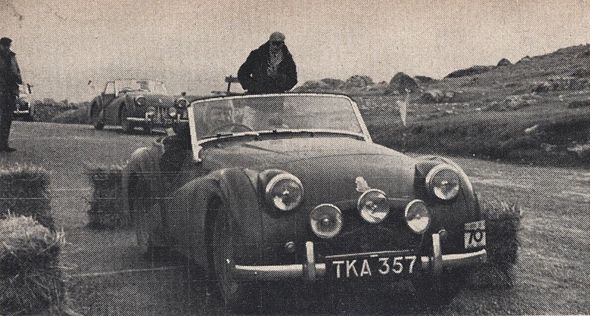
1958 Lancashire Rally - Triumph TR3
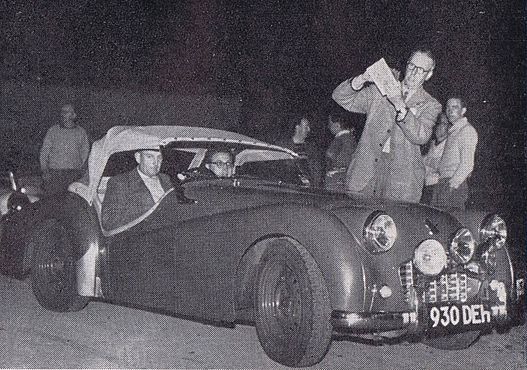
1958 Tulip Rally - Triumph TR3A
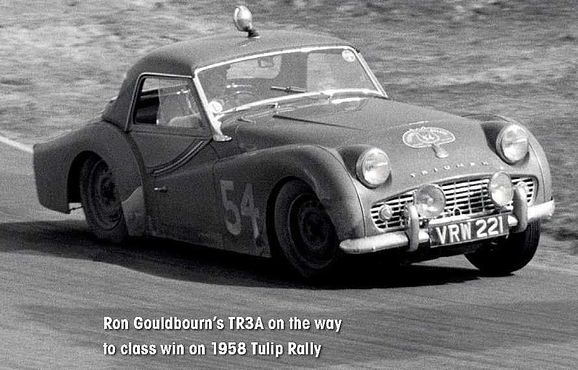
1958 RAC Rally - Standard Pennant
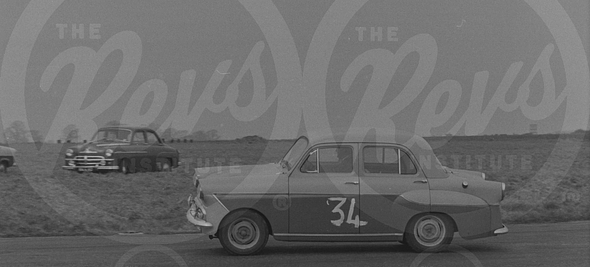
As I am unable to source records of which cars Ron drove in which event, I have reflected the cars that I believe he did drive during the season as there may well have been overlap with the cars he used in the BRC events. Ron and Stuart did win the 1958 Bolton Rally in their Triumph TR2 (model build under way) organised by the Bolton-Le-Moors Car Club, for which first prize was an Austin A35 with an engine tuned by Speedwell! A truly amazing prize worth over £500 at the time when entrance fees were typically 5 guineas (£5.05) or less (approximately £100 in todays money) and which was probably the most valuable prize ever awarded at a rally in the UK at the time. The car was sold and reportedly paid off Stuart's mortgage. The Triumph TR3 is modelled on the car Ron drove to First Class award in the Lancashire Rally. The Triumph TR3A (modified/part repainted Corgi model with homemade decals) represents the Triumph Competition car which Ron drove to 10th overall and 1st in class victory in the Tulip Rally in 1958. Ron also finished 2nd overall in the 1958 RAC Rally and was part of the winning team in a Stanard Pennant (model on pre-order).

1959
Stuart was again in the co-driver chair in 1959, but this time supporting John Sprinzel – a legend in the Triumph Sprite community, having developed a number of specials used in motorsports and being highly competitive in his Sprite in the BTCC. Again, I was fortunate enough to track down John to Hawaii of all places! Because rallies were so tough on cars which were to all intents and purposes fresh from the showroom, cars broke regularly. From my investigations I’m pretty confident that John and Stuart rallied at least 5 different cars together in 1959. They started off with their pale blue Frogeye Sprite which John drove to 14th overall in the Monte Carlo rallye that year. With grateful thanks to Dave Thomas of ANWCC (see further down for more info on Dave) I gained an insight on early rally history - I never knew for example that the Monte Carlo rally back in the 50s (and maybe before that) was actually a rally "To" Monte Carlo, rather than a rally around Monte Carlo - drivers set off from multiple locations (Glasgow, Lisbon, The Hague, Munich, Paris, Stockholm and Rome in 1959) and the winner could be a bit of a lottery if you chose the wrong starting place and got the worst of the weather en route. Jon also used an Alfa Giulietta during the 1959 season. From one black and white picture of the Alfa with its bonnet up, there is a high probability that the Alfa used by John in 1959 corresponds to one in the central records at Alfa Romeo who have recorded the following for a car with the chassis ending 2736 – “According to our documentation files, the chassis number AR 1468.02736 originally corresponds to an Alfa Romeo Giulietta t.i., manufactured on the 24th February 1958. The body colour is “Elvezia” blue (AR 315).” The Giulietta register recorded the car with the prior chassis number (2735) as being brought into this country by Thomson & Taylor the importers. Unfortunately, despite the passing of time, and despite explaining why I was after the information, the DVLA wouldn’t divulge whether they had any information on the car, including the UK registration. I also tried to trace the person who John believes the Alfa was sold to – I think I found her but unfortunately I have not been able to obtain a response to my emails. John also used an Austin A35 on the Coupe des Alpes but was a DNF. As the year progressed, John designed a new more aerodynamic front end for his PMO200 Sprite, and this was the forerunner to the development of the Speedwell Sprites. The car in more aerodynamic form finished 9th overall in the Liege-Rome-Liege event. The Austin A35 was driven in the 1959 Coupe des Alpes, and the red MGA (model in progress) was rallied in the 1959 Acropolis Rally. John’s recollection (which for transparency is different to Stuarts) is that “The Monte, in fact, counted towards the Championship, as you scored points for 1,2 & 3 in class on Internationals as well as 1,2 & 3 in the General classification.” I would tend to lean towards Stuarts recollection, as whilst the RAC Motor Sport Year Book "Blue Book" for 1959 does show some International events as counting towards the BRC, they were all events you might reasonably expect to be included in the BRC - The Circuit of Ireland, the Scottish Rally and the RAC Rally. At this stage I should acknowledge that with respect to he early years I have again been fortunate to have had a huge amount of help, and I want to acknowledge my gratitude to a fantastic gentleman called Dave Thomas who has been involved in the Cambrian Rally since 1969, and was Clerk of the Course from 1975 to 1983, Dave has graciously given up much of his time and delved in to his archives to help me source some event results and list all of the events that formed part of the 1959 BRC season.
20th Jan South Wales AC Welsh - outside top 5 - winner was Ian "Tiny" Lewis in a Swallow Doretti
12th/13th Feb Thames Estuary AC Cat's Eyes - winner was K. Piper in a Messerschmitt TG 500 - the Cats Eyes was a combination of Road (2 starting points) and autotests. The winner was clean in the road sections (some competitors struggled with traffic, police and football crowds! and although Sprinzel gave a good account of himself in the autotests, slipping clutch problems hampered his chance of victory. Piper was clean in the road sections and the bubble car had a distinct advantage in the tight autotest elements.
Mar Scottish Sporting CC Highland - ?
Mar Ulster AC Circuit of Ireland - ?
Apr Maidstone & Mid-Kent MC Hopper - winner was Latrobe/Tripe (Volvo 122S); 2, Harper/Crellin (Morgan +4); 3, Firmin/Spiers (Tirumph TR2)
Apr Midland AC Birmingham Post - 9 out of 71 drivers finished the 400 mile Birmingham Post rally without loss of marks and so the event was decided on the outcome of 3 autotests on the beaches near Llandrindod Wales. Sprinzel won 2 of his class Autotests, but was beaten in the 3rd by such a margin by Alfred Edward "Bill" Bengry in his Simca (Bill went on to become BRC champion in 1960 and 1961) that he lost out on overall class win and came 2nd in class. Overall winner of the event was Robin N. Richards from Boreham Essex (not far from me) whose Alexander modified Wolseley finished the event with some chewed up wine gums plugging a hole in the oil sump. After the Birmingham Post event. Stuart Turner and other leading rally participants from the late 50s (John Sprinzel, Tom Gold, Willy Cave) formed the Association of Rally Drivers to start to make recommendations to the RAC to change the format of rallies as too many were being won by the Autotest specialists, rather than on the road.
May Lancashire AC Morecambe - ?
May Royal Scottish AC Scottish - ?
Jun Plymouth MC Plymouth - outside top 3 - The event started with a 120 mile run in from 5 starting spots which converged at Haldon roadhouse near Exeter. From that location drivers then went on to follow a common route, the first of another 120 miles and then a second of a further 80 miles. By now with night passing by and daylight ariving, accidents started to increase as road useage picked up and the absence of headlights to warn of oncoming traffic disappeard. The winner was a driver not well known in rally circles (P.W. McNaughton) who borrowed an Austin A40 from a local distributor just for the event! Jim Bullough (BRC champion in 1967) was second.
Sep London MC National London - Sprinzel in his Sprite was one of 6 drivers who finished the 700 mile route "clean". This was unheard of as nobody had ever finished the London within the permitted times and as such the winner would be decided based on a couple of Autotests which took place during the rally. Sprizel however made an error of judgement (presumably based on the history of the event) and thought "why bother?" to do the Autotests as the rally would surely be won on the road? So, he lost out to Brian Harper in his Morgan.
Nov MCC National Rally - ?
Nov RAC RAC Rally - John acted as Co-Driver for Erik Carlsson on a couple of European Rally Championship events in 1959, including the RAC rally and the ERC season finale, the Rally of Portugal. Carlsson started the 1959 Rally of Portugal leading the European championship. His closest competitor was Paul Coltelloni, a works Citroën team driver, but to prevent Carlsson from winning, Citroën had bought Coltelloni an Alfa Romeo. As the event passed through Spain, the blue Saab Carlsson was sharing with British Rally Champion John Sprinzel began suffering from a grabbing front brake. Cresting the brow of a hill in the gathering dusk at over 70 mph (110 km/h), the crew spotted a closed railway level crossing only yards in front of them. Heavy braking caused the car to spin and roll over into the barrier, where they narrowly avoided being hit by the passing train. Despite this incident, and the subsequent electrical problems it caused, they finished third and it was enough to finish fourth for Carlsson to win the championship. However, shortly before the prize ceremony, they were told they would be given a 25-point penalty for their car having white competition numbers on a black background, instead of the other way around. Still, 25 penalty points only pushed them down to 4th place, so the European championship would be safe. It was only at the prize ceremony itself that they discovered that they had been given an additional 25-point penalty, putting them in eighth position. When they asked why, they were told they had been given 25 penalty points per door!
As I am currently unable to source photo records of the cars John drove in each BRC event, I have reflected,as I did for Ron, the cars that he did drive during 1959.
1959 Monte Carlo
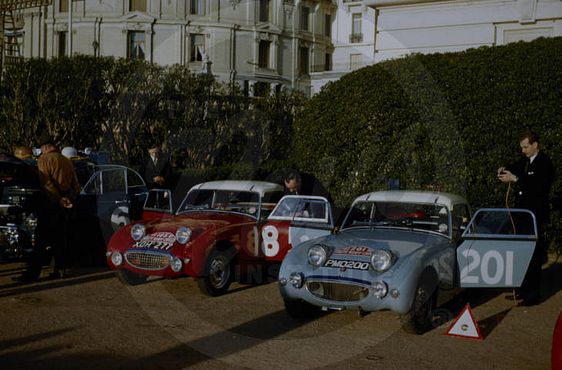
1959 Unknown Rally
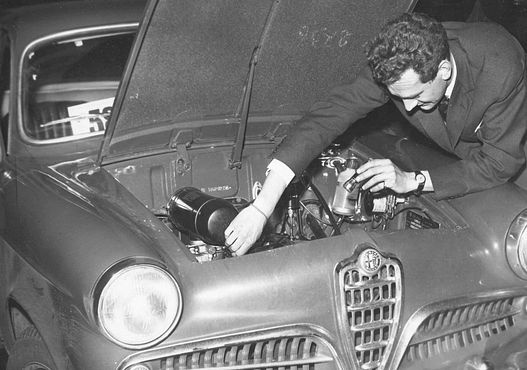
1959 Coupe des Alpes ("Alpine Rally")
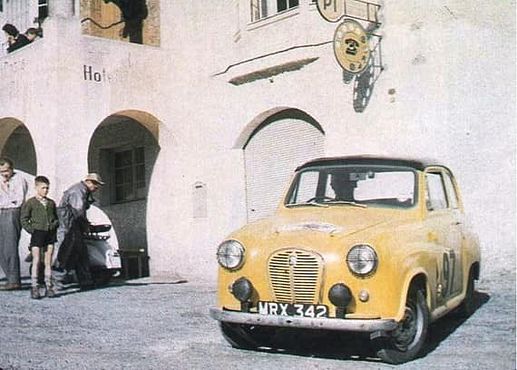
1959 Liege-Rome-Liege
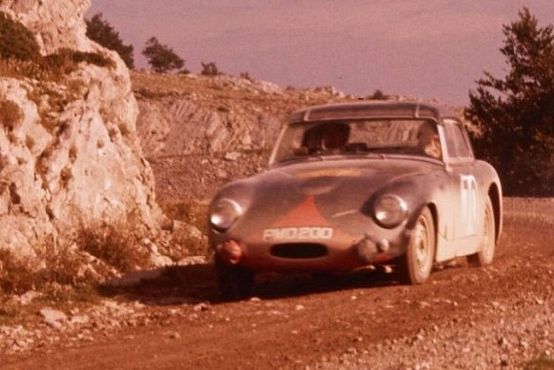
1959 Acropolis Rally
.png?width=590&height=370&fit=bounds)
1959 RAC Rally (co-driver)
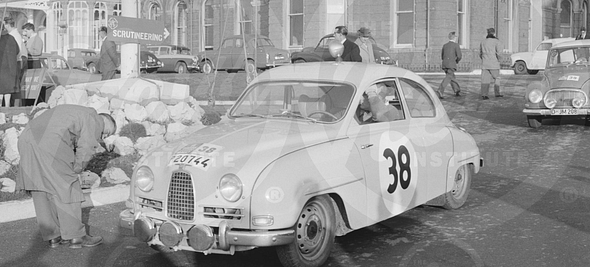
The Pale Blue Monte Car is a Spark issue, the Elvezia Blue Alfa is a de-decaled partswork, the banana yellow A35 from K&R Replicas and the Grey Speedwell bonneted Sprite is a modified K&R kit with homemade decals.

Nevertheless, the collection from 1958 has been a labour of love, and so here it is. It’s been a battle, but I hope you like them as much as I have enjoyed bringing this together. I have also added pictures of the real cars from noteworthy events (ideally the same event as I have modelled). All of these have been sourced from the Internet, none were taken by me. Many of the original photographers names have been lost in the journey through the internet, but where they are present or are copywrighted, I have left the watermarks in place, and noted the photographers names where it is known, out of respect for, and as an acknowledgement to, the experts who have taken these.
The 50’s
1958
The BRC itself first started in 1958 when events were generally long distance trials, with competitors divided into classes in which the drivers who were the most dominant in their class would be the overall winner of the event. Navigational night sections and driving tests were the primary way of defining the results. Overall classifications were not regarded as the benchmark of defining the relative performance of crews, positions in classes and special awards were what mattered. The inaugural winner of the BRC was Ron Gouldbourn with Stuart Turner in the co-driver seat. Ron also won the BTRDA in 1958. Stuart Turner has competed as co-driver on most major international rallies, he became Sports Editor of "Motoring News" then Competition Manager for BMC, managing the rally team when Minis were winning Monte Carlo Rallies. He joined Ford as Competitions Manager, guiding the team to wins on the Safari and London-to-Mexico rallies, European and World Championships. He is a renowned after dinner speaker and I was fortunate to exchange some correspondence with him. Stuart confirmed that the BTRDA was the one to win in the 50’s and they didn’t even realise that they had won the BRC until some time after the season had finished. He recalls Ron being a very good driver, but for some reason he wasn’t trusted by the Triumph Competitions manager, and as such was never allowed to use the competition cars in the British Championship. Ron used his own Triumphs in the BRC and other UK events and Stuart recalls that “the TR is every bit as iconic as the Mini, the Escort and the Quattro. You have to remember that in the late ’50s they were everywhere. If you were on a rally with an entry of 100 cars, as many as 50 would be Triumphs. It became the car to have. Of course, it was also very low and I remember losing a minute on one rally just trying to get out of the car – the base of the door kept hitting the kerb! You didn’t have to do much to make them competitive, that was the key. Back then rally cars really were production cars. On one occasion I borrowed a TR from a dealer in Stoke on Trent and all we did was pump up the tyres a bit, attach some cardboard to the dashboard to stop reflections from the map light and off we went. I drove the car back to the showroom the following Monday.”
9/10 January – Welsh National Rally (South Wales AC) - Overall: No results located at this stage
7/8 February – Cat’s Eye National Rally (Thames Estuary AC) - Overall: 1, K Faire/Capt D Allen (Riley 1.5). Up to and including 1300cc: 1, D W Thompson/J E Appleby (Ford Anglia). 1301-1600cc: P Diggins/D Patrick (Wolseley 1500). Touring Cars 1601-2000cc: J Reynolds (Ford Zodiac). Touring Cars over 2000cc: H P Deschampes/W T Harris (Austin 105). Production Sports Cars up to and including 1300cc: 1, N Hickmet/J Holmes (Volkswagen). 1301-1600cc: C D Boulton/P S Clapham (MGA). 1601-2000cc: A Newsham/P Dingley (Triumph TR3). Special cars: 1, A T Fisher/J R W Thomas (Austin A35)
27/30 March – Highland National Rally (Scottish Sporting CC) - Overall: 1, Mike Sutcliffe (Morris Minor); 2, Ninian Patterson (MGA). Class winners: Doc Spare (Singer Gazelle), Ian Brown (Triumph), Stan Anderson (Mercedes)
27/31 March – Circuit of Ireland International Rally (Ulster AC) - Overall: No results located at this stage
4/5 April – Hopper National Rally (Maidstone & Mid-Kent MC) - Overall: No results located at this stage
10/11 April – National Rally (Midland AC) - Overall: No results located at this stage
8/10 May - Morecambe National Rally (Lancashire AC) - Overall: Outright winner, T.A. Gold (TR3). Closed or convertible cars up to 1300CC 1. A.T. Fisher (Austin) 2. J.G. Catlow (Morris) Over 1300cc 1. C.C.Bethell (Sunbeam). Open or Grand Touring Cars up to 1600cc 1. P.R. Harding (Ford) 2. J. Heppenstall (M.G.A.). Over 1600cc 1. T.A. Gold (TR3) 2. K.C.Walker (TR3). First Class Awards H. Jacoby (TR3), Ron Gouldbourn (TR3) A. Newsham (Ford), B Harper (Morgan), G.H. Parkes (TR3). Novice award 1. A. Furness (Renault).
18/22 May – Scottish International Rally (Royal Scottish AC) - Overall: 1, P G Dundas (Triumph TR2). Class 1: 1, C L Kinns (Goggomobil); Class 2: 1. C D Silverthorne (Renault); 2, I D L Lewis (Standard Pennant); Class 3: 1, Dr J T Spare (Singer Gazelle); 2, N T Lithgow (Ford); Class 4: 1, E Jackson (Ford Zephyr); 2, F D Kerr (Jaguar 2.4); Class 5: 1, G H F Parkes (Jaguar 2.4); 2, J F Gibbon (Rover 105S), Class 6: 1, M Britton (Renault Dauphine); 2, R D McPherson (Ford Anglia); Class 7: 1, D Frazer (Sunbeam Rapier); Class 8: 1, J Patten (Berkeley); Class 9: 1, C W Yates (Porsche 1600); R M Longmuir (MGA); Class 10: 1, F P Dundas (Triumph TR3); 2, R W Dalglish (Triumph TR3); Class 11: 1, H A G Meikle (Jaguar XK120); 2, W J Sleigh Jnr (Jaguar XK120)
26/27 June – Plymouth National Rally (Plymouth MC) - Overall: No results located at this stage
18/19 September – London National Rally (London MC) - Overall: 1, M J Webb/R Crellin. Class winners: R Gouldbourn/S Turner (Triumph TR3), J Sprinzel/W Cave (Austin-Healey Sprite), Major F Hayes/E Benson (Austin A95), Mrs Pat Mayman/Miss Valerie Domleo (Morgan +4)
5/7 November – National Rally (MCC) - Overall: No results located at this stage
16/21 November - RAC International Rally (RAC) - Class 1, up to 1000cc: 1, Pat Moss/Anne Wisdom (Morris Minor); 2, W H Wadham/P C Wadham (Morris Minor), 3, D Barker/L Helsham-Revell (Austin). Class 2, 1001-1300cc: 1, D A Smith/J Tyman/J Shove (FIAT 1100); 2, F P Grounds/R D Grounds/J Hay (Ford); 3, A E C Hartnell/J S Bell (Ford). Class 3, 1301-1600cc: 1, P Harper/D Stone (Sunbeam Rapier); 2, B A T Clark/C E Johns (Riley 1.5); 3, K N Lee/A J Sinclair (Riley). Class 4, 1601-2000cc: no finishers. Class 5, 2001-2600cc: 1, B H Waddilove/G Wood/M Kempley (Jaguar 2.4); 2, E Harrison/M Baxter. P Eshelby (Ford Zephyr); 3, A C Whatmough/N Quick.R Armstrong (Ford). Class 6, 2601cc and over: 1, E Brinkman/D H Spurgeon/A H Surgeon (Jaguar); 2, T E B Sopwith/J Goldthorp (Jaguar); 3, S T H Rowe/T K Dooley (Jaguar). Class 7, up to 1300cc (App J, Cat 1 & II, Groups 4 & 5): 1, R A Gouldbourn/G S Turner (Standard Pennant); 2, T A Gold/W Cave (Standard Pennant); 3, C Corbishley/P Simister (Standard). Class 8, 1301-2000cc: 1, A L Yarranton/J Taylor (Morgan); 2, W A G Goodall/J R Thomas (Morgan); 3, R Grant/J L Darwant (Morgan). Class 9, 2001cc and over: 1, D G Scott/K Armstrong (Ford); 2, L G Sims/H Walton (Aston Martin); 3, B F Mitten/G R Norton (Jaguar)
1958 Bolton Rally - Triumph TR2

1958 Lancashire Rally - Triumph TR3

1958 Tulip Rally - Triumph TR3A

1958 RAC Rally - Standard Pennant

As I am unable to source records of which cars Ron drove in which event, I have reflected the cars that I believe he did drive during the season as there may well have been overlap with the cars he used in the BRC events. Ron and Stuart did win the 1958 Bolton Rally in their Triumph TR2 (model build under way) organised by the Bolton-Le-Moors Car Club, for which first prize was an Austin A35 with an engine tuned by Speedwell! A truly amazing prize worth over £500 at the time when entrance fees were typically 5 guineas (£5.05) or less (approximately £100 in todays money) and which was probably the most valuable prize ever awarded at a rally in the UK at the time. The car was sold and reportedly paid off Stuart's mortgage. The Triumph TR3 is modelled on the car Ron drove to First Class award in the Lancashire Rally. The Triumph TR3A (modified/part repainted Corgi model with homemade decals) represents the Triumph Competition car which Ron drove to 10th overall and 1st in class victory in the Tulip Rally in 1958. Ron also finished 2nd overall in the 1958 RAC Rally and was part of the winning team in a Stanard Pennant (model on pre-order).

1959
Stuart was again in the co-driver chair in 1959, but this time supporting John Sprinzel – a legend in the Triumph Sprite community, having developed a number of specials used in motorsports and being highly competitive in his Sprite in the BTCC. Again, I was fortunate enough to track down John to Hawaii of all places! Because rallies were so tough on cars which were to all intents and purposes fresh from the showroom, cars broke regularly. From my investigations I’m pretty confident that John and Stuart rallied at least 5 different cars together in 1959. They started off with their pale blue Frogeye Sprite which John drove to 14th overall in the Monte Carlo rallye that year. With grateful thanks to Dave Thomas of ANWCC (see further down for more info on Dave) I gained an insight on early rally history - I never knew for example that the Monte Carlo rally back in the 50s (and maybe before that) was actually a rally "To" Monte Carlo, rather than a rally around Monte Carlo - drivers set off from multiple locations (Glasgow, Lisbon, The Hague, Munich, Paris, Stockholm and Rome in 1959) and the winner could be a bit of a lottery if you chose the wrong starting place and got the worst of the weather en route. Jon also used an Alfa Giulietta during the 1959 season. From one black and white picture of the Alfa with its bonnet up, there is a high probability that the Alfa used by John in 1959 corresponds to one in the central records at Alfa Romeo who have recorded the following for a car with the chassis ending 2736 – “According to our documentation files, the chassis number AR 1468.02736 originally corresponds to an Alfa Romeo Giulietta t.i., manufactured on the 24th February 1958. The body colour is “Elvezia” blue (AR 315).” The Giulietta register recorded the car with the prior chassis number (2735) as being brought into this country by Thomson & Taylor the importers. Unfortunately, despite the passing of time, and despite explaining why I was after the information, the DVLA wouldn’t divulge whether they had any information on the car, including the UK registration. I also tried to trace the person who John believes the Alfa was sold to – I think I found her but unfortunately I have not been able to obtain a response to my emails. John also used an Austin A35 on the Coupe des Alpes but was a DNF. As the year progressed, John designed a new more aerodynamic front end for his PMO200 Sprite, and this was the forerunner to the development of the Speedwell Sprites. The car in more aerodynamic form finished 9th overall in the Liege-Rome-Liege event. The Austin A35 was driven in the 1959 Coupe des Alpes, and the red MGA (model in progress) was rallied in the 1959 Acropolis Rally. John’s recollection (which for transparency is different to Stuarts) is that “The Monte, in fact, counted towards the Championship, as you scored points for 1,2 & 3 in class on Internationals as well as 1,2 & 3 in the General classification.” I would tend to lean towards Stuarts recollection, as whilst the RAC Motor Sport Year Book "Blue Book" for 1959 does show some International events as counting towards the BRC, they were all events you might reasonably expect to be included in the BRC - The Circuit of Ireland, the Scottish Rally and the RAC Rally. At this stage I should acknowledge that with respect to he early years I have again been fortunate to have had a huge amount of help, and I want to acknowledge my gratitude to a fantastic gentleman called Dave Thomas who has been involved in the Cambrian Rally since 1969, and was Clerk of the Course from 1975 to 1983, Dave has graciously given up much of his time and delved in to his archives to help me source some event results and list all of the events that formed part of the 1959 BRC season.
20th Jan South Wales AC Welsh - outside top 5 - winner was Ian "Tiny" Lewis in a Swallow Doretti
12th/13th Feb Thames Estuary AC Cat's Eyes - winner was K. Piper in a Messerschmitt TG 500 - the Cats Eyes was a combination of Road (2 starting points) and autotests. The winner was clean in the road sections (some competitors struggled with traffic, police and football crowds! and although Sprinzel gave a good account of himself in the autotests, slipping clutch problems hampered his chance of victory. Piper was clean in the road sections and the bubble car had a distinct advantage in the tight autotest elements.
Mar Scottish Sporting CC Highland - ?
Mar Ulster AC Circuit of Ireland - ?
Apr Maidstone & Mid-Kent MC Hopper - winner was Latrobe/Tripe (Volvo 122S); 2, Harper/Crellin (Morgan +4); 3, Firmin/Spiers (Tirumph TR2)
Apr Midland AC Birmingham Post - 9 out of 71 drivers finished the 400 mile Birmingham Post rally without loss of marks and so the event was decided on the outcome of 3 autotests on the beaches near Llandrindod Wales. Sprinzel won 2 of his class Autotests, but was beaten in the 3rd by such a margin by Alfred Edward "Bill" Bengry in his Simca (Bill went on to become BRC champion in 1960 and 1961) that he lost out on overall class win and came 2nd in class. Overall winner of the event was Robin N. Richards from Boreham Essex (not far from me) whose Alexander modified Wolseley finished the event with some chewed up wine gums plugging a hole in the oil sump. After the Birmingham Post event. Stuart Turner and other leading rally participants from the late 50s (John Sprinzel, Tom Gold, Willy Cave) formed the Association of Rally Drivers to start to make recommendations to the RAC to change the format of rallies as too many were being won by the Autotest specialists, rather than on the road.
May Lancashire AC Morecambe - ?
May Royal Scottish AC Scottish - ?
Jun Plymouth MC Plymouth - outside top 3 - The event started with a 120 mile run in from 5 starting spots which converged at Haldon roadhouse near Exeter. From that location drivers then went on to follow a common route, the first of another 120 miles and then a second of a further 80 miles. By now with night passing by and daylight ariving, accidents started to increase as road useage picked up and the absence of headlights to warn of oncoming traffic disappeard. The winner was a driver not well known in rally circles (P.W. McNaughton) who borrowed an Austin A40 from a local distributor just for the event! Jim Bullough (BRC champion in 1967) was second.
Sep London MC National London - Sprinzel in his Sprite was one of 6 drivers who finished the 700 mile route "clean". This was unheard of as nobody had ever finished the London within the permitted times and as such the winner would be decided based on a couple of Autotests which took place during the rally. Sprizel however made an error of judgement (presumably based on the history of the event) and thought "why bother?" to do the Autotests as the rally would surely be won on the road? So, he lost out to Brian Harper in his Morgan.
Nov MCC National Rally - ?
Nov RAC RAC Rally - John acted as Co-Driver for Erik Carlsson on a couple of European Rally Championship events in 1959, including the RAC rally and the ERC season finale, the Rally of Portugal. Carlsson started the 1959 Rally of Portugal leading the European championship. His closest competitor was Paul Coltelloni, a works Citroën team driver, but to prevent Carlsson from winning, Citroën had bought Coltelloni an Alfa Romeo. As the event passed through Spain, the blue Saab Carlsson was sharing with British Rally Champion John Sprinzel began suffering from a grabbing front brake. Cresting the brow of a hill in the gathering dusk at over 70 mph (110 km/h), the crew spotted a closed railway level crossing only yards in front of them. Heavy braking caused the car to spin and roll over into the barrier, where they narrowly avoided being hit by the passing train. Despite this incident, and the subsequent electrical problems it caused, they finished third and it was enough to finish fourth for Carlsson to win the championship. However, shortly before the prize ceremony, they were told they would be given a 25-point penalty for their car having white competition numbers on a black background, instead of the other way around. Still, 25 penalty points only pushed them down to 4th place, so the European championship would be safe. It was only at the prize ceremony itself that they discovered that they had been given an additional 25-point penalty, putting them in eighth position. When they asked why, they were told they had been given 25 penalty points per door!
As I am currently unable to source photo records of the cars John drove in each BRC event, I have reflected,as I did for Ron, the cars that he did drive during 1959.
1959 Monte Carlo

1959 Unknown Rally

1959 Coupe des Alpes ("Alpine Rally")

1959 Liege-Rome-Liege

1959 Acropolis Rally
.png?width=590&height=370&fit=bounds)
1959 RAC Rally (co-driver)

The Pale Blue Monte Car is a Spark issue, the Elvezia Blue Alfa is a de-decaled partswork, the banana yellow A35 from K&R Replicas and the Grey Speedwell bonneted Sprite is a modified K&R kit with homemade decals.

Last edited by reeft1 on Sun Mar 28, 2021 12:05 pm; edited 18 times in total

reeft1- Posts : 3405
Join date : 2012-02-14
Age : 54
Location : Essex
 Re: British Rally Championship Champions Collection
Re: British Rally Championship Champions Collection
The 60’s
At the start of the ‘60s the sport took a new and significant turn when special stages on the newly available Forestry Commission roads for the big events. Night navigation however remained a dominant part of the series, the qualifying rounds now intermingled with the classic international rallies in the various British regions. Then a much greater availability of forest stages during the ‘60s increased the opportunities of developing the special stage sport. This in turn helped give a new and stronger identity to the BRC which at the time was being a little eclipsed by the popularity of the concurrent Motoring News road rally championship.
1960 and 1961
When 12 year old Bill Bengry was fined £25 for driving a car on the highway in the 1930's it looked as though his motoring life had got off to a bad start. But from this expensive beginning Bill has come a long way in the world and reached heights in motor sport which he never dreamt possible at that tender age,
Bill, who lived in Leominster, is the possessor of over 200 cups and trophies won in local, national and international motoring circles and has the distinction of being the first man to be RAC British Rally Champion for two consecutive years.
Through hard work and an indomitable will he has made his mark in sport and business. Time and time again he has come through against the odds and is a man to relish a challenge
A sleeping interest in motor sport was first aroused in Bill in 1947 when his brother-in-law was a works driver for Coopers who were dominating their class in races and hill-climbs.
He competed in many hill-climbs and rallies. He says now, "The rallies were longer in those days and relied mainly on good navigation, and I had a job to find a navigator.
"Modern rallies lay greater emphasis on the ability of the driver. There are so many good navigators that this has to be so.
"Times are now taken down to seconds - not just average speed - and on the special timed stages of a rally you must have a good driver and a car with a good performance."
He began to take up serious rally driving in 1954 when he took on the Volkswagen agency.
Although the Volkswagen was considered by experts to be unsuitable for rally work, within six years Bill was RAC British Rally Champion, Motoring News champion and the BTRDA Gold Star champion. This was achieved against stiff opposition and he was the first driver to win all three.
It was in 1960 that he took part in his first international - the RAC Rally of Britain - and he considers that it was in this event that he gave his best performance. Certainly it put him into the "big time" of rallying.
As his navigator he had David Skeffington, who has shared many of his successes, and together they competed against international stars in Bill's privately entered Volkswagen.
From the start the little red car was considered to have no chance and was number 110. But after the first night it was one of only three cars not to lose points.
Then ill-fortune struck. From lying third Bill dropped to eighth due to five tyre bursts on special stages. They finished the rally in this position and were second in their class.
By Jeremy Finney. Taken from the Hereford Evening News, Friday September 24, 1965.
Although I can no longer trace the article, I did read at one stage that in one year (1960 or 1961) a river crossing was so flooded that most cars came a cropper trying to ford it – not Bill and the Bettle – they floated across!!
The only BRC event in 1960 which Bill won outright was the season finale, Rally of the Vales.
1960
8/9 January 1960 - Welsh National Rally (South Wales AC) – Overall: 1, Brian Harper/Ron Crellin (Morgan) 67; 2, Tiny Lewis (Triumph Herald) 109; Class winners: Casewell (Austin A99); John la Trobe (Volvo)
6/7 February 1960 - Cat’s Eyes Rally (Thames Estuary AC) – Overall: 1, R N Richards/G C Davies (Riley 1.5) 10; Class A: 1, G F Pike (Morris Traveller) 15 (838); 2, H A R Nash (Ford Anglia) 15 (858); 3, S P Clipston (Volkswagen) 20; Class B: 1, S P A Freeman (Austin Cambridge) 20; 2, E Malkin (Sunbeam Rapier) 23; 3, K W Barrow (Volvo) 40; Class C: 1, K J Freeman (Citroën) 50; 2, J Hayes (Sunbeam Talbot 90) 55; Class D: 1, R Anderson (Ford Zephyr) 15; 2, S Dacre-Lacey (Jaguar) 65; Class E: 1, J W Scott (Triumph Herald) 90; 2, C M M Williams (Austin-Healey Sprite) 103; 3, A H Gray (Morris) 115; Class F: 1, G Kirkcaldie (Sunbeam Alpine) 25; 2, J H la Trobe (Volvo) 45; Class G: 1, B Harper (Morgan) 30; 2, D Seigle-Morris (Triumph TR3A) 35; Class H: 1, T J Mockeridge (Austin-Healey) 55
5/6 March 1960 - Express & Star Rally (Wolverhampton & South Staffs CC) – Overall: 1, T A Gold/S Turner (Austin-Healey Sprite) 40; 2, Mrs Mayman/Miss Val Domleo (Morgan 1991cc) 90; 3, Bill Bengry (SIMCA 1200) 100; Class winners: A P Bridge (Austin-Healey Sprite) 400; A T Fisher (Austin Seven) 110; E Malkin (Sunbeam Rapier) 100; Brian Harper (Morgan 1991cc) 120
2/3 April 1960 – Hopper Rally (Maidstone & Mid-Kent MC) – Overall: 1, Pat Moss/S Turner (Austin A40) 3; 2, D Grimshaw/B Melia (Triumph TR3) 4; 3, R N Richards/G C Davies (Riley 1.5) 6; 4, S Clipston/M T Godfrey (Volkswagen) 6; 5, R J G Smith/J Dorville (Sunbeam Rapier) 8; 6, D Seigle-Morris/V H Elford (Triumph TR3A) 9; 7, E Malkin/A A G Robson (Sunbeam Rapier) 9; 8, H J Harper/J Mace (MGA) 9; 9, R A Clift/B F Lockyear (Austin-Healey) 12; 10, I D L Lewis/R Porter (Triumph Herald) 18; 11, G Mabbs/D Mabbs (Triumph Herald) 21; 12, D H Ray/G F Babra (Singer Gazelle) 21; 13, H A Appleby/Dr R L McGhie (Austin-Healey Sprite) 24; 14, J Steadman/A Edwards (MG Magnette) 24; 15, J Poulton/N Church (?) 28
8/9 April 1960 - Birmingham Post Rally (Midland AC) – Overall: 1, M Sutcliffe/S Woolley (Morris) 49.0; Experts up to 1000cc: 1, M Sutcliffe/S Woolley (Morris) 49.0; 2, G J Mabbs/D Mabbs (Triumph) 49.8; 3, M J Webb/D Holland (Triumph) 50.2; 4, I A L Lewis/R Porter (Triumph) 51.4; 5, J F S Poulton/K Coombes (Auto Union) 59.6; Experts over 1000cc: 1, B Harper/R Crellin (Morgan) 50.2; 2, Mrs E P Mayman/Miss V Domleo (Morgan) 51.4; 3, G H F Parkes/G W Howarth (Austin-Healey) 52.8; 4, I Casewell/A Austin (Austin) 58.2; 5, J D Grimshaw/B Melia (Triumph TR3A) 60.4; Novices up to 1000cc: 1, B Evans/M Annett (Austin) 373.8; 2, Mrs V M Harper/I R Smith (Triumph) 389.2; 3, R A Christopher/A Youngs (Austin) 404.0; 4, T J Smallman/Miss E A Newton (Morris) 656.2; 5, D M Clayson/J Humphries (Triumph) 737.4; Novices over 1000cc: 1, W Fieldhouse/W Small (Volkswagen) 140.7; 2, P J Marr/P A D Marr (Triumph) 262.2; 3, D R Blankstone/B Pickering (MG) 375.6; 4, R E Abbott/Miss J M Law (Sunbeam) 473.8; 5, T J Hammond/P A Hammond (Triumph TR2) 490.4
There were 12 clean sheets so positions decided on tests.
15/18 April 1960 – Highland Rally (Scottish Sporting CC) – Overall: 1. J A Morrison (Triumph Herald); Production Touring Cars up to 1000cc: 1, J A Morrison; 2, R M Pettie; 3, Miss Jacqueline Walker; Production Touring Cars 1000cc to 1600cc: 1, R Graham (Riley 1.5); 2, J Hardie Brown (Riley 1.5); 3, W G Bennett (Hillman Minx); Production Touring Cars 1601cc and over: 1, J S Collins (Humber Hawk); 2, T Paton (Jaguar 3.4); Special Touring Cars and Production Grand Touring Cars up to 1000cc: 1, I McIntyre (Austin-Healey Sprite); 2, R G MacCrae (Austin-Healey Sprite); Special Touring Cars and Production Grand Touring Cars 1000cc to 1600cc: 1. T W Currie (MGA); 2, Ian T Brown (Sunbeam Alpine); 3, K W Moore (MGA); Special Touring Cars and Production Grand Touring Cars 1601cc and over: 1, K R Sturrock (Morgan Plus 4); 2, Mrs Audrey Woolley (Triumph TR3A); 3, D Sisson (Triumph TR3); Other cars: 1. J D Hamilton (Morris Eight)
15/19 April 1960 - Circuit of Ireland (Ulster AC) – Overall: 1, A J L Boyd/M N Johnstone (Austin-Healey Sprite)
13/15 May 1960 – Morecambe Rally (Lancashire AC) – Overall: 1, Mrs Anne Hall/Miss Val Domleo (Ford Anglia) 14; 2, D Seigle-Morris 18; 3, J Waddington 21; 4, J R Kirkham (Austin-Healey Sprite) 21. Class winners: R J Winder 378; A Hall; E Hunt; E Malkin; J R Kirkham; D Seigle-Morris. Eventual championship winner Bill Bengry (SIMCA) retired early
6/10 June 1960 – Scottish National Rally (Royal Scottish AC) – Event cancelled due to lack of entries
24/25 June 1960 – Plymouth Rally (Plymouth MC) – Overall: 1, D de Souza (Morris Mini-Minor); 2, D Silverthorne (Porsche); 3, E Jackson (Triumph Herald). 12 crews were clean on road penalties, positions decided on tests
13/14 August 1960 – Bolton Rally (Bolton le Moors CC) – Overall: 1, G D Grimshaw/B Melia (Triumph TR3) 6; 2, R N Richards/G C Davies (Riley 1.5) 6; 3, Mrs A Hall/Miss V Domleo (Ford Anglia) 6; 4, A Edmondson/J Middleton (Austin 7) 9; 5, M Sutcliffe/G P Crabtree (Morris Minor) 11; 6, B W Izard/A G Robson (Triumph Herald) 12; 7, G H F Parker/G W Howarth (Austin-Healey) 13; 7, A W Hobson/S Wooley (Ford Anglia) 17; 8, M H Pickersgill/M Kempley (MGA) 18; 9, B Harper/R Crellin (Morgan) 21; 10, E R V Walker/M A Tarratt (Renault) 25; 11, G J Mabbs/D Mabbs (Triumph Herald) 26; 12, J B Kirkham/H Beighton (Austin-Healey Sprite) 27; 13, H A R Nash/D Stone (Triumph Herald) 29; 14, R C Walker/F Trickett (Triumph TR3) 29; 15, A C Taylor/G Parker (Triumph TR3) 30; 16, J N Wood/B Hughes (Ford Anglia) 31; 17, A P Bridge/M R Milchreast (Austin-Healey Sprite) 31; 18, P F Steiner/R Cumbers (Austin A40) 31; 19, M J Webb/D H Holland (Triumph Herald) 32. Ties decided by furthest cleanest
7/8 October 1960 – London Rally (London MC) – Overall: 1, J R Kirkham/H Beighton (Austin-Healey Sprite) 1; 2, J Easten/A A Robson (Sunbeam Rapier) 13; J Steadman (Sunbeam Rapier) 14; I Lewis (Triumph Herald) 20; A Fisher (Austin 7) 25; D Grimshaw (Triumph TR3) 30; W Hercock (Triumph TR3) 36; Mrs Mayman/D Hewitt (Triumph Herald) 37; F Snaylam (Austin-Healey Sprite) 61; E Brinkman (Jaguar 3.4) 111; Class A: 1, B Bengry/D Skeffington (SIMCA) 24; 2, J Shand/P Clapham (Vauxhall) 48; Class B: 1. B Harper/R Crellin (Morgan) 28; 2, G Parker/G Howarth (Austin-Healey 3000) 29; Class C: 1, C Williams/J Brown (Austin-Healey Sprite) 33
21/26 November 1960 – RAC Rally (RAC) – Overall: 1, E Carlsson/S Turner (SAAB) 0; 2, J Sprinzel/R Bensted-Smith (Sebring Sprite) 2 (23); 3, D Morley/E Morley (Austin-Healey 3000) 2 (25); 4, J Sears/W Cave (Jaguar 3. 3 Class A: 1, E Carlsson/S Turner (SAAB) 0; 2, D Seigel-Morris/V Elford (Mini) 3; 3, T Clark/K Coombs (Mini) 13; Class B: 1, I D L Lewis/D Potter (Triumph Herald) 3; 2, G P Crabtree/S Woolley (Ford Anglia) 4; 3, Mrs A Hall/Miss V Domleo (Ford Anglia) 5; Class C: 1, J C Wallwork/H Brooks (Volvo) 3; 2, A E Bengry/D V Skeffington (Volkswagen) 7; 3, J Ray/P Dingley (Sunbeam) 8; Class D: 1, M Marang/M Radoche (Citroën) 7; 2, J P Bolton/G Shanley (Citroën) 16; Class E: 1, J Sears/W Cave/P Berry (Jaguar 3.
3 Class A: 1, E Carlsson/S Turner (SAAB) 0; 2, D Seigel-Morris/V Elford (Mini) 3; 3, T Clark/K Coombs (Mini) 13; Class B: 1, I D L Lewis/D Potter (Triumph Herald) 3; 2, G P Crabtree/S Woolley (Ford Anglia) 4; 3, Mrs A Hall/Miss V Domleo (Ford Anglia) 5; Class C: 1, J C Wallwork/H Brooks (Volvo) 3; 2, A E Bengry/D V Skeffington (Volkswagen) 7; 3, J Ray/P Dingley (Sunbeam) 8; Class D: 1, M Marang/M Radoche (Citroën) 7; 2, J P Bolton/G Shanley (Citroën) 16; Class E: 1, J Sears/W Cave/P Berry (Jaguar 3. 3; 2, G Burgess/S Croft-Pearson (Ford Zephyr) 8; 3, I Walker/J Uren (Ford Zephyr) 10; Class F: 1, J Sprinzel/R Bensted-Smith (Austin-Healey Sprite) 2; 2, Miss P Moss/Miss A Wisdom (Austin-Healey Sprite) 10; 3, J R Kirkham/P Maldam (Austin-Healey Sprite) 13; Class G: 1, D Johns/R Jones (Wolseley) 8; 2, J D L McIvin/W G Bennett (Sunbeam) 14; 3, C Bent-Marshall/D H Pratt (Wolseley) 23; Class H: 1, D Morley/E Morley (Austin-Healey) 2; 2, P Riley/A Ambrose (Austin-Healey) 7; 3, G D Grimshaw/B Melia (Triumph) 13
3; 2, G Burgess/S Croft-Pearson (Ford Zephyr) 8; 3, I Walker/J Uren (Ford Zephyr) 10; Class F: 1, J Sprinzel/R Bensted-Smith (Austin-Healey Sprite) 2; 2, Miss P Moss/Miss A Wisdom (Austin-Healey Sprite) 10; 3, J R Kirkham/P Maldam (Austin-Healey Sprite) 13; Class G: 1, D Johns/R Jones (Wolseley) 8; 2, J D L McIvin/W G Bennett (Sunbeam) 14; 3, C Bent-Marshall/D H Pratt (Wolseley) 23; Class H: 1, D Morley/E Morley (Austin-Healey) 2; 2, P Riley/A Ambrose (Austin-Healey) 7; 3, G D Grimshaw/B Melia (Triumph) 13
3/4 December 1960 - Rally of the Vales (Swansea MC) – Overall: 1, B Bengry; 4, Brian Harper. No results published!
BRITISH RALLY CHAMPIONSHIP FINAL TOP TEN
Overall: 1, Bill Bengry (38); 2, Brian Harper (36); 3, Robin Richards (31); 4, Tiny Lewis (25); =5, Roy Kirkham (23); =5, Ann Hall (23); 7, Pauline Mayman (21); 8, Don Grimshaw (19); 9, Codge Malkin (18); 10, Julian Easten (17)
1960 RAC Rally
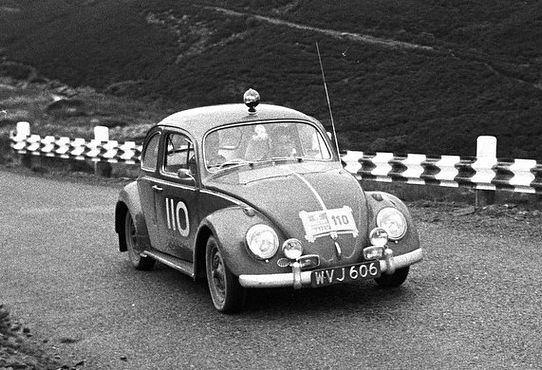
1961
6/7 January 1961 - Welsh National Rally (South Wales AC) – Overall: 1, A Griffiths/D M Stone (Austin-Healey 100/6) 15m35s; 2, J M Easten/G Robson (Sunbeam Rapier) 17m11s; 3, Anne Hall/Val Domleo (Ford Anglia) 17m38s; 4, R Michaelkiewiez/E Clark (Triumph TR) 23m17s; 5, A E Bengry/S Skeffington (Volkswagen) 30m38s; 6, R B Sutcliffe/R Dixon (Volkswagen) 31m55s; 7, B S Harding/H Liddon (MGA) 34m12s; 8, W D Rice/S Turner (MGA) 35m02s; 9, Pat Moss/S Turner (Austin-Healey Sprite) 35m41s; 10, A W Gorst/M W Roberts (Volkswagen) 36m 25s. Up to 1000cc saloons: 1, Anne Hall/Val Domleo (Ford Anglia); 2, J H Partridge/M Briton (Triumph Herald); 3, A Hobson/G Haggie (Ford Anglia). Over 1000cc saloons: 1, J M Easten/G Robson (Sunbeam Rapier); 2, A E Bengry/S Skeffington (Volkswagen) 30m38s; 3, R B Sutcliffe/R Dixon (Volkswagen). Up 1600cc GT: 1, B S Harding/H Liddon (MGA); 2, W D Rice/S Turner (MGA); 3, Pat Moss/S Turner (Austin-Healey Sprite). Over 1600cc GT: 1, A Griffiths/D M Stone (Austin-Healey 100/6); 2, R Michaelkiewiez/E Clark (Triumph TR); 3, R Clift/B Lockyear (Triumph TR). Bengry was 5th overall and 2nd in class afer losing time to change to studded tyres and trying to reach a control that had been cancelled.
4/5 February 1961 - Cat’s Eyes National Rally (Thames Valley AC) – Overall: 1, G D Grimshaw/B Melia (Triumph TR3A) 135; 2, R Michaelkiewicz/E Clark (Triumph TR3A) 160; 3, J H Partridge/M P W Britton (Triumph Herald) 200; 4, Dr J T Spare/J E Bailey (Singer Gazelle) 210; 5, M V Mackie/J W Histon (Austin A40) 220; 6, G H F Parkes/G W Howarth (Austin-Healey 3000) 230. Class winners: 1, J H Partridge/M P W Britton (Triumph Herald); 2. Dr J T Spare/J E Bailey (Singer Gazelle); 3, R N Richards/G C Davies (Ford Zephyr); 4, V H Elford/M T Butler (Austin A35); 5, N R Pocock/E D Lee (Austin A55); 6, G D Grimshaw/B Melia (Triumph TR3A). Bengry/Sheffington gained 40m penalty for not going down a track which had a control sited on it. So determined were the organisers to find the winner on the roads, the overall winner lost 27 minutes.
25/26 February 1961 - Express & Star National Rally (Wolverhampton & South Staffs CC) – Overall: 1, Brian Harper/Ron Crellin (Morgan) 0 (17.4); 2, Pat Moss/Stuart Turner (SAAB 96) 0 (17. ; 3, A T (Tony) Fisher/J R Thomas (Austin) 0 (19.2); 4, Bill Bengry/David Skeffington (Volkswagen) 0 (19.2); 5, Peter Astbury/Keith Binns (Triumph) 0 (20.6); 6, John La Trobe/Julian Chitty (Morris) 10 (18.6); 7, Alex Griffiths/David Stone (Triumph) 10 (19.6); 8, C R (Bob) Aston/Gerry Cooper (SAAB) 20 (19.
; 3, A T (Tony) Fisher/J R Thomas (Austin) 0 (19.2); 4, Bill Bengry/David Skeffington (Volkswagen) 0 (19.2); 5, Peter Astbury/Keith Binns (Triumph) 0 (20.6); 6, John La Trobe/Julian Chitty (Morris) 10 (18.6); 7, Alex Griffiths/David Stone (Triumph) 10 (19.6); 8, C R (Bob) Aston/Gerry Cooper (SAAB) 20 (19. ; 9, John Sprinzel/Mike Wood (Austin-Healey Sprite) 40 (18.2); 10, J Roy Kirkham/Horace Beighton (Austin) 40 (18.2); 11, Phil Simister/Roy Fidler (Ford) 50 (19.4); 12, C P James/R Johnson (SAAB) 50 (20.0); 13, T A Gold/John Hopwood (Austin-Healey) 60 (17.6); 14, G Don Grimshaw/Brian Melia (Triumph) 60 (17.
; 9, John Sprinzel/Mike Wood (Austin-Healey Sprite) 40 (18.2); 10, J Roy Kirkham/Horace Beighton (Austin) 40 (18.2); 11, Phil Simister/Roy Fidler (Ford) 50 (19.4); 12, C P James/R Johnson (SAAB) 50 (20.0); 13, T A Gold/John Hopwood (Austin-Healey) 60 (17.6); 14, G Don Grimshaw/Brian Melia (Triumph) 60 (17. ; 15, Romek Michaelkiewicz/E Clarke (Triumph) 60 (18.2). (Note. Ties decided by test time, shown in brackets) The event was famed for the closeness of the result, and for a major protest which led to rule changes in the blue book. Pat Moss, Brian Harper and Bill Bengry (VW Beetle) were all clean on the road except for lateness penalties awarded to Brian Harper and others as a result of a delay caused by avoiding a blocked road. The problem was due to recent heavy rains around Wenlock Edge which had caused the Byne Brook to flood. The local council had erected a sign before the ford in 4788 (now culverted! - CJK) saying 'Road Blocked'. Some competitors, including Harper and Moss, heeded the warning, went the long way round and incurred penalties for lateness at the next control 19. Bengry, and others, drove to the ford and found that it was actually passable and arrived at the control on time.
; 15, Romek Michaelkiewicz/E Clarke (Triumph) 60 (18.2). (Note. Ties decided by test time, shown in brackets) The event was famed for the closeness of the result, and for a major protest which led to rule changes in the blue book. Pat Moss, Brian Harper and Bill Bengry (VW Beetle) were all clean on the road except for lateness penalties awarded to Brian Harper and others as a result of a delay caused by avoiding a blocked road. The problem was due to recent heavy rains around Wenlock Edge which had caused the Byne Brook to flood. The local council had erected a sign before the ford in 4788 (now culverted! - CJK) saying 'Road Blocked'. Some competitors, including Harper and Moss, heeded the warning, went the long way round and incurred penalties for lateness at the next control 19. Bengry, and others, drove to the ford and found that it was actually passable and arrived at the control on time.
At the finish Bengry was initially declared winner but then the stewards upheld a protest by Harper that all time penalties on that section should be scrapped owing to the presence of the 'official' council notice. Harper was then judged winner, but the judgement was submitted to the RAC competitions committee tribunal for a final adjudication. The tribunal gave its result on 15th March: chairman John Gott, an experienced international rally driver (Works Healey 3000) as well as being the Chief Constable of Northamptonshire ( !! ) declared that "Irrespective of whether a sign is mandatory, we think it is most important especially in these days of criticism against rallies, that competitors should obey road signs. The principle that seems to us so important is that no competitor should gain advantage by disregarding a sign even if that sign was put up for information only." So Bengry lost his place and Harper was awarded the top spot.
25/26 March 1961 - Hopper National Rally Maidstone & Mid-Kent MC) – Overall: 1, D Seigle-Morris/V Elford (Austin-Healey Sebring Sprite) 0; 2, M Rogers/N Chitty (Ford Zephyr) 0; 3, I D L Lewis/D Stone (Triumph Herald) 1; 4, J Steadman/A Edwards (Sunbeam Rapier) 2; 5, J Easten/G Robson (Austin-Healey Sprite) 3; 6, G P Crabtree/Val Domleo (Ford Anglia) 5; 7, R N Richards/G Davies (Ford Zephyr) 5; 8, J Campbell/M Butler (Austin 7) 7; 9, S P Clipston/J Godfrey (Volkswagen) 7; 10, C W Dart/P D Donovan (Volkswagen) 7; 11, E J Hatchet/R Britt (Triumph Herald) 8; 12, C M Williams/J Brown (Austin 7) 7; 13, B Harper/R Crellin (Morgan) 8; 14, J la Trobe/P Roberts (Morris Mini-Minor) 8; 15, D C Furneaux/J L Owen (Austin A55) 9. Bengry/Sheffington (Volkswagen) had early problems with slipping clutch and also windscreen clouded over due to being struck by stone. May not have been classified as finishers.
31 March/1 April 1961 - Highland National Rally (Scottish Sporting CC) – Overall: 1, D G Bennett (Sunbeam Rapier)
31 March/3 April 1961 - Circuit of Ireland International (Ulster AC) – Overall: 1, P Hopkirk/J Scott (Sunbeam Rapier) 31.2; 2,R J Woodside/T Harryman (Austin-Healey Sprite) 42.8; 3, M J O’Mahoney/R H Tilson (Volkswagen) 42.8; 4, F A Robinson/J R Davidson (Volkswagen) 70.0; 5, D Cullen/J Cullen (NSU) 70.8; 6, T A Burke/J D O’Leary (NSU) 96.2; Class I, Touring cars up to 850cc): 1, D Cullen/J Cullen (NSU) 70.8; 2, T A Burke/J D O’Leary (NSU) 96.2; 3, C WAndrews/B McMeekin (Morris Mini-Minor) 117.6; Class II, Touring cars 850cc to 1300cc: 1, M J O’Mahoney/R H Tilson (Volkswagen) 42.8; 2, F A Robinson/J R Davidson (Volkswagen) 70.0; 3, T O O’Sullivan/F B Geary (Volkswagen) 114.0; Class III, Touring cars 1300cc to1600cc: 1, P Hopkirk/J Scott (Sunbeam Rapier) 31.2; 2, C A Gunn/R Cusack (Hillman) 182.6; 3, C W S Austin/M A Graham (Singer) 183.6; Class IV, Touring cars over 1600cc: 1, G H F Parkes/G W Howarth (Jaguar) 135.0; 2, Major J W Appleton (Vauxhall) 226.6; 3, E A Lucas/A J H Lucas (Vauxhall) 251.8; Class V, Grand Touring cars up to 1300cc: 1, R J Woodside/T Harryman (Austin-Healey Sprite) 37.4; 2, I Woodside/B Crawford (Austin-Healey Sprite) 104.4; 3, B Bengry/D Skeffington (Volkswagen) 113.9; Class VI, Grand Touring cars over 1300cc: 1, H J O’Connor-Rorke/J Cuff (Jaguar) 138.4; 2, J A D Chesney/W J G Clarke (Triumph) 152.6; 3, C W Eyre-Maunsell/A D M Greves (Sunbeam Alpine) 225.8; Class VII, Touring Class: 1, B Lambe/A Marshall (Morris) 567.0; 2, P G McConnell/A Cairns (Singer) 671.4; 3, P G Thompson/R P Elliott (Austin) 761.4
7/8 April 1961 - Birmingham Post National Rally (Midland AC) – Overall: 1, R Michalkiewicz/J R C Brown (Triumph TR3A) 0/40.0; 2, P J Smith/G Bryant (Austin-Healey) 0/40.9; 3, R Gibbon/R Binns (Volkswagen) 0/41.4; 4, Anne Hall/Val Domleo (Ford Anglia) 0/43.6; 5, Pat Moss/S Turner (SAAB) 0/44.5; 6, Pauline Mayman/D Hewirr (Triumph Herald) 0/44.9; Class 1, up to 1000cc Experts: 1, R Gibbon/R Binns (Volkswagen) 0/41.4; 2, Anne Hall/Val Domleo (Ford Anglia) 0/43.6; 3, Pat Moss/S Turner (SAAB) 0/44.5; 4, T S Baker/Dr W P Dallas-Ross (Austin-Healey Sprite) 20/40.4; 5, J Sprinzel/R Abbott (Mini) 20/49.0; Class 2, over 1000cc Experts: 1, R Michalkiewicz/J R C Brown (Triumph TR3A) 0/40.0; 2, P J Smith/G Bryant (Austin-Healey) 0/40.9; 3, R Gibbon/R Binns (Volkswagen) 0/41.4; 4, R N Richards/G C Davies (Ford Zephyr) 0/47.3; 5, K C Chambers.P H Marshall (Ford Zephyr) 0/50.0; Class 3, up to1000cc others: 1, J H Privet/J E Botham (Austin Seven) 100; 2, B W Seaman/C P Hanson (Triumph Herald) 180; 3, R McBride/D Barrow (Ford) 190; 4, P T Frost/C R L Child (Ford Anglia) 920; 5, H G Maund/N C Nelder (Austin Seven) 1090; Class 4, over 1000cc others: 1, F Moss/A B Price (Riley) 250; 2, D J Friswell/M Pritchard (MGA) 370; 3, D Moreton/J E Furniss (Volkswagen) 750; 4, Mrs W M Brampton/L A Brampton (Ford) 800; 5, A W Blore/C Hicks (Austin-Healey) 1030
12/14 May 1961 - Morecambe Rally (Lancashire AC) – Overall: 1, G Don Grimshaw/Brian Melia (Austin-Healey 3000) 14; 2, Reg McBride/Don Barrow (Ford Anglia) 19; 3, Julian Easten/Graham Robson (Austin-Healey Sprite) 25; 4, M Pickersgill/Mike Kempley (MGA) 27; 5, John La Trobe/Peter Roberts (Mini) 29; 6, Roy Fidler/John Hopwood (Ford Anglia) 29; 7, F Crossley/? (Mini) 32; 8, Brian Harper/Ron Crellin (Austin-Healey Sprite) 35; 9, G Humble/D Day (Triumph TR3) 38; 10, John E Oldham/Frank Davies (Mini) 47; 11, B F Mitton/J R Norton (Porsche) 49; 12, H A Jacobs/P Dingley (Triumph TR3) 58; 13, S Annis/R Binns (Triumph TR3) 58; 14, Pat G Giblett/Stuart J Turner (Triumph TR3) 59; 15, George Benson/Ray Heaton (Triumph TR3) 111. Bengry/Skeffington rolled, put it back on its wheels and only dropped 11 minutes on that section – did they finish?
22/26 May 1961 - Scottish International Rally (Royal Scottish AC) – Overall: 1, John D L Martin (Sunbeam Alpine); Class 1: 1, P R J Harding; Class 2: 1, F G A Hibbert (Morris Mini-Minor); 2, Martin Baines; Class 3: 1, Rex Neate, 2, Dr P T Walker; Class 4, 5 & 6: 1, R S Taylor; Class 7, 9 & 10: 1, David R Hall (Austin-Healey Sprite); Class 8: 1, Miss Margaret W MacKenzie (Austin Seven); 2, James Hall; Class 12 & 13: 1, John D L Martin (Sunbeam Alpine); 2, Dr Stuart Parker
24/25 June 1961 - Plymouth National Rally (Plymouth MC) – Overall: 1, Dr John T Spare/John F Bailey (Singer Gazelle) 0; 2, Geoff Mabbs/David Mabbs (Triumph Herald) 0; 3, Jock S Huggins/John R C Brown (Ford Anglia) 0; =4, P G Giblett/David Stone (Triumph TR3A) 0; =4, G Don Grimshaw/Brian Melia (Triumph TR) 0; 6, John H Partridge/Mike P Britton (Mini) 0; 7, A E (Bill) Bengry/David Skeffington (Volkswagen) 0; 8, D Silverthorne/F Fisher (Porsche) 1; 9, Mike Sutcliffe/Roy Fidler (Mini) 2; 10, Romek Michalkiewicz/E Clarke (Triumph TR3A) 3; 11, John Grimshaw/David Ralphs (Sunbeam Alpine) 4; 12, Peter E Astbury/Keith Binns (Morgan) 5; 13, Eric Jackson/Ken Joseph (Ford Zephyr) 6; 14, L Turk/Julian Chitty (Ford Zephyr Mk1) 7; 15, C P James/R Johnson (SAAB) 8
19/20 August 1961 - Bolton National Rally (Bolton-le-Moors CC) – Overall: 1, A T (Tony) Fisher/Brian Melia (Austin Seven); 2, A E (Bill) Bengry/David Skeffington (Volkswagen); 3, C R (Bob) Aston/Graham Robson (SAAB); 4, Roger B Sutcliffe/Roy Dixon (Volkswagen); 5, Brian Harper/Ron Crellin (Austin-Healey Sprite); 6, John La Trobe/Peter Roberts (Mini); 7, R W Wilson/G Bickerton (Ford Anglia); 8, Reg McBride/Don Barrow (Ford Anglia); 9, Stan Annis/R Binns (Austin-Healey Sprite); 10, Derek Astle/Saville Woolley (Austin-Healey); 11, Peter E Astbury/Keith Binns (Morgan); 12, Mrs Pauline Mayman/D Hewitt (Triumph Herald); 13, J Handley/J Rollason (Austin-Healey Sprite); 14, Geoff Mabbs/David Mabbs (Triumph Herald); 15, G H F Parkes/G W Howarth (Austin-Healey)
22/23 September 1961 - London Rally (London MC) – Overall: 1, Reg McBride/Don Barrow (Ford Anglia) 0; 2, David Seigle-Morris/John R C Brown (Morris Mini-Minor) 0; 3, Stan Annis/Richard Binns (Sebring Sprite) 0; 4, Roy Fidler/John Hopwood (Ford Anglia) 0; 5, John Sprinzel/J Mike Wood (Sebring Sprite) 1; 6, Geoff J Mabbs/David Mabbs (Triumph Herald) 2; 7, Brian Harper/Ron Crellin (Sebring Sprite) 3; 8, Mike Sutcliffe/G Phil Crabtree (Austin 7) 3; 9, David R Hiam/J A (Tony) Ambrose (Morris Mini-Minor) 6; 10, Stephen P Clipston/John King (Volkswagen) 6; 11, A E (Bill) Bengry/David Skeffington (Volkswagen) 8; 12, Peter E Astbury/Keith Binns (Morgan Plus 4) 10; 13, B Harding/Henry Liddon (MGA) 11; 14, Jphn H Partridge/M Britton (Morris Mini-Minor) 13; 15, T S Baker/W P Dallas-Ross (Austin-Healey Sprite) 13
14/15 October 1961 - Bournemouth National Rally (West Hants & Dorset CC) – Overall: 1, John La Trobe/Vic Elford (Mini) 300; 2, C R (Bob) Aston/A A Graham Robson (SAAB) 380; 3, John H Partridge/Mike P W Britton (Mini) 430; 4, D de Souza/P Baker (Mini) 560; 5, G Don Grimshaw/Brian Melia (Austin-Healey Sprite) 740; 6, A E (Bill) Bengry/David Skeffington (Volkswagen) 850; 7, Miss Pat Moss/Mike Butler (SAAB 96) 1020; 8, Dr John T Spare/John F Bailey (Singer Gazelle) 1260; 9, Mrs Valerie Harper/Miss Val Domleo (Sebring Sprite) 1600; 10, Stan Annis/Richard Binns (Sebring Sprite) 1600; 11, Ken Piper/David Stone (DKW Junior) 3460; 12, H H Faure/M A Pirie (Mini) 4210; 13, B C Russell/Miss A L Scott (Austin-Healey 3000) 5080. (No other finishers)
13/18 November 1961 - RAC Rally (RAC) – Overall: 1, E Carlsson/J R C Brown (SAAB 96) 89; 2, Miss P Moss/Miss A Wisdom (Austin-Healey 3000) 129; 3, P Harper/I J Hall (Sunbeam Rapier) 150; 4, P Hopkirk/J Scott (Sunbeam Rapier) 166 Class 1: E Carlsson/J R C Brown (SSAB 96) 89; 2, J H Ray/J G Hopwood (Austin Seven) 204; 3, Mrs A Hall/Miss V Domleo (Ford Anglia) 204; Class 2: 1, P Harper/I J Hall (Sunbeam Rapier) 150; 2, P Hopkirk/J Scott (Sunbeam Rapier) 166; 3, G Anderson/D Johns (Volvo PV544S) 184; Class 3: 1, R Baxter/I Miller (Humber Super Snipe) 262; 2, E Jackson/N Donovan (Ford Zephyr) 270; 3, G King/C Sproxton (Ford Zephyr) 292; Class 4: 1, D Astle/P Roberts (MG Midget) 217; 2, M Sutcliffe/R Fidler (MG Midget) 239; 3, M T Marsden/R Thorpe (Triumph Herald) 365; Class 5: 1, H J Walter/J Sprinzel (Porsche Carrera) 266; 2, W L Morrison/A Finlay (MGA 1600 Mk2) 301; 3, J Grimshaw/D H Ralphs (Sunbeam Alpine) 462; Class 6: 1, Miss P Moss/Miss A Wisdom (Austin-Healey 3000) 129; 2, D Seigle-Morris/A Ambrose (Austin-Healey 3000) 170; 3, H J O’Connor-Rorke/J Gott/M Kempley (Ford Zephyr) 295
2/3 December 1961 - Rally of the Vales National (Swansea MC) – Overall: 1, Alex Griffiths/David Stone (Triumph Herald Coupé); 2, Geoff Flint/Geoff Kendall-Jackson (SIMCA); 3, A E (Bill) Bengry/David Skeffington (Volkswagen); 4, David Davies/Denis Cardell (Mini Cooper); 5, B Harding/Henry Liddon (MGA); 6, Pat Giblett/Stuart J Turner (Mini); 7, Stephen Clipston/John King (Volkswagen); 8, Reg Galpin/John Owen (?); 9, Ralph Broad/B S Hughes (Mini); 10, D de Souza/P Baker (?); 11, J Dodd/Frank Rutter (Wolseley 1500); 12, Phil Simister/Pat Lichtensteiger (Ford Anglia); 13, John La Trobe/Julian Chitty (Mini); 14, Stan Pateman/Wilkinson (Triumph TR3A); 15, S D Silverthorne/B Wadham (?) 63; Class A: 1, Alex Griffiths/David Stone (Triumph Herald Coupé); Class B: 1, R Bodle/J R C Brown; Class C: 1, David Davies/Denis Cardell (Mini Cooper)
Class D: 1, Stan Pateman/Wilkinson (Triumph TR3A). There is a suggestion in the Motoring News paper dated 7th December 1961 that Bengry's 4th place finish in the Rally of the Vales the previous weekend secured him his back to back championship win with 35 points. Pat Moss was 2nd overall with 25, Anne Hall 3rd with 24 and Reg McBride 4th on 23 points. These are a second set of results published in Motoring News dated 28 December 1961.
I believe Bill drove two different VW Beetles in 1961 - WVJ 606 which he had also driven in 1960, and was used at least on the 1961 Welsh Rally, and XVJ 230 which he used at least on the 1961 Express & Star, London and RAC. Bill won both the Motoring News and BTRDA Championships in 1961 in addition to the BRC. but am unsure if he drove a Simca in any events in 1961
Picture from the Motoring News 23rd Feb 1961
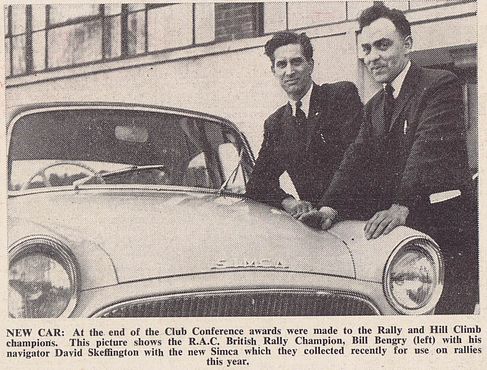
1961 RAC Rally
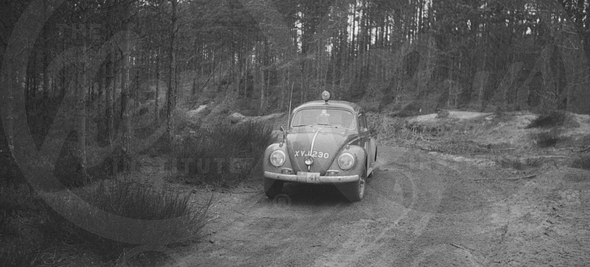
The cars are modified/resprayed partsworks with homemade decals:
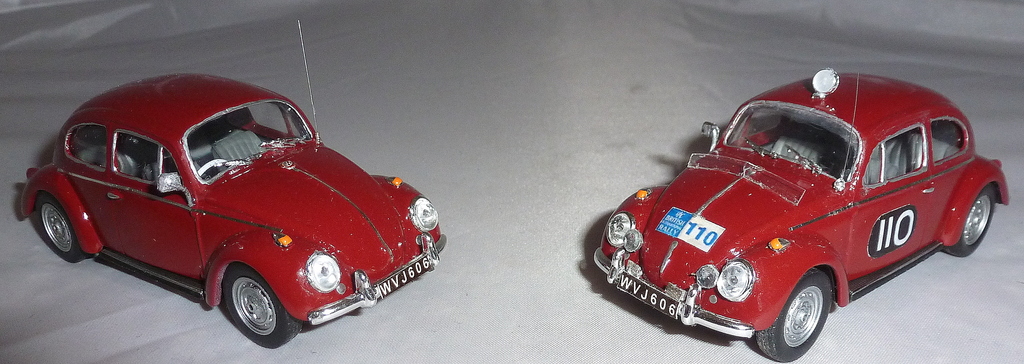
1962
Tony Fisher was a Privateer rally driver, with clearly a wealth of talent and someone who knew how to hustle a Mini Cooper.
With grateful thanks to Steve Entwistle who I met via Facebook and who has dived in to his archives for me, to the best of my knowledge/investigations, in 1962 he drove a 997cc Mini Cooper on all BRC events, apart from on the RAC rally where he drove a Reliant Sabre 4 (retired with a broken rear axle). He finished first in the opening event of the 1962 season (Welsh National), then 3rd places on the next 2 rallies (Cats Eyes and Express & Star) and 2nd on the 4th event (Margate National Hopper). After a great start to the season he was either a did not enter, DNF or outside of the points in the Birmingham Post, and unknown result in the CoI and he was either a did not enter, DNF or outside of the points in the Morecombe. Tony was back on form in the 8th event of the season finishing 2nd (Scottish), and one better on the next 2 events taking the top step on the podium (Plymouth and Bolton). A minor fall from grace happened on the next event where he finished 2nd (London), then back to the top step for the 12th event of the season (Bournemouth). After the retired outing in the Reliant on the RAC, Tony capped off an amazing year with a 3rd placed finish in the 14th round (Rally of the Vales). Truly a worthy winner of the 1962 BRC. Tony also won the BTRDA and Motoring News Championships in 1962.
1962 Bolton
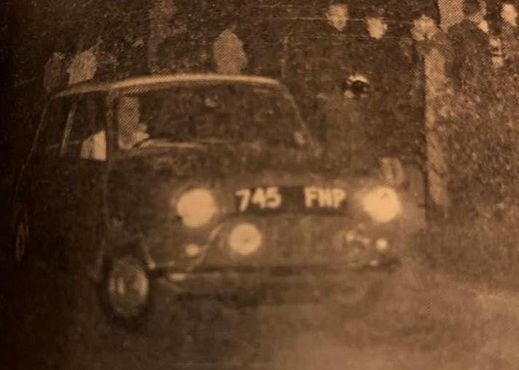
1962 RAC
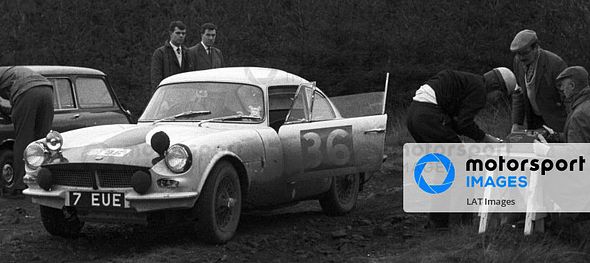
1963
Tony used the same Mini in 1963 but added to it an International Grp 2 spec Cooper 1071cc car which was not eligible for BRC events other than the RAC rally. 1962 was going to be a near impossible act to follow, but Tony got off to a great start by winning the season opener again (Cats Eyes). He backed that up with another 1st place on the 2nd event (Express and Star). A DNF/Unknown finish at the 3rd event (Margate National Hopper) was followed by a 2nd place at the 4th round (Birmingham Post). The 5th event saw Tony back behind the wheel of the Reliant Sabre 4 where he finished 3rd in class (CoI). Round 6 was cancelled due to lack of entries (Morecombe) and there then followed 3 events where he was outside of the top 10, but I don't know if he was a DNF (Scottish, Plymouth and Rally of the Vales). The 10th event of the season saw no results printed due to multiple protests, and whilst I don’t believe the 1071cc car finished the 11th round (RAC), his early season heroics where enough to secure Tony a back to back BRC overall win in 1963. Tony also won the BTRDA in 1963.
1963 Express and Star
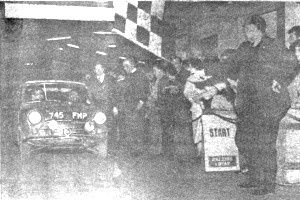
1963 RAC
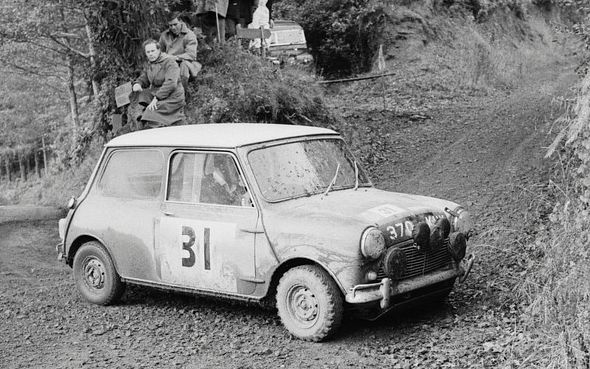
These are modified/resprayed partsworks with homemade decals. One day if the gods are smiling, I hope to be able to source a base model to be able to make the Reliant Sabre 4's from the 1962 RAC and 1963 Circuit of Ireland.
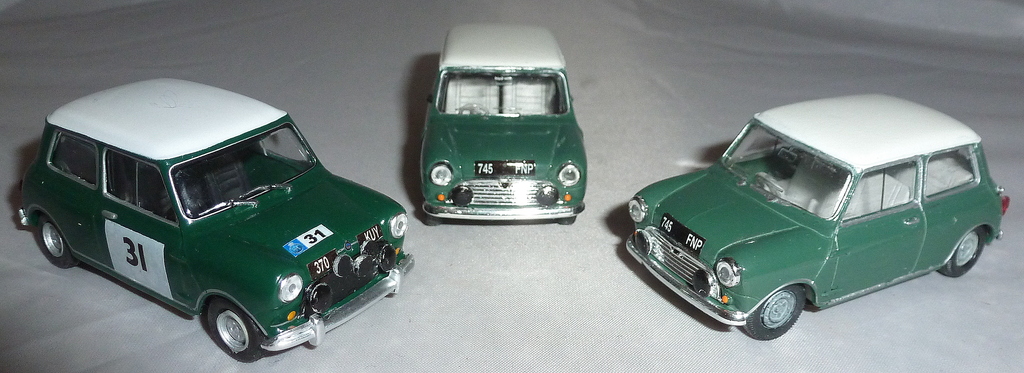
At the start of the ‘60s the sport took a new and significant turn when special stages on the newly available Forestry Commission roads for the big events. Night navigation however remained a dominant part of the series, the qualifying rounds now intermingled with the classic international rallies in the various British regions. Then a much greater availability of forest stages during the ‘60s increased the opportunities of developing the special stage sport. This in turn helped give a new and stronger identity to the BRC which at the time was being a little eclipsed by the popularity of the concurrent Motoring News road rally championship.
1960 and 1961
When 12 year old Bill Bengry was fined £25 for driving a car on the highway in the 1930's it looked as though his motoring life had got off to a bad start. But from this expensive beginning Bill has come a long way in the world and reached heights in motor sport which he never dreamt possible at that tender age,
Bill, who lived in Leominster, is the possessor of over 200 cups and trophies won in local, national and international motoring circles and has the distinction of being the first man to be RAC British Rally Champion for two consecutive years.
Through hard work and an indomitable will he has made his mark in sport and business. Time and time again he has come through against the odds and is a man to relish a challenge
A sleeping interest in motor sport was first aroused in Bill in 1947 when his brother-in-law was a works driver for Coopers who were dominating their class in races and hill-climbs.
He competed in many hill-climbs and rallies. He says now, "The rallies were longer in those days and relied mainly on good navigation, and I had a job to find a navigator.
"Modern rallies lay greater emphasis on the ability of the driver. There are so many good navigators that this has to be so.
"Times are now taken down to seconds - not just average speed - and on the special timed stages of a rally you must have a good driver and a car with a good performance."
He began to take up serious rally driving in 1954 when he took on the Volkswagen agency.
Although the Volkswagen was considered by experts to be unsuitable for rally work, within six years Bill was RAC British Rally Champion, Motoring News champion and the BTRDA Gold Star champion. This was achieved against stiff opposition and he was the first driver to win all three.
It was in 1960 that he took part in his first international - the RAC Rally of Britain - and he considers that it was in this event that he gave his best performance. Certainly it put him into the "big time" of rallying.
As his navigator he had David Skeffington, who has shared many of his successes, and together they competed against international stars in Bill's privately entered Volkswagen.
From the start the little red car was considered to have no chance and was number 110. But after the first night it was one of only three cars not to lose points.
Then ill-fortune struck. From lying third Bill dropped to eighth due to five tyre bursts on special stages. They finished the rally in this position and were second in their class.
By Jeremy Finney. Taken from the Hereford Evening News, Friday September 24, 1965.
Although I can no longer trace the article, I did read at one stage that in one year (1960 or 1961) a river crossing was so flooded that most cars came a cropper trying to ford it – not Bill and the Bettle – they floated across!!
The only BRC event in 1960 which Bill won outright was the season finale, Rally of the Vales.
1960
8/9 January 1960 - Welsh National Rally (South Wales AC) – Overall: 1, Brian Harper/Ron Crellin (Morgan) 67; 2, Tiny Lewis (Triumph Herald) 109; Class winners: Casewell (Austin A99); John la Trobe (Volvo)
6/7 February 1960 - Cat’s Eyes Rally (Thames Estuary AC) – Overall: 1, R N Richards/G C Davies (Riley 1.5) 10; Class A: 1, G F Pike (Morris Traveller) 15 (838); 2, H A R Nash (Ford Anglia) 15 (858); 3, S P Clipston (Volkswagen) 20; Class B: 1, S P A Freeman (Austin Cambridge) 20; 2, E Malkin (Sunbeam Rapier) 23; 3, K W Barrow (Volvo) 40; Class C: 1, K J Freeman (Citroën) 50; 2, J Hayes (Sunbeam Talbot 90) 55; Class D: 1, R Anderson (Ford Zephyr) 15; 2, S Dacre-Lacey (Jaguar) 65; Class E: 1, J W Scott (Triumph Herald) 90; 2, C M M Williams (Austin-Healey Sprite) 103; 3, A H Gray (Morris) 115; Class F: 1, G Kirkcaldie (Sunbeam Alpine) 25; 2, J H la Trobe (Volvo) 45; Class G: 1, B Harper (Morgan) 30; 2, D Seigle-Morris (Triumph TR3A) 35; Class H: 1, T J Mockeridge (Austin-Healey) 55
5/6 March 1960 - Express & Star Rally (Wolverhampton & South Staffs CC) – Overall: 1, T A Gold/S Turner (Austin-Healey Sprite) 40; 2, Mrs Mayman/Miss Val Domleo (Morgan 1991cc) 90; 3, Bill Bengry (SIMCA 1200) 100; Class winners: A P Bridge (Austin-Healey Sprite) 400; A T Fisher (Austin Seven) 110; E Malkin (Sunbeam Rapier) 100; Brian Harper (Morgan 1991cc) 120
2/3 April 1960 – Hopper Rally (Maidstone & Mid-Kent MC) – Overall: 1, Pat Moss/S Turner (Austin A40) 3; 2, D Grimshaw/B Melia (Triumph TR3) 4; 3, R N Richards/G C Davies (Riley 1.5) 6; 4, S Clipston/M T Godfrey (Volkswagen) 6; 5, R J G Smith/J Dorville (Sunbeam Rapier) 8; 6, D Seigle-Morris/V H Elford (Triumph TR3A) 9; 7, E Malkin/A A G Robson (Sunbeam Rapier) 9; 8, H J Harper/J Mace (MGA) 9; 9, R A Clift/B F Lockyear (Austin-Healey) 12; 10, I D L Lewis/R Porter (Triumph Herald) 18; 11, G Mabbs/D Mabbs (Triumph Herald) 21; 12, D H Ray/G F Babra (Singer Gazelle) 21; 13, H A Appleby/Dr R L McGhie (Austin-Healey Sprite) 24; 14, J Steadman/A Edwards (MG Magnette) 24; 15, J Poulton/N Church (?) 28
8/9 April 1960 - Birmingham Post Rally (Midland AC) – Overall: 1, M Sutcliffe/S Woolley (Morris) 49.0; Experts up to 1000cc: 1, M Sutcliffe/S Woolley (Morris) 49.0; 2, G J Mabbs/D Mabbs (Triumph) 49.8; 3, M J Webb/D Holland (Triumph) 50.2; 4, I A L Lewis/R Porter (Triumph) 51.4; 5, J F S Poulton/K Coombes (Auto Union) 59.6; Experts over 1000cc: 1, B Harper/R Crellin (Morgan) 50.2; 2, Mrs E P Mayman/Miss V Domleo (Morgan) 51.4; 3, G H F Parkes/G W Howarth (Austin-Healey) 52.8; 4, I Casewell/A Austin (Austin) 58.2; 5, J D Grimshaw/B Melia (Triumph TR3A) 60.4; Novices up to 1000cc: 1, B Evans/M Annett (Austin) 373.8; 2, Mrs V M Harper/I R Smith (Triumph) 389.2; 3, R A Christopher/A Youngs (Austin) 404.0; 4, T J Smallman/Miss E A Newton (Morris) 656.2; 5, D M Clayson/J Humphries (Triumph) 737.4; Novices over 1000cc: 1, W Fieldhouse/W Small (Volkswagen) 140.7; 2, P J Marr/P A D Marr (Triumph) 262.2; 3, D R Blankstone/B Pickering (MG) 375.6; 4, R E Abbott/Miss J M Law (Sunbeam) 473.8; 5, T J Hammond/P A Hammond (Triumph TR2) 490.4
There were 12 clean sheets so positions decided on tests.
15/18 April 1960 – Highland Rally (Scottish Sporting CC) – Overall: 1. J A Morrison (Triumph Herald); Production Touring Cars up to 1000cc: 1, J A Morrison; 2, R M Pettie; 3, Miss Jacqueline Walker; Production Touring Cars 1000cc to 1600cc: 1, R Graham (Riley 1.5); 2, J Hardie Brown (Riley 1.5); 3, W G Bennett (Hillman Minx); Production Touring Cars 1601cc and over: 1, J S Collins (Humber Hawk); 2, T Paton (Jaguar 3.4); Special Touring Cars and Production Grand Touring Cars up to 1000cc: 1, I McIntyre (Austin-Healey Sprite); 2, R G MacCrae (Austin-Healey Sprite); Special Touring Cars and Production Grand Touring Cars 1000cc to 1600cc: 1. T W Currie (MGA); 2, Ian T Brown (Sunbeam Alpine); 3, K W Moore (MGA); Special Touring Cars and Production Grand Touring Cars 1601cc and over: 1, K R Sturrock (Morgan Plus 4); 2, Mrs Audrey Woolley (Triumph TR3A); 3, D Sisson (Triumph TR3); Other cars: 1. J D Hamilton (Morris Eight)
15/19 April 1960 - Circuit of Ireland (Ulster AC) – Overall: 1, A J L Boyd/M N Johnstone (Austin-Healey Sprite)
13/15 May 1960 – Morecambe Rally (Lancashire AC) – Overall: 1, Mrs Anne Hall/Miss Val Domleo (Ford Anglia) 14; 2, D Seigle-Morris 18; 3, J Waddington 21; 4, J R Kirkham (Austin-Healey Sprite) 21. Class winners: R J Winder 378; A Hall; E Hunt; E Malkin; J R Kirkham; D Seigle-Morris. Eventual championship winner Bill Bengry (SIMCA) retired early
6/10 June 1960 – Scottish National Rally (Royal Scottish AC) – Event cancelled due to lack of entries
24/25 June 1960 – Plymouth Rally (Plymouth MC) – Overall: 1, D de Souza (Morris Mini-Minor); 2, D Silverthorne (Porsche); 3, E Jackson (Triumph Herald). 12 crews were clean on road penalties, positions decided on tests
13/14 August 1960 – Bolton Rally (Bolton le Moors CC) – Overall: 1, G D Grimshaw/B Melia (Triumph TR3) 6; 2, R N Richards/G C Davies (Riley 1.5) 6; 3, Mrs A Hall/Miss V Domleo (Ford Anglia) 6; 4, A Edmondson/J Middleton (Austin 7) 9; 5, M Sutcliffe/G P Crabtree (Morris Minor) 11; 6, B W Izard/A G Robson (Triumph Herald) 12; 7, G H F Parker/G W Howarth (Austin-Healey) 13; 7, A W Hobson/S Wooley (Ford Anglia) 17; 8, M H Pickersgill/M Kempley (MGA) 18; 9, B Harper/R Crellin (Morgan) 21; 10, E R V Walker/M A Tarratt (Renault) 25; 11, G J Mabbs/D Mabbs (Triumph Herald) 26; 12, J B Kirkham/H Beighton (Austin-Healey Sprite) 27; 13, H A R Nash/D Stone (Triumph Herald) 29; 14, R C Walker/F Trickett (Triumph TR3) 29; 15, A C Taylor/G Parker (Triumph TR3) 30; 16, J N Wood/B Hughes (Ford Anglia) 31; 17, A P Bridge/M R Milchreast (Austin-Healey Sprite) 31; 18, P F Steiner/R Cumbers (Austin A40) 31; 19, M J Webb/D H Holland (Triumph Herald) 32. Ties decided by furthest cleanest
7/8 October 1960 – London Rally (London MC) – Overall: 1, J R Kirkham/H Beighton (Austin-Healey Sprite) 1; 2, J Easten/A A Robson (Sunbeam Rapier) 13; J Steadman (Sunbeam Rapier) 14; I Lewis (Triumph Herald) 20; A Fisher (Austin 7) 25; D Grimshaw (Triumph TR3) 30; W Hercock (Triumph TR3) 36; Mrs Mayman/D Hewitt (Triumph Herald) 37; F Snaylam (Austin-Healey Sprite) 61; E Brinkman (Jaguar 3.4) 111; Class A: 1, B Bengry/D Skeffington (SIMCA) 24; 2, J Shand/P Clapham (Vauxhall) 48; Class B: 1. B Harper/R Crellin (Morgan) 28; 2, G Parker/G Howarth (Austin-Healey 3000) 29; Class C: 1, C Williams/J Brown (Austin-Healey Sprite) 33
21/26 November 1960 – RAC Rally (RAC) – Overall: 1, E Carlsson/S Turner (SAAB) 0; 2, J Sprinzel/R Bensted-Smith (Sebring Sprite) 2 (23); 3, D Morley/E Morley (Austin-Healey 3000) 2 (25); 4, J Sears/W Cave (Jaguar 3.
3/4 December 1960 - Rally of the Vales (Swansea MC) – Overall: 1, B Bengry; 4, Brian Harper. No results published!
BRITISH RALLY CHAMPIONSHIP FINAL TOP TEN
Overall: 1, Bill Bengry (38); 2, Brian Harper (36); 3, Robin Richards (31); 4, Tiny Lewis (25); =5, Roy Kirkham (23); =5, Ann Hall (23); 7, Pauline Mayman (21); 8, Don Grimshaw (19); 9, Codge Malkin (18); 10, Julian Easten (17)
1960 RAC Rally

1961
6/7 January 1961 - Welsh National Rally (South Wales AC) – Overall: 1, A Griffiths/D M Stone (Austin-Healey 100/6) 15m35s; 2, J M Easten/G Robson (Sunbeam Rapier) 17m11s; 3, Anne Hall/Val Domleo (Ford Anglia) 17m38s; 4, R Michaelkiewiez/E Clark (Triumph TR) 23m17s; 5, A E Bengry/S Skeffington (Volkswagen) 30m38s; 6, R B Sutcliffe/R Dixon (Volkswagen) 31m55s; 7, B S Harding/H Liddon (MGA) 34m12s; 8, W D Rice/S Turner (MGA) 35m02s; 9, Pat Moss/S Turner (Austin-Healey Sprite) 35m41s; 10, A W Gorst/M W Roberts (Volkswagen) 36m 25s. Up to 1000cc saloons: 1, Anne Hall/Val Domleo (Ford Anglia); 2, J H Partridge/M Briton (Triumph Herald); 3, A Hobson/G Haggie (Ford Anglia). Over 1000cc saloons: 1, J M Easten/G Robson (Sunbeam Rapier); 2, A E Bengry/S Skeffington (Volkswagen) 30m38s; 3, R B Sutcliffe/R Dixon (Volkswagen). Up 1600cc GT: 1, B S Harding/H Liddon (MGA); 2, W D Rice/S Turner (MGA); 3, Pat Moss/S Turner (Austin-Healey Sprite). Over 1600cc GT: 1, A Griffiths/D M Stone (Austin-Healey 100/6); 2, R Michaelkiewiez/E Clark (Triumph TR); 3, R Clift/B Lockyear (Triumph TR). Bengry was 5th overall and 2nd in class afer losing time to change to studded tyres and trying to reach a control that had been cancelled.
4/5 February 1961 - Cat’s Eyes National Rally (Thames Valley AC) – Overall: 1, G D Grimshaw/B Melia (Triumph TR3A) 135; 2, R Michaelkiewicz/E Clark (Triumph TR3A) 160; 3, J H Partridge/M P W Britton (Triumph Herald) 200; 4, Dr J T Spare/J E Bailey (Singer Gazelle) 210; 5, M V Mackie/J W Histon (Austin A40) 220; 6, G H F Parkes/G W Howarth (Austin-Healey 3000) 230. Class winners: 1, J H Partridge/M P W Britton (Triumph Herald); 2. Dr J T Spare/J E Bailey (Singer Gazelle); 3, R N Richards/G C Davies (Ford Zephyr); 4, V H Elford/M T Butler (Austin A35); 5, N R Pocock/E D Lee (Austin A55); 6, G D Grimshaw/B Melia (Triumph TR3A). Bengry/Sheffington gained 40m penalty for not going down a track which had a control sited on it. So determined were the organisers to find the winner on the roads, the overall winner lost 27 minutes.
25/26 February 1961 - Express & Star National Rally (Wolverhampton & South Staffs CC) – Overall: 1, Brian Harper/Ron Crellin (Morgan) 0 (17.4); 2, Pat Moss/Stuart Turner (SAAB 96) 0 (17.
At the finish Bengry was initially declared winner but then the stewards upheld a protest by Harper that all time penalties on that section should be scrapped owing to the presence of the 'official' council notice. Harper was then judged winner, but the judgement was submitted to the RAC competitions committee tribunal for a final adjudication. The tribunal gave its result on 15th March: chairman John Gott, an experienced international rally driver (Works Healey 3000) as well as being the Chief Constable of Northamptonshire ( !! ) declared that "Irrespective of whether a sign is mandatory, we think it is most important especially in these days of criticism against rallies, that competitors should obey road signs. The principle that seems to us so important is that no competitor should gain advantage by disregarding a sign even if that sign was put up for information only." So Bengry lost his place and Harper was awarded the top spot.
25/26 March 1961 - Hopper National Rally Maidstone & Mid-Kent MC) – Overall: 1, D Seigle-Morris/V Elford (Austin-Healey Sebring Sprite) 0; 2, M Rogers/N Chitty (Ford Zephyr) 0; 3, I D L Lewis/D Stone (Triumph Herald) 1; 4, J Steadman/A Edwards (Sunbeam Rapier) 2; 5, J Easten/G Robson (Austin-Healey Sprite) 3; 6, G P Crabtree/Val Domleo (Ford Anglia) 5; 7, R N Richards/G Davies (Ford Zephyr) 5; 8, J Campbell/M Butler (Austin 7) 7; 9, S P Clipston/J Godfrey (Volkswagen) 7; 10, C W Dart/P D Donovan (Volkswagen) 7; 11, E J Hatchet/R Britt (Triumph Herald) 8; 12, C M Williams/J Brown (Austin 7) 7; 13, B Harper/R Crellin (Morgan) 8; 14, J la Trobe/P Roberts (Morris Mini-Minor) 8; 15, D C Furneaux/J L Owen (Austin A55) 9. Bengry/Sheffington (Volkswagen) had early problems with slipping clutch and also windscreen clouded over due to being struck by stone. May not have been classified as finishers.
31 March/1 April 1961 - Highland National Rally (Scottish Sporting CC) – Overall: 1, D G Bennett (Sunbeam Rapier)
31 March/3 April 1961 - Circuit of Ireland International (Ulster AC) – Overall: 1, P Hopkirk/J Scott (Sunbeam Rapier) 31.2; 2,R J Woodside/T Harryman (Austin-Healey Sprite) 42.8; 3, M J O’Mahoney/R H Tilson (Volkswagen) 42.8; 4, F A Robinson/J R Davidson (Volkswagen) 70.0; 5, D Cullen/J Cullen (NSU) 70.8; 6, T A Burke/J D O’Leary (NSU) 96.2; Class I, Touring cars up to 850cc): 1, D Cullen/J Cullen (NSU) 70.8; 2, T A Burke/J D O’Leary (NSU) 96.2; 3, C WAndrews/B McMeekin (Morris Mini-Minor) 117.6; Class II, Touring cars 850cc to 1300cc: 1, M J O’Mahoney/R H Tilson (Volkswagen) 42.8; 2, F A Robinson/J R Davidson (Volkswagen) 70.0; 3, T O O’Sullivan/F B Geary (Volkswagen) 114.0; Class III, Touring cars 1300cc to1600cc: 1, P Hopkirk/J Scott (Sunbeam Rapier) 31.2; 2, C A Gunn/R Cusack (Hillman) 182.6; 3, C W S Austin/M A Graham (Singer) 183.6; Class IV, Touring cars over 1600cc: 1, G H F Parkes/G W Howarth (Jaguar) 135.0; 2, Major J W Appleton (Vauxhall) 226.6; 3, E A Lucas/A J H Lucas (Vauxhall) 251.8; Class V, Grand Touring cars up to 1300cc: 1, R J Woodside/T Harryman (Austin-Healey Sprite) 37.4; 2, I Woodside/B Crawford (Austin-Healey Sprite) 104.4; 3, B Bengry/D Skeffington (Volkswagen) 113.9; Class VI, Grand Touring cars over 1300cc: 1, H J O’Connor-Rorke/J Cuff (Jaguar) 138.4; 2, J A D Chesney/W J G Clarke (Triumph) 152.6; 3, C W Eyre-Maunsell/A D M Greves (Sunbeam Alpine) 225.8; Class VII, Touring Class: 1, B Lambe/A Marshall (Morris) 567.0; 2, P G McConnell/A Cairns (Singer) 671.4; 3, P G Thompson/R P Elliott (Austin) 761.4
7/8 April 1961 - Birmingham Post National Rally (Midland AC) – Overall: 1, R Michalkiewicz/J R C Brown (Triumph TR3A) 0/40.0; 2, P J Smith/G Bryant (Austin-Healey) 0/40.9; 3, R Gibbon/R Binns (Volkswagen) 0/41.4; 4, Anne Hall/Val Domleo (Ford Anglia) 0/43.6; 5, Pat Moss/S Turner (SAAB) 0/44.5; 6, Pauline Mayman/D Hewirr (Triumph Herald) 0/44.9; Class 1, up to 1000cc Experts: 1, R Gibbon/R Binns (Volkswagen) 0/41.4; 2, Anne Hall/Val Domleo (Ford Anglia) 0/43.6; 3, Pat Moss/S Turner (SAAB) 0/44.5; 4, T S Baker/Dr W P Dallas-Ross (Austin-Healey Sprite) 20/40.4; 5, J Sprinzel/R Abbott (Mini) 20/49.0; Class 2, over 1000cc Experts: 1, R Michalkiewicz/J R C Brown (Triumph TR3A) 0/40.0; 2, P J Smith/G Bryant (Austin-Healey) 0/40.9; 3, R Gibbon/R Binns (Volkswagen) 0/41.4; 4, R N Richards/G C Davies (Ford Zephyr) 0/47.3; 5, K C Chambers.P H Marshall (Ford Zephyr) 0/50.0; Class 3, up to1000cc others: 1, J H Privet/J E Botham (Austin Seven) 100; 2, B W Seaman/C P Hanson (Triumph Herald) 180; 3, R McBride/D Barrow (Ford) 190; 4, P T Frost/C R L Child (Ford Anglia) 920; 5, H G Maund/N C Nelder (Austin Seven) 1090; Class 4, over 1000cc others: 1, F Moss/A B Price (Riley) 250; 2, D J Friswell/M Pritchard (MGA) 370; 3, D Moreton/J E Furniss (Volkswagen) 750; 4, Mrs W M Brampton/L A Brampton (Ford) 800; 5, A W Blore/C Hicks (Austin-Healey) 1030
12/14 May 1961 - Morecambe Rally (Lancashire AC) – Overall: 1, G Don Grimshaw/Brian Melia (Austin-Healey 3000) 14; 2, Reg McBride/Don Barrow (Ford Anglia) 19; 3, Julian Easten/Graham Robson (Austin-Healey Sprite) 25; 4, M Pickersgill/Mike Kempley (MGA) 27; 5, John La Trobe/Peter Roberts (Mini) 29; 6, Roy Fidler/John Hopwood (Ford Anglia) 29; 7, F Crossley/? (Mini) 32; 8, Brian Harper/Ron Crellin (Austin-Healey Sprite) 35; 9, G Humble/D Day (Triumph TR3) 38; 10, John E Oldham/Frank Davies (Mini) 47; 11, B F Mitton/J R Norton (Porsche) 49; 12, H A Jacobs/P Dingley (Triumph TR3) 58; 13, S Annis/R Binns (Triumph TR3) 58; 14, Pat G Giblett/Stuart J Turner (Triumph TR3) 59; 15, George Benson/Ray Heaton (Triumph TR3) 111. Bengry/Skeffington rolled, put it back on its wheels and only dropped 11 minutes on that section – did they finish?
22/26 May 1961 - Scottish International Rally (Royal Scottish AC) – Overall: 1, John D L Martin (Sunbeam Alpine); Class 1: 1, P R J Harding; Class 2: 1, F G A Hibbert (Morris Mini-Minor); 2, Martin Baines; Class 3: 1, Rex Neate, 2, Dr P T Walker; Class 4, 5 & 6: 1, R S Taylor; Class 7, 9 & 10: 1, David R Hall (Austin-Healey Sprite); Class 8: 1, Miss Margaret W MacKenzie (Austin Seven); 2, James Hall; Class 12 & 13: 1, John D L Martin (Sunbeam Alpine); 2, Dr Stuart Parker
24/25 June 1961 - Plymouth National Rally (Plymouth MC) – Overall: 1, Dr John T Spare/John F Bailey (Singer Gazelle) 0; 2, Geoff Mabbs/David Mabbs (Triumph Herald) 0; 3, Jock S Huggins/John R C Brown (Ford Anglia) 0; =4, P G Giblett/David Stone (Triumph TR3A) 0; =4, G Don Grimshaw/Brian Melia (Triumph TR) 0; 6, John H Partridge/Mike P Britton (Mini) 0; 7, A E (Bill) Bengry/David Skeffington (Volkswagen) 0; 8, D Silverthorne/F Fisher (Porsche) 1; 9, Mike Sutcliffe/Roy Fidler (Mini) 2; 10, Romek Michalkiewicz/E Clarke (Triumph TR3A) 3; 11, John Grimshaw/David Ralphs (Sunbeam Alpine) 4; 12, Peter E Astbury/Keith Binns (Morgan) 5; 13, Eric Jackson/Ken Joseph (Ford Zephyr) 6; 14, L Turk/Julian Chitty (Ford Zephyr Mk1) 7; 15, C P James/R Johnson (SAAB) 8
19/20 August 1961 - Bolton National Rally (Bolton-le-Moors CC) – Overall: 1, A T (Tony) Fisher/Brian Melia (Austin Seven); 2, A E (Bill) Bengry/David Skeffington (Volkswagen); 3, C R (Bob) Aston/Graham Robson (SAAB); 4, Roger B Sutcliffe/Roy Dixon (Volkswagen); 5, Brian Harper/Ron Crellin (Austin-Healey Sprite); 6, John La Trobe/Peter Roberts (Mini); 7, R W Wilson/G Bickerton (Ford Anglia); 8, Reg McBride/Don Barrow (Ford Anglia); 9, Stan Annis/R Binns (Austin-Healey Sprite); 10, Derek Astle/Saville Woolley (Austin-Healey); 11, Peter E Astbury/Keith Binns (Morgan); 12, Mrs Pauline Mayman/D Hewitt (Triumph Herald); 13, J Handley/J Rollason (Austin-Healey Sprite); 14, Geoff Mabbs/David Mabbs (Triumph Herald); 15, G H F Parkes/G W Howarth (Austin-Healey)
22/23 September 1961 - London Rally (London MC) – Overall: 1, Reg McBride/Don Barrow (Ford Anglia) 0; 2, David Seigle-Morris/John R C Brown (Morris Mini-Minor) 0; 3, Stan Annis/Richard Binns (Sebring Sprite) 0; 4, Roy Fidler/John Hopwood (Ford Anglia) 0; 5, John Sprinzel/J Mike Wood (Sebring Sprite) 1; 6, Geoff J Mabbs/David Mabbs (Triumph Herald) 2; 7, Brian Harper/Ron Crellin (Sebring Sprite) 3; 8, Mike Sutcliffe/G Phil Crabtree (Austin 7) 3; 9, David R Hiam/J A (Tony) Ambrose (Morris Mini-Minor) 6; 10, Stephen P Clipston/John King (Volkswagen) 6; 11, A E (Bill) Bengry/David Skeffington (Volkswagen) 8; 12, Peter E Astbury/Keith Binns (Morgan Plus 4) 10; 13, B Harding/Henry Liddon (MGA) 11; 14, Jphn H Partridge/M Britton (Morris Mini-Minor) 13; 15, T S Baker/W P Dallas-Ross (Austin-Healey Sprite) 13
14/15 October 1961 - Bournemouth National Rally (West Hants & Dorset CC) – Overall: 1, John La Trobe/Vic Elford (Mini) 300; 2, C R (Bob) Aston/A A Graham Robson (SAAB) 380; 3, John H Partridge/Mike P W Britton (Mini) 430; 4, D de Souza/P Baker (Mini) 560; 5, G Don Grimshaw/Brian Melia (Austin-Healey Sprite) 740; 6, A E (Bill) Bengry/David Skeffington (Volkswagen) 850; 7, Miss Pat Moss/Mike Butler (SAAB 96) 1020; 8, Dr John T Spare/John F Bailey (Singer Gazelle) 1260; 9, Mrs Valerie Harper/Miss Val Domleo (Sebring Sprite) 1600; 10, Stan Annis/Richard Binns (Sebring Sprite) 1600; 11, Ken Piper/David Stone (DKW Junior) 3460; 12, H H Faure/M A Pirie (Mini) 4210; 13, B C Russell/Miss A L Scott (Austin-Healey 3000) 5080. (No other finishers)
13/18 November 1961 - RAC Rally (RAC) – Overall: 1, E Carlsson/J R C Brown (SAAB 96) 89; 2, Miss P Moss/Miss A Wisdom (Austin-Healey 3000) 129; 3, P Harper/I J Hall (Sunbeam Rapier) 150; 4, P Hopkirk/J Scott (Sunbeam Rapier) 166 Class 1: E Carlsson/J R C Brown (SSAB 96) 89; 2, J H Ray/J G Hopwood (Austin Seven) 204; 3, Mrs A Hall/Miss V Domleo (Ford Anglia) 204; Class 2: 1, P Harper/I J Hall (Sunbeam Rapier) 150; 2, P Hopkirk/J Scott (Sunbeam Rapier) 166; 3, G Anderson/D Johns (Volvo PV544S) 184; Class 3: 1, R Baxter/I Miller (Humber Super Snipe) 262; 2, E Jackson/N Donovan (Ford Zephyr) 270; 3, G King/C Sproxton (Ford Zephyr) 292; Class 4: 1, D Astle/P Roberts (MG Midget) 217; 2, M Sutcliffe/R Fidler (MG Midget) 239; 3, M T Marsden/R Thorpe (Triumph Herald) 365; Class 5: 1, H J Walter/J Sprinzel (Porsche Carrera) 266; 2, W L Morrison/A Finlay (MGA 1600 Mk2) 301; 3, J Grimshaw/D H Ralphs (Sunbeam Alpine) 462; Class 6: 1, Miss P Moss/Miss A Wisdom (Austin-Healey 3000) 129; 2, D Seigle-Morris/A Ambrose (Austin-Healey 3000) 170; 3, H J O’Connor-Rorke/J Gott/M Kempley (Ford Zephyr) 295
2/3 December 1961 - Rally of the Vales National (Swansea MC) – Overall: 1, Alex Griffiths/David Stone (Triumph Herald Coupé); 2, Geoff Flint/Geoff Kendall-Jackson (SIMCA); 3, A E (Bill) Bengry/David Skeffington (Volkswagen); 4, David Davies/Denis Cardell (Mini Cooper); 5, B Harding/Henry Liddon (MGA); 6, Pat Giblett/Stuart J Turner (Mini); 7, Stephen Clipston/John King (Volkswagen); 8, Reg Galpin/John Owen (?); 9, Ralph Broad/B S Hughes (Mini); 10, D de Souza/P Baker (?); 11, J Dodd/Frank Rutter (Wolseley 1500); 12, Phil Simister/Pat Lichtensteiger (Ford Anglia); 13, John La Trobe/Julian Chitty (Mini); 14, Stan Pateman/Wilkinson (Triumph TR3A); 15, S D Silverthorne/B Wadham (?) 63; Class A: 1, Alex Griffiths/David Stone (Triumph Herald Coupé); Class B: 1, R Bodle/J R C Brown; Class C: 1, David Davies/Denis Cardell (Mini Cooper)
Class D: 1, Stan Pateman/Wilkinson (Triumph TR3A). There is a suggestion in the Motoring News paper dated 7th December 1961 that Bengry's 4th place finish in the Rally of the Vales the previous weekend secured him his back to back championship win with 35 points. Pat Moss was 2nd overall with 25, Anne Hall 3rd with 24 and Reg McBride 4th on 23 points. These are a second set of results published in Motoring News dated 28 December 1961.
I believe Bill drove two different VW Beetles in 1961 - WVJ 606 which he had also driven in 1960, and was used at least on the 1961 Welsh Rally, and XVJ 230 which he used at least on the 1961 Express & Star, London and RAC. Bill won both the Motoring News and BTRDA Championships in 1961 in addition to the BRC. but am unsure if he drove a Simca in any events in 1961
Picture from the Motoring News 23rd Feb 1961

1961 RAC Rally

The cars are modified/resprayed partsworks with homemade decals:

1962
Tony Fisher was a Privateer rally driver, with clearly a wealth of talent and someone who knew how to hustle a Mini Cooper.
With grateful thanks to Steve Entwistle who I met via Facebook and who has dived in to his archives for me, to the best of my knowledge/investigations, in 1962 he drove a 997cc Mini Cooper on all BRC events, apart from on the RAC rally where he drove a Reliant Sabre 4 (retired with a broken rear axle). He finished first in the opening event of the 1962 season (Welsh National), then 3rd places on the next 2 rallies (Cats Eyes and Express & Star) and 2nd on the 4th event (Margate National Hopper). After a great start to the season he was either a did not enter, DNF or outside of the points in the Birmingham Post, and unknown result in the CoI and he was either a did not enter, DNF or outside of the points in the Morecombe. Tony was back on form in the 8th event of the season finishing 2nd (Scottish), and one better on the next 2 events taking the top step on the podium (Plymouth and Bolton). A minor fall from grace happened on the next event where he finished 2nd (London), then back to the top step for the 12th event of the season (Bournemouth). After the retired outing in the Reliant on the RAC, Tony capped off an amazing year with a 3rd placed finish in the 14th round (Rally of the Vales). Truly a worthy winner of the 1962 BRC. Tony also won the BTRDA and Motoring News Championships in 1962.
1962 Bolton

1962 RAC

1963
Tony used the same Mini in 1963 but added to it an International Grp 2 spec Cooper 1071cc car which was not eligible for BRC events other than the RAC rally. 1962 was going to be a near impossible act to follow, but Tony got off to a great start by winning the season opener again (Cats Eyes). He backed that up with another 1st place on the 2nd event (Express and Star). A DNF/Unknown finish at the 3rd event (Margate National Hopper) was followed by a 2nd place at the 4th round (Birmingham Post). The 5th event saw Tony back behind the wheel of the Reliant Sabre 4 where he finished 3rd in class (CoI). Round 6 was cancelled due to lack of entries (Morecombe) and there then followed 3 events where he was outside of the top 10, but I don't know if he was a DNF (Scottish, Plymouth and Rally of the Vales). The 10th event of the season saw no results printed due to multiple protests, and whilst I don’t believe the 1071cc car finished the 11th round (RAC), his early season heroics where enough to secure Tony a back to back BRC overall win in 1963. Tony also won the BTRDA in 1963.
1963 Express and Star

1963 RAC

These are modified/resprayed partsworks with homemade decals. One day if the gods are smiling, I hope to be able to source a base model to be able to make the Reliant Sabre 4's from the 1962 RAC and 1963 Circuit of Ireland.

Last edited by reeft1 on Sun Mar 28, 2021 12:46 pm; edited 62 times in total

reeft1- Posts : 3405
Join date : 2012-02-14
Age : 54
Location : Essex
 Re: British Rally Championship Champions Collection
Re: British Rally Championship Champions Collection
The 70’s
1970
The BRC in 1970 saw the end of the old age when Will Sparrow won three of the nine qualifying events, with victory on the road event Rally of the Vales before wins on both the Welsh and the Hackle special stage events. The car was a very well prepared Mini Cooper S, a throwback to the previous age of rallying. Sparrow’s main challenger was fellow privateer Chris Sclater who went on to take the title in 1971. Will Sparrow used 2 Mk2 Mini Cooper S cars during 1970. Will built his cars from bare shells himself so some officianados won’t call them true Cooper S’.
WNX700H. It ran a 1275cc engine and had some form of bonnet "bulge" fitted to accomodate a different carb at some point during 1970 (model in progress). It was 1st overall on the 1970 Welsh Rally which was the last international rally event won by a Mini (excluding the BMW version :-)). It was rolled in Oct 1970 on the Tour of Mull and returned in 1971 with a Clubman front end. Will also won the Vales and Hackle events in 1970 which I believe were BRC events.
VNX700H. Group 2 1275 Mk 2 Cooper S used to win his class and finish 11th overall on 1970 RAC which was a qualifying event in the BRC that year.
7th/8th February – Highland C&MCC - Snowman - won by Jimmy Rae.
27th/31st March – Ulster COI – won by Roger Clark in a Ford Escort RS1600 Mk 1 - Will finished outside top 10 – he did enter though, car #17
11th/12th April – Swansea MC – Rally of the Vales – 1st
25th/26th April – Aberdeen DMC – Granite City - won by Bob Bean in a Ford Escort Twin Cam - Will's finish is unknown - ?
8th/10th May – South Wales AC – Fram (Welsh) Rally – 1st
22nd/23rd May – Manx AS – Manx Trophy – won by Chris Sclater in a Ford Escort Twin Cam - Will's finish is unknown but at least outside the top 10 if he entered
6th/12th June – Royal Scottish AC – Scottish - won by Brian Culcheth in a Triumph 2.5 PI - Will's finish is unknown but at least outside the top 10 if he entered
22nd/27th June – London MC – London (NOT LISTED AS AN EVENT ON EWRC)
24th/25th July – 55 CC – Red Hackle – 1st
18th/19th September – Wolverhampton and S. Staffs Express and Star (NOT LISTED AS AN EVENT ON EWRC AND NO WINNER SHOWN FOR 1970 ON WSSCCRALLY.ORG.UK WEBSITE SO MAY NOT HAVE RUN)
13th/20th November – RAC – RAC - Won by Harry Kallstrom in a Lancia Fulvia HF 1.6. Top BRC driver was Andrew Cowan in a Renault Alpine A110 1600S in 5th place. Will finished 11th overall.
Note: The above were the supposed qualifying events for the BRC according to the RAC blue book, however, EWRC lists a number of other events that alledgedly formed part of that years championship. Whether this is EWRC getting it wrong, or additional events being added post the RAC book being published is unclear to me.
Potential other events in 1970
24th/25th April – Texaco - won by Cathal Curley in a Ford Escort Twin Cam?
30th May – Ulster - won by Cathal Curley in a Ford Escort Twin Cam - ?
1970 Welsh
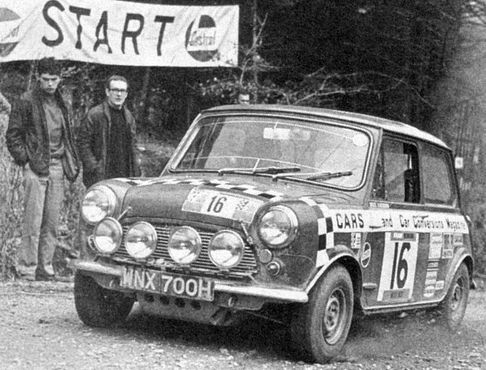
1970 Hackle
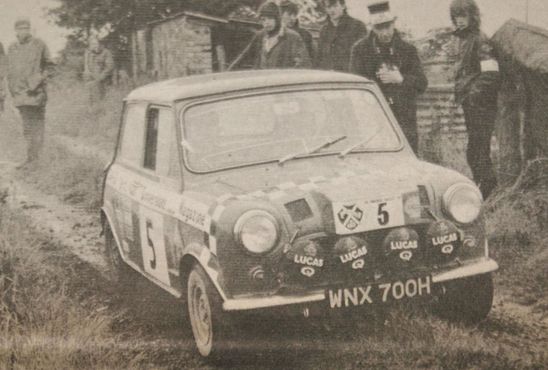
1970 RAC
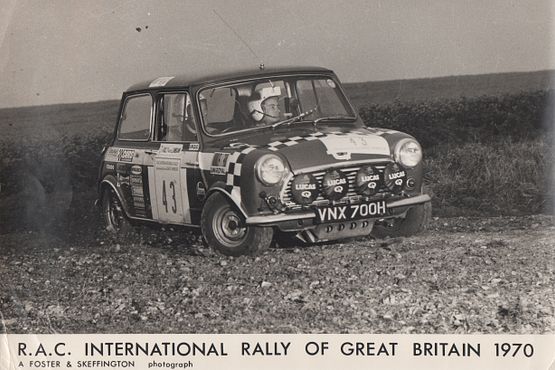
These are 2 de-decaled/repainted Vitesse models with homemade decals.
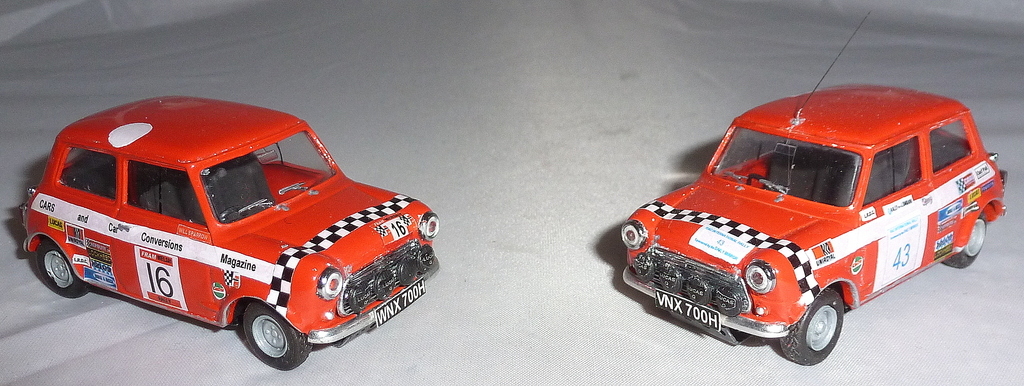
1971
The 1971 season was going to consist of 12 rounds, starting with the Snowman Rally, and culmanating with the RAC. Round 1 kicked off with a win for Roy Fidler in his Mk1 Escort Twin Cam. Colin Malkin was 2nd in his Hillman Imp and Jimmy Rae 3rd in his Escort Mk1 GT. Chirs Sclater didn't enter the season opener. Round 2 saw Chris Sclater kick off his season properly with a fine 2nd place at the Circuit of Ireland in his Ford Escort MK1 RS1600 XOO 354F, splitting the Escort Twin Cams of Adrian Boyd (1st) and Billy Coleman (3rd). The famous `XOO’ series of registered cars stand out as the first Escort Twin Cam rally cars built by Boreham – “354F” spent much of its early life as a test/practice machine before being pressed into service as an 1800cc, 180bhp Group 6 car for Hannu Mikkola on the French Alpine rally in 1969. `XOO 354F’ proved fast on the early stages but did not finish, being forced to retire with rear axle failure. Roger Clark is known to have used the “354F” as a recce car before it was sold off to Works-supported driver Chris Slater in late 1970. Round 3 was the Granite City, which Roger Clark won in his Mk1 RS1600. Chris Sclater sat this event out. Round 4 was the Fram Castrol International Welsh Rally, with an interesting top 3 of Tony Fall in his Datsun 240Z, Will Sparrow in his Mini Clubman GT and Colin Malkin in his Hillman Imp. Unfortunately, Chris retired his Escort with engine problems. Round 5 saw a much better outcome though, as Chris won the Scottish rally ahead of Mike Hibbert and Roy Fidlers RS1600's and followed it up in round 6 with a fine 2nd place, splitting the Escort Twin Cam's of tarmac specialists Adrian Boyd and Dessie McCartney on the Texaco Rally. Back to gravel for round 7 which was the Hackle, and Chris finished in 2nd place, 2min 21 seconds behind the winner, the great Roger Clark. Round 8 was the Manx International, which was won by Roger, ahead of the excellent tarmac driver, Adrian Boyd, in his Escort TC and Roy Fidler in another RS1600 in 3rd. No record exists as to whether Chris participated in this event, but he finished outside of the top 10 if he did. Gravel was clearly to Chris' liking though, as he took 2 excellent wins on round 9 (Lindisfarne) and 10 (Dukeries). The season finale, the RAC, didn't end the way Chris would have wanted, due to a transmission failure, and despite Roger finishing 11th, Roger was the leading BRC contender and so it is treated as a win for the championship. That result meant that Roger finished the season with 4 outright victories to Chris' 3, but Chris still took the title for his first and only British Rally Championship win.
1971 Scottish
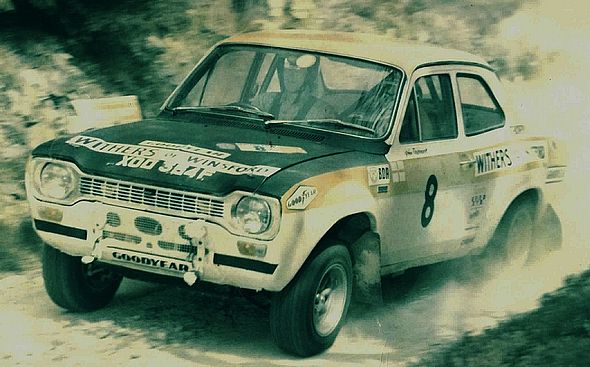
1971 RAC
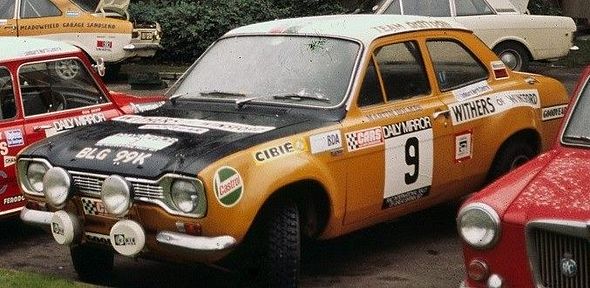
Chris Sclater’s 1971 Escort RS1600 (1.8l) – Partswork plus homemade decals/Rallymodels.co.uk decals to represent the winning Scottish Rally car. and Trofeu British Rally Legends model of his "DNF" RAC car from that year. Chris won the Scottish, Lindisfarne, Burmah and Dukeries BRC rallies in 1971.

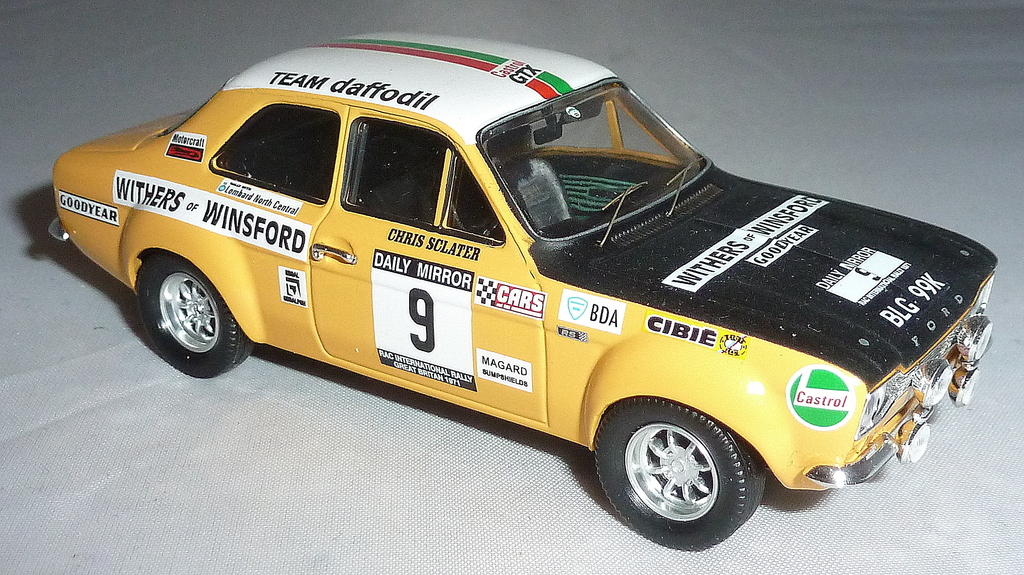
1972
Roger Clark came home from his international activities and running an Escort prepared by the official Ford factory team Clark won the national title for the next two years - these his 2nd and 3rd wins in the Championship, both times driving Escort RS1600's (now in 2.0l form).
The 1972 season started with the Mintex Seven Dales rally, and Roger was straight in to the swing of things by winning the first event. Round 2 was the Granite City rally and very much a case of "rinse wash repeat" as Roger took his second win in a row. On to round 3 (the International Welsh) and things were already looking ominous for the competition as Roger won by over 3 mins from Barry Lee's RS1600, with Tony Fowkes Mk1 Twin Cam in 3rd place. Round 4 saw Roger come up against the might of a Finnish legend in Hannu Mikkola on the Scottish and coming off 2nd best as he finished runner up to the Finn with Chris Sclater in 3rd place. Round 5 was in Ireland for the Texaco Rally, and in what would become an apparent pattern, it doesn't appear that Roger went across the Irish sea for the tarmac event, which was won by Cathal Curley in his BMW 2002 Ti. Back in Blighty for the Burmah on round 6 and yep, Roger takes the win again, and then on to the Manx rally for round 7 and Roger demonstrated he had the ability to win on Tarmac by coming home ahead of the Clan Crusader of Andy Dawson. Round 8 is the Lindisfarne and this time Roger has to retire the Uniflo Mk1, leaving the door open for Mike Hibbert to lead home a trio of RS1600's. With that little bit of bad luck out of the way, normal service is resumed with Roger winning round 9, the Dukeries, ahead of Mike Hibbert who backed up his previous round win with a fine 2nd place, and Chris Sclater in 3rd. Round 10 was the Hackle which Roger won comfortably, before moving on to the crown jewell in the season - the final round, the RAC. Here Roger took what most would consider the most famous victory in his career, cheered home by adoring crowds to become the first British winner of the RAC Rally since Gerald Burgess in his Ford Zephyr Six in 1959. A fitting way to cap off a fantastic season and a deserving winner of the 1972 RAC/Uniroyal/Autosport Rally Championship.
1972 Dukeries
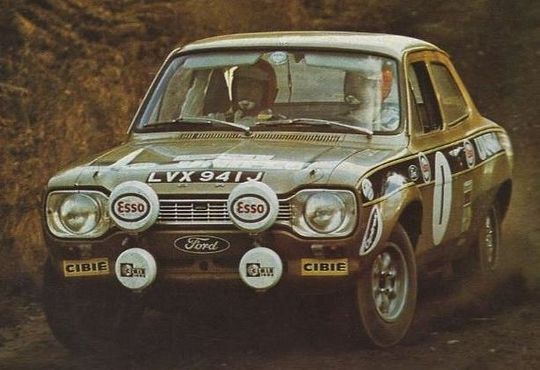
1973
Clearly carrying on with where he left off, Roger started the 14 round 1973 season in the same outrageous form as he had been in 1972, winning the opening round Snowman Rally. When you are in form, and at one with your machine, you can just keep on winning, and Roger did so in style by taking round 2 which was the Mintex, ahead of Will Sparrow in his Vauxhall Firenza and Peter Clarke in his RS1600 Mk1. Roger skipped round 3 which was the Circuit of Ireland which was won by Jack Tordoff in his Porsche 911 Carerra RS. On home turf, Roger won the 3rd event he had entered this season (the Granite City) and made it a scarcely believable 4 in a row at the 5th round, the International Welsh. There was no clear pattern developing of specific drivers delivering consistent results to challenge Roger for the title, so even at this early stage it looked very much like his title to lose. The 6th round saw a top 10 of Ford Escort RS1600 Mk 1's - certainly proving it was the car to have on loose surfaces. Of course, 5 wins on the spin would be rediculous, so this time winner was...... Roger again! There doesn't seem to be a record of Roger particpating in round 7, the Texaco Rally, but the winner was still an RS1600, this time pedalled by Adrian Boyd, with Tarmac Porsche specialist Cathal Curley finishing in 2nd place 1min 46 seconds adrift. What we do know is that Roger did enter rounds 8 (Jim Clark), 9 (Hackle) and round 10 (Burmah), because he won them all. Frankly, this was getting hard to comprehend how dominent Roger was. Back on tarmac for round 11 at the Manx rally, and again, no record of Roger compteing, but in his absence it was like a mirror image replay of the Texaco, with Adrian Boyd winning in his RS1600 and Cathal Curley 2nd in his Porsche. Back to gravel for round 12 and the Dukeries, and yep, you've guessed it, Roger is back listed as an entrant and promptly wins the loose surface event. At this stage you start to ask yourself whether Roger may have been avoiding tarmac events - i don't know the answer to that but what we can say is that he did enter round 13 which was the Lindisfarne and a mixed tarmac/gravel event which he promptly won. Which brings us to the final round (14) and the RAC Rally. Could Roger make it an unprecedented clean sweep of every event he appears to have entered? So close but no cigar as Timo Makinen wins the RAC with Roger nearly 5 mins behind, but absolutely no shame after a simply steller season. What a couple of years for Roger! The championship however suffered a blow at the end of 1973 when the fuel crisis engulfed the country right after the end of the final round of the season.
1973 Scottish
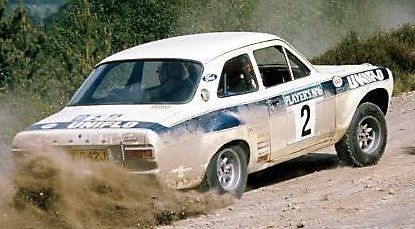
The 1972 Dukeries car is from Trofeu’s British Rally Legends series and the 1973 Scottish Rally winning car is from IRM.

1974
The 1974 calendar was inevitably disturbed by the fuel crisis. The disruption to the British sporting calendar opened an opportunity for a second special stage series, specialising in one-day events viable for private drivers, the Castrol Autosport series. This was a real success and provided a form of feeder series for the major BRC series. As mid decade approached so there was increased participation by professional teams in the BRC. Following Ford came the Dealer Opel Team with Tony Pond and then the Datsun importers ran a Violet for Chris Sclater while Chrysler entered an Avenger for Colin Malkin, British Leyland a Triumph Dolomite Sprint for Brian Culcheth and Vauxhall were starting to an interest. The first two rallies were cancelled but it was the year the fantastic Irish driver, Billy Coleman, challenged for the BRC. The series started with the Easter time Circuit of Ireland with Irish drivers taking the top four places, led by Cathal Curley in a Porsche 911 Carerra RS2.7, Ronnie (brother of Dessie) McCartney 2nd in a similar car and Billy taking 3rd place in his ex Chris Sclater Escort Mk1 RS1600 (1.8l). Round 2 was the Fram Castrol International Welsh Rally and Billy unbelievably took delivery of the car he would use for the event on the morning of the event (a ‘new’ ex-works Ford France MEV 36J with two litre alloy block BDA). Despite zero preparation and familirisation time, Billy finished 2nd behind Markku Alen in a similar car with Tony Pond 3rd also in an RS1600. For tarmac based round 3, the Texaco rally, back out came VVX958L and with it an outright win, the first of the season for Billy. Round 4 was the Jim Clark rally, but results are hard to find for this event and the only thing I know for certain is that Roger Clark won the event with no record located as to whether Billy entered the event or not. Round 5 (the Burmah) wasn't a great event for any of the likely championship winners, and although Tony Pond won the event in his Opel Ascona A, Clark was a miserable 41st and Billy even worse off in 51st. An event to forget for both drivers. With that behind them it was on to round 6 which was the Manx. The Northern Ireland tarmac specialists and their Porsche's were out in force again, and Cathal Curley delivered his 2nd outright win of the season followed home by Dessie McCartney. Roger took 3rd place and Billy 4th in MEV 36J. Back to gravel for round 7 and the Dukeries. Billy finished in 7th place with Tony Drummond winning in his Mk1 RS1600. Round 8 and we are back to tarmac for the Lindisfarne rally, and Roger Clark takes the overall victory, but 3rd place for Billy Coleman in MEV 36J is enough to secure him the British Rally Championship. Billy, from the far south of Ireland, became the first non British resident to take the title, and set the scene for years to come. In the end nine rounds counted for the series that year, the final event of which was the RAC Rally. which was won by Timo Makinen with Clark in 7th and Coleman in 8th in the now famous Thomas Motors of Blackpool livery.
Extract from Stephen Mills’s account of the 1974 Championship winning year taken from Michael O'Carrolls Irish Motorsport Annual 96
Billy wanted me to stay to do the RAC Championship for the year, and in his words, "we could win". What a challenge!
With such an invitation who would argue? So with the combined efforts of Dan O'Sullivan, Evan Hughes (who had been Brian Cullen's mechanic, transporter driver, pit crew and confidante, all rolled into one from his Formula 2 days of 1970) and Billy, and myself we worked our way through a long list of championship events. They covered Ireland, Wales, Scotland and England and we ended up as RAC Rally Champion 1974, before the final event of the series, the RAC Rally. A year that saw all kinds of antics and comments from many quarter, not to mention the opposition, which was everywhere.
Coleman from Millstreet was one of the quickest drivers around and the shy man had the potential to become the best. In 1973 he bought his first ex-works Ford Escort from Chris Sclater, VVX 958L, which proceeded a ‘new’ ex-works Ford France MEV 36J with two litre alloy block BDA, which I took delivery of the day the Welsh Rally started in May 1974. I still have the receipt! Evan Hughes and I collected the car from the Ford Competition Department at Boreham. It was on a trailer and we were to take it directly to the rally start at Cardiff. As luck would have it the trailer burst a couple of tyres on the motorway to Cardiff and in order to get to the start before it was too late, I had to take the car off the trailer and drive it to the start. I can’t remember objecting, but I can remember the drive to Cardiff!! Evan arrived later and, with a brand new car, which he had never seen prior to the start; Billy Coleman came away with a second place to Markku Alen in a works Escort. That was the class of ‘the Kid’. The entire RAC championship was just that - a full season of events that required consistent application to the task on hand by all concerned. The objective was to take the title out of England. Travelling through Wales, Scotland, the Isle of Man, Ireland and England honed the four of us into a unique nucleus. We completed the task as required and competed in a number of other events beside. The car was constantly being re-built after each event, or at least as much as time permitted. One thing that stands out in my memory from that year is the fact that I was the only one to put a mark on the car. I chipped the paint with the jack handle in Wales on the first event. Apart from that there was not a scratch put on the car throughout the season. At the end of that year, after the final event the RAC Rally in November, and the coveted title in the bag for Billy and Dan, I got the first available plane out to Australia to get way from the weather. Evan Hughes decided to come out as well, and at the last minute his brother Gordon joined us for the flight. We are still here!
Stephen Mills
1974 Texaco
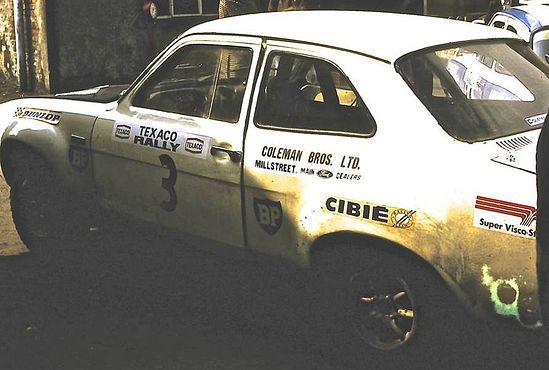
1974 Welsh
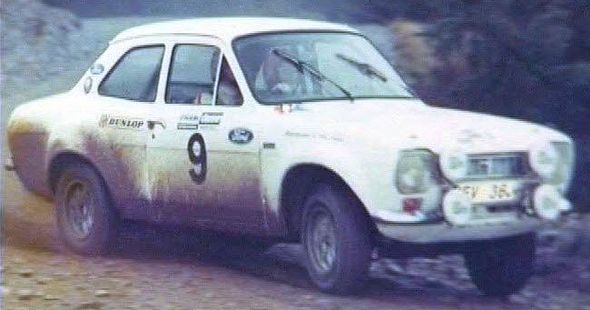
The models here are the Texaco Rally winning (1.8l) RS1600 VVX958L and the 2nd place Welsh Rally (2.0l) MEV36J car - the former is a parts work with homemade decals, the latter is a Trofeu base with homemade decals.

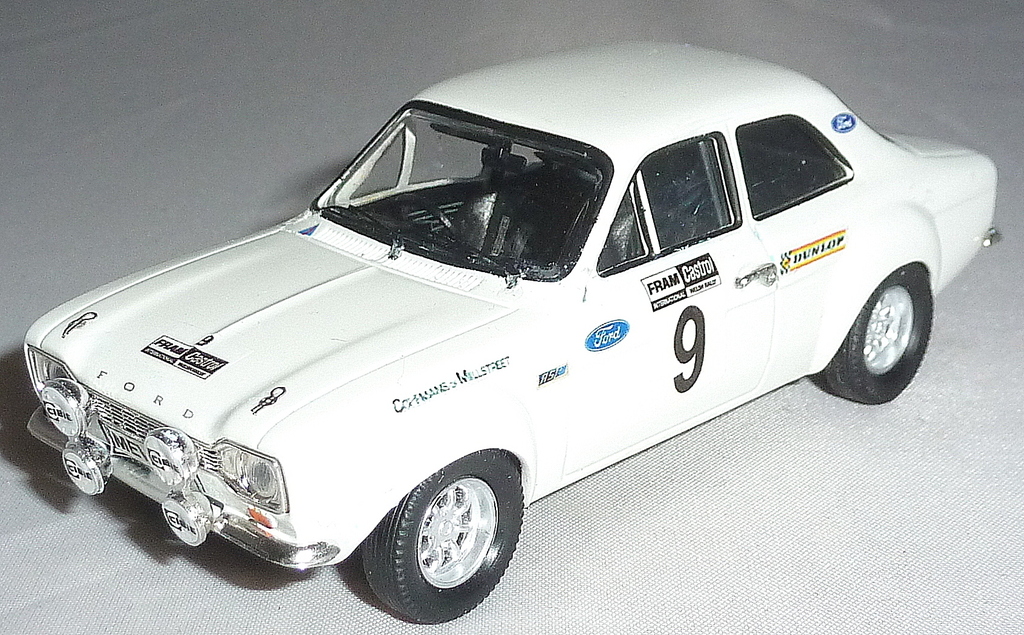
1975
In 1975 two young men arrived on the scene. From Finland, and set to forge his career on the British stage, was Ari Vatanen, and on occasion appeared a 17 year old man, who declared his work to be a car breaker, called Malcolm Wilson. The tempo of the series was hotting up, but cream will always rise to the top, and so it was with a previous 3 times champion adding a 4th British title to his lengthening list of achievements. The 10 round season kicked off with the Mintex Dales with the legend that is Billy Coleman carrying on with the momentum from the previous year with a great win in the MK1 RS1600. Roger Clark (also driving a Mk1 RS1600 at this point in the season) retired with engine failure (model in progress). Billy looked unstoppable at this stage taking another win on the Circuit of Ireland, and with 2 Porsches' taking the other podium steps, there was no sign of Roger who had another retirement and could not have been optimistic at this stage. But all was about to change. A change of location and surface for round 3 (Granite City) and more importantly a change of car with the switch to the newly released Escort RS1800 MKII (2.0l) (Billy made a similar switch) saw Roger back on top with Billy just under 30 seconds behind in 3rd place. Round 4 saw Roger cruise to victory on the International Welsh Rally nearly 4 1/2 minutes ahead of the 2nd place man Nigel Rockey in a Mk1 RS1600. It was Billy's turn to have bad luck as he retired from the event. The Scottish rally was round 5 and it was Clark's turn for back to back victories at the top of 3 of RS1800's with Brookes in 2nd and Coleman in 3rd. Back came Coleman again in a see-saw battle with Clark for the Championship by taking a clean victory by over 4 1/2 minutes in round 6 on the Jim Clark rally - I can't find a record of Roger participating in this event. Round 7 and back comes Clark again, winning the Burmah rally from Brookes and Coleman and then further strengthening his championship position in round 8 by winning the Manx International Trophy from Dessie McCartney's Porsche with Coleman finishing in back to back 3rd place. A trio of wins swiftly followed for Clark on round 9 (the Lindisfarne) with another RS1600 Mk 1 driven this time by John Taylor taking 2nd and Brian Culcheth pedaling his Dolomite sprint to a well deserved 3rd place, albeith over 5 mins behind Clark. Coleman was a lowly 18th on this event. And so it came to the final event of the season, with all to play for with only 3 points separating Clark in 1st from Coleman in 2nd - round 10 and the RAC rally. A strong 2nd place finish for Clark behind a Finnish driver (Timo Makinen), with Coleman finishing 6th saw Clark take the overall Championship and his 4th BRC win.
1975 Mintex
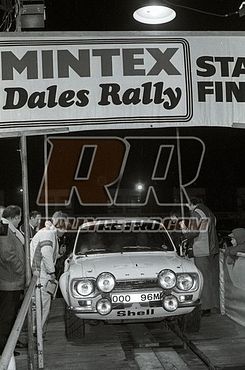
1975 Welsh
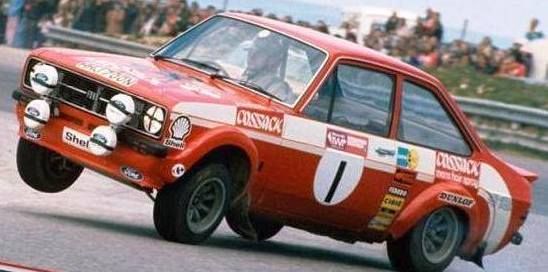
Again, a Trofeu British Rally Legends model of the winning Welsh Rally car from that year.
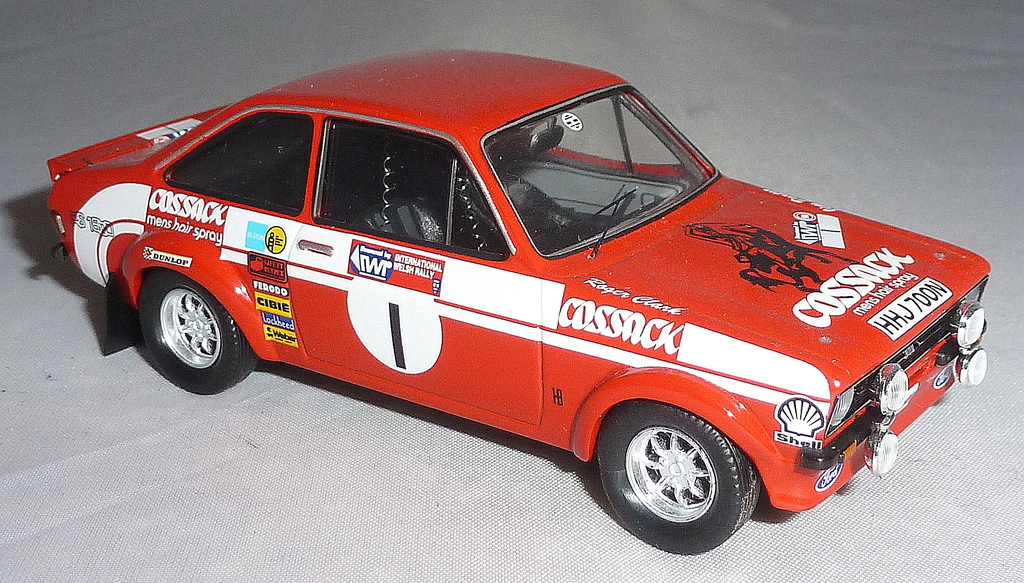
1976
Vatanen had lost no time in impressing the management personnel at Ford who arranged the support for him to tackle the British championship series in 1976. In 1976 there were fourteen rounds which started with the Shellsport Tour of Dean. Roger Clark started the year in ominous style after his championship victory in 1975, with Ari Vatanen some 30 seconds behind and Brookes only 7 seconds behind Vatanen. Brookes entered round 2 which was the Snowman rally up in Scotland but with a different co-driver as John Brown was attending an important Welsh Association function, so Andrew Marriot was drafted in. Unfortunately, Brookes was a DNF or outside the top 10, and Airikkala won this event in the privately entered David Sutton RS1800, Clark second and Vatanen 3rd. At this early stage of the season it would have taken a brave man to bet against Clark repeating the heroics of the prior year. However round 3 saw Clark exit following an accident, Andy Dawson take victory in a Stratos, Brookes the bridesmaid again in second with Vatanen hard on his heels in third less than 10 seconds adrift of Brookes. Round 4 was the Granite City, which Brookes won comfortably by nearly a minute, Clark back on track in 2nd and Vatanen 3rd yet again. Round 5 was the Circuit of Ireland and a number of the championship contenders didn't attend with the notable exception of Brookes who finished 2nd. Round 6 was the International Welsh rally and it was here that the needle started to swing towards Vatanen as he took the event by a fairly unfathomable 6 mins 33 secs from Airikkala with Clark another 45 seconds behind in 3rd. Brookes and Clark took the top 2 spots on the Scottish in round 7 with Vatanen being unfortunate to undo the results in the prior round due to a transmission failure. In a clear sign of the battle that was going to rage for the rest of the season, back came Vatanen again in round 9, the Jim Clark, with Brookes and Clark in hot pursuit. Round 9 was the Burmah and the first back to back victory for Vatanen with Clark and Brookes again completing the podium but this time in the reverse order from the prior round. Round 10 was the Ulster but a completely new podium this time with 3 different 911 Porsche models taking the top 3 steps, led by Cathal Curley, followed by Dessie McCartney and Brian Nelson. The 3 championship pretenders were all out (Clark Retired, Brookes Differential, Vatanen Accident) so no advantage gained by anyone. Round 11 though saw Vatanen make a break for the horizon, with a clear victory by over 3 mins, and Clark out due to an accident and Brookes due to clutch issues. Vatanen took his second back to back victory in round 12 on the Lindisfarne, with Clark not entering, and Brookes down in 11th position. Round 13 was the Castrol, and Brookes showed his fighting spirit to roar back with a victory. Vatanen finished way down in the field (117th) and Clark again absent. And so to the 14th and final round. After missing 2 events, Clark stamped his authority on the field by winning by 4 and half minutes from Blomqvist in the Saab 99 EMS and Waldegaard in another RS1800. Despite Brookes and Vatanen not finishing (head gasket and engine failures) Vatanen finished 10 points clear of Brookes with Clark one more point back in 3rd. Over the course of the season, Vatanen was a worthy winner with five outright wins, Brookes three, and Clark two. The first of 2 BRC wins for Vatanen and he went on to achieve WRC success is some style (World Champion!).
1976 Burmah
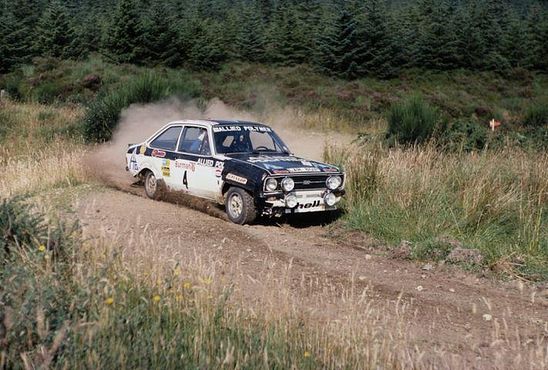
This is a Trofeu British Rally Legends model of his smashed up Burmah rally car (the other side of the car has a taped up front wing).

1977
There is little doubt that the late ‘70s were a hallmark period in the BRC. Vauxhall went to the extreme of developing a 2.4 litre version of the Chevette with the demands of the British championship specifically in mind, engaging Pentti Airikkala another, Finn as their lead driver. British Leyland found rallying a natural opportunity to publicise their new TR7 sports car, while manufacturers like Fiat and Saab from all over Europe paid visits to the BRC. The attraction was clear. Secret route rallying was very attractive economically. Only the Manx Trophy Rally traditionally allowed reconnaissance, while the forest road rallies did no harm as practice events for the world championship RAC Rally. It was not just the impact created by the cars which the foreign teams brought with them, it was the chance for their drivers to acquire the talents required for secret rallying. The great Russel Brookes drove the iconic Heat for Hire sponsored cars for a number of years, but his first BRC win was in 1977. Russell's season didn't get off to a great start as he was either a DNF or finished outside of the top 10 in the season opening Shellsport Dean Rally which was won by Hannu Mikkola's Toyota Celica 2000 GT. There is no record of Russell entering or exiting round 2 (the Mintex) which was won by Ari Vatanen in a Ford Escort RS1800 MkII but round 3 started a great sequence for Russell with victory in the Circuit of Ireland. Russell backed up that great result with victory in the round 4 on the Granite City, before retiring with gearbox issues in round 5 on the Western Mail International Welsh Rally. Pentti Airikkala took the Welsh honours in his Vauxhall Chevette HS 2300. Russell rallied in round 6, finishing 3rd on the Scottish ( Ari Vatanen taking victory in another RS1800 with Tony Pond in a TR7 second) before returning to the top step in round 7 on the Jim Clark. 2 second place finishes followed, behind Hannu Mikkola in a Toyota Celica on the Burmah International and behind Derek Boyd in a Porsche 911 Carerra RS 2.7 at the Ulster. Engine failure saw Russell fail to finish round 10 at the Manx which was won by Pentti, before being excluded in round 11 the Lindisfarne where Andy Dawson in his Escort RS1800 was on the top step of the podium. The final event of the year was the RAC and Brookes finished 3rd behind Waldegaard in an RS1800 and Mikkola in his trusty Celica and the title was his.
1977 Circuit of Ireland
Photo by Esler Crawford
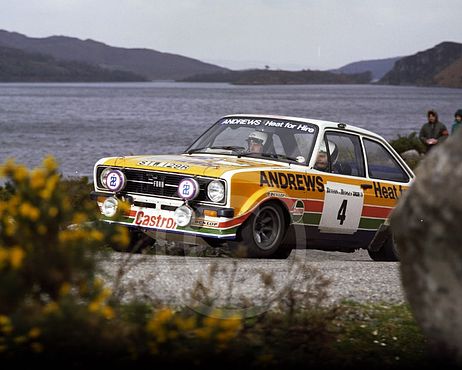
This is a modified and repainted Trofeu model with bought and homemade decals to reflect his COI winning car from 1977.
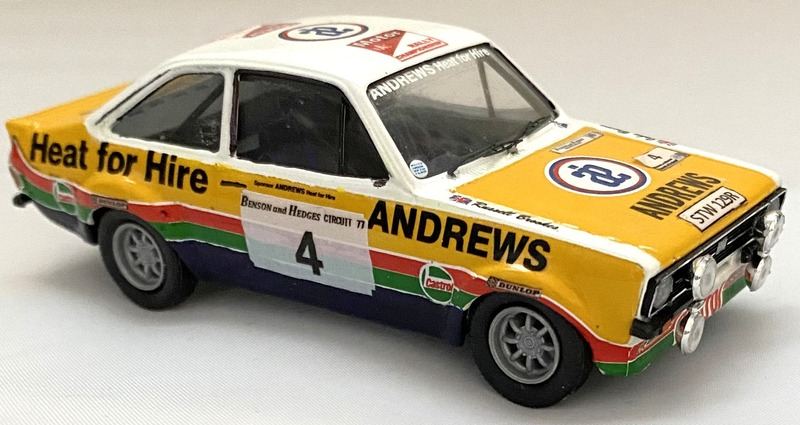
1978
The original RAC British Rally Championship came to an end in 1977 and for 1978 the series was renamed the RACMSA British Open Rally Championship, in recognition of the newly established international flavour. 1978 saw the final throes of the Escort era when Hannu Mikkola won the title, Hannu's only BRC win, but like Vatanen he went on to greater success in the WRC.
For 1978 to 1984 I am going to cut and paste an excellent written summary by Martin Porter of BRC events from those years which I have sourced from this web site (http://hyppyrally.blogspot.co.uk/). If you like the write up, go on the web site as there are some good pictures from those years on the site.
Russell Brookes started the 1978 Mintex International Rally, the opening round of the inaugural Sedan Products Open Championship, as reigning British Champion. Then a young hotshot with a tendency to stuff his car into the scenery, he was the first driver in a generation to be able to match the pace of Roger Clark.
That he was immediately dicing for the lead with Finnish gravel experts Hannu Mikkola and Penti Airikkala shows how fast he really was, but his subsequent career shows the ghetto that British rallying was to get inself stuck in. In Brookes's first full season he had been dicing with Roger Clark, and in his last he was head-to-head with Colin McRae. But whilst Roger and Colin were to claim World Rally victories, Brookes rarely got a drive outside of the UK.
But back to 1978.
As well as Brookes, Clark, Mikkola and Airikkala there was the winner of the previous year's 1000 Lakes, Kyosti Hamalainen in an Escort, Jimmy McRae no longer in a Group 1 Magnum but a Group 4 Chevette, Tony Pond in a TR7 and Markku Alen in a Fiat 131 Abarth. Vauxhall had just had their Lotus designed cylinder head banned, so were down on power this year, whilst Leyland were in the process of shoe-horning a V8 into the TR7, meaning much more power.
Fiats were an unusual sight on British rallies. The previous year the Fiat-Ford battle for the WRC had gone to the wire and Fiat came within an ace of having to take on the Boreham team in their back yard to win. Knowing that the Escort beat the 131s hands down on blind forest stages they sent a car to the Open to get some much needed experience of British forests.
In the end Mikkola expired in the Yorkshire forests and Airikkala overcame the lack of grunt to beat Brookes into second, whilst old Roger Albert managed forth, just behind John Taylor's Haynes of Maidstone sponsored Escort.
The series next moved across the Irish sea for a blast from end-to-end of the Emerald Isle. The Circuit of Ireland was a unique challenge, a long, fast, bumpy and blind tarmac rally. Here the usual Escorts were joined by the Porsche Carreras that Irish privateers knocked together in their sheds whilst local hero Billy Coleman was in the exotic Chequered Flag Stratos.
Once Brookes had got himself sorted out he blew the opposition away, whilst second was Jimmy McRae, who had led for two days. This was not to be the last time these two disputed the top placing. Mikkola disappeared into a field whilst Alen took a podium on a surface the 131 liked, despite at one point getting stuck behind an Irish farmer using a supposedly closed road at night with no lights. Only in Ireland!
The series stayed on tarmac for the opening day of the Welsh, before leaving the Epynt ranges and returning to the forests.
Mikkola dominated whilst Alen looked set to go one better than in Ireland. But our man Clark, fortified no doubt by a few pre-rally pints, showed that he's a fast on day four as day one and overhauled the Finn.
The series stayed on the Celtic fringe for hot and dusty Scottish Rally. It was once again Mikkola in front, but this time it was a young Malcolm Wilson second for most of the event. Unfortunately the now Ford rally boss was a less laid back character then than he is now and he stuffed his Escort into the scenery. Second eventually went to Airikkala's Chevette ahead of Clark's Escort, who'd been off the road and who had fought his way back from sixth. Brookes had got himself stuck in a ditch and only finsihed because Andy Dawson stopped to tow him out.
1978 saw the first and last entry into the series for the other Scottish rally, the Argyll based Burmah International - which was anything but dry and dusty. The likable German Walter Rohrl was driving the Fiat this time, whilst Mikkola debutted the famous Eaton Yale sponsored Escort.
But before the event disappeared into oblivion it earned itself immortality as the only international rally to end in tie. Mikkola appeared to have given best to Brookes and started the last stage thirteen seconds behind the Englishman. But then the Andrews Heat For Hire car hit problems too and the event ended up being halved. Tie breaker rules gave the event to Mikkola for having been faster on the first stage. As modern rallies are timed to a hundredth of a second this record should stand forever.
Next it was back into a boat for the Manx International. Closed public roads and pace notes made this the fastest rally of the year, despite the rain, and with the archetypal seventies moustached man Tony Pond at the wheel, Leyland were finally able to unleash the full power of their V8 TR7. Mikkola managed to keep in front of the red beast until he punctured and crashed, but Pond eventually won by a country mile with part time rallycross man John Taylor second, an Irish Porsche third and Roger Albert Clark fourth. Brookes was excluded for illegal servicing.
All of which meant that Clark entered the last round ahead on points despite not having won a single round.
This was to be a perennial problem for the Open. With no 'best of' rule until 1983, consistency often beat pace.
The last round was our own World Rally, the RAC. With Ford officially on strike both Mikkola and Clark would be in private Escorts. This was enough though and Escorts swept the board, despite a valiant fight by Alen in a black and red Stratos.
Mikkola's Eaton Yale Escort comfortably beat Bjorn Waldegard's similar car. Clark's bid for title ended when he approached a gate with a box full of neutrals and flipped his Escort onto its roof.
It was sad to see the old master exit in such an undignified manner, but few could argue that Mikkola, with four wins to his name, was not the worthy winner of the first British Open.
So it was first blood to the Finns. Could the Brits raise their game and get the title back?
1978 RAC
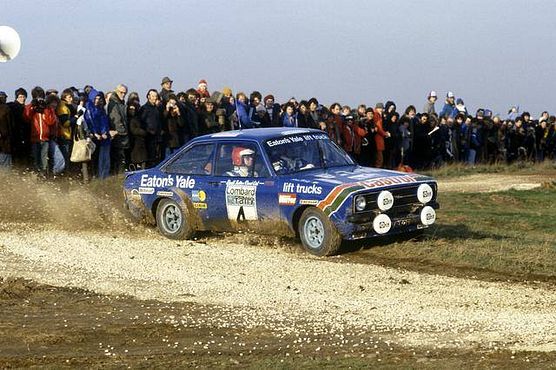
This is the winning RAC Rally car from 1978 – the RAC was a qualifying event for the BRC in 1978. This is a Trofeu model.
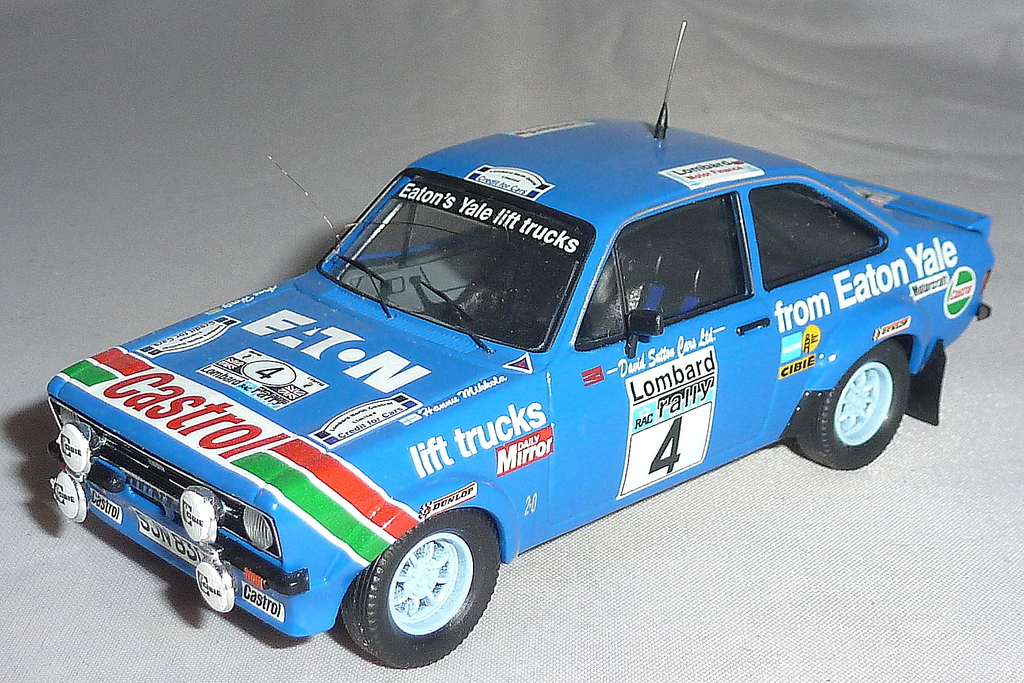
1979
One of my personal favourite drivers, Pentti Airikkala won his only BRC in 1979 – whilst he had more limited success in the WRC, only winning 1 event, the variety of cars he drove other the years highlights his all round skills.
Battle commenced on the 1979 British Open Rally Championship before the first car had even rolled off the chilly starting ramp in Yorkshire.
The 1978 season had been a success, and as a result ever event larger than a single venue wanted to be part of the action. The manufacturers on the other, who had other series to contend with as well, wanted just a handful of quality events. The compromise ended up as a seven event series, with the Ulster rally in and the Burmah out.
With hindsight it's perhaps hard to see what all the fuss was about - a handful of rallies, mostly in the cold and wet, with small entries and barely a car that could top 300bhp.
But for those of us who remember those days this was the real thing. Rallies that began in the early hours and continued into the night, the crews servicing in laybys, farmers fields or anywhere they could find. In Ulster they somehow crammed 250 stage miles into 24 hours.
Then there were the cars. Hairy chested Escorts and Chevettes, burbling TR7 V8s, the odd exotic Porsche or Saab. Tail out, even on tarmac, and most smelling vaguely of Castrol GTX.
Then there were the drivers. The year would see three future World Champions battling it out on our stages and whilst the home grown talent may not be as famous, they were more than able to hold their own.
The action started with the De Lacy Motor Club's bash around the Yorkshire forests, then going under the name of the Mintex International. What had changed though was the weather.
Snow was the order of the day and the De Lacy's had their work cut out to keep the show on the road. Stig Blomqvist had arrived in the whispering Saab 99 Turbo, fresh from giving the car a maiden victory in the Swedish Rally, although he was forced to leave his studs behind.
The front wheel drive probably helped, the turbo though probably didn't, but ultimately it was Swedish snow experience that gave him victory. How else could you explain a TR7 V8 coming second, other than that it was driven by Blomqvist's former Saab teammate Per Eklund?
The series then crossed what James Joyce used to call "the snot green" sea for the Circuit of Ireland. This time it wasn't an excess of snow that the competitors had to cope with, but a lack of petrol.
The Middle East was in turmoil thanks to Iranian Revolution, and the jungle juice was getting hard to find on the Emerald Isle. With a top flight TR7 doing about 4 mpg at full throttle this was a serious problem. The competitors were often diverted to remote spots in the middle of the night in the hope of finding supplies, and many crews dropped out when they didn't materialise.
One team that didn't have a problem though was Vauxhall. Dealer Team Vauxhall appeared to have finally got the Chevette HS to really fly, at least on tarmac, and Airikkala raced to an easy win, ably supported by McRae until mechanical failure put him out.
Russell Brookes entered one the tarmac special Escorts developed to win the Monte Carlo but crashed it. Eklunds Triumph also expired and so the runner up was Irishman Billy Coleman, who for once was in a conventional car, an Escort.
So far though the reigning champion had not made an appearance. For the Welsh though, Mikkola was back, and in the blue Eaton Yale Escort he swept through the rain to a clear victory.
Three rallies, three different winners, and despite only managing eighth in Wales, Blomqvist led the series.
For the Scottish there were two Eaton Yale Escorts, with Bjorn Waldegarde joining Mikkola. The two were taking a break from their battle to be the first every World Rally Champion, and they soon set the pace, with the Finn heading the Swede.
Both were to leave the road though, which gave the lead to a young Finn called Henri Toivonen in an Escort. Electric problems eventually slowed him down, but we'd be seeing a lot mor eof him in years to come.
This gave the lead to an Englishman; Tony Pond in the new Talbot Sunbeam Lotus. Essentially an old Chrysler Avenger with a hatchback, the addition of a Lotus engineered 2.4 litre four pot turned it into a hot hatch. It was not a happy team, and the Sunbeam expired before the end, but clearly the car had potential.
The beneficiary of all this carnage was Airikkala who took the win and the series lead.
Pond managed to lead again on the Manx, only for the gremlins to again get the car. Mikkola also expired - on the very first stage, and Airikkala was out too.
This left the event as a duel between Russell Brookes and Jimmy McRae, the first of many to come over the next decade. This time though the Englishman's Escort proved to have the legs on the Scot's Chevette.
The Ulster Rally was a high speed blast around the top of Ireland. Mikkola was unable to make it to the event and the result was a Vauxhall one-two. Brookes was again in a shorter, wider tarmac Escort and again found that, whilst it was untouchable on the smooth, flowing tarmac of France, on narrow and bumpy Irish roads it kept trying to tip him into a hedge and eventually succeeded.
Blomqvist peddled the heavy Saab really hard to make third, but only an extremely unlikely Saab win on the RAC could now prevent Airikkala lifting the trophy.
Mikkola once again showed he was the master of British gravel, with Brookes coming a creditable second. Blomqvist staggered round the stages until he eventually hit one tree too many whilst Airikkala nursed a car that looked on the verge of retirement from stage one through to seventh.
The Swede's exit gave him the championship and with three wins to his name he deserved it. So once again the Brits had been beaten by a Finn had won again, but this time one who lived in Berkshire and to be honest, the fans didn't mind at all.
Could the home team do any better next year?
1979 Circuit of Ireland
Photo D.Smyth
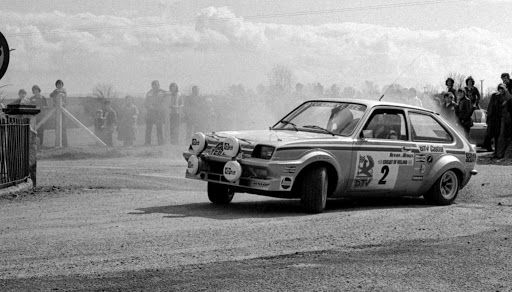
This is a PJ Rallymodels model of his 1979 COI winning car.
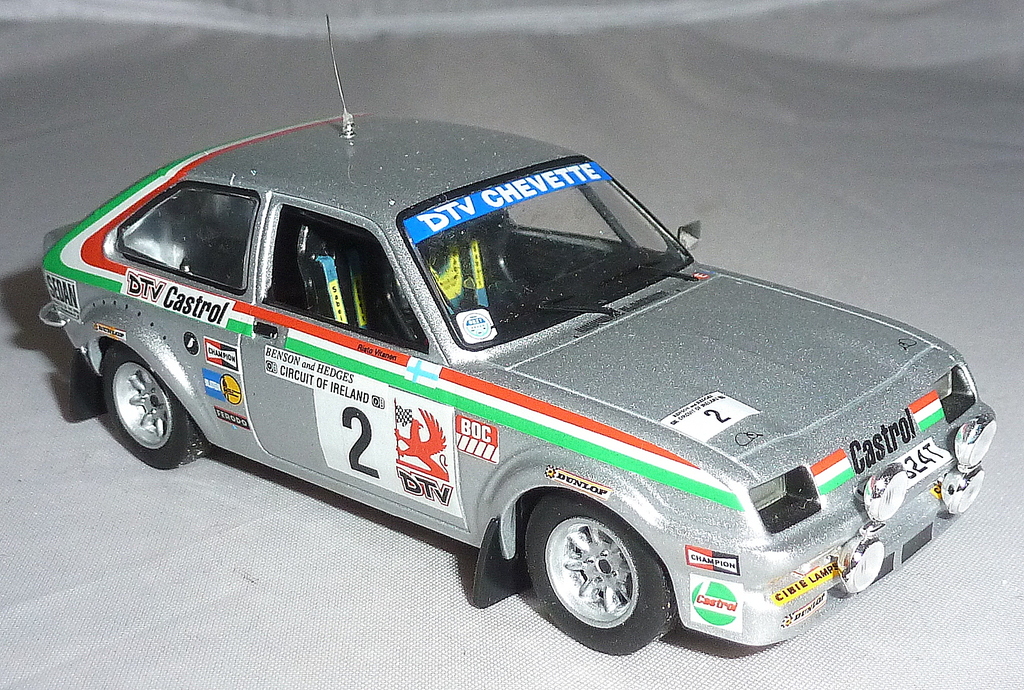
1970
The BRC in 1970 saw the end of the old age when Will Sparrow won three of the nine qualifying events, with victory on the road event Rally of the Vales before wins on both the Welsh and the Hackle special stage events. The car was a very well prepared Mini Cooper S, a throwback to the previous age of rallying. Sparrow’s main challenger was fellow privateer Chris Sclater who went on to take the title in 1971. Will Sparrow used 2 Mk2 Mini Cooper S cars during 1970. Will built his cars from bare shells himself so some officianados won’t call them true Cooper S’.
WNX700H. It ran a 1275cc engine and had some form of bonnet "bulge" fitted to accomodate a different carb at some point during 1970 (model in progress). It was 1st overall on the 1970 Welsh Rally which was the last international rally event won by a Mini (excluding the BMW version :-)). It was rolled in Oct 1970 on the Tour of Mull and returned in 1971 with a Clubman front end. Will also won the Vales and Hackle events in 1970 which I believe were BRC events.
VNX700H. Group 2 1275 Mk 2 Cooper S used to win his class and finish 11th overall on 1970 RAC which was a qualifying event in the BRC that year.
7th/8th February – Highland C&MCC - Snowman - won by Jimmy Rae.
27th/31st March – Ulster COI – won by Roger Clark in a Ford Escort RS1600 Mk 1 - Will finished outside top 10 – he did enter though, car #17
11th/12th April – Swansea MC – Rally of the Vales – 1st
25th/26th April – Aberdeen DMC – Granite City - won by Bob Bean in a Ford Escort Twin Cam - Will's finish is unknown - ?
8th/10th May – South Wales AC – Fram (Welsh) Rally – 1st
22nd/23rd May – Manx AS – Manx Trophy – won by Chris Sclater in a Ford Escort Twin Cam - Will's finish is unknown but at least outside the top 10 if he entered
6th/12th June – Royal Scottish AC – Scottish - won by Brian Culcheth in a Triumph 2.5 PI - Will's finish is unknown but at least outside the top 10 if he entered
22nd/27th June – London MC – London (NOT LISTED AS AN EVENT ON EWRC)
24th/25th July – 55 CC – Red Hackle – 1st
18th/19th September – Wolverhampton and S. Staffs Express and Star (NOT LISTED AS AN EVENT ON EWRC AND NO WINNER SHOWN FOR 1970 ON WSSCCRALLY.ORG.UK WEBSITE SO MAY NOT HAVE RUN)
13th/20th November – RAC – RAC - Won by Harry Kallstrom in a Lancia Fulvia HF 1.6. Top BRC driver was Andrew Cowan in a Renault Alpine A110 1600S in 5th place. Will finished 11th overall.
Note: The above were the supposed qualifying events for the BRC according to the RAC blue book, however, EWRC lists a number of other events that alledgedly formed part of that years championship. Whether this is EWRC getting it wrong, or additional events being added post the RAC book being published is unclear to me.
Potential other events in 1970
24th/25th April – Texaco - won by Cathal Curley in a Ford Escort Twin Cam?
30th May – Ulster - won by Cathal Curley in a Ford Escort Twin Cam - ?
1970 Welsh

1970 Hackle

1970 RAC

These are 2 de-decaled/repainted Vitesse models with homemade decals.

1971
The 1971 season was going to consist of 12 rounds, starting with the Snowman Rally, and culmanating with the RAC. Round 1 kicked off with a win for Roy Fidler in his Mk1 Escort Twin Cam. Colin Malkin was 2nd in his Hillman Imp and Jimmy Rae 3rd in his Escort Mk1 GT. Chirs Sclater didn't enter the season opener. Round 2 saw Chris Sclater kick off his season properly with a fine 2nd place at the Circuit of Ireland in his Ford Escort MK1 RS1600 XOO 354F, splitting the Escort Twin Cams of Adrian Boyd (1st) and Billy Coleman (3rd). The famous `XOO’ series of registered cars stand out as the first Escort Twin Cam rally cars built by Boreham – “354F” spent much of its early life as a test/practice machine before being pressed into service as an 1800cc, 180bhp Group 6 car for Hannu Mikkola on the French Alpine rally in 1969. `XOO 354F’ proved fast on the early stages but did not finish, being forced to retire with rear axle failure. Roger Clark is known to have used the “354F” as a recce car before it was sold off to Works-supported driver Chris Slater in late 1970. Round 3 was the Granite City, which Roger Clark won in his Mk1 RS1600. Chris Sclater sat this event out. Round 4 was the Fram Castrol International Welsh Rally, with an interesting top 3 of Tony Fall in his Datsun 240Z, Will Sparrow in his Mini Clubman GT and Colin Malkin in his Hillman Imp. Unfortunately, Chris retired his Escort with engine problems. Round 5 saw a much better outcome though, as Chris won the Scottish rally ahead of Mike Hibbert and Roy Fidlers RS1600's and followed it up in round 6 with a fine 2nd place, splitting the Escort Twin Cam's of tarmac specialists Adrian Boyd and Dessie McCartney on the Texaco Rally. Back to gravel for round 7 which was the Hackle, and Chris finished in 2nd place, 2min 21 seconds behind the winner, the great Roger Clark. Round 8 was the Manx International, which was won by Roger, ahead of the excellent tarmac driver, Adrian Boyd, in his Escort TC and Roy Fidler in another RS1600 in 3rd. No record exists as to whether Chris participated in this event, but he finished outside of the top 10 if he did. Gravel was clearly to Chris' liking though, as he took 2 excellent wins on round 9 (Lindisfarne) and 10 (Dukeries). The season finale, the RAC, didn't end the way Chris would have wanted, due to a transmission failure, and despite Roger finishing 11th, Roger was the leading BRC contender and so it is treated as a win for the championship. That result meant that Roger finished the season with 4 outright victories to Chris' 3, but Chris still took the title for his first and only British Rally Championship win.
1971 Scottish

1971 RAC

Chris Sclater’s 1971 Escort RS1600 (1.8l) – Partswork plus homemade decals/Rallymodels.co.uk decals to represent the winning Scottish Rally car. and Trofeu British Rally Legends model of his "DNF" RAC car from that year. Chris won the Scottish, Lindisfarne, Burmah and Dukeries BRC rallies in 1971.


1972
Roger Clark came home from his international activities and running an Escort prepared by the official Ford factory team Clark won the national title for the next two years - these his 2nd and 3rd wins in the Championship, both times driving Escort RS1600's (now in 2.0l form).
The 1972 season started with the Mintex Seven Dales rally, and Roger was straight in to the swing of things by winning the first event. Round 2 was the Granite City rally and very much a case of "rinse wash repeat" as Roger took his second win in a row. On to round 3 (the International Welsh) and things were already looking ominous for the competition as Roger won by over 3 mins from Barry Lee's RS1600, with Tony Fowkes Mk1 Twin Cam in 3rd place. Round 4 saw Roger come up against the might of a Finnish legend in Hannu Mikkola on the Scottish and coming off 2nd best as he finished runner up to the Finn with Chris Sclater in 3rd place. Round 5 was in Ireland for the Texaco Rally, and in what would become an apparent pattern, it doesn't appear that Roger went across the Irish sea for the tarmac event, which was won by Cathal Curley in his BMW 2002 Ti. Back in Blighty for the Burmah on round 6 and yep, Roger takes the win again, and then on to the Manx rally for round 7 and Roger demonstrated he had the ability to win on Tarmac by coming home ahead of the Clan Crusader of Andy Dawson. Round 8 is the Lindisfarne and this time Roger has to retire the Uniflo Mk1, leaving the door open for Mike Hibbert to lead home a trio of RS1600's. With that little bit of bad luck out of the way, normal service is resumed with Roger winning round 9, the Dukeries, ahead of Mike Hibbert who backed up his previous round win with a fine 2nd place, and Chris Sclater in 3rd. Round 10 was the Hackle which Roger won comfortably, before moving on to the crown jewell in the season - the final round, the RAC. Here Roger took what most would consider the most famous victory in his career, cheered home by adoring crowds to become the first British winner of the RAC Rally since Gerald Burgess in his Ford Zephyr Six in 1959. A fitting way to cap off a fantastic season and a deserving winner of the 1972 RAC/Uniroyal/Autosport Rally Championship.
1972 Dukeries

1973
Clearly carrying on with where he left off, Roger started the 14 round 1973 season in the same outrageous form as he had been in 1972, winning the opening round Snowman Rally. When you are in form, and at one with your machine, you can just keep on winning, and Roger did so in style by taking round 2 which was the Mintex, ahead of Will Sparrow in his Vauxhall Firenza and Peter Clarke in his RS1600 Mk1. Roger skipped round 3 which was the Circuit of Ireland which was won by Jack Tordoff in his Porsche 911 Carerra RS. On home turf, Roger won the 3rd event he had entered this season (the Granite City) and made it a scarcely believable 4 in a row at the 5th round, the International Welsh. There was no clear pattern developing of specific drivers delivering consistent results to challenge Roger for the title, so even at this early stage it looked very much like his title to lose. The 6th round saw a top 10 of Ford Escort RS1600 Mk 1's - certainly proving it was the car to have on loose surfaces. Of course, 5 wins on the spin would be rediculous, so this time winner was...... Roger again! There doesn't seem to be a record of Roger particpating in round 7, the Texaco Rally, but the winner was still an RS1600, this time pedalled by Adrian Boyd, with Tarmac Porsche specialist Cathal Curley finishing in 2nd place 1min 46 seconds adrift. What we do know is that Roger did enter rounds 8 (Jim Clark), 9 (Hackle) and round 10 (Burmah), because he won them all. Frankly, this was getting hard to comprehend how dominent Roger was. Back on tarmac for round 11 at the Manx rally, and again, no record of Roger compteing, but in his absence it was like a mirror image replay of the Texaco, with Adrian Boyd winning in his RS1600 and Cathal Curley 2nd in his Porsche. Back to gravel for round 12 and the Dukeries, and yep, you've guessed it, Roger is back listed as an entrant and promptly wins the loose surface event. At this stage you start to ask yourself whether Roger may have been avoiding tarmac events - i don't know the answer to that but what we can say is that he did enter round 13 which was the Lindisfarne and a mixed tarmac/gravel event which he promptly won. Which brings us to the final round (14) and the RAC Rally. Could Roger make it an unprecedented clean sweep of every event he appears to have entered? So close but no cigar as Timo Makinen wins the RAC with Roger nearly 5 mins behind, but absolutely no shame after a simply steller season. What a couple of years for Roger! The championship however suffered a blow at the end of 1973 when the fuel crisis engulfed the country right after the end of the final round of the season.
1973 Scottish

The 1972 Dukeries car is from Trofeu’s British Rally Legends series and the 1973 Scottish Rally winning car is from IRM.

1974
The 1974 calendar was inevitably disturbed by the fuel crisis. The disruption to the British sporting calendar opened an opportunity for a second special stage series, specialising in one-day events viable for private drivers, the Castrol Autosport series. This was a real success and provided a form of feeder series for the major BRC series. As mid decade approached so there was increased participation by professional teams in the BRC. Following Ford came the Dealer Opel Team with Tony Pond and then the Datsun importers ran a Violet for Chris Sclater while Chrysler entered an Avenger for Colin Malkin, British Leyland a Triumph Dolomite Sprint for Brian Culcheth and Vauxhall were starting to an interest. The first two rallies were cancelled but it was the year the fantastic Irish driver, Billy Coleman, challenged for the BRC. The series started with the Easter time Circuit of Ireland with Irish drivers taking the top four places, led by Cathal Curley in a Porsche 911 Carerra RS2.7, Ronnie (brother of Dessie) McCartney 2nd in a similar car and Billy taking 3rd place in his ex Chris Sclater Escort Mk1 RS1600 (1.8l). Round 2 was the Fram Castrol International Welsh Rally and Billy unbelievably took delivery of the car he would use for the event on the morning of the event (a ‘new’ ex-works Ford France MEV 36J with two litre alloy block BDA). Despite zero preparation and familirisation time, Billy finished 2nd behind Markku Alen in a similar car with Tony Pond 3rd also in an RS1600. For tarmac based round 3, the Texaco rally, back out came VVX958L and with it an outright win, the first of the season for Billy. Round 4 was the Jim Clark rally, but results are hard to find for this event and the only thing I know for certain is that Roger Clark won the event with no record located as to whether Billy entered the event or not. Round 5 (the Burmah) wasn't a great event for any of the likely championship winners, and although Tony Pond won the event in his Opel Ascona A, Clark was a miserable 41st and Billy even worse off in 51st. An event to forget for both drivers. With that behind them it was on to round 6 which was the Manx. The Northern Ireland tarmac specialists and their Porsche's were out in force again, and Cathal Curley delivered his 2nd outright win of the season followed home by Dessie McCartney. Roger took 3rd place and Billy 4th in MEV 36J. Back to gravel for round 7 and the Dukeries. Billy finished in 7th place with Tony Drummond winning in his Mk1 RS1600. Round 8 and we are back to tarmac for the Lindisfarne rally, and Roger Clark takes the overall victory, but 3rd place for Billy Coleman in MEV 36J is enough to secure him the British Rally Championship. Billy, from the far south of Ireland, became the first non British resident to take the title, and set the scene for years to come. In the end nine rounds counted for the series that year, the final event of which was the RAC Rally. which was won by Timo Makinen with Clark in 7th and Coleman in 8th in the now famous Thomas Motors of Blackpool livery.
Extract from Stephen Mills’s account of the 1974 Championship winning year taken from Michael O'Carrolls Irish Motorsport Annual 96
Billy wanted me to stay to do the RAC Championship for the year, and in his words, "we could win". What a challenge!
With such an invitation who would argue? So with the combined efforts of Dan O'Sullivan, Evan Hughes (who had been Brian Cullen's mechanic, transporter driver, pit crew and confidante, all rolled into one from his Formula 2 days of 1970) and Billy, and myself we worked our way through a long list of championship events. They covered Ireland, Wales, Scotland and England and we ended up as RAC Rally Champion 1974, before the final event of the series, the RAC Rally. A year that saw all kinds of antics and comments from many quarter, not to mention the opposition, which was everywhere.
Coleman from Millstreet was one of the quickest drivers around and the shy man had the potential to become the best. In 1973 he bought his first ex-works Ford Escort from Chris Sclater, VVX 958L, which proceeded a ‘new’ ex-works Ford France MEV 36J with two litre alloy block BDA, which I took delivery of the day the Welsh Rally started in May 1974. I still have the receipt! Evan Hughes and I collected the car from the Ford Competition Department at Boreham. It was on a trailer and we were to take it directly to the rally start at Cardiff. As luck would have it the trailer burst a couple of tyres on the motorway to Cardiff and in order to get to the start before it was too late, I had to take the car off the trailer and drive it to the start. I can’t remember objecting, but I can remember the drive to Cardiff!! Evan arrived later and, with a brand new car, which he had never seen prior to the start; Billy Coleman came away with a second place to Markku Alen in a works Escort. That was the class of ‘the Kid’. The entire RAC championship was just that - a full season of events that required consistent application to the task on hand by all concerned. The objective was to take the title out of England. Travelling through Wales, Scotland, the Isle of Man, Ireland and England honed the four of us into a unique nucleus. We completed the task as required and competed in a number of other events beside. The car was constantly being re-built after each event, or at least as much as time permitted. One thing that stands out in my memory from that year is the fact that I was the only one to put a mark on the car. I chipped the paint with the jack handle in Wales on the first event. Apart from that there was not a scratch put on the car throughout the season. At the end of that year, after the final event the RAC Rally in November, and the coveted title in the bag for Billy and Dan, I got the first available plane out to Australia to get way from the weather. Evan Hughes decided to come out as well, and at the last minute his brother Gordon joined us for the flight. We are still here!
Stephen Mills
1974 Texaco

1974 Welsh

The models here are the Texaco Rally winning (1.8l) RS1600 VVX958L and the 2nd place Welsh Rally (2.0l) MEV36J car - the former is a parts work with homemade decals, the latter is a Trofeu base with homemade decals.


1975
In 1975 two young men arrived on the scene. From Finland, and set to forge his career on the British stage, was Ari Vatanen, and on occasion appeared a 17 year old man, who declared his work to be a car breaker, called Malcolm Wilson. The tempo of the series was hotting up, but cream will always rise to the top, and so it was with a previous 3 times champion adding a 4th British title to his lengthening list of achievements. The 10 round season kicked off with the Mintex Dales with the legend that is Billy Coleman carrying on with the momentum from the previous year with a great win in the MK1 RS1600. Roger Clark (also driving a Mk1 RS1600 at this point in the season) retired with engine failure (model in progress). Billy looked unstoppable at this stage taking another win on the Circuit of Ireland, and with 2 Porsches' taking the other podium steps, there was no sign of Roger who had another retirement and could not have been optimistic at this stage. But all was about to change. A change of location and surface for round 3 (Granite City) and more importantly a change of car with the switch to the newly released Escort RS1800 MKII (2.0l) (Billy made a similar switch) saw Roger back on top with Billy just under 30 seconds behind in 3rd place. Round 4 saw Roger cruise to victory on the International Welsh Rally nearly 4 1/2 minutes ahead of the 2nd place man Nigel Rockey in a Mk1 RS1600. It was Billy's turn to have bad luck as he retired from the event. The Scottish rally was round 5 and it was Clark's turn for back to back victories at the top of 3 of RS1800's with Brookes in 2nd and Coleman in 3rd. Back came Coleman again in a see-saw battle with Clark for the Championship by taking a clean victory by over 4 1/2 minutes in round 6 on the Jim Clark rally - I can't find a record of Roger participating in this event. Round 7 and back comes Clark again, winning the Burmah rally from Brookes and Coleman and then further strengthening his championship position in round 8 by winning the Manx International Trophy from Dessie McCartney's Porsche with Coleman finishing in back to back 3rd place. A trio of wins swiftly followed for Clark on round 9 (the Lindisfarne) with another RS1600 Mk 1 driven this time by John Taylor taking 2nd and Brian Culcheth pedaling his Dolomite sprint to a well deserved 3rd place, albeith over 5 mins behind Clark. Coleman was a lowly 18th on this event. And so it came to the final event of the season, with all to play for with only 3 points separating Clark in 1st from Coleman in 2nd - round 10 and the RAC rally. A strong 2nd place finish for Clark behind a Finnish driver (Timo Makinen), with Coleman finishing 6th saw Clark take the overall Championship and his 4th BRC win.
1975 Mintex

1975 Welsh

Again, a Trofeu British Rally Legends model of the winning Welsh Rally car from that year.

1976
Vatanen had lost no time in impressing the management personnel at Ford who arranged the support for him to tackle the British championship series in 1976. In 1976 there were fourteen rounds which started with the Shellsport Tour of Dean. Roger Clark started the year in ominous style after his championship victory in 1975, with Ari Vatanen some 30 seconds behind and Brookes only 7 seconds behind Vatanen. Brookes entered round 2 which was the Snowman rally up in Scotland but with a different co-driver as John Brown was attending an important Welsh Association function, so Andrew Marriot was drafted in. Unfortunately, Brookes was a DNF or outside the top 10, and Airikkala won this event in the privately entered David Sutton RS1800, Clark second and Vatanen 3rd. At this early stage of the season it would have taken a brave man to bet against Clark repeating the heroics of the prior year. However round 3 saw Clark exit following an accident, Andy Dawson take victory in a Stratos, Brookes the bridesmaid again in second with Vatanen hard on his heels in third less than 10 seconds adrift of Brookes. Round 4 was the Granite City, which Brookes won comfortably by nearly a minute, Clark back on track in 2nd and Vatanen 3rd yet again. Round 5 was the Circuit of Ireland and a number of the championship contenders didn't attend with the notable exception of Brookes who finished 2nd. Round 6 was the International Welsh rally and it was here that the needle started to swing towards Vatanen as he took the event by a fairly unfathomable 6 mins 33 secs from Airikkala with Clark another 45 seconds behind in 3rd. Brookes and Clark took the top 2 spots on the Scottish in round 7 with Vatanen being unfortunate to undo the results in the prior round due to a transmission failure. In a clear sign of the battle that was going to rage for the rest of the season, back came Vatanen again in round 9, the Jim Clark, with Brookes and Clark in hot pursuit. Round 9 was the Burmah and the first back to back victory for Vatanen with Clark and Brookes again completing the podium but this time in the reverse order from the prior round. Round 10 was the Ulster but a completely new podium this time with 3 different 911 Porsche models taking the top 3 steps, led by Cathal Curley, followed by Dessie McCartney and Brian Nelson. The 3 championship pretenders were all out (Clark Retired, Brookes Differential, Vatanen Accident) so no advantage gained by anyone. Round 11 though saw Vatanen make a break for the horizon, with a clear victory by over 3 mins, and Clark out due to an accident and Brookes due to clutch issues. Vatanen took his second back to back victory in round 12 on the Lindisfarne, with Clark not entering, and Brookes down in 11th position. Round 13 was the Castrol, and Brookes showed his fighting spirit to roar back with a victory. Vatanen finished way down in the field (117th) and Clark again absent. And so to the 14th and final round. After missing 2 events, Clark stamped his authority on the field by winning by 4 and half minutes from Blomqvist in the Saab 99 EMS and Waldegaard in another RS1800. Despite Brookes and Vatanen not finishing (head gasket and engine failures) Vatanen finished 10 points clear of Brookes with Clark one more point back in 3rd. Over the course of the season, Vatanen was a worthy winner with five outright wins, Brookes three, and Clark two. The first of 2 BRC wins for Vatanen and he went on to achieve WRC success is some style (World Champion!).
1976 Burmah

This is a Trofeu British Rally Legends model of his smashed up Burmah rally car (the other side of the car has a taped up front wing).

1977
There is little doubt that the late ‘70s were a hallmark period in the BRC. Vauxhall went to the extreme of developing a 2.4 litre version of the Chevette with the demands of the British championship specifically in mind, engaging Pentti Airikkala another, Finn as their lead driver. British Leyland found rallying a natural opportunity to publicise their new TR7 sports car, while manufacturers like Fiat and Saab from all over Europe paid visits to the BRC. The attraction was clear. Secret route rallying was very attractive economically. Only the Manx Trophy Rally traditionally allowed reconnaissance, while the forest road rallies did no harm as practice events for the world championship RAC Rally. It was not just the impact created by the cars which the foreign teams brought with them, it was the chance for their drivers to acquire the talents required for secret rallying. The great Russel Brookes drove the iconic Heat for Hire sponsored cars for a number of years, but his first BRC win was in 1977. Russell's season didn't get off to a great start as he was either a DNF or finished outside of the top 10 in the season opening Shellsport Dean Rally which was won by Hannu Mikkola's Toyota Celica 2000 GT. There is no record of Russell entering or exiting round 2 (the Mintex) which was won by Ari Vatanen in a Ford Escort RS1800 MkII but round 3 started a great sequence for Russell with victory in the Circuit of Ireland. Russell backed up that great result with victory in the round 4 on the Granite City, before retiring with gearbox issues in round 5 on the Western Mail International Welsh Rally. Pentti Airikkala took the Welsh honours in his Vauxhall Chevette HS 2300. Russell rallied in round 6, finishing 3rd on the Scottish ( Ari Vatanen taking victory in another RS1800 with Tony Pond in a TR7 second) before returning to the top step in round 7 on the Jim Clark. 2 second place finishes followed, behind Hannu Mikkola in a Toyota Celica on the Burmah International and behind Derek Boyd in a Porsche 911 Carerra RS 2.7 at the Ulster. Engine failure saw Russell fail to finish round 10 at the Manx which was won by Pentti, before being excluded in round 11 the Lindisfarne where Andy Dawson in his Escort RS1800 was on the top step of the podium. The final event of the year was the RAC and Brookes finished 3rd behind Waldegaard in an RS1800 and Mikkola in his trusty Celica and the title was his.
1977 Circuit of Ireland
Photo by Esler Crawford

This is a modified and repainted Trofeu model with bought and homemade decals to reflect his COI winning car from 1977.

1978
The original RAC British Rally Championship came to an end in 1977 and for 1978 the series was renamed the RACMSA British Open Rally Championship, in recognition of the newly established international flavour. 1978 saw the final throes of the Escort era when Hannu Mikkola won the title, Hannu's only BRC win, but like Vatanen he went on to greater success in the WRC.
For 1978 to 1984 I am going to cut and paste an excellent written summary by Martin Porter of BRC events from those years which I have sourced from this web site (http://hyppyrally.blogspot.co.uk/). If you like the write up, go on the web site as there are some good pictures from those years on the site.
Russell Brookes started the 1978 Mintex International Rally, the opening round of the inaugural Sedan Products Open Championship, as reigning British Champion. Then a young hotshot with a tendency to stuff his car into the scenery, he was the first driver in a generation to be able to match the pace of Roger Clark.
That he was immediately dicing for the lead with Finnish gravel experts Hannu Mikkola and Penti Airikkala shows how fast he really was, but his subsequent career shows the ghetto that British rallying was to get inself stuck in. In Brookes's first full season he had been dicing with Roger Clark, and in his last he was head-to-head with Colin McRae. But whilst Roger and Colin were to claim World Rally victories, Brookes rarely got a drive outside of the UK.
But back to 1978.
As well as Brookes, Clark, Mikkola and Airikkala there was the winner of the previous year's 1000 Lakes, Kyosti Hamalainen in an Escort, Jimmy McRae no longer in a Group 1 Magnum but a Group 4 Chevette, Tony Pond in a TR7 and Markku Alen in a Fiat 131 Abarth. Vauxhall had just had their Lotus designed cylinder head banned, so were down on power this year, whilst Leyland were in the process of shoe-horning a V8 into the TR7, meaning much more power.
Fiats were an unusual sight on British rallies. The previous year the Fiat-Ford battle for the WRC had gone to the wire and Fiat came within an ace of having to take on the Boreham team in their back yard to win. Knowing that the Escort beat the 131s hands down on blind forest stages they sent a car to the Open to get some much needed experience of British forests.
In the end Mikkola expired in the Yorkshire forests and Airikkala overcame the lack of grunt to beat Brookes into second, whilst old Roger Albert managed forth, just behind John Taylor's Haynes of Maidstone sponsored Escort.
The series next moved across the Irish sea for a blast from end-to-end of the Emerald Isle. The Circuit of Ireland was a unique challenge, a long, fast, bumpy and blind tarmac rally. Here the usual Escorts were joined by the Porsche Carreras that Irish privateers knocked together in their sheds whilst local hero Billy Coleman was in the exotic Chequered Flag Stratos.
Once Brookes had got himself sorted out he blew the opposition away, whilst second was Jimmy McRae, who had led for two days. This was not to be the last time these two disputed the top placing. Mikkola disappeared into a field whilst Alen took a podium on a surface the 131 liked, despite at one point getting stuck behind an Irish farmer using a supposedly closed road at night with no lights. Only in Ireland!
The series stayed on tarmac for the opening day of the Welsh, before leaving the Epynt ranges and returning to the forests.
Mikkola dominated whilst Alen looked set to go one better than in Ireland. But our man Clark, fortified no doubt by a few pre-rally pints, showed that he's a fast on day four as day one and overhauled the Finn.
The series stayed on the Celtic fringe for hot and dusty Scottish Rally. It was once again Mikkola in front, but this time it was a young Malcolm Wilson second for most of the event. Unfortunately the now Ford rally boss was a less laid back character then than he is now and he stuffed his Escort into the scenery. Second eventually went to Airikkala's Chevette ahead of Clark's Escort, who'd been off the road and who had fought his way back from sixth. Brookes had got himself stuck in a ditch and only finsihed because Andy Dawson stopped to tow him out.
1978 saw the first and last entry into the series for the other Scottish rally, the Argyll based Burmah International - which was anything but dry and dusty. The likable German Walter Rohrl was driving the Fiat this time, whilst Mikkola debutted the famous Eaton Yale sponsored Escort.
But before the event disappeared into oblivion it earned itself immortality as the only international rally to end in tie. Mikkola appeared to have given best to Brookes and started the last stage thirteen seconds behind the Englishman. But then the Andrews Heat For Hire car hit problems too and the event ended up being halved. Tie breaker rules gave the event to Mikkola for having been faster on the first stage. As modern rallies are timed to a hundredth of a second this record should stand forever.
Next it was back into a boat for the Manx International. Closed public roads and pace notes made this the fastest rally of the year, despite the rain, and with the archetypal seventies moustached man Tony Pond at the wheel, Leyland were finally able to unleash the full power of their V8 TR7. Mikkola managed to keep in front of the red beast until he punctured and crashed, but Pond eventually won by a country mile with part time rallycross man John Taylor second, an Irish Porsche third and Roger Albert Clark fourth. Brookes was excluded for illegal servicing.
All of which meant that Clark entered the last round ahead on points despite not having won a single round.
This was to be a perennial problem for the Open. With no 'best of' rule until 1983, consistency often beat pace.
The last round was our own World Rally, the RAC. With Ford officially on strike both Mikkola and Clark would be in private Escorts. This was enough though and Escorts swept the board, despite a valiant fight by Alen in a black and red Stratos.
Mikkola's Eaton Yale Escort comfortably beat Bjorn Waldegard's similar car. Clark's bid for title ended when he approached a gate with a box full of neutrals and flipped his Escort onto its roof.
It was sad to see the old master exit in such an undignified manner, but few could argue that Mikkola, with four wins to his name, was not the worthy winner of the first British Open.
So it was first blood to the Finns. Could the Brits raise their game and get the title back?
1978 RAC

This is the winning RAC Rally car from 1978 – the RAC was a qualifying event for the BRC in 1978. This is a Trofeu model.

1979
One of my personal favourite drivers, Pentti Airikkala won his only BRC in 1979 – whilst he had more limited success in the WRC, only winning 1 event, the variety of cars he drove other the years highlights his all round skills.
Battle commenced on the 1979 British Open Rally Championship before the first car had even rolled off the chilly starting ramp in Yorkshire.
The 1978 season had been a success, and as a result ever event larger than a single venue wanted to be part of the action. The manufacturers on the other, who had other series to contend with as well, wanted just a handful of quality events. The compromise ended up as a seven event series, with the Ulster rally in and the Burmah out.
With hindsight it's perhaps hard to see what all the fuss was about - a handful of rallies, mostly in the cold and wet, with small entries and barely a car that could top 300bhp.
But for those of us who remember those days this was the real thing. Rallies that began in the early hours and continued into the night, the crews servicing in laybys, farmers fields or anywhere they could find. In Ulster they somehow crammed 250 stage miles into 24 hours.
Then there were the cars. Hairy chested Escorts and Chevettes, burbling TR7 V8s, the odd exotic Porsche or Saab. Tail out, even on tarmac, and most smelling vaguely of Castrol GTX.
Then there were the drivers. The year would see three future World Champions battling it out on our stages and whilst the home grown talent may not be as famous, they were more than able to hold their own.
The action started with the De Lacy Motor Club's bash around the Yorkshire forests, then going under the name of the Mintex International. What had changed though was the weather.
Snow was the order of the day and the De Lacy's had their work cut out to keep the show on the road. Stig Blomqvist had arrived in the whispering Saab 99 Turbo, fresh from giving the car a maiden victory in the Swedish Rally, although he was forced to leave his studs behind.
The front wheel drive probably helped, the turbo though probably didn't, but ultimately it was Swedish snow experience that gave him victory. How else could you explain a TR7 V8 coming second, other than that it was driven by Blomqvist's former Saab teammate Per Eklund?
The series then crossed what James Joyce used to call "the snot green" sea for the Circuit of Ireland. This time it wasn't an excess of snow that the competitors had to cope with, but a lack of petrol.
The Middle East was in turmoil thanks to Iranian Revolution, and the jungle juice was getting hard to find on the Emerald Isle. With a top flight TR7 doing about 4 mpg at full throttle this was a serious problem. The competitors were often diverted to remote spots in the middle of the night in the hope of finding supplies, and many crews dropped out when they didn't materialise.
One team that didn't have a problem though was Vauxhall. Dealer Team Vauxhall appeared to have finally got the Chevette HS to really fly, at least on tarmac, and Airikkala raced to an easy win, ably supported by McRae until mechanical failure put him out.
Russell Brookes entered one the tarmac special Escorts developed to win the Monte Carlo but crashed it. Eklunds Triumph also expired and so the runner up was Irishman Billy Coleman, who for once was in a conventional car, an Escort.
So far though the reigning champion had not made an appearance. For the Welsh though, Mikkola was back, and in the blue Eaton Yale Escort he swept through the rain to a clear victory.
Three rallies, three different winners, and despite only managing eighth in Wales, Blomqvist led the series.
For the Scottish there were two Eaton Yale Escorts, with Bjorn Waldegarde joining Mikkola. The two were taking a break from their battle to be the first every World Rally Champion, and they soon set the pace, with the Finn heading the Swede.
Both were to leave the road though, which gave the lead to a young Finn called Henri Toivonen in an Escort. Electric problems eventually slowed him down, but we'd be seeing a lot mor eof him in years to come.
This gave the lead to an Englishman; Tony Pond in the new Talbot Sunbeam Lotus. Essentially an old Chrysler Avenger with a hatchback, the addition of a Lotus engineered 2.4 litre four pot turned it into a hot hatch. It was not a happy team, and the Sunbeam expired before the end, but clearly the car had potential.
The beneficiary of all this carnage was Airikkala who took the win and the series lead.
Pond managed to lead again on the Manx, only for the gremlins to again get the car. Mikkola also expired - on the very first stage, and Airikkala was out too.
This left the event as a duel between Russell Brookes and Jimmy McRae, the first of many to come over the next decade. This time though the Englishman's Escort proved to have the legs on the Scot's Chevette.
The Ulster Rally was a high speed blast around the top of Ireland. Mikkola was unable to make it to the event and the result was a Vauxhall one-two. Brookes was again in a shorter, wider tarmac Escort and again found that, whilst it was untouchable on the smooth, flowing tarmac of France, on narrow and bumpy Irish roads it kept trying to tip him into a hedge and eventually succeeded.
Blomqvist peddled the heavy Saab really hard to make third, but only an extremely unlikely Saab win on the RAC could now prevent Airikkala lifting the trophy.
Mikkola once again showed he was the master of British gravel, with Brookes coming a creditable second. Blomqvist staggered round the stages until he eventually hit one tree too many whilst Airikkala nursed a car that looked on the verge of retirement from stage one through to seventh.
The Swede's exit gave him the championship and with three wins to his name he deserved it. So once again the Brits had been beaten by a Finn had won again, but this time one who lived in Berkshire and to be honest, the fans didn't mind at all.
Could the home team do any better next year?
1979 Circuit of Ireland
Photo D.Smyth

This is a PJ Rallymodels model of his 1979 COI winning car.

Last edited by reeft1 on Wed Mar 17, 2021 9:09 pm; edited 36 times in total

reeft1- Posts : 3405
Join date : 2012-02-14
Age : 54
Location : Essex
 Re: British Rally Championship Champions Collection
Re: British Rally Championship Champions Collection
1980s
1980
So it's out with the seventies and with it went the most important team in British rallying.
Airikkala may have won the championship in a Chevette, but Ford had taken the manufacturers title. what's more Fords had provided the mount for every previous British rally champion since Will Sparrow won it in a Mini Cooper in 1970.
However the end of the decade also marked the end of the Mk II Escort and so Boreham had to go off and develop something else to rally. what that something else turned out to be is another story, but in the meantime their drivers had to find somewhere else to go.
Russell Brookes and Henri Toivonen went to Talbot, Roger Clark went to drive a TR7 V8 where he was joined by Talbot's development driver Tony Pond.
Meanwhile Hannu Mikkola and Ari Vatanen stayed in Escorts but moved to David Sutton's private team, where the former kept him Eaton Yale colours but the latter adopted the swanky new Rothmans look.
Absent from the scene unfortunately was reigning champion Airikkala, who was off to tackle the European Championship for Vauxhall, although the money ran out pretty quickly and he never really had a look in. This promoted Jimmy McRae to Vauxhall numero uno. The other change at Vauxhall was that the Chevette HS became the HSR, growing wings and getting back some of the tweaks that Bill Blydenstein had wanted on the HS but that Vauxhall had forgotten to homologate.
A new team joining the top table was Opel, with their Ascona 400. A big car with squared off arches it resembled the Fiat 131 Abarth, which had never gone well in Britain, so people had their doubts.
Also moving up were Toyota, who had re-homologated the Celica back into Group 4 and given one to Austrailian Alan Carter.
But if Toyota were moving forward, Saab appeared to be going backwards. In 1979 the 99 Turbo had been a rally winner and championship contender. In 1980 though they struggled to finish a rally.
This then was the grid. Seven teams chasing the trophy, a record entry of top level teams. The manufacturers had also won their battle with the organisers and the series was down to a more reasonable five events; three on blind gravel, one on blind tarmac and one on pace noted tarmac.
The series started in Newcastle with the Mintex. Swedish Rally winner and World Championship leader Ander Kullang put the Ascona into the lead on the first stage, but on the second the crank let go on his newly built engine.
The first day was mainly a run around the Otterburn ranges and the surprise leader on these tarmac stages was Willie Rutherford. The stages had been used for a National rally a few days before hand and this clearly benefited the private Escort driver.
Once the rally reached the real forests though it was clear who was boss. In stage after stage it was Mikkola from Vatanen, and the blue Escort eventually came home the winner by over a minute. Neither Talbot finished and McRae came third.
Mikkola though was committed to driving a Mercedes in the Safari so didn't join the rest of the field for the start of the Circuit of Ireland in Belfast. Billy Coleman took an early lead in an Eaton Yale Escort with McRae and Vatanen close behind. McRae was literally flying. Into the lead and then over a hedge and into a field.
The Scot was incredibly lucky. The car was virtually undamaged and because most of the leading crews cleaned the stage he only lost one minute. By the second day's halt he was 32 seconds behind Vatanen, who was leading as Coleman's engine had gone bang.
The last night and day of the morning was probably some of the fastest rallying Ireland had ever seen. Both men drove their hearts out, with the Finn holding a slender lead. At one point McRae closed to within 10 seconds, only for Vatanen to pull 7 seconds back on the next stage.
Then, two stages from the end, Vatanen lost control of his Escort at 100mph and rolled. Like McRae, he was lucky, but he lost a minute and damaged the suspension. he threw in the towel and allowed McRae to take his first Open victory.
Battle resumed on the next round with an uncharacteristically dry and dusty Welsh. Mikkola was back, but they'd fitted a racing engine to his car and Hannu found that only by "revving it to bloody hell" could he make the thing go. Vatanen, who'd just become a dad, took an early lead but Mikkola soon overhauled him. They were both leaving McRae in their dust, and the Scot's car eventually refused to start after a service and the championship leader was out.
Eating Mikkola's dust that he was, Vatanen was not giving up. The two were swapping fastest times, but the Rothman's car was slowly gaining on the Eaton Yale one. Just before half way he was back in front. Mikkola chased hard, but picked up a puncture on Epynt.
Then, four stages from the end, Vatanen hit trouble. A timing belt slipped, a valve dropped and an idler pulley jammed. No spares were carried so this looked fatal. Fortunately the mechanics kept their heads. The engine was allowed to cool which freed up the pulley. Vatanen limped through two stages whilst his mechanics found a retired Escort on a trailer and nicked its idler pulley. A relieved Vatanen then returned to Cardiff to claim his win.
There was more dust on the Scottish, and once again it was the Mikkola and Vatanen show.
This time, with a more manageable engine, Mikkola had the edge and led from stage one. Behind the two David Sutton cars Anders Kullang was holding off variety of challengers. Malcolm Wilson looked set to take the last podium place off him, but went off and hit a bridge. It was a bad accident and he broke both ankles, but for a while it was feared his injuries were much worse.
Pond then had a crack with the big TR7, getting the beast up to 135mph at times. However throttle cable problems kept turning his V8 into a straight four and he had to settle for fourth, three places ahead of McRae who'd had a terrible rally.
And so it all came down to the Manx - or rather it didn't. Mikkola was in New Zealand trying to tackle a blind gravel rally in a big Mercedes, and once he failed to show Vatanen was gifted the championship.
The rally though was great.
Blisteringly fast, with cars 'cleaning' some sections and flat out in fifth for some sections - that's 140mph for a TR7 - it turned into a three way duel between Pond, Vatanen and McRae. Vatanen initially had an off song engine and Pond went into a comfortable lead. A puncture then put McRae ahead, but a broken rotor arm then dropped the Scot to third and gave victory to the red Triumph and its Manx based driver. Andy Dawson drove the Chequered Flag Stratos to fifth - a magnificent car but now apparently from a different era.
Vatanen was a popular champion. Four second places and a win was a fine record and British fans once again had a hero who drank nothing stronger than milk and usually wore sleeveless pullovers.
With a victory on the Acropolis as well it had been a triumphant year for David Sutton, but shortly after Vatanen raised the trophy his world fell apart. He turned out to have lost £100,000 during the year, his two main sponsors pulled out and his leading driver left to move to Audi.
With Roger Clark bowing out after a disappointing season, Triumph going too and Sedan handing over the championship sponsorship it was the passing of an era.
Next year it would be the Rothmans British Open, a slicker operation all together. But what would that mean on the stages?
1980 Welsh
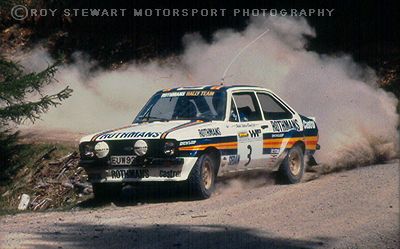
This is a Trofeu base model modified with Rallymodels.co.uk decals to reflect the Welsh Rally winning car.
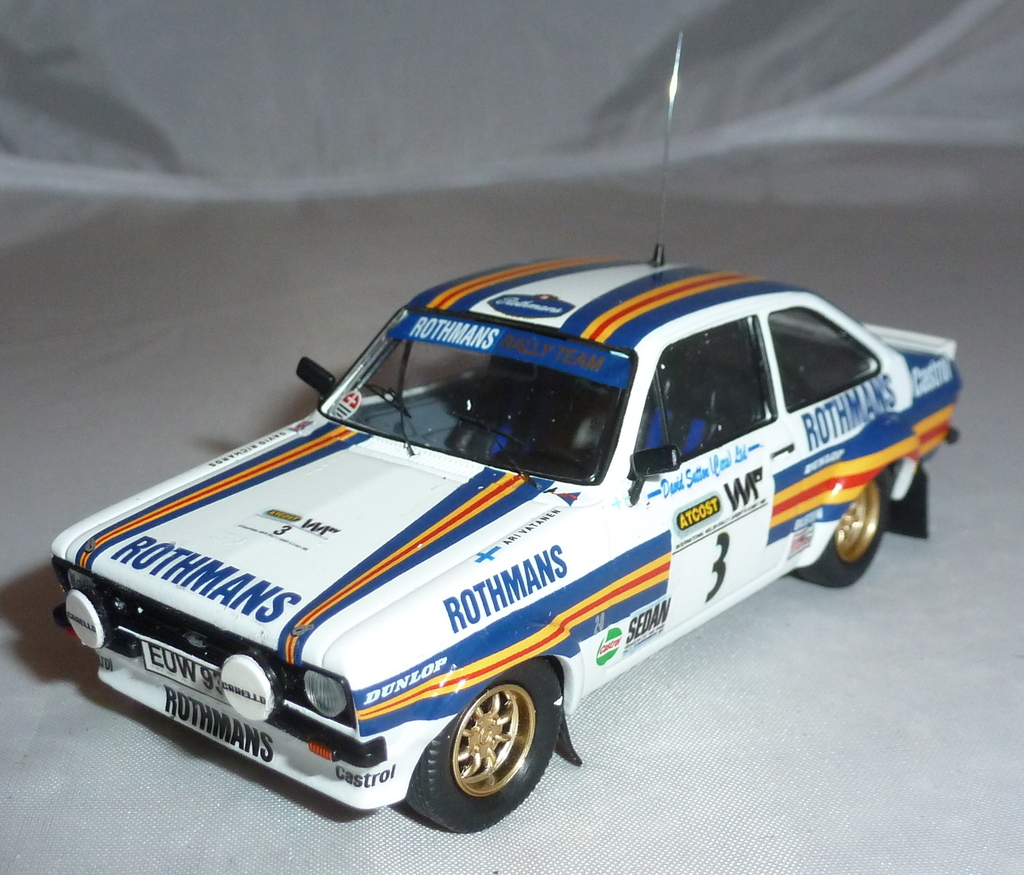
1981
1981 and Sedan Products bow out as the event sponsors, handing over to the glitzy Rothmans outfit. Nobody at the time was too bothered about the ethics of taking cash from a company selling addictive drugs that cause cancer - well, it was Thatcher's Britain - but they were worried about overkill as Rothmans now sponsored the series, one of the rounds and one of the leading teams.
This was also the last year in which everyone - except the army guys in their Land Rovers who tagged onto the end of the Welsh rally - was in two wheel drive cars. Abroad the new Audi was setting the stages alight, but back home Ford, Opel, Toyota, Talbot and Vauxhall battled it out in one last glorious year of high revving, multi-valve engines and tail-out opposite lock before the whispering Quattro spoilt the fun of forest rallying.
Escort development had come to an end two years ago, but the others were still trying to make a 'better Escort'. Opel and Vauxhall could make some claim to have managed to build one. The GM teams had amalgamated and their both their very different cars seemed more stable in fast corners than the old Ford.
With reigning champion Vatanen largely absent as he pursued glory on the world stage, the drivers were mostly UK based, except for Per Eklund in the Toyota Celica. Airikkala was back, driving a Rothmans Escort for David Sutton. Jimmy McRae had left Dealer Team Vauxhall to drive the new Ascona 400 for Opel and in his place was Tony Pond. Brookes was still in the Sunbeam Lotus, still down on power and still waiting for the promised International drives.
The opening round was the Mintexagain and just like last year there was ice and snow and just like last year it was a Rothmans Escort out in front, although this time it was Airikkala. Last time we'd seen him in a Ford he'd been leading the 1976 RAC rally, and he carried on where he left off.
The initial blast through the Otterburn army ranges saw Tony Pond fit slick tires only to find ice instead of tarmac. He left the road and went OTL. Everyone else lost time due to the ice and all but one of the stages ended up being cancelled, but Pond was still out. McRae then chased Airikkala's Escort as hard as he could, but the Finn easily held off the Scott for victory.
The Circuit of Ireland was next and Pond was once again on slicks but this time finding grip. He flew into the lead and was leaving the field behind when the Vauxhall drive system let go. He handed in his time card, but then the stage was cancelled. It wasn't turning out to be Pond's lucky year.
McRae inherited the lead, chased by Brookes. However a tightening right hander caught out the Englishman and he thumped a bank. Ever the pro, he made sure it was the co-driver's door which was stoved in and Mike Broad who received the bruised arm. They kept going, but too far back to challenge for victory and McRae took the laurels.
For the Welsh Rally the big news was that Vatanen was back, and soon leading, chased by Pond. He punctured and dropped behind Pond and Brookes, then Pond disappeared up a fire break whilst flat in fifth and lost enough time to give Brookes the lead, a very unfamiliar position for the Andrews Heat for Hire Sunbeam.
It didn't last though, and when an oil pipe let go Vatanen got the lead back again. McRae pulled back time on the Epynt tarmac and he just nosed ahead of the Finn before it was his turn for a puncture. Vatanen then took the lead for the third and final time whilst Pond put on late spurt and also passed McRae to take second whilst Airikkala was fourth.
In the Scottish Rally Pond was again quickest off the mark, leading Airikkala through the forests, the rest of the field in hot pursuit. Both Rothmans Escorts went off on the same stage and the Brookes' Sunbeam was sick for most of the rally, but on home soil McRae gave the Chevette a run for its money. Pond has his measure though and came home a minute clear of the Ascona. Airikkala was fourth behind team mate Malcolm Wilson. The Escort pair had extracted their cars from the trees but Penti's was handling like a dog for the rest of the rally.
McRae then entered the last round with a comfortable lead in the championship. Only Airikkala could beat him, and only by winning outright.
This was the Manx, now well on the way to becoming a true International rally thanks to Rothman's cash. Star entry, and early leader of the Manx, was reigning World Champion Walter Rohrl, driving a private Porsche since Mercedes had cancelled their rally program. A grinning Rohrl admitted to driving "too quickly" and getting the Porsche up to135mph and frequently airborne, but he still could not shake off McRae and Pond. Airikkala crashed out, leaving the Scotsman with a smug grin. The championship was his, but he wanted the rally as well.
Pond had survived a 100mph spin and when night fell he and McRae found they had the edge over the German in the dark and both Pond and McRae overtook him. Rohrl fought back once the sun rose again but couldn't catch the Brits. The Scott told the cameras he was driving for European Championship points, but Pond didn't believe him, and the stage times suggested otherwise as well. However the Englishman held on and won. Rohrl suffered a broken drive shalf on the last stage, so Wilson came third, but his Escort had been totally outclassed by the GM boys.
Pond had been the fastest man in the series and it seemed unfair that he was not to be champion this or any other year. A great driver, especially on tarmac, and a ready wit, he was signed up by Datsun and then Rover for International events, but was never given a competitive car. He eventually left rallying to concentrate on circuit racing and cameo appearances, like doing a 100mph lap of the TT motorcycle circuit in a Rover 700 Vitesse.
He died, far too soon, in 2002.
Instead it was McRae, who finished on the podium in every event, who took the title off Ari Vatanen, which must have made his thirteen year old son Colin very proud. Ari, now Private Vatanen of the Finnish Army, can't have minded either as two months later he became World Champion on the RAC Rally.
But Vatanen didn't win the RAC, he only came second. The winner was Hannu Mikkola in the first British appearance of the Audi Quattro. British rallying was never to be the same again.
1981 Circuit of Ireland
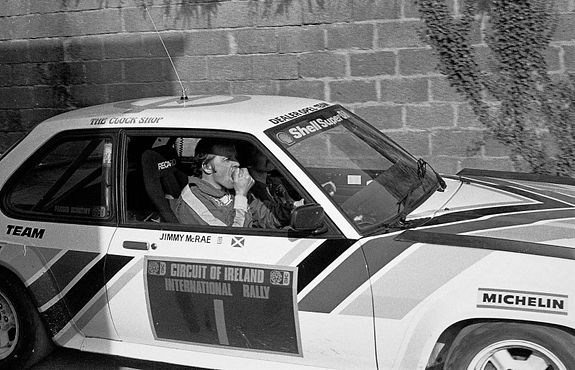
1982
Fire up the Quattro, it's time for action.
1981 had been fun, but it had all been a bit insular and provincial. True, the World Champion that was (Walter Rohrl) and the World Champion to be (Ari Vatanen) had both popped by, and there were a couple of Belgians on the Manx, but all the drivers battling for the series had been British resident even if, like Pentti Airikkala, they weren't British born.
However for 1982 that all changed. The world and his wife came to battle it out on the Open. The last round of the series, the Manx, featured seven A Priority Drivers, that is, drivers who have won a World Rally or the European rally Championship in the last three years or finished in the top three of a WRC round, or the top five of the ECR, in the last twelve months. Jimmy McRae was British but the other six, Ari Vatanen, Hannu Mikkola, Guy Frequelin, Henri Toivonen, Stig Blomqvist and Per Eklund, weren't. One was the World Champion, two of the other were future champions and another was die whilst the fastest rally driver in the world. It was a stellar cast.
But we are getting ahead of ourselves. The series started, as usual, in a chilly Yorkshire with the Mintex and leading the field away from York was Mikkola in the Beast from Stuttgart, run by our own David Sutton. Vorsprung durch Masses-of-Grunt-Grip, the Quattro was like something from a different planet in 1982. In these days of bang-bang devices and clever differentials it's hard to explain just how dull four wheel drive and turbo charging was when it first arrived on the rally scene. The Quattro was quiet and it braked and cornered in a straight line. Unless you saw the speed at which it could accelerate out of a slow corner, it did not look like a rally winner.
Looking more like the real thing was reigning champion Jimmy McRae, still in an Opel Ascona 400 but now part of the Rothmans team, along with 1980 RAC winner Henri Toivonen. Russell Brookes was still sponsored by Andrews Heat for Hire, but had ditched the unlucky Sunbeam Lotus for a Chevette HSR. Vatanen was in a black MCD Escort and Per Eklund was getting ready to have another go at making the Toyota Celica competitive. The man left standing when the music stopped was 1979 Open Champion Pentti Airikkala. With no works drive, he bought himself an Escort to compete.
On the opening round though, it was the Quattro that was the car to have, and Mikkola lead from the off and started taking ten seconds a stage off everyone else. Behind him the others were struggling for grip. The Finns though seemed to be having the better of it. Vatanen and Airikkala battled it out through Yorkshire, with Pentti getting his private Escort ahead of the David Sutton machine only for steering failure to end an inspired drive. Toivonen took over the chase and closed the gap Vatanen's engine went off song in Dalby forest. Seconds separated the Finns as they went into the final sprint around Oliver's Mount, but on the Scarborough tarmac Toivonen's Opel was quicker and he snatched second place.
Leader of the home drivers for most of the rally is National Champion Terry Kaby. McRae has a slow start but gradually rose up the field to finish fourth. It had been a poor showing for the home team though and the Scandinavians had totally outclassed them.
Fortunately the next round was rather better suited to home grown talent and two wheel drive machinery. The Circuit of Ireland was five days of blind tarmac rallying round Ireland. There is nothing like it today. The Rothmans Asconas shot into the lead, but Mikkola was floundering in the big Audi. They weren't totally invincible it seemed.
McRae led, then Toivonen, then McRae again. Then Toivonen left the road and climbed a bank. Damage to the car was minimal but he's broken a bone in his wrist.Carrying on would be painful, but carry on he did. Vatanen then took up the chase, the World Champion pedalling the Escort as hard as he could, but not making much progress against McRae. Mikkola's Quattro was snapping driveshafts and David Sutton was reduced to pouring Coca Cola and then flour into the gearbox to prevent clutch slip. Brookes had been delayed early on by electrical problems but was now charging up the field.
Vatanen looked like he might just steal a win until he took a yump too fast and damaged the Escort, dropping him right down. Brookes had fought his way up to second, but a brave Toivonen held on for third but Mikkola was down in sixth, behind a pair of Irishmen. It was Jimmy McRae though who won, making it a hat trick of Irish wins for him.
For the Welsh though Mikkola was absent as Audi had sent him to the Tour de Corse, a decision they probably regretted as Mikkola steering failure retired the car before the first stage. The real world threatened to interrupt the rally, as it was feared that the army would want the Epynt ranges, which made up half of the rally, to train for the Falklands War.
In the end the rally went ahead without trouble, Walter Rohrl had said an "educated monkey" could win in a Quattro, but in the end Audi chose a different sort of primate for the event, the 1979 World Champion and 1977 RAC Rally winner Bjorn Waldegard. He vaguely remembered Epynt from an RAC a few years back, and was soon proving that Quattros could go well on tarmac. The Swede, who in his time had rallied everything from a Lancia Stratos to a Mercedes 450SLC, led from the off and took a comfortable victory.
Behind him there was chaos. Vatanen took a wrong turn on Epynt and was excluded whilst on the last blast through the tarmac McRae tool a "95mph corner at 100" and totalled the Ascona. Team mate Toivonen took second and the series lead whilst Stig Blomqvist, in a Talbot Sunbeam Lotus, was third.
It was back to the forests again for theScottish Rally, and with Mikkola returning another Audi walkover was expected. But that wasn't what happened.
Instead the Quattro broke its steering arm - again - on the first corner of the first stage. Mikkola managed to get the car off the stage in reverse, but he'd lost nearly eight minutes and was dead last. Vatanen was leading, chased by Blomqvist and the two Rothmans Asconas, but Mikkola was after them. The Quattro overtook Malcolm Wilson to lie fifth by half time at Aviemore.
As they raced through the northern forests Vatanen retired with a broken driveshaft handing the lead to Blomqvist, who then retires with head gasket failure. Mikkola overhauled Russell Brookes, then Toivonen and then finally leader McRae. Mikkola won in the end by a massive ten minutes, but he'd done it the hard way.
So it was all to play for on the Manx, three days of pace noted tarmac stages with an A lost cast. McRae needed to win the rally to retain his Open title, with Toivonen, Mikkola and Brookes all in with a chance if he didn't.
On the first day though, it is the Finns Vatanen and Toivonen who were dicing for the lead whilst Terry Kaby led the home challenge. Mikkola was again struggling and didn't make the finish, and both Talbots expired with engine trouble on the same stage.
Toivonen lost the lead when he punctured, but regained it when Vatanen crashed after a yump. Toivonen then has electrical problems, allowing McRae into the lead. With the car fixed he took off in pursuit of his team mate, only to crash out of the rally. This left McRae with a comfortable lead over Brookes, which he held to the end.
So it was the part time heating and plumbing engineer from Lanarkshire who was champion. The best drivers in the world had come to the British Isles to try to take the title off him, but had failed. The Scot had had a good year, also winning rallies in Belgium and Ireland and coming second in the European Rally Championship.
But whilst a Brit may have won the Drivers award, every round had been won by a German car, With a series that featured two tarmac, two mostly gravel and one 50/50 rally, the battle between two wheel drive and four wheel drive had been fascinating. Had Mikkola skipped Corsica and gone to Wales he may have won both the rally and the championship, but that wouldn't have stopped Opel taking the manufacturers prize. The Ascona 400 had shown it was the perfect car for the series; a reliable all rounder. The Quattro had proved unbeatable on gravel, but too complicated and unreliable for a series where every score counts.
Audi would be back though, and next time the British boys wouldn't find it so easy.
1982 Circuit of Ireland
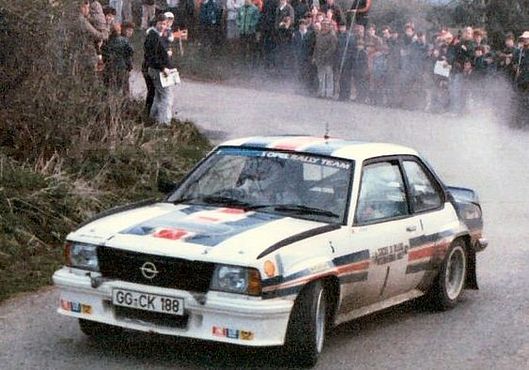
The 1981 and 1982 championship winning Opel Asconas are modified Vitesses models with homemade decals from the Circuit of Ireland rally.

1983
British fans had two questions at the start of the 1983 British Open: could anything beat a Quattro in the forests, and could anyone take the title from McRae? The answer to one of these questions was yes and the other no.
There were a few changes to the field for '83.
Mikkola was absent, off to become World Champion. Instead the Quattros were to be driven by Swede Stig Blomqvist and Finn Lasse Lampi. The Stig was a rallying exile. Sweden had got so fed up of Quattros winning all their snow and gravel rallies they'd banned them, so he he'd come over here instead. The clever men in Stuttgart had also been fettling their machines, and the Quattro was no longer such a dog on tarmac.
Opel had been busy too, although problems had delayed the homologation of the Manta 400 and they'd have to start the season with the old Ascona. The new car, when it arrived, promised more power - but less driveability - and a better weight distribution thanks to an engine pushed as far back in the bonnet as it would go.
Vauxhall though were still where they were three years ago, and still using thirteen inch wheels, but at least the old Chevette HSR was reliable.
Once again it was two wheel drive versus four wheel drive. The Ulster had been added to the series, to make six rounds and the extra tarmac would help the two wheel drive cars, but a 'best five' rule would allow the temperamental Quattro a free breakdown, which could even things up.
That was about it for the top line entries, but Group A was now an interesting class. Per Eklund was now in a Group A Corolla 1600GT , and the rear wheel drive car would face opposition from Fords Escort RS1600i driven by Malcolm Wilson and Louise Aitkin. Harold Demuth's Audi 80 Quattro would eventually be homologated into Group A too, but had to start the year as a Group B car. Privateer Chris Lord in the Mazda RX7 would also be contesting this Group.
The opening round was once again theMintex. It started on the Otterburn tarmac and for two stages Russell Brookes's Chevette was the leader in the fog. However once the rally hit the fast Yorkshire forests Blomqvist took the lead in the Quattro. The weather perplexed the organisers, but when the chaos was sorted out Blomqvist won comfortably from Jimmy McRae's Opel, and Eklund was a surprise third ahead of Brookes and Demuth's 80 Quattro.
A Quattro winning on gravel though was not news, however a Quattro leading on tarmac was, and that's what happened on the next round, the Circuit of Ireland. In fact Blomqvist wasn't just leading, he was walking away with the event. Nearest rival was Pentti Airikkala, who was driving by far the most interesting car to appear in the series, at least in my opinion, the Lancia 037 Rally. British fans had seen the car in the previous year's RAC - or at least most of them had, I'd been in bed with a bad cold - but this was its first appearance in Ireland.
The Easter traffic was as bad as ever, and when Blomqvists gearbox broke his service crew were stuck in it and he had to retire. This gave Airikkala the lead in the Italian supercar, but he was finding the mid-engined car tricky to handle. His first encounter with the scenery dropped him him to third, but his second put him out.
The man who inherited the lead was Russell Brookes. Three times winner McRae had had a troubled run, but he still had to hold off Irishman Bertie Fisher in another Ascona before he could claim the win. The Scot's hold on the rally had been broken and it was starting to look like it might be Russell's year.
In Group A Eklund and Wilson retired and Chris Lord managed to hold off Louise Aitkin to claim the win.
The Welsh was next, and finally Opel had the Manta 400. in due course this would become one of the best rear wheel drive rally cars ever, but on debut it understeered terribly and McRae struggled, eventually only managing sixth. This left Brookes to take on the Audis. he beat Lampi, but Blomqvist had disappeared into the distance and won by nearly eight minutes.
In Group A Eklund and Wilson battled it out, with the Toyota a comfortable winner.
The action then moved north of the border for theScottish which, rather than being hot and dusty, was cold and wet in '83. Blomqvist cruised to an easy win, but behind him Brookes and McRae tussled for the runner up spot. The Manta was starting to work properly now and in the end it all came down to punctures. The Chevette and the Manta both punctured on stage 28. Brookes had to stop and change the wheel whilst the Opel was able to struggle to the end of the stage, which gave the Scot second.
Eklund, meanwhile, won Group A by twenty minutes as the opposition fell apart.
It was back to the black stuff again for the Ulster Rally, but any hope that this would allow the two wheel drive cars to head Blomqvist were soon dashed. The Swede was again unbeatable. McRae had a troubled rally with the Manta. At one point the heater caught fire, and on another stage he had to stop to let petrol fumes out of the car. He must have wished for his old Ascona back.
Brookes's Chevette was running fine though, although the driver had 'flu. He spun on stage 5 but only lost thirty seconds, and was hanging on in third, unable to match the pace of Irishman Bertie Fisher in his Manta. Blomqvist had transmission problems, which briefly put Fisher in the lead. Brookes's co-driver Mike Broad put in a complaint that Audi had serviced the car illegally, but it was rejected. Instead Blomqvist soon regained the lost time won the rally by over a minute.
This left Blomqvist on 60 points to 53 for Brookes. Due to the 'best five' rule, to be champion, Brookes had to win the last round outright and Blomqvist not score at all. So it was all to play for on the Rothmans Manx.
As Rothmans also sponsored the series and the Opel team, they sent along a brigade strength squad for the event, consisting of Ari Vatanen, Henri Toivonen and Jimmy McRae. These three were soon leading, with the young Finn just ahead of his older countryman. Brookes was fourth until a puncture on day two cost him two and a half minutes, and dropped him to seventh, just behind Blomqvist.
McRae ended an unhappy year when the Manta's axle gave out, elevating everyone a place. The Audi engineers then turned the Quattro's boost up to eleven and Blomqvist started moving up the field with Brookes right behind. The Quattro was third behind the Opel pair, when it started stage 44 out of 49. Brookes was following and could see the Audi across Druidale when "Suddenly there was a mushroom cloud of oil smoke - it was like an atomic explosion." With a piston sticking out of the side of the engine block Blomqvists championship was over.
There was now the possibility of GM giving the Opels team orders to let the Chevette past. Brookes had asked before the rally what would happen in this situation, but he denied actually asking for the Mantas to be slowed. "I would not have wanted to win the rally that way," he said in 1983, although he'd clearly changed his view by 1989......
Eklund won Group A from Lord's RX7. He'd wrapped up the championship in Ulster but his seventh overall put him fourth in the overall championsip. This was a nice result for the Swede after two years of driving unreliable and slow Celicas.
Russell Brookes though was disappointed to be runner up. He had scored in every round and said "I have driven harder, faster and better in 1983 than I have ever driven before." He had beaten McRea for the first time since the Scot had moved up to driving top level cars. After two disastrous years with Talbot and a troubled debut with Vauxhall, he was now back at the front of the field and would challenge for the title in every year for the rest of the decade.
But for Vauxhall Chevette this was the end, at least as a Works car. Conceived, rather optimistically, to win the 1976 RAC Rally, the Chevette had indeed been a 'better Escort' but had now run out of development. Airikkala had driven one to win the 1979 Open, but every other year had been a disappointment. We fans, though, loved the tail-out Chevette and its disappearance from rallying was another nail in the coffin of the ailing British car industry.
So it was a Swede who was British Open Champion. Not that we minded too much. We knew Stig, you see, and had been following his exploits since he'd won a particularly snowy RAC Rally in 1972. Besides, Stig could make the Quattro dance, he was the only one who could. Years of chucking overweight Saabs around the forests and rallycross tracks had given him car control second to none and for the first time we could see an Audi sideways.
He was far and away the quickest Quattro driver of them all, and Audi were starting to realise this as well. Two months after his engine blew in the Isle of Man he won the RAC Rally, and for the next year Audi gave him a shot at the world title. He took the opportunity and ran with it, and became the 1984 World Rally Champion. Like Vatanen three years before, the Open had been the springboard to the top of the tree.
This just showed what an important series the British Open was.
1983 Mintex
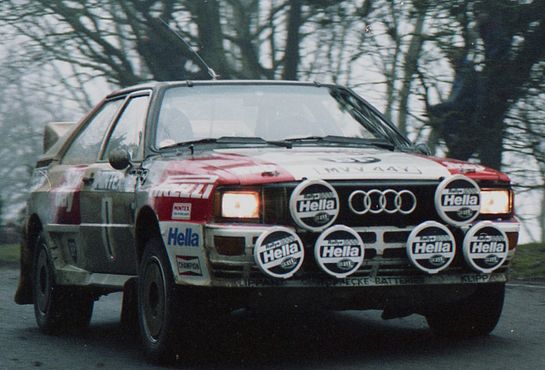
This is a modified Trofeu base with homemade decals.
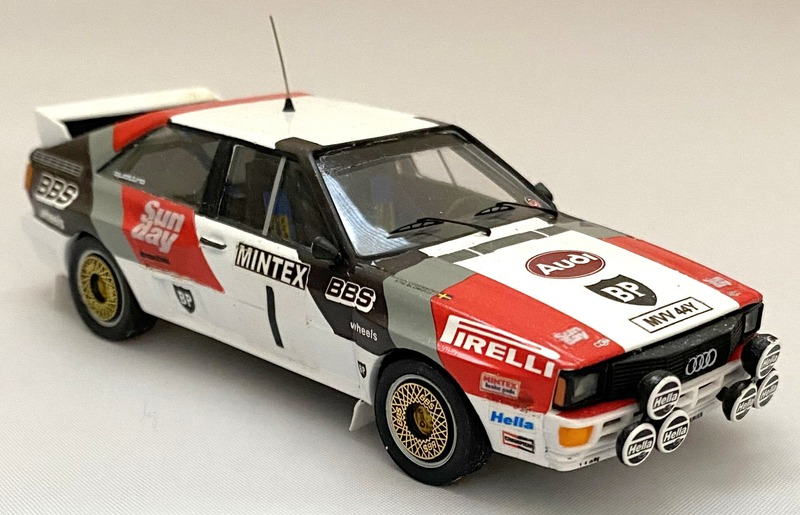
1984
Blomqvist had beaten the Brits handsomely in 1983, but for 1984 he was away on a campaign that would see him become World Champion in the Ivory Coast in October.
Instead, Audi sent the reigning World Champion, Hannu Mikkola, to contest the series. Also in a Quattro was Malcolm Wilson.
Wilson had been developing a new car for Ford, a rear wheel drive turbo charged Group B car using an Escort Mark Three bodyshell. Ford though had realised that you couldn't win now without drive to all the wheels and had abandoned the project and gone back to the drawing board.
This left Wilson without a team, so he bought Stig Blomqvist's 1983 series winning machine and formed his own, learning the skills that he would use fifteen years later to run the official Ford team.
Up against Audi was the works Opel team of Jimmy McRae and Russell Brookes, using the two wheel drive Manta.
With the demise of Vauxhall that, unfortunately, was that in terms of Works teams. Quality not quantity. Group A was also looking fairly quiet, with Per Eklund in the Toyota Corolla the only factory driver starting the series.
The series started, as usual, in a chilly Yorkshire with the event formerly known as the Mintex, but now called the National Breakdown. On the icy stages Mikkola's Quattro walked the event, but behind him in the fog McRae, Brookes and Wilson had a good tussle. McRae caught a glove in his harness on the first stage and spun, punctured in Wykham and needed an axle change, but still managed to finish ahead of Brookes. Wilson couldn't keep up with the Mantas on his Quattro debut and retired whilst lying fourth.
Group A meanwhile was not the expected walkover for Toyota. Eklund's Corolla was headed for most of the rally by Mikail Sundstrom's Sunbeam Ti. The Talbot left the road once and broke three gearboxes, the last one failing mid-stage and stranding the Finn.
However the event was overshadowed by the death of Escort driver Hafsteinn Hauksson in Dalby. Treeless Iceland's leading rally driver, he had had to overcome a phobia of driving in forests to compete in Britain, so his death was both tragic and ironic.
The rally circus next grouped at Easter for the traditional blast around the Emerald Isle, the Circuit of Ireland. Mikkola and Eklund were tacking the Safari, so German Harold Demuth took over for Audi and Juha Kankkunen - another future World Champion - sat in for Eklund. Up against the Toyota was the new Rover 3500 Group A car driven by veteran Mini and Imp man Colin Malkin. The Rover was far too big for the narrow lanes, but it offered oodles of tail out grunt and was an instant hit with the fans. The Irish petrolheads also got to gawp at Henri Toivonen in the Rothmans Porsche. The Finn was desperately unhappy in the team, but you couldn't tell from his pace.
The opening stages provided drama a plenty. Brookes suffered prop shaft failure on the first stage, McRae suffered brake problems and went into a field on stage two, Toivonen left the road on the third stage and Malkin retired on the fifth stage. The Rover had more power than the Group B Mantas and its back axle couldn't cope. By the end of the season the Rover engineers were reduced to a device to spray washing up liquid on the tires to reduce mechanical strain.
All this left McRae the surprise leader, but his car was only running on three cylinders and steaming like the Flying Scotsman and he was soon out. Demuth also suffered engine failure which left the local boys Billy Coleman and Austin McHale battling it out in their Mantas. McHale took the lead on the last day only fir his engine to go bang, leaving Coleman as the sole surviving works driver and winner by a country mile. Second was privateer Ernest Kidney and third Hot Rod World Champion Davy Evans in his first ever rally.
Normality was resumed on the Welsh. Brookes took the lead on the Epynt tarmac, but once the rally reached the forests Mikkola's Quattro took over. McRae's Manta was still causing him problems. It overheated, then wouldn't stay in gear. Trying to make up time he crashed and squashed the exhaust. He then did it again and injured his hand. He dropped to sixth but managed to climb back to fourth, behind Malcolm Wilson, helped in part by Anterio Laine's sick Quattro holding up the rest of the field.
It was the dust and midges of the Scottish next. Mikkola and the Quattro led from start to finish again, but behind him the three Brits battled it out. Wilson's Quattro was fastest, but he suffered suspension failure. Brookes then took over second, but he left the road for twelve minutes handing the runner up spot to McRae, who for once had a trouble free rally.
It was back across the Irish Sea for the Ulster Rally next. Mikkola was away in Argentina, so double World Champion Walter Rohrl drove the works Quattro, which appeared to have shrunk in the wash. This was the debut of the Audi Sport Quattro, and it blew the opposition into the weeds. Austin McHale had a major accident on the third stage, so second place ended up being contested between Brookes, McRae and Irishman Bertie Fisher.
An spot of Irish rain put Fisher off the road, and so it was Brookes and McRae scrapping for second place. Seconds separated the two Manta, but in the end McRae overshot a junction and had to concede the position to the Englishman. Just fourteen seconds separated the two Opels in the end.
The crews went into the Manx then with Mikkola on 45 points, Brookes on 44 and McRae on 42. It was all to play for.
Rothmans had intended to send Toivonen in one of their Porsches to contend the event they sponsored, but he had injured his back in the 1000 Lakes and so Kankkunen once more made an appearance in the series. Eklund, who had walked the last three rounds in Group A now again faced opposition from the Rover Vitesse, this time driven by Tony Pond.
Brookes took an early lead and after stage four was looking reasonably comfortable. The Porsche's engine had failed and Mikkola's gearbox had jammed, leaving only McRae to beat. The Andrews Heat for Hire Manta then punctured on the next stage costing Brookes three minutes. McRae took the lead and decided attack was the best means of defence. The Scot set a series of fastest times. Brookes put his foot down to reel in the lost time, but overcooked it at the Tholt-y-will bridge and crashed out of the event.
McRae led Bertie Fisher home by more than ten minutes to take both the rally and his third championship. Third place was Tony Pond in the wheel spinning, tail out Rover.
Brookes was once again the bridesmaid, but he'd enjoyed his first year with the Opel Manta. Next year he'd be back.
1984 Manx
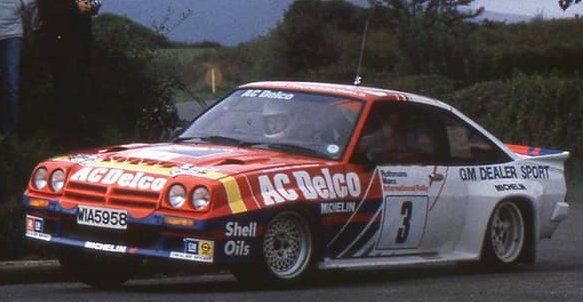
This is a Schucho model of the Manx Rally winning Opel Manta.

1985
Russell Brookes 2nd BRC, again in a Heat for Hire sponsored car, this time however it was an Opel Manta. The season started with the National Breakdown rally, which Englishman Malcolm Wilson and co-driver Nigel Harris won, ahead of Russell Brookes and Terry Kaby. Another victory here for the Audi Quattro A1. Onto the Circuit of Ireland where Jimmy McRae and his co-driver Ian Grindrod won easily in the Opel Manta 400, the car which took him to his third championship in 1984, and which swept the podium, proving its success in Ulster. Two consecutive podiums allowed Brookes to take the championship lead on 24 points. In Wales, at the Shell International Welsh Rally, Wilson got his second win of the year, and retook the lead because of Brookes' retirement from the rally. France's flying female and second place finisher Michèle Mouton got her first ever podium (and ultimately, only finish) in the championship, and McRae's third ensured he stayed in the title fight. At the Lloyds Bowmaker Scottish Rally, Brookes made up for his rally-ending accident last time out by finishing third behind Wilson, who won for the third time this year, and McRae. Two more rallies to go and when recently watching a video of the 1985 Ulster Rally I became aware that the Vauxhall/Opel boys had recognised the need to help Russell in his quest for the BRC title. They therefore built a special Opel Manta which was 40kg's lighter than the standard car - Brookes found his winning form at the British Midland Ulster Rally and defeated McRae and Finland's Mikael Sundström. Going into the traditional season finale at the Tudor Webasto Manx International Rally, Brookes and McRae were tied for the championship lead on 49 points, meaning that whoever finished better of the two would also take the title of British Open Rally Champion whilst Wilson was still in contention for the title on 45 points. The tiebreaker was won by Brookes and therefore the title, his second British Rally Championship. Wilson's championship hopes were ended after the Cumbrian overturned his Audi Quattro on stage 22, crashing out of the rally lead. The co-driver's title went to Mike Broad who beat Ian Grindrod and Nigel Harris.
1985 National Breakdown
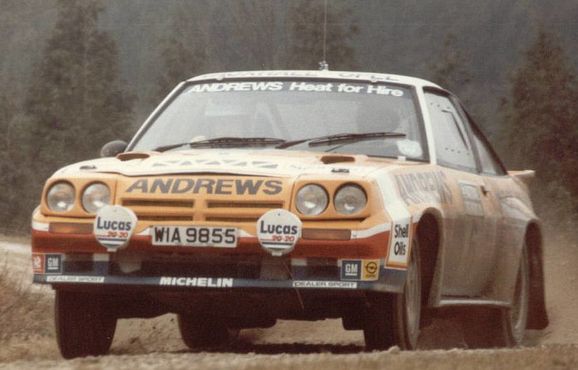
1985 Manx
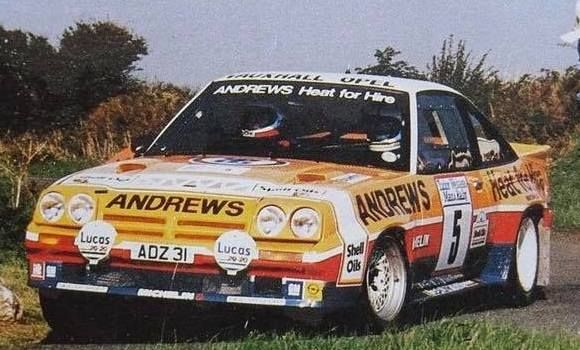
This 2nd place season opening National Breakdown car built with this assistance of Andy Howdle on a Vitesse base, with rubbish Spanish decals, some Vitesse decals and some homemade. The other car is the PJ Rallymodels version of the Manx winning lightweight car. and the

1986
1986 was a year full of emotions, with reports of the tragedies from the world championship inevitably casting doubts how long the dramatic cars would be allowed to run in the British series. It was a special year with Mark Lovell representing Ford in their RS200, David Llewellin and Jimmy McRae driving Metro 6R4s, Hannu Mikkola in a Sport Quattro, and Mikael Sundstrom driving a Peugeot 205T16, all vying against the established Manta 400 driver Brookes. FISA (the world motorsport’s governing body) ordered that no stages could be won at more than 110kph, meaning that many of the stages on the Ulster and the Manx Rallies were achievable with specific target times, even after organisers inserted artificial chicanes. Lovell and Brookes proved to be the most consistent drivers of the series.
The season opened with the National Breakdown Rally which was won by Mikkola, Llewellin 2nd, McRae 3rd, Brookes 4th and Lovell in 5th. Round 2 was the Circuit of Ireland and Lovell went one better by finishing 4th, but Llewellin was looking very strong in the 6R4 and took the win. The Manta 400's of Brookes and MacHale took 2nd and 3rd place. Mikkola was out on SS17 with suspension failure. The Fram Filters International Welsh rally was the next event, and Mikkola was back on form and took the win. McRae was 2nd, and Lovell took another step forward in 3rd. Llewellin was out following an accident. It was a case of progression for Lovell on round 4, the Scottish as he took 2nd place behind Mikael Sundstrom's 205T16 with Bjorn Waldegaard 3rd in the Toyota Celica Turbo Twin Cam. Lovell's main rivals did not have a good time - Mikkola didn't enter, Brookes could only manage 5th against the 4 wheel drive machines, and McRae and Llewellin both suffered engine issues and retired. Mikkola was missing again from round 5, the Ulster, which was won by McRae, Lovell 2nd again, and Sundstrom 3rd. Llewellin had another accident and Brookes was not finding it increasingly hard going to keep pace with the 4 wheel drive cars. The final round was the Manx, which was won by Tony Pond in a 6R4, but he wasn't eligible for BRC points, so 2nd place driver Llewellin took the top BRC step, Lovell another 2nd and Sundstrom 3rd. The outcome was that although Lovell didn't win any events, his sequence of 5th (National Breakdown), 4th (Circuit of Ireland), 3rd (Welsh), 2nd (Scottish), 2nd (Ulster) and 2nd (Manx) was enough to secure the title by 10 points from Brookes. TMark Lovell (27 March 1960 – 12 July 2003) won the 1986 British Rally Championship in a Ford RS200 Group B, the 1987 and 1988 Irish Tarmac Rally Championship, the 1988 International Dutch Rally Drivers' Championship and the 2001 SCCA ProRally Drivers' Championship in the United States. He also won the 2003 Pikes Peak International Hillclimb only two weeks before his death. Mark and his co-driver Roger Freeman were both tragically killed in July 2003 during the Oregon Trail Rally when their Works ProRallySubaru Impreza WRX left the road and struck a tree at high speed shortly after the start of the first stage.
1986 Manx
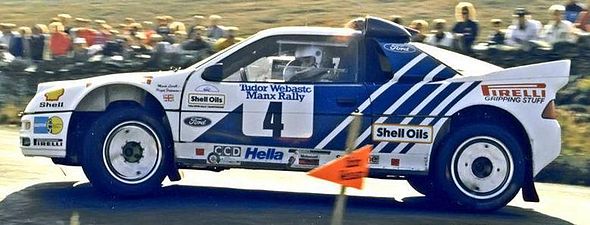
This is the RS200 which finished 3rd in the 1986 Manx Rally. The car was produced by PJ Rallymodels.
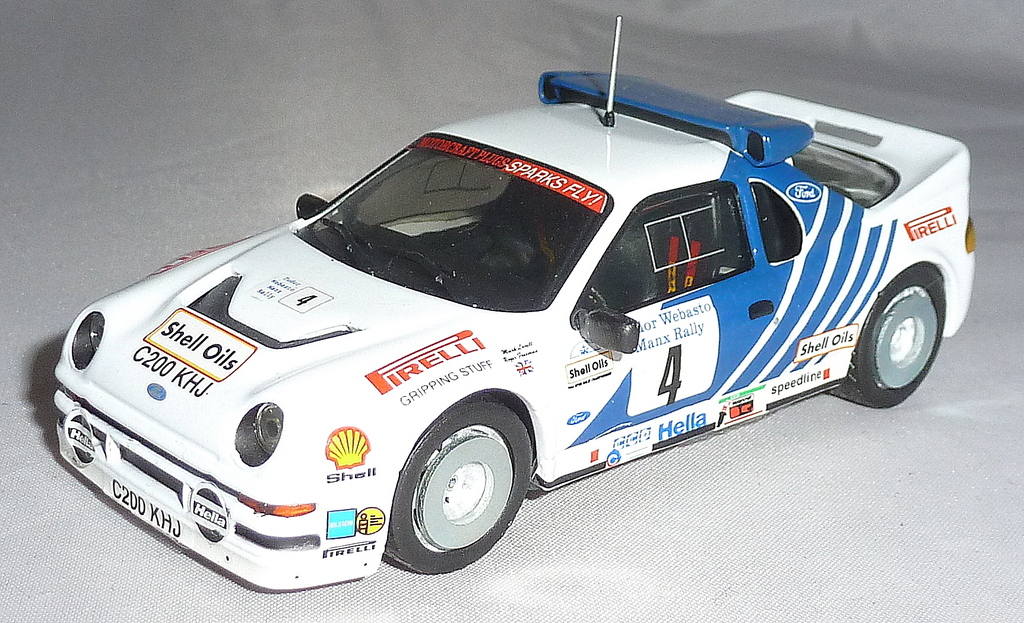
1987 and 1988
For 1987 only cars in Groups A and N, plus the still acceptable small engined Group B cars could compete. The newly homologated rear-wheel-drive turbocharged Ford Sierra Cosworth cars were lined up against Audi’s recently introduced four-wheel-drive normally-aspirated Coupe Quattros while the old style Opel Manta 400s remained unaffected. The popular Metro 6R4s were allowed to compete in the Marlboro Autosport RAC National championship in detuned form. Events were still as tough as ever, with the total stage times for the winners often well over three hours. The 6 event season started with the National Breakdown Rally, which was won by Airikkala in a Group B Manta 400, followed home by Brookes in another Manta and Lindholm in a Group A Audi Coupe Quattro. Jimmy McRae ran a near showroom spec Lancia Delta HF 4WD on the National Breakdown Rally (finishing 11th), before switching to the Sierra Cosworth for round 2, the Circuit of Ireland. I believe one of the Cosworths he drove in 1987 was subsequently passed to his son Colin and I believe Jimmy still owns this car today. The switch of car certainly seems to suit Jimmy as he promptly won round 2 in the Group A Cossie, followed home by David Llewellin and Sebastian Lindholm in the Audi Coupe Quattros. Round 3 was the Welsh, and the Manta 400's ruled the roost, taking the top 3 steps on the podium, led by Russell Brookes. McRae finished 5th in the Sierra. The next round was the Scottish, and Jimmy got the Sierra back up to 2nd place, ahead of Mark Lovell in a similar car, but he couldn't catch Llewellin, finishing just 11 seconds behind him. The Ulster was round 5, and Mark Lovell took the victory this time with Bertie Fisher in a Manta 2nd and McRae taking 3rd. And so it came to the final round. With a maximum 20 points for a victory at stake, the title was realistically between McRae, Airikkala and Llewellin. Airikkala was now in an Astra GTE which won't have helped his chances, and so it proved, with McRae winning the Manx International, Lovell finishing 2nd, Airikkala an excellent 3rd despite the horsepower disadvantage, and Llewellin down in 7th which was enought to give McRae the title by 14 points.
1987 National Breakdown
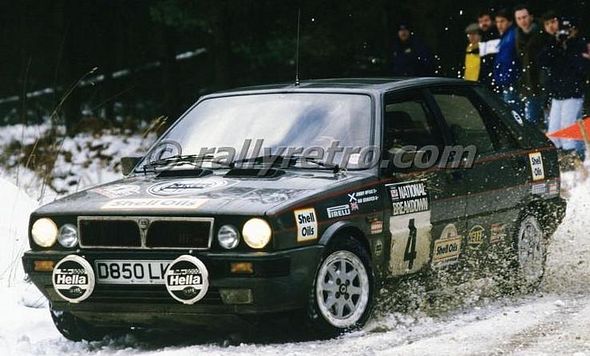
1987 Manx
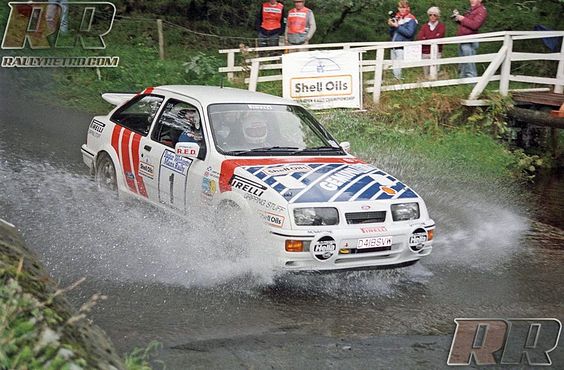
In 1988 the traditional secret forest route nature of the sport came under serious threat and the breakthrough came with the Scottish Rally, the first time that pacenotes could be used in British forest rallying, the end of an era. It had nearly happened in 1987 but for 1988 it was permitted, starting off with a restricted form of reconnaissance with all the drivers in a one-time convoy, one behind the other. This was a fundamental step forwards, ending the suspicions of cheating and of the perceived advantage of local knowledge – not that this was valid given the success of foreign drivers beforehand. Ironically 1988 was to be the only time the Scottish driver Jimmy McRae won the Scottish Rally. It was two more years before Rally GB (which had dropped out of the BRC after 1977) also allowed reconnaissance. 1988 was again a 6 event season, which kicked off with the Cartel rally. McRae's defense could not have got off to a worse start as he failed to finish the event following an accident. Airikkala took the win in the Mitsubishi Starion Turbo, Louise Aitken-Walker was a superb 2nd in the Peugeot 205 GTI and Gwyndath Evans took 3rd in the Group N Sierra Cosworth. The say you can't keep a good man down, and so it proved at round 2, the Circuit of Ireland. Jimmy won the event by 3 mins ahead of Phil Collins in a similar car, with Malcolm Wilson a creditable 3rd in his Vauxhall Astra GTE. Gravel seemed to be favouring the Starion, as Pentti took his 2nd victory of the series in round 3 at the Welsh, but McRae kept him honest by finishing 2nd, with Wilson 3rd again in the Astra. Round 4 was the Scottish, and as mentioned earlier, the addition of pace notes seem to even help McRae, despite his supposed greater familiarity with his home rally stages. So first place to McRae, a superb 2nd for Wilson in the Astra, 3rd to Brookes in another Cosworth and a disappointing 4th for Pentti. On to the Ulster and Pentti's challenge seemed to fade in round 5 when he was taken ill and unable to complete the event. McRae won from Lovell, with Wilson continuing to impress in 3rd. The 6th and final round was the Manx and despite finishing 2nd behind the M3 of Patrick Snijers, McRae was the leading BRC contender so took the "win", with Phil Collins' Cossie 2nd and Wilson rounding off an excellent year in 3rd. These turned out to be Jimmy Mcrae’s 4th and 5th BRC wins.
1988 Ulster
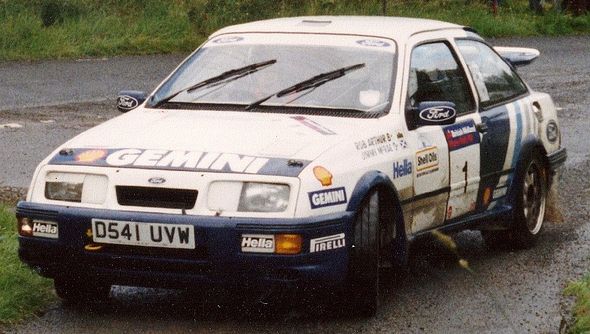
The 1987 Lancia Delta HF 4WD is a converted road car produced with grateful help from Dave (Zeus) who provided some reference photos. The 1987 Manx winning car is from the Trofeu British Rally Legends series (jimmy also won the COI in 1987), the 1988 Ulster rally winning car is a modified Trofeu model with homemade decals (Jimmy also won the COI and Scottish this year).

1989
The opening round in 1989 was the Cartel International Rally and it was won by David Llewellin’s Toyota Celica GT-4 ST165, followed home by Thorbjorn Edling's Mazda 323 4WD and Russell Brookes Sierra RS Cosworth. Cosworth's took all 3 steps on the podium in round 2, the Circuit of Ireland, led by McRae, then Brookes and then Lovell, with Llewellin out with clutch failure. But it was back to the loose stuff for round 3, the Welsh, and that certainly suited the 4 wheel drive Celica better than the Sierra's, and at the finish it was Llewellin, Brookes and McRae who took the plaudits. Round 4 was the Scottish, and again, Llewellin demonstrated the superior abilities of the 4 wheel drive Celica on gravel by coming home in first place ahead of the Sierra's of Lovell and Gwyndaf Evans. Tarmac was clearly the natural home of the 2 wheel drive Cosworths because as the season switched back to asphalt for round 5, the Ulster, so the Sierra's led by Evans and Brookes headed the leaderboard at the end of the rally. LLewellin did will to finish 3rd, beating McRae in to 5th. The final round, the Audi Sport, was mixed surface and set us up for what should be a great season ending. And so it proved - Llewellin winning the rally and the overall championship, Timo Salonen in a Mazda 323 4WD taking 2nd, and a certain young McRae who went by the first name of Colin, showing what he could do in his dads 2 season old BRC championship winning car. That must have been interesting for father Jimmy, in his newer car, who finished 2 placed further back in 5th.
1989 Cartel
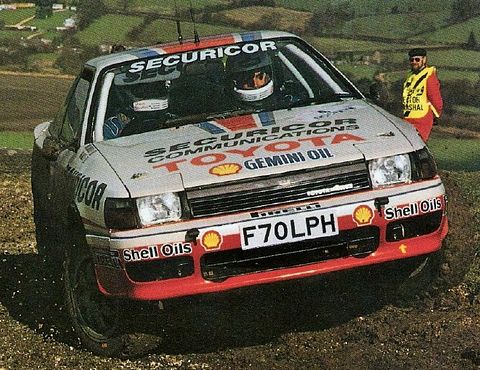
Both models have been built on Altaya base’s, the 1989 Cartel winner with homemade decals (David also won the Welsh, Scottish and Audit Sport this year) , the 1990 Circuit of Ireland winning car with a combination of bought and homemade decals (David also won the Welsh, Scottish and Ulster events in 1990).
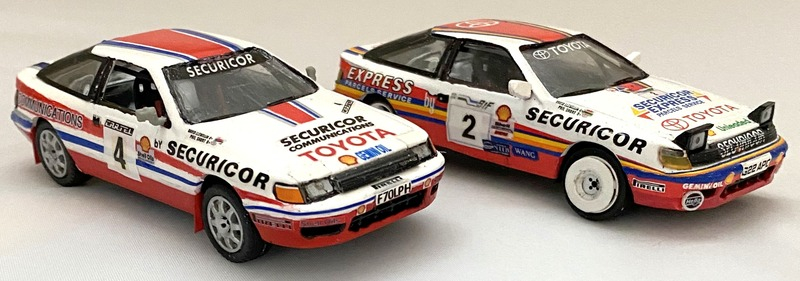
1980
So it's out with the seventies and with it went the most important team in British rallying.
Airikkala may have won the championship in a Chevette, but Ford had taken the manufacturers title. what's more Fords had provided the mount for every previous British rally champion since Will Sparrow won it in a Mini Cooper in 1970.
However the end of the decade also marked the end of the Mk II Escort and so Boreham had to go off and develop something else to rally. what that something else turned out to be is another story, but in the meantime their drivers had to find somewhere else to go.
Russell Brookes and Henri Toivonen went to Talbot, Roger Clark went to drive a TR7 V8 where he was joined by Talbot's development driver Tony Pond.
Meanwhile Hannu Mikkola and Ari Vatanen stayed in Escorts but moved to David Sutton's private team, where the former kept him Eaton Yale colours but the latter adopted the swanky new Rothmans look.
Absent from the scene unfortunately was reigning champion Airikkala, who was off to tackle the European Championship for Vauxhall, although the money ran out pretty quickly and he never really had a look in. This promoted Jimmy McRae to Vauxhall numero uno. The other change at Vauxhall was that the Chevette HS became the HSR, growing wings and getting back some of the tweaks that Bill Blydenstein had wanted on the HS but that Vauxhall had forgotten to homologate.
A new team joining the top table was Opel, with their Ascona 400. A big car with squared off arches it resembled the Fiat 131 Abarth, which had never gone well in Britain, so people had their doubts.
Also moving up were Toyota, who had re-homologated the Celica back into Group 4 and given one to Austrailian Alan Carter.
But if Toyota were moving forward, Saab appeared to be going backwards. In 1979 the 99 Turbo had been a rally winner and championship contender. In 1980 though they struggled to finish a rally.
This then was the grid. Seven teams chasing the trophy, a record entry of top level teams. The manufacturers had also won their battle with the organisers and the series was down to a more reasonable five events; three on blind gravel, one on blind tarmac and one on pace noted tarmac.
The series started in Newcastle with the Mintex. Swedish Rally winner and World Championship leader Ander Kullang put the Ascona into the lead on the first stage, but on the second the crank let go on his newly built engine.
The first day was mainly a run around the Otterburn ranges and the surprise leader on these tarmac stages was Willie Rutherford. The stages had been used for a National rally a few days before hand and this clearly benefited the private Escort driver.
Once the rally reached the real forests though it was clear who was boss. In stage after stage it was Mikkola from Vatanen, and the blue Escort eventually came home the winner by over a minute. Neither Talbot finished and McRae came third.
Mikkola though was committed to driving a Mercedes in the Safari so didn't join the rest of the field for the start of the Circuit of Ireland in Belfast. Billy Coleman took an early lead in an Eaton Yale Escort with McRae and Vatanen close behind. McRae was literally flying. Into the lead and then over a hedge and into a field.
The Scot was incredibly lucky. The car was virtually undamaged and because most of the leading crews cleaned the stage he only lost one minute. By the second day's halt he was 32 seconds behind Vatanen, who was leading as Coleman's engine had gone bang.
The last night and day of the morning was probably some of the fastest rallying Ireland had ever seen. Both men drove their hearts out, with the Finn holding a slender lead. At one point McRae closed to within 10 seconds, only for Vatanen to pull 7 seconds back on the next stage.
Then, two stages from the end, Vatanen lost control of his Escort at 100mph and rolled. Like McRae, he was lucky, but he lost a minute and damaged the suspension. he threw in the towel and allowed McRae to take his first Open victory.
Battle resumed on the next round with an uncharacteristically dry and dusty Welsh. Mikkola was back, but they'd fitted a racing engine to his car and Hannu found that only by "revving it to bloody hell" could he make the thing go. Vatanen, who'd just become a dad, took an early lead but Mikkola soon overhauled him. They were both leaving McRae in their dust, and the Scot's car eventually refused to start after a service and the championship leader was out.
Eating Mikkola's dust that he was, Vatanen was not giving up. The two were swapping fastest times, but the Rothman's car was slowly gaining on the Eaton Yale one. Just before half way he was back in front. Mikkola chased hard, but picked up a puncture on Epynt.
Then, four stages from the end, Vatanen hit trouble. A timing belt slipped, a valve dropped and an idler pulley jammed. No spares were carried so this looked fatal. Fortunately the mechanics kept their heads. The engine was allowed to cool which freed up the pulley. Vatanen limped through two stages whilst his mechanics found a retired Escort on a trailer and nicked its idler pulley. A relieved Vatanen then returned to Cardiff to claim his win.
There was more dust on the Scottish, and once again it was the Mikkola and Vatanen show.
This time, with a more manageable engine, Mikkola had the edge and led from stage one. Behind the two David Sutton cars Anders Kullang was holding off variety of challengers. Malcolm Wilson looked set to take the last podium place off him, but went off and hit a bridge. It was a bad accident and he broke both ankles, but for a while it was feared his injuries were much worse.
Pond then had a crack with the big TR7, getting the beast up to 135mph at times. However throttle cable problems kept turning his V8 into a straight four and he had to settle for fourth, three places ahead of McRae who'd had a terrible rally.
And so it all came down to the Manx - or rather it didn't. Mikkola was in New Zealand trying to tackle a blind gravel rally in a big Mercedes, and once he failed to show Vatanen was gifted the championship.
The rally though was great.
Blisteringly fast, with cars 'cleaning' some sections and flat out in fifth for some sections - that's 140mph for a TR7 - it turned into a three way duel between Pond, Vatanen and McRae. Vatanen initially had an off song engine and Pond went into a comfortable lead. A puncture then put McRae ahead, but a broken rotor arm then dropped the Scot to third and gave victory to the red Triumph and its Manx based driver. Andy Dawson drove the Chequered Flag Stratos to fifth - a magnificent car but now apparently from a different era.
Vatanen was a popular champion. Four second places and a win was a fine record and British fans once again had a hero who drank nothing stronger than milk and usually wore sleeveless pullovers.
With a victory on the Acropolis as well it had been a triumphant year for David Sutton, but shortly after Vatanen raised the trophy his world fell apart. He turned out to have lost £100,000 during the year, his two main sponsors pulled out and his leading driver left to move to Audi.
With Roger Clark bowing out after a disappointing season, Triumph going too and Sedan handing over the championship sponsorship it was the passing of an era.
Next year it would be the Rothmans British Open, a slicker operation all together. But what would that mean on the stages?
1980 Welsh

This is a Trofeu base model modified with Rallymodels.co.uk decals to reflect the Welsh Rally winning car.

1981
1981 and Sedan Products bow out as the event sponsors, handing over to the glitzy Rothmans outfit. Nobody at the time was too bothered about the ethics of taking cash from a company selling addictive drugs that cause cancer - well, it was Thatcher's Britain - but they were worried about overkill as Rothmans now sponsored the series, one of the rounds and one of the leading teams.
This was also the last year in which everyone - except the army guys in their Land Rovers who tagged onto the end of the Welsh rally - was in two wheel drive cars. Abroad the new Audi was setting the stages alight, but back home Ford, Opel, Toyota, Talbot and Vauxhall battled it out in one last glorious year of high revving, multi-valve engines and tail-out opposite lock before the whispering Quattro spoilt the fun of forest rallying.
Escort development had come to an end two years ago, but the others were still trying to make a 'better Escort'. Opel and Vauxhall could make some claim to have managed to build one. The GM teams had amalgamated and their both their very different cars seemed more stable in fast corners than the old Ford.
With reigning champion Vatanen largely absent as he pursued glory on the world stage, the drivers were mostly UK based, except for Per Eklund in the Toyota Celica. Airikkala was back, driving a Rothmans Escort for David Sutton. Jimmy McRae had left Dealer Team Vauxhall to drive the new Ascona 400 for Opel and in his place was Tony Pond. Brookes was still in the Sunbeam Lotus, still down on power and still waiting for the promised International drives.
The opening round was the Mintexagain and just like last year there was ice and snow and just like last year it was a Rothmans Escort out in front, although this time it was Airikkala. Last time we'd seen him in a Ford he'd been leading the 1976 RAC rally, and he carried on where he left off.
The initial blast through the Otterburn army ranges saw Tony Pond fit slick tires only to find ice instead of tarmac. He left the road and went OTL. Everyone else lost time due to the ice and all but one of the stages ended up being cancelled, but Pond was still out. McRae then chased Airikkala's Escort as hard as he could, but the Finn easily held off the Scott for victory.
The Circuit of Ireland was next and Pond was once again on slicks but this time finding grip. He flew into the lead and was leaving the field behind when the Vauxhall drive system let go. He handed in his time card, but then the stage was cancelled. It wasn't turning out to be Pond's lucky year.
McRae inherited the lead, chased by Brookes. However a tightening right hander caught out the Englishman and he thumped a bank. Ever the pro, he made sure it was the co-driver's door which was stoved in and Mike Broad who received the bruised arm. They kept going, but too far back to challenge for victory and McRae took the laurels.
For the Welsh Rally the big news was that Vatanen was back, and soon leading, chased by Pond. He punctured and dropped behind Pond and Brookes, then Pond disappeared up a fire break whilst flat in fifth and lost enough time to give Brookes the lead, a very unfamiliar position for the Andrews Heat for Hire Sunbeam.
It didn't last though, and when an oil pipe let go Vatanen got the lead back again. McRae pulled back time on the Epynt tarmac and he just nosed ahead of the Finn before it was his turn for a puncture. Vatanen then took the lead for the third and final time whilst Pond put on late spurt and also passed McRae to take second whilst Airikkala was fourth.
In the Scottish Rally Pond was again quickest off the mark, leading Airikkala through the forests, the rest of the field in hot pursuit. Both Rothmans Escorts went off on the same stage and the Brookes' Sunbeam was sick for most of the rally, but on home soil McRae gave the Chevette a run for its money. Pond has his measure though and came home a minute clear of the Ascona. Airikkala was fourth behind team mate Malcolm Wilson. The Escort pair had extracted their cars from the trees but Penti's was handling like a dog for the rest of the rally.
McRae then entered the last round with a comfortable lead in the championship. Only Airikkala could beat him, and only by winning outright.
This was the Manx, now well on the way to becoming a true International rally thanks to Rothman's cash. Star entry, and early leader of the Manx, was reigning World Champion Walter Rohrl, driving a private Porsche since Mercedes had cancelled their rally program. A grinning Rohrl admitted to driving "too quickly" and getting the Porsche up to135mph and frequently airborne, but he still could not shake off McRae and Pond. Airikkala crashed out, leaving the Scotsman with a smug grin. The championship was his, but he wanted the rally as well.
Pond had survived a 100mph spin and when night fell he and McRae found they had the edge over the German in the dark and both Pond and McRae overtook him. Rohrl fought back once the sun rose again but couldn't catch the Brits. The Scott told the cameras he was driving for European Championship points, but Pond didn't believe him, and the stage times suggested otherwise as well. However the Englishman held on and won. Rohrl suffered a broken drive shalf on the last stage, so Wilson came third, but his Escort had been totally outclassed by the GM boys.
Pond had been the fastest man in the series and it seemed unfair that he was not to be champion this or any other year. A great driver, especially on tarmac, and a ready wit, he was signed up by Datsun and then Rover for International events, but was never given a competitive car. He eventually left rallying to concentrate on circuit racing and cameo appearances, like doing a 100mph lap of the TT motorcycle circuit in a Rover 700 Vitesse.
He died, far too soon, in 2002.
Instead it was McRae, who finished on the podium in every event, who took the title off Ari Vatanen, which must have made his thirteen year old son Colin very proud. Ari, now Private Vatanen of the Finnish Army, can't have minded either as two months later he became World Champion on the RAC Rally.
But Vatanen didn't win the RAC, he only came second. The winner was Hannu Mikkola in the first British appearance of the Audi Quattro. British rallying was never to be the same again.
1981 Circuit of Ireland

1982
Fire up the Quattro, it's time for action.
1981 had been fun, but it had all been a bit insular and provincial. True, the World Champion that was (Walter Rohrl) and the World Champion to be (Ari Vatanen) had both popped by, and there were a couple of Belgians on the Manx, but all the drivers battling for the series had been British resident even if, like Pentti Airikkala, they weren't British born.
However for 1982 that all changed. The world and his wife came to battle it out on the Open. The last round of the series, the Manx, featured seven A Priority Drivers, that is, drivers who have won a World Rally or the European rally Championship in the last three years or finished in the top three of a WRC round, or the top five of the ECR, in the last twelve months. Jimmy McRae was British but the other six, Ari Vatanen, Hannu Mikkola, Guy Frequelin, Henri Toivonen, Stig Blomqvist and Per Eklund, weren't. One was the World Champion, two of the other were future champions and another was die whilst the fastest rally driver in the world. It was a stellar cast.
But we are getting ahead of ourselves. The series started, as usual, in a chilly Yorkshire with the Mintex and leading the field away from York was Mikkola in the Beast from Stuttgart, run by our own David Sutton. Vorsprung durch Masses-of-Grunt-Grip, the Quattro was like something from a different planet in 1982. In these days of bang-bang devices and clever differentials it's hard to explain just how dull four wheel drive and turbo charging was when it first arrived on the rally scene. The Quattro was quiet and it braked and cornered in a straight line. Unless you saw the speed at which it could accelerate out of a slow corner, it did not look like a rally winner.
Looking more like the real thing was reigning champion Jimmy McRae, still in an Opel Ascona 400 but now part of the Rothmans team, along with 1980 RAC winner Henri Toivonen. Russell Brookes was still sponsored by Andrews Heat for Hire, but had ditched the unlucky Sunbeam Lotus for a Chevette HSR. Vatanen was in a black MCD Escort and Per Eklund was getting ready to have another go at making the Toyota Celica competitive. The man left standing when the music stopped was 1979 Open Champion Pentti Airikkala. With no works drive, he bought himself an Escort to compete.
On the opening round though, it was the Quattro that was the car to have, and Mikkola lead from the off and started taking ten seconds a stage off everyone else. Behind him the others were struggling for grip. The Finns though seemed to be having the better of it. Vatanen and Airikkala battled it out through Yorkshire, with Pentti getting his private Escort ahead of the David Sutton machine only for steering failure to end an inspired drive. Toivonen took over the chase and closed the gap Vatanen's engine went off song in Dalby forest. Seconds separated the Finns as they went into the final sprint around Oliver's Mount, but on the Scarborough tarmac Toivonen's Opel was quicker and he snatched second place.
Leader of the home drivers for most of the rally is National Champion Terry Kaby. McRae has a slow start but gradually rose up the field to finish fourth. It had been a poor showing for the home team though and the Scandinavians had totally outclassed them.
Fortunately the next round was rather better suited to home grown talent and two wheel drive machinery. The Circuit of Ireland was five days of blind tarmac rallying round Ireland. There is nothing like it today. The Rothmans Asconas shot into the lead, but Mikkola was floundering in the big Audi. They weren't totally invincible it seemed.
McRae led, then Toivonen, then McRae again. Then Toivonen left the road and climbed a bank. Damage to the car was minimal but he's broken a bone in his wrist.Carrying on would be painful, but carry on he did. Vatanen then took up the chase, the World Champion pedalling the Escort as hard as he could, but not making much progress against McRae. Mikkola's Quattro was snapping driveshafts and David Sutton was reduced to pouring Coca Cola and then flour into the gearbox to prevent clutch slip. Brookes had been delayed early on by electrical problems but was now charging up the field.
Vatanen looked like he might just steal a win until he took a yump too fast and damaged the Escort, dropping him right down. Brookes had fought his way up to second, but a brave Toivonen held on for third but Mikkola was down in sixth, behind a pair of Irishmen. It was Jimmy McRae though who won, making it a hat trick of Irish wins for him.
For the Welsh though Mikkola was absent as Audi had sent him to the Tour de Corse, a decision they probably regretted as Mikkola steering failure retired the car before the first stage. The real world threatened to interrupt the rally, as it was feared that the army would want the Epynt ranges, which made up half of the rally, to train for the Falklands War.
In the end the rally went ahead without trouble, Walter Rohrl had said an "educated monkey" could win in a Quattro, but in the end Audi chose a different sort of primate for the event, the 1979 World Champion and 1977 RAC Rally winner Bjorn Waldegard. He vaguely remembered Epynt from an RAC a few years back, and was soon proving that Quattros could go well on tarmac. The Swede, who in his time had rallied everything from a Lancia Stratos to a Mercedes 450SLC, led from the off and took a comfortable victory.
Behind him there was chaos. Vatanen took a wrong turn on Epynt and was excluded whilst on the last blast through the tarmac McRae tool a "95mph corner at 100" and totalled the Ascona. Team mate Toivonen took second and the series lead whilst Stig Blomqvist, in a Talbot Sunbeam Lotus, was third.
It was back to the forests again for theScottish Rally, and with Mikkola returning another Audi walkover was expected. But that wasn't what happened.
Instead the Quattro broke its steering arm - again - on the first corner of the first stage. Mikkola managed to get the car off the stage in reverse, but he'd lost nearly eight minutes and was dead last. Vatanen was leading, chased by Blomqvist and the two Rothmans Asconas, but Mikkola was after them. The Quattro overtook Malcolm Wilson to lie fifth by half time at Aviemore.
As they raced through the northern forests Vatanen retired with a broken driveshaft handing the lead to Blomqvist, who then retires with head gasket failure. Mikkola overhauled Russell Brookes, then Toivonen and then finally leader McRae. Mikkola won in the end by a massive ten minutes, but he'd done it the hard way.
So it was all to play for on the Manx, three days of pace noted tarmac stages with an A lost cast. McRae needed to win the rally to retain his Open title, with Toivonen, Mikkola and Brookes all in with a chance if he didn't.
On the first day though, it is the Finns Vatanen and Toivonen who were dicing for the lead whilst Terry Kaby led the home challenge. Mikkola was again struggling and didn't make the finish, and both Talbots expired with engine trouble on the same stage.
Toivonen lost the lead when he punctured, but regained it when Vatanen crashed after a yump. Toivonen then has electrical problems, allowing McRae into the lead. With the car fixed he took off in pursuit of his team mate, only to crash out of the rally. This left McRae with a comfortable lead over Brookes, which he held to the end.
So it was the part time heating and plumbing engineer from Lanarkshire who was champion. The best drivers in the world had come to the British Isles to try to take the title off him, but had failed. The Scot had had a good year, also winning rallies in Belgium and Ireland and coming second in the European Rally Championship.
But whilst a Brit may have won the Drivers award, every round had been won by a German car, With a series that featured two tarmac, two mostly gravel and one 50/50 rally, the battle between two wheel drive and four wheel drive had been fascinating. Had Mikkola skipped Corsica and gone to Wales he may have won both the rally and the championship, but that wouldn't have stopped Opel taking the manufacturers prize. The Ascona 400 had shown it was the perfect car for the series; a reliable all rounder. The Quattro had proved unbeatable on gravel, but too complicated and unreliable for a series where every score counts.
Audi would be back though, and next time the British boys wouldn't find it so easy.
1982 Circuit of Ireland

The 1981 and 1982 championship winning Opel Asconas are modified Vitesses models with homemade decals from the Circuit of Ireland rally.

1983
British fans had two questions at the start of the 1983 British Open: could anything beat a Quattro in the forests, and could anyone take the title from McRae? The answer to one of these questions was yes and the other no.
There were a few changes to the field for '83.
Mikkola was absent, off to become World Champion. Instead the Quattros were to be driven by Swede Stig Blomqvist and Finn Lasse Lampi. The Stig was a rallying exile. Sweden had got so fed up of Quattros winning all their snow and gravel rallies they'd banned them, so he he'd come over here instead. The clever men in Stuttgart had also been fettling their machines, and the Quattro was no longer such a dog on tarmac.
Opel had been busy too, although problems had delayed the homologation of the Manta 400 and they'd have to start the season with the old Ascona. The new car, when it arrived, promised more power - but less driveability - and a better weight distribution thanks to an engine pushed as far back in the bonnet as it would go.
Vauxhall though were still where they were three years ago, and still using thirteen inch wheels, but at least the old Chevette HSR was reliable.
Once again it was two wheel drive versus four wheel drive. The Ulster had been added to the series, to make six rounds and the extra tarmac would help the two wheel drive cars, but a 'best five' rule would allow the temperamental Quattro a free breakdown, which could even things up.
That was about it for the top line entries, but Group A was now an interesting class. Per Eklund was now in a Group A Corolla 1600GT , and the rear wheel drive car would face opposition from Fords Escort RS1600i driven by Malcolm Wilson and Louise Aitkin. Harold Demuth's Audi 80 Quattro would eventually be homologated into Group A too, but had to start the year as a Group B car. Privateer Chris Lord in the Mazda RX7 would also be contesting this Group.
The opening round was once again theMintex. It started on the Otterburn tarmac and for two stages Russell Brookes's Chevette was the leader in the fog. However once the rally hit the fast Yorkshire forests Blomqvist took the lead in the Quattro. The weather perplexed the organisers, but when the chaos was sorted out Blomqvist won comfortably from Jimmy McRae's Opel, and Eklund was a surprise third ahead of Brookes and Demuth's 80 Quattro.
A Quattro winning on gravel though was not news, however a Quattro leading on tarmac was, and that's what happened on the next round, the Circuit of Ireland. In fact Blomqvist wasn't just leading, he was walking away with the event. Nearest rival was Pentti Airikkala, who was driving by far the most interesting car to appear in the series, at least in my opinion, the Lancia 037 Rally. British fans had seen the car in the previous year's RAC - or at least most of them had, I'd been in bed with a bad cold - but this was its first appearance in Ireland.
The Easter traffic was as bad as ever, and when Blomqvists gearbox broke his service crew were stuck in it and he had to retire. This gave Airikkala the lead in the Italian supercar, but he was finding the mid-engined car tricky to handle. His first encounter with the scenery dropped him him to third, but his second put him out.
The man who inherited the lead was Russell Brookes. Three times winner McRae had had a troubled run, but he still had to hold off Irishman Bertie Fisher in another Ascona before he could claim the win. The Scot's hold on the rally had been broken and it was starting to look like it might be Russell's year.
In Group A Eklund and Wilson retired and Chris Lord managed to hold off Louise Aitkin to claim the win.
The Welsh was next, and finally Opel had the Manta 400. in due course this would become one of the best rear wheel drive rally cars ever, but on debut it understeered terribly and McRae struggled, eventually only managing sixth. This left Brookes to take on the Audis. he beat Lampi, but Blomqvist had disappeared into the distance and won by nearly eight minutes.
In Group A Eklund and Wilson battled it out, with the Toyota a comfortable winner.
The action then moved north of the border for theScottish which, rather than being hot and dusty, was cold and wet in '83. Blomqvist cruised to an easy win, but behind him Brookes and McRae tussled for the runner up spot. The Manta was starting to work properly now and in the end it all came down to punctures. The Chevette and the Manta both punctured on stage 28. Brookes had to stop and change the wheel whilst the Opel was able to struggle to the end of the stage, which gave the Scot second.
Eklund, meanwhile, won Group A by twenty minutes as the opposition fell apart.
It was back to the black stuff again for the Ulster Rally, but any hope that this would allow the two wheel drive cars to head Blomqvist were soon dashed. The Swede was again unbeatable. McRae had a troubled rally with the Manta. At one point the heater caught fire, and on another stage he had to stop to let petrol fumes out of the car. He must have wished for his old Ascona back.
Brookes's Chevette was running fine though, although the driver had 'flu. He spun on stage 5 but only lost thirty seconds, and was hanging on in third, unable to match the pace of Irishman Bertie Fisher in his Manta. Blomqvist had transmission problems, which briefly put Fisher in the lead. Brookes's co-driver Mike Broad put in a complaint that Audi had serviced the car illegally, but it was rejected. Instead Blomqvist soon regained the lost time won the rally by over a minute.
This left Blomqvist on 60 points to 53 for Brookes. Due to the 'best five' rule, to be champion, Brookes had to win the last round outright and Blomqvist not score at all. So it was all to play for on the Rothmans Manx.
As Rothmans also sponsored the series and the Opel team, they sent along a brigade strength squad for the event, consisting of Ari Vatanen, Henri Toivonen and Jimmy McRae. These three were soon leading, with the young Finn just ahead of his older countryman. Brookes was fourth until a puncture on day two cost him two and a half minutes, and dropped him to seventh, just behind Blomqvist.
McRae ended an unhappy year when the Manta's axle gave out, elevating everyone a place. The Audi engineers then turned the Quattro's boost up to eleven and Blomqvist started moving up the field with Brookes right behind. The Quattro was third behind the Opel pair, when it started stage 44 out of 49. Brookes was following and could see the Audi across Druidale when "Suddenly there was a mushroom cloud of oil smoke - it was like an atomic explosion." With a piston sticking out of the side of the engine block Blomqvists championship was over.
There was now the possibility of GM giving the Opels team orders to let the Chevette past. Brookes had asked before the rally what would happen in this situation, but he denied actually asking for the Mantas to be slowed. "I would not have wanted to win the rally that way," he said in 1983, although he'd clearly changed his view by 1989......
Eklund won Group A from Lord's RX7. He'd wrapped up the championship in Ulster but his seventh overall put him fourth in the overall championsip. This was a nice result for the Swede after two years of driving unreliable and slow Celicas.
Russell Brookes though was disappointed to be runner up. He had scored in every round and said "I have driven harder, faster and better in 1983 than I have ever driven before." He had beaten McRea for the first time since the Scot had moved up to driving top level cars. After two disastrous years with Talbot and a troubled debut with Vauxhall, he was now back at the front of the field and would challenge for the title in every year for the rest of the decade.
But for Vauxhall Chevette this was the end, at least as a Works car. Conceived, rather optimistically, to win the 1976 RAC Rally, the Chevette had indeed been a 'better Escort' but had now run out of development. Airikkala had driven one to win the 1979 Open, but every other year had been a disappointment. We fans, though, loved the tail-out Chevette and its disappearance from rallying was another nail in the coffin of the ailing British car industry.
So it was a Swede who was British Open Champion. Not that we minded too much. We knew Stig, you see, and had been following his exploits since he'd won a particularly snowy RAC Rally in 1972. Besides, Stig could make the Quattro dance, he was the only one who could. Years of chucking overweight Saabs around the forests and rallycross tracks had given him car control second to none and for the first time we could see an Audi sideways.
He was far and away the quickest Quattro driver of them all, and Audi were starting to realise this as well. Two months after his engine blew in the Isle of Man he won the RAC Rally, and for the next year Audi gave him a shot at the world title. He took the opportunity and ran with it, and became the 1984 World Rally Champion. Like Vatanen three years before, the Open had been the springboard to the top of the tree.
This just showed what an important series the British Open was.
1983 Mintex

This is a modified Trofeu base with homemade decals.

1984
Blomqvist had beaten the Brits handsomely in 1983, but for 1984 he was away on a campaign that would see him become World Champion in the Ivory Coast in October.
Instead, Audi sent the reigning World Champion, Hannu Mikkola, to contest the series. Also in a Quattro was Malcolm Wilson.
Wilson had been developing a new car for Ford, a rear wheel drive turbo charged Group B car using an Escort Mark Three bodyshell. Ford though had realised that you couldn't win now without drive to all the wheels and had abandoned the project and gone back to the drawing board.
This left Wilson without a team, so he bought Stig Blomqvist's 1983 series winning machine and formed his own, learning the skills that he would use fifteen years later to run the official Ford team.
Up against Audi was the works Opel team of Jimmy McRae and Russell Brookes, using the two wheel drive Manta.
With the demise of Vauxhall that, unfortunately, was that in terms of Works teams. Quality not quantity. Group A was also looking fairly quiet, with Per Eklund in the Toyota Corolla the only factory driver starting the series.
The series started, as usual, in a chilly Yorkshire with the event formerly known as the Mintex, but now called the National Breakdown. On the icy stages Mikkola's Quattro walked the event, but behind him in the fog McRae, Brookes and Wilson had a good tussle. McRae caught a glove in his harness on the first stage and spun, punctured in Wykham and needed an axle change, but still managed to finish ahead of Brookes. Wilson couldn't keep up with the Mantas on his Quattro debut and retired whilst lying fourth.
Group A meanwhile was not the expected walkover for Toyota. Eklund's Corolla was headed for most of the rally by Mikail Sundstrom's Sunbeam Ti. The Talbot left the road once and broke three gearboxes, the last one failing mid-stage and stranding the Finn.
However the event was overshadowed by the death of Escort driver Hafsteinn Hauksson in Dalby. Treeless Iceland's leading rally driver, he had had to overcome a phobia of driving in forests to compete in Britain, so his death was both tragic and ironic.
The rally circus next grouped at Easter for the traditional blast around the Emerald Isle, the Circuit of Ireland. Mikkola and Eklund were tacking the Safari, so German Harold Demuth took over for Audi and Juha Kankkunen - another future World Champion - sat in for Eklund. Up against the Toyota was the new Rover 3500 Group A car driven by veteran Mini and Imp man Colin Malkin. The Rover was far too big for the narrow lanes, but it offered oodles of tail out grunt and was an instant hit with the fans. The Irish petrolheads also got to gawp at Henri Toivonen in the Rothmans Porsche. The Finn was desperately unhappy in the team, but you couldn't tell from his pace.
The opening stages provided drama a plenty. Brookes suffered prop shaft failure on the first stage, McRae suffered brake problems and went into a field on stage two, Toivonen left the road on the third stage and Malkin retired on the fifth stage. The Rover had more power than the Group B Mantas and its back axle couldn't cope. By the end of the season the Rover engineers were reduced to a device to spray washing up liquid on the tires to reduce mechanical strain.
All this left McRae the surprise leader, but his car was only running on three cylinders and steaming like the Flying Scotsman and he was soon out. Demuth also suffered engine failure which left the local boys Billy Coleman and Austin McHale battling it out in their Mantas. McHale took the lead on the last day only fir his engine to go bang, leaving Coleman as the sole surviving works driver and winner by a country mile. Second was privateer Ernest Kidney and third Hot Rod World Champion Davy Evans in his first ever rally.
Normality was resumed on the Welsh. Brookes took the lead on the Epynt tarmac, but once the rally reached the forests Mikkola's Quattro took over. McRae's Manta was still causing him problems. It overheated, then wouldn't stay in gear. Trying to make up time he crashed and squashed the exhaust. He then did it again and injured his hand. He dropped to sixth but managed to climb back to fourth, behind Malcolm Wilson, helped in part by Anterio Laine's sick Quattro holding up the rest of the field.
It was the dust and midges of the Scottish next. Mikkola and the Quattro led from start to finish again, but behind him the three Brits battled it out. Wilson's Quattro was fastest, but he suffered suspension failure. Brookes then took over second, but he left the road for twelve minutes handing the runner up spot to McRae, who for once had a trouble free rally.
It was back across the Irish Sea for the Ulster Rally next. Mikkola was away in Argentina, so double World Champion Walter Rohrl drove the works Quattro, which appeared to have shrunk in the wash. This was the debut of the Audi Sport Quattro, and it blew the opposition into the weeds. Austin McHale had a major accident on the third stage, so second place ended up being contested between Brookes, McRae and Irishman Bertie Fisher.
An spot of Irish rain put Fisher off the road, and so it was Brookes and McRae scrapping for second place. Seconds separated the two Manta, but in the end McRae overshot a junction and had to concede the position to the Englishman. Just fourteen seconds separated the two Opels in the end.
The crews went into the Manx then with Mikkola on 45 points, Brookes on 44 and McRae on 42. It was all to play for.
Rothmans had intended to send Toivonen in one of their Porsches to contend the event they sponsored, but he had injured his back in the 1000 Lakes and so Kankkunen once more made an appearance in the series. Eklund, who had walked the last three rounds in Group A now again faced opposition from the Rover Vitesse, this time driven by Tony Pond.
Brookes took an early lead and after stage four was looking reasonably comfortable. The Porsche's engine had failed and Mikkola's gearbox had jammed, leaving only McRae to beat. The Andrews Heat for Hire Manta then punctured on the next stage costing Brookes three minutes. McRae took the lead and decided attack was the best means of defence. The Scot set a series of fastest times. Brookes put his foot down to reel in the lost time, but overcooked it at the Tholt-y-will bridge and crashed out of the event.
McRae led Bertie Fisher home by more than ten minutes to take both the rally and his third championship. Third place was Tony Pond in the wheel spinning, tail out Rover.
Brookes was once again the bridesmaid, but he'd enjoyed his first year with the Opel Manta. Next year he'd be back.
1984 Manx

This is a Schucho model of the Manx Rally winning Opel Manta.

1985
Russell Brookes 2nd BRC, again in a Heat for Hire sponsored car, this time however it was an Opel Manta. The season started with the National Breakdown rally, which Englishman Malcolm Wilson and co-driver Nigel Harris won, ahead of Russell Brookes and Terry Kaby. Another victory here for the Audi Quattro A1. Onto the Circuit of Ireland where Jimmy McRae and his co-driver Ian Grindrod won easily in the Opel Manta 400, the car which took him to his third championship in 1984, and which swept the podium, proving its success in Ulster. Two consecutive podiums allowed Brookes to take the championship lead on 24 points. In Wales, at the Shell International Welsh Rally, Wilson got his second win of the year, and retook the lead because of Brookes' retirement from the rally. France's flying female and second place finisher Michèle Mouton got her first ever podium (and ultimately, only finish) in the championship, and McRae's third ensured he stayed in the title fight. At the Lloyds Bowmaker Scottish Rally, Brookes made up for his rally-ending accident last time out by finishing third behind Wilson, who won for the third time this year, and McRae. Two more rallies to go and when recently watching a video of the 1985 Ulster Rally I became aware that the Vauxhall/Opel boys had recognised the need to help Russell in his quest for the BRC title. They therefore built a special Opel Manta which was 40kg's lighter than the standard car - Brookes found his winning form at the British Midland Ulster Rally and defeated McRae and Finland's Mikael Sundström. Going into the traditional season finale at the Tudor Webasto Manx International Rally, Brookes and McRae were tied for the championship lead on 49 points, meaning that whoever finished better of the two would also take the title of British Open Rally Champion whilst Wilson was still in contention for the title on 45 points. The tiebreaker was won by Brookes and therefore the title, his second British Rally Championship. Wilson's championship hopes were ended after the Cumbrian overturned his Audi Quattro on stage 22, crashing out of the rally lead. The co-driver's title went to Mike Broad who beat Ian Grindrod and Nigel Harris.
1985 National Breakdown

1985 Manx

This 2nd place season opening National Breakdown car built with this assistance of Andy Howdle on a Vitesse base, with rubbish Spanish decals, some Vitesse decals and some homemade. The other car is the PJ Rallymodels version of the Manx winning lightweight car. and the

1986
1986 was a year full of emotions, with reports of the tragedies from the world championship inevitably casting doubts how long the dramatic cars would be allowed to run in the British series. It was a special year with Mark Lovell representing Ford in their RS200, David Llewellin and Jimmy McRae driving Metro 6R4s, Hannu Mikkola in a Sport Quattro, and Mikael Sundstrom driving a Peugeot 205T16, all vying against the established Manta 400 driver Brookes. FISA (the world motorsport’s governing body) ordered that no stages could be won at more than 110kph, meaning that many of the stages on the Ulster and the Manx Rallies were achievable with specific target times, even after organisers inserted artificial chicanes. Lovell and Brookes proved to be the most consistent drivers of the series.
The season opened with the National Breakdown Rally which was won by Mikkola, Llewellin 2nd, McRae 3rd, Brookes 4th and Lovell in 5th. Round 2 was the Circuit of Ireland and Lovell went one better by finishing 4th, but Llewellin was looking very strong in the 6R4 and took the win. The Manta 400's of Brookes and MacHale took 2nd and 3rd place. Mikkola was out on SS17 with suspension failure. The Fram Filters International Welsh rally was the next event, and Mikkola was back on form and took the win. McRae was 2nd, and Lovell took another step forward in 3rd. Llewellin was out following an accident. It was a case of progression for Lovell on round 4, the Scottish as he took 2nd place behind Mikael Sundstrom's 205T16 with Bjorn Waldegaard 3rd in the Toyota Celica Turbo Twin Cam. Lovell's main rivals did not have a good time - Mikkola didn't enter, Brookes could only manage 5th against the 4 wheel drive machines, and McRae and Llewellin both suffered engine issues and retired. Mikkola was missing again from round 5, the Ulster, which was won by McRae, Lovell 2nd again, and Sundstrom 3rd. Llewellin had another accident and Brookes was not finding it increasingly hard going to keep pace with the 4 wheel drive cars. The final round was the Manx, which was won by Tony Pond in a 6R4, but he wasn't eligible for BRC points, so 2nd place driver Llewellin took the top BRC step, Lovell another 2nd and Sundstrom 3rd. The outcome was that although Lovell didn't win any events, his sequence of 5th (National Breakdown), 4th (Circuit of Ireland), 3rd (Welsh), 2nd (Scottish), 2nd (Ulster) and 2nd (Manx) was enough to secure the title by 10 points from Brookes. TMark Lovell (27 March 1960 – 12 July 2003) won the 1986 British Rally Championship in a Ford RS200 Group B, the 1987 and 1988 Irish Tarmac Rally Championship, the 1988 International Dutch Rally Drivers' Championship and the 2001 SCCA ProRally Drivers' Championship in the United States. He also won the 2003 Pikes Peak International Hillclimb only two weeks before his death. Mark and his co-driver Roger Freeman were both tragically killed in July 2003 during the Oregon Trail Rally when their Works ProRallySubaru Impreza WRX left the road and struck a tree at high speed shortly after the start of the first stage.
1986 Manx

This is the RS200 which finished 3rd in the 1986 Manx Rally. The car was produced by PJ Rallymodels.

1987 and 1988
For 1987 only cars in Groups A and N, plus the still acceptable small engined Group B cars could compete. The newly homologated rear-wheel-drive turbocharged Ford Sierra Cosworth cars were lined up against Audi’s recently introduced four-wheel-drive normally-aspirated Coupe Quattros while the old style Opel Manta 400s remained unaffected. The popular Metro 6R4s were allowed to compete in the Marlboro Autosport RAC National championship in detuned form. Events were still as tough as ever, with the total stage times for the winners often well over three hours. The 6 event season started with the National Breakdown Rally, which was won by Airikkala in a Group B Manta 400, followed home by Brookes in another Manta and Lindholm in a Group A Audi Coupe Quattro. Jimmy McRae ran a near showroom spec Lancia Delta HF 4WD on the National Breakdown Rally (finishing 11th), before switching to the Sierra Cosworth for round 2, the Circuit of Ireland. I believe one of the Cosworths he drove in 1987 was subsequently passed to his son Colin and I believe Jimmy still owns this car today. The switch of car certainly seems to suit Jimmy as he promptly won round 2 in the Group A Cossie, followed home by David Llewellin and Sebastian Lindholm in the Audi Coupe Quattros. Round 3 was the Welsh, and the Manta 400's ruled the roost, taking the top 3 steps on the podium, led by Russell Brookes. McRae finished 5th in the Sierra. The next round was the Scottish, and Jimmy got the Sierra back up to 2nd place, ahead of Mark Lovell in a similar car, but he couldn't catch Llewellin, finishing just 11 seconds behind him. The Ulster was round 5, and Mark Lovell took the victory this time with Bertie Fisher in a Manta 2nd and McRae taking 3rd. And so it came to the final round. With a maximum 20 points for a victory at stake, the title was realistically between McRae, Airikkala and Llewellin. Airikkala was now in an Astra GTE which won't have helped his chances, and so it proved, with McRae winning the Manx International, Lovell finishing 2nd, Airikkala an excellent 3rd despite the horsepower disadvantage, and Llewellin down in 7th which was enought to give McRae the title by 14 points.
1987 National Breakdown

1987 Manx

In 1988 the traditional secret forest route nature of the sport came under serious threat and the breakthrough came with the Scottish Rally, the first time that pacenotes could be used in British forest rallying, the end of an era. It had nearly happened in 1987 but for 1988 it was permitted, starting off with a restricted form of reconnaissance with all the drivers in a one-time convoy, one behind the other. This was a fundamental step forwards, ending the suspicions of cheating and of the perceived advantage of local knowledge – not that this was valid given the success of foreign drivers beforehand. Ironically 1988 was to be the only time the Scottish driver Jimmy McRae won the Scottish Rally. It was two more years before Rally GB (which had dropped out of the BRC after 1977) also allowed reconnaissance. 1988 was again a 6 event season, which kicked off with the Cartel rally. McRae's defense could not have got off to a worse start as he failed to finish the event following an accident. Airikkala took the win in the Mitsubishi Starion Turbo, Louise Aitken-Walker was a superb 2nd in the Peugeot 205 GTI and Gwyndath Evans took 3rd in the Group N Sierra Cosworth. The say you can't keep a good man down, and so it proved at round 2, the Circuit of Ireland. Jimmy won the event by 3 mins ahead of Phil Collins in a similar car, with Malcolm Wilson a creditable 3rd in his Vauxhall Astra GTE. Gravel seemed to be favouring the Starion, as Pentti took his 2nd victory of the series in round 3 at the Welsh, but McRae kept him honest by finishing 2nd, with Wilson 3rd again in the Astra. Round 4 was the Scottish, and as mentioned earlier, the addition of pace notes seem to even help McRae, despite his supposed greater familiarity with his home rally stages. So first place to McRae, a superb 2nd for Wilson in the Astra, 3rd to Brookes in another Cosworth and a disappointing 4th for Pentti. On to the Ulster and Pentti's challenge seemed to fade in round 5 when he was taken ill and unable to complete the event. McRae won from Lovell, with Wilson continuing to impress in 3rd. The 6th and final round was the Manx and despite finishing 2nd behind the M3 of Patrick Snijers, McRae was the leading BRC contender so took the "win", with Phil Collins' Cossie 2nd and Wilson rounding off an excellent year in 3rd. These turned out to be Jimmy Mcrae’s 4th and 5th BRC wins.
1988 Ulster

The 1987 Lancia Delta HF 4WD is a converted road car produced with grateful help from Dave (Zeus) who provided some reference photos. The 1987 Manx winning car is from the Trofeu British Rally Legends series (jimmy also won the COI in 1987), the 1988 Ulster rally winning car is a modified Trofeu model with homemade decals (Jimmy also won the COI and Scottish this year).

1989
The opening round in 1989 was the Cartel International Rally and it was won by David Llewellin’s Toyota Celica GT-4 ST165, followed home by Thorbjorn Edling's Mazda 323 4WD and Russell Brookes Sierra RS Cosworth. Cosworth's took all 3 steps on the podium in round 2, the Circuit of Ireland, led by McRae, then Brookes and then Lovell, with Llewellin out with clutch failure. But it was back to the loose stuff for round 3, the Welsh, and that certainly suited the 4 wheel drive Celica better than the Sierra's, and at the finish it was Llewellin, Brookes and McRae who took the plaudits. Round 4 was the Scottish, and again, Llewellin demonstrated the superior abilities of the 4 wheel drive Celica on gravel by coming home in first place ahead of the Sierra's of Lovell and Gwyndaf Evans. Tarmac was clearly the natural home of the 2 wheel drive Cosworths because as the season switched back to asphalt for round 5, the Ulster, so the Sierra's led by Evans and Brookes headed the leaderboard at the end of the rally. LLewellin did will to finish 3rd, beating McRae in to 5th. The final round, the Audi Sport, was mixed surface and set us up for what should be a great season ending. And so it proved - Llewellin winning the rally and the overall championship, Timo Salonen in a Mazda 323 4WD taking 2nd, and a certain young McRae who went by the first name of Colin, showing what he could do in his dads 2 season old BRC championship winning car. That must have been interesting for father Jimmy, in his newer car, who finished 2 placed further back in 5th.
1989 Cartel

Both models have been built on Altaya base’s, the 1989 Cartel winner with homemade decals (David also won the Welsh, Scottish and Audit Sport this year) , the 1990 Circuit of Ireland winning car with a combination of bought and homemade decals (David also won the Welsh, Scottish and Ulster events in 1990).

Last edited by reeft1 on Sun Mar 07, 2021 9:22 pm; edited 21 times in total

reeft1- Posts : 3405
Join date : 2012-02-14
Age : 54
Location : Essex
 Re: British Rally Championship Champions Collection
Re: British Rally Championship Champions Collection
The 90’s
The "nineties" brought with it new and younger drivers many of them British, and midway through the decade a major change of direction so far as the cars were concerned. The message however was clear from the start of the season. The opening round was the Cartel, and as we saw the previous year, it should be won by a 4 wheel drive car, and an experienced driver. Except it wasn't. The winner of the opening round was Colin McRae, son of the man who already still holds a record of five titles. At the age of 21, Colin’s victory on the gravel Cartel Rally in Yorkshire was his first international win, gained at the wheel of a rear-drive Ford Sierra Cosworth, taking advantage of a turocharger failure on the final stage for Llewellin. Irrespective of the unfortune befalling Llewellin, Colin was 3 mins quicker over the event that the very experienced Malcolm Wilson notionally in an identical but newer car, and would have surely caused a number of experienced rally followers to sit up and take notice. Colin became the closest challenger to Llewellin through the year which was not straightforward as he had to fund his programme privately, but that problem was to end the following year with the arrival in the BRC of Subaru. But we are getting ahead of ourselves, so on to round 2, the Circuit of Ireland. Llewellin did a fantastic job and won the event with a handsome margin over the 2nd placed BRC entrant, Malcolm Wilson, with Colin 3rd. The Welsh was up next, and Llewellin won again, with Wilson 2nd and Evans 3rd. McRae failed to finish after rolling his car, a sign of things to come perhaps...... Round 4 was the Scottish and Llewellin won again, McRae taking 2nd and Russell Brookes in the Ford Sierra XR4x4 taking 3rd. A hop over the pond to the Ulster next, and yep, you've guessed it, another win for Llewellin and in taking 4 straight wins after his 2nd place in the opening round, Llewellin scored his second BRC title before the end of July. BMW M3 E30's of Bertie Fisher and Graham Middleton filled the rest of the podium. Having won the title, Llewellin sat out the next 2 rounds, but for the record the results of the dead rubbers were a victory for Brookes on the Manx in his new Sierra Cosworth 4x4, with Fisher and McRae in 2nd and 3rd, and a Brookes, McRae, Middleton (all now in Sierra Cosworth 4x4's) 1, 2, 3 in round 7, the season ending Audi Sport Rally.
1990 Circuit of Ireland
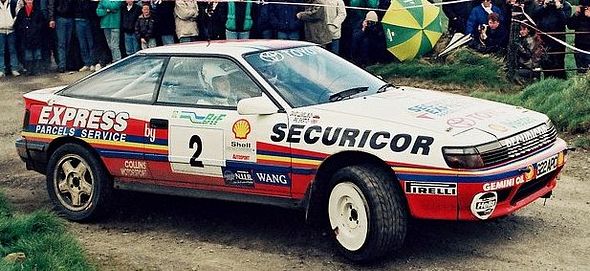
Both models have been built on Altaya base’s, the 1989 Cartel winner with homemade decals (David also won the Welsh, Scottish and Audit Sport this year) , the 1990 Circuit of Ireland winning car with a combination of bought and homemade decals (David also won the Welsh, Scottish and Ulster events in 1990).

1991
The Legacy 4WD Turbo had been introduced into world championship rallying in 1990 and for 1991 Rothmans supported an entry in the BRC for the Prodrive team with Colin McRae as the driver. Colin’s closet rival was Russell Brookes, now a veteran of 46 years of age at the wheel of Ford’s new Sierra Cosworth 4×4, and for who this would be his final full season. In 1991 there was a growing interest elsewhere in the BRC when Ford offered up to ten Group N Sierra Cosworth 4×4 cars to selected young drivers. The message of the McRae clan was becoming clear. Three members of the family finished in the top ten on the Scottish Rally in 1991! Another important driver entered the BRC scene in 1991, Richard Burns won his class on the Scottish and ended the season winning the one-make Peugeot GTI rally challenge. The 1991 season saw Colin Steele McRae, MBE (5 August 1968 – 15 September 2007) earn McRae his nickname of ‘McCrash’ as he frequently redesigned the car on events. No matter how many times he put his car off the road he could drag it out of the ditches or trees and still go on to win the rally anyway - he won, the Talkland, COI, Scottish and Manx events in 1991, with Brookes winning the Welsh in his RED prepared Sierra Cosworth 4X4 after McRae crashed out, and Bertie Fisher winning the Ulster in his Toughmac sponsored Sierra Cosworth 4x4 after McRae retired. Towards the end of 1991 another new car arrived when David Llewellin entered in a Nissan Pulsar/Sunny GTI-R and led the Audi Sport Rally from start to finish only to be dropped from the team immediately afterwards! (McRae finished 3rd in the final event of the season behind Llewellin and Brookes).
1992
Ford again offered up to ten Group N Sierra Cosworth 4×4 cars to selected young drivers with help from Shell which led to Colin’s younger brother Alister winning the championship’s Group N title. The 1992 season saw Colin win every stage bar two on every rally in the British championship in his Rothmans backed Legacy securing his second British Championship title (Vauxhall Sport, Pirelli, Scottish, Ulster, Manx and Elonex), with Trevor Smith, Alistair McRae and Louise Aitken-Walker distant 2nd, 3rd and 4th overall in the championship in the Sierra RS Cosworth 4x4's.
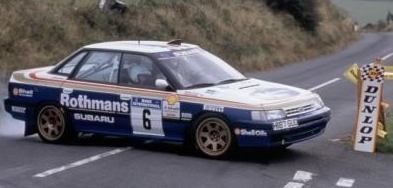
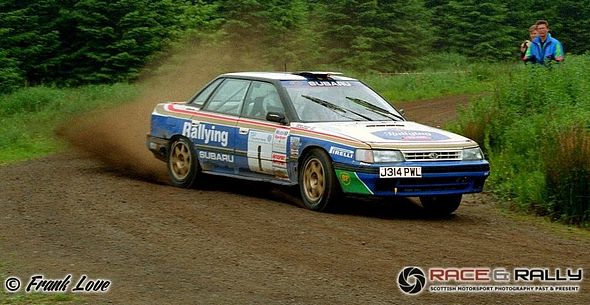
The 1991 Manx model is from IXO, the 1992 Scottish Rally car was produced using a Vanguards base plus assistance from a member of the Diecastrallymodels.com forum.

1993
For 1993 Colin McRae was promoted into the WRC with a selected programme of events in the Legacy, waiting for the moment the new Impreza model became available. The BRC was restyled into a five round series, one round in each nation and the second, end-of-season round in Wales being dropped. The two all-asphalt events (Ulster and Manx) would carry the benefit of extra points. Prodrive ran a two-car Subaru team with Richard Alexander Burns (17 January 1971 – 25 November 2005) and Alister McRae, Alister having a frustrating season but Burns had his first major success when he won the opening BRC round, the Vauxhall Rally of Wales. He backed up the opening round wins with victories in round 2, the Pirelli, and round 3, the Perth Scottish. Malcolm Wilson won round 4, the Ulster, in his Escort RS Cosworth with Burns scoring no points after exiting the event through an accident. Burns bounched back and took the championship though by winning the bonus points final round in the Isle of Man, with Wilson this time suffering the heartbreak of exit through an accident. Burns ended the season, at the age of 22, the youngest ever BRC champion. This came one month after Colin had scored his first world championship rally win, in New Zealand, the first WRC win also for Subaru. Burns went on to greater success with runner up positions in the WRC in 1999 and 2000 before winning the WRC championsip in 2001. Burns was very sadly lost to the rallying community in 2005 after a battle against a brain tumour. RIP.
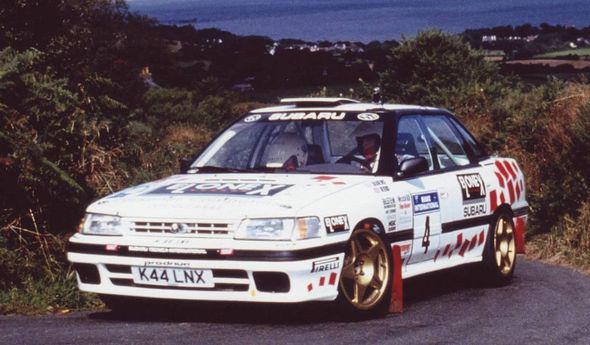
This model by StartUp Models is of his 1993 Manx Rally winning car and Richard also won 3 of the other 4 1993 events - Welsh, Pirelli and Scottish).

1994
1994 was to be a memorable season, the final time that the BRC was open to full Group A cars, a season with excellent free-to view television coverage and also the first real success for Malcolm Wilson’s Michein sponsored team of Ford Escort RS Cosworths.
Hot in the footsteps of the recent McRae family dominations came another family. The 1994 Junior champion was Mark Higgins in a Honda Civic Vti while his brother David drove a Peugeot importers 106XSi. From now on the BRC was also going to cater for what was commonly called “Formula 2” cars.
Malcolm Irving Wilson, OBE (born 17 February 1956) won two British national titles in the late 1970s and achieved a long-held ambition by winning the British Rally Championship in 1994. Wilson's season started poorly with a fuel pump failure on the opening round (the Vauxhall Rally of Wales), victory on that round going to Wilson’s teammate Stephen Finlay. But Wison showed his class in the next 3 rounds (Pirelli, Perth Scottish and Ulster) by taking victory ahead of Finlay and also won the season ending Manx rally ahead of Kenny McKinstry's Legacy with Finlay down in 6th. So Wilson was crowned overall champion in 1994, and the winner of the Formula 2 ("F2") category was David Llewellin, now driving a Vauxhall Astra Gsi for their importers team.
Wilson's driving career included over 20 years experience of rallying at world championship level, much of it with Ford. He drove for three factory teams in the world championship, including MG, in whose Group B Metro 6R4, he shared driving duties with fellow Briton, Tony Pond. He spent several years as Ford's chief test driver, developing new rally cars, including the short lived RS1700T and RS200 models. Wilson is current owner of team and constructor M-Sport which has had phenomenol WRC level success, including multiple constructor championships and a drivers championship, when you consider it is essentially a privateer outfit, without the budget of the full factory teams.
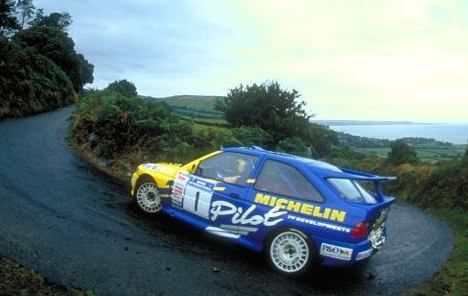
This is the IXO model of his 1994 Manx Rally winning Escort Cosworth - Malcolm also won he Pirelli, Scottish and Ulster, leaving only the Welsh to be won by someone else)

1995
A new twenty year era for the BRC started in 1995 with the Vauxhall Rally of Wales. Although four-wheel-drive, turbocharged cars were allowed to compete on the events, albeit without scoring points, the championship was now solely for the F2 cars. Despite the way that the championship cars were secondary competitors on events, the new formula attracted importer interest from seven manufacturers, more than the world championship, and continental drivers were participating in the series again.B elgian driver Gregoire de Mevius had moved from Mazda to drive as teammate for Alister McRae, Alain Oreille for Renault, both former FIA champions. The overall winner of the opening round was the Nissan Sunny GTi of Alister McRae. Significantly however the remaining four events were won by bigger cars not eligible for the championship, including Ari Vatanen who made a guest appearance in round 2 on the Pirelli Rally in an Escort RS Cosworth. Round 2 (Pirelli) F2 honours went to Gregoire de Mevius in a Sunny GTi with McRae just behind him. Jarmo Kytolehto took F2 honours in round 3 (Scottish) in his Astra GSI 16v, de Mevius 2nd and with Alain Orielle's Clio Williams in 3rd place. McRae was out this time with an electrical issue. Alister bounced back in round 4 (the extra points Ulster round) with Gwyndaf Evans 2nd in his Escort RS2000 MkV and Orielle 3rd. 2nd place for McRae in the season ending Manx rally behind Evans was enough for McRae to become the inaugural title holder under the new rules, with Evans 2nd overall, de Mevius 3rd and Orielle 4th. Alister became the 3rd member of the Mcrae family to win the BRC.
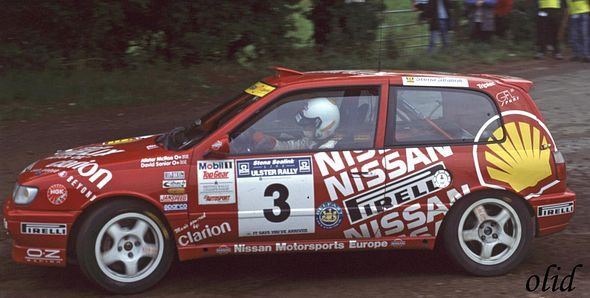
This is a Realcarmodels model of the Nissan Sunny Gti which Alistair drove to championship (although not outright) victory in the 1995 Ulster rally - Alister also won the Welsh outright.
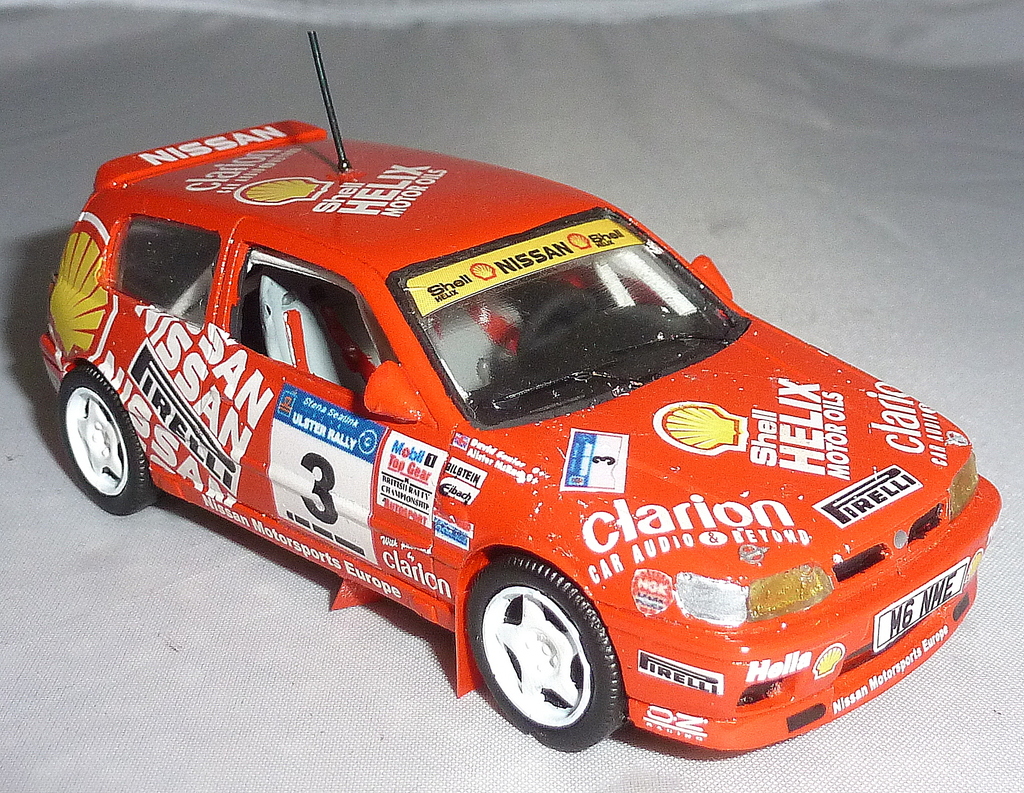
1996
Ford meanwhile, had been developing their Mark V Escort RS2000 car particularly for Gwyndaf Evans who ended up winning the title, Volkswagen’s latest Golf arrived and Skoda came to the championship as well with their Felicia for 1996. The BRC further encouraged the participation of one make championships within their championship, for Peugeot and Subaru cars. I can’t write a better summary of the 1996 BRC season than can be found on this web site: http://www.rs2000kitcar.com/Rally/1996.html
After the disappointment of 1995 where the car had run well but had missed out on the title, finishing 2nd in their first full season, the Ford team must have had high hopes for the new season. Indeed, a new assault was to be launched on the British championship. Again, Gwyndaf Evans and Howard Davies were to lead the charge, now in the face lifted Escort. Their new team mate was the Finn, Jarmo Kytolehto, who had previously driven a Vauxhall Astra. There was also Neil Simpson, driving Evans’ 1995 car, and Stephanie Simmonite driving an Escort prepared by Chris Birkbeck, now looking for her second Ladies Cup title.
There were plenty of fresh challenges from the opposition too. Mark Higgins had now moved up to a Group A Nissan Sunny. There was also another Finnish ace, Tapio Laukkanen, in a Volkswagen Golf. Renault were still present in the series, but were now using the Megane Maxi, with Robbie Head and French tarmac specialist, Serge Jordan at the wheel. The Megane was the first of the new generation of F2 kit cars to be used in Britain and, although not eligible for points in 1996, was to show the future of Formula 2 rallying.
Vauxhall Rally of Wales
Wales was the first opportunity to see what the new season had to offer. The Welsh weather also threw up another challenge, in the form of thick fog. Local boy, Gwyndaf Evans, settled in quickly, going well in the early stages. The second stage actually saw him set fastest overall time, quicker than that of Alister McRae and Arri Mokkonen in their non-championship Group A Escort RS Cosworths. Evans was flying; “The conditions have been really difficult, the fog has been really nasty...I hate it!”
Kytolehto had not been so lucky however. After an off on only the second stage, this was followed by a roll on the third, which saw him lose over four minutes, and plummet down the order. Neil Simpson was also struggling, and retired early on with a broken driveshaft. The championship rivals were also going well; Laukkanen was keeping in touch, and Higgins was quickly adapting to his new Nissan. Things weren’t going so well for Renault, with Head retiring after head gasket failure.
The final two stages of day one were held on the promenade at New Brighton. Evans went into these stages with the F2 lead, again bettering McRae and Mokkonen on the first loop. By the end of day one, Evans was still the leading F2 runner, with Higgins and Laukkanen in hot pursuit.
Day two saw the fog lifting slightly, but with rain to replace it. Evans started as he’d begun, pushing hard to retain his Formula 2 lead. Mark Higgins was also getting more comfortable in the Sunny, but dropped to third briefly, behind Tapio Laukkanen. Sadly for the Finnish driver though, his engine failed, and he fell out of the race.
Jarmo Kytolehto was also pushing, trying to make up for the drama of day one. He’d put in an excellent performance and managed to recover to sixth overall, third of the F2 runners. However, he couldn’t match the stunning performance of Gwyndaf Evans; fastest on every stage of the second day, he won the F2 section by four seconds over Mark Higgins, with Kytolehto in third.
Speaking at the finish, Evans said “It’s been a tough rally and very difficult conditions. It’s gone perfectly, Gordon Spooner Engineering have put a fine car together here.”
This early victory put Evans into early control of the championship, with Ford the top of the constructor’s leader board early on. It had been a great start to the season.
Pirelli International Rally
The Pirelli International Rally offered another challenge to the drivers; pace notes were banned, with the crews having to navigate solely off maps, meaning a careful balance of speed and commitment, as well as care, and trust in their co-drivers.
Steve Wedgebury flipped his Skoda on a bridge, blocking the stage, but Jarmo Kytolehto started much better however. Despite not having second gear, he held a 13 second lead over Evans after the first four stages. Sadly, it didn’t last. On the very next stage, the normally reliable Xtrac gearbox failed altogether, leaving Evans to take over the Formula 2 lead, and Nissan’s Mark Higgins to move up to second place. Neil Simpson was having better luck than in Wales, running well.
By the end of Leg One, the drama for Renault continued, with both the Meganes out; Head in Special Stage 1, Jordan following later in the day. Jouko Puhakka’s Golf was laying third in F2, with Higgins second, and Evans comfortably in the F2 lead, with only the two Escort Cosworths of Arri Mokonen and Alister McRae ahead of them.
The beginning of day two saw the longest stage of the event; Pundershaw. Evans was still going well, but Higgins wasn’t so lucky. A huge roll meant air lifting to hospital and a fractured vertebra. Simpson said he’d had a steady run through Pundershaw, but was ready to push on and challenge those in front of him.
For Evans though, it was another great drive. Mokkonen’s retirement meant second overall and another storming F2 victory for the Welshman; excitedly saying “Delighted for the team, Ford, and Howard and everyone else. Very Happy!”
Victory in Cumbria meant Evans stretched his title lead to 22 points over Puhakka. Ford now had a 12 point lead over Nissan in the constructor’s title battle, with VW only a single point behind them.
Perth Scottish Rally
Round three, a trip north of the border to Perthshire for The Scottish Rally, and another raft of points up for grabs. Conditions were very wet, and this seemed to suit the Finnish contenders. Jarmo Kytolehto shot into an early lead in his Escort, with Tapio Laukkanen in the Golf chasing hard. Evans had a steady start compared to previous events, but was still in contention, and looking to consolidate his championship lead. Neil Simpson was struggling again with gearbox troubles, this time stuck in third gear. It wasn’t all plain sailing for Evans either; the car was struggling to start and not cranking correctly, meaning frantic work in service halts to try and track down the problem.
Going into the final stages of the day at the Knockhill circuit, it was all to play for. Sadly for Laukkanen, he’d had two gearbox failures, so was forced into retirement. This left Kytolehto in the F2 lead at the end of day one, with Evans in second, and Higgins in third.
Leg Two saw a battle for the top spot that ran to the wire. Stephanie Simmonite was running well, but giving best to Louise Aitken-Walker, previous ladies champion, out of retirement for this one event. Evans was still having a few issues, and required a gearbox change late in the rally. Time was an issue, but the GSE crew managed to change it within the allotted service time, without incurring any road penalties. The Welshman was pushing hard, taking chunks of time out of Kytolehto, but was unable to make up the ground totally, giving the Finn his first F2 win of the year. Evans had to settle for second place, gaining more points, pulling further ahead of Puhakka in the championship table. This also left Ford with a comfortable lead in the constructors chase.
The Stena Line Ulster Rally
The Ulster Rally made up round four of the season, and another trip to Northern Ireland for the first tarmac round of the year. The stakes were high here for Ford. A good result could win them the British Championship, so a strong performance was essential. They were given a dream start too. Their main rival, Mark Higgins retired on the first stage of the event with a blown engine. Bad news for Higgins, but great news for Ford and Gwyndaf Evans; he only had to finish the event to take the title! Alister McRae also made a return to the championship, in a VW Golf. It was to be short-lived for both McRae and Laukkanen however, with both Golfs suffering gearbox failure and early retirement.
The tarmac did finally give Renault a chance to prove the performance of the Megane, with Robbie Head leading the FWD cars and 1995 Renault driver, Alain Oreille, making a guest appearance in the second Renault and running well. Evans didn’t let the gift of Higgins retirement slow him down however. He took an early lead of the championship runners, but behind both the Meganes. Kytolehto had to give up his seat to another Finn, Harri Rovanpera, who was going well in the other Escort. Kenny McKinstry was also out in his own RS2000, running well in F2, indeed, by the end of Leg One, the top three F2 cars were all Fords, with Evans leading the championship fight over McKinstry and Rovanpera respectively.
Day two saw the Renaults continue their charge, but Oreille wasn’t to make it to the end of the event, after a big off into one of the Ulster hedgerows. Neil Simpson in Evans’ old Escort was pushing, but struggling with clutch and brake issues throughout the day. Once again, the Simmonite sisters were leading the ladies contest, and eventually finished 12th overall and fifth of the British championship contenders. Robbie Head was the star of the front wheel driver runners, second only to the Subaru of Irish legend, Bertie Fisher. He was showing the future of Formula 2 rallying, and just how dominant the kit cars could be in the right hands.
However, it was Evans that was to take the glory. Another shining performance meant his third F2 win of the year, maximum points, and the British Rally Championship crown outright. When interviewed at the end of the final stage, Evans said “A credit to the whole Gordon Spooner Engineering team, Michelin tyres, Response, Ford, and everybody that worked so hard during the season to achieve this result...Absolutely great.”
Of the Formula 2 runners, Head had run away with it, but was not eligible for championship contention. Evans had dominated the points-scoring runners, backed up by Kenny McKinstry in second, Neil Simpson in third and Stephanie Simmonite fifth of the British Championship runners. Fords had dominated the Ulster Rally and Evans had taken the ultimate prize; recognition at last of the potential of the RS2000.
Once the dust had settled, Evans had an unassailable 49 point lead over second-place Justin Dale, with Neil Simpson fourth, and Stephanie Simmonite sixth.
Manx International Rally
As always, the British championship enjoyed its final round in the stunning scenery of the Isle of Man. The Manx is always dramatic, and 1996 was to be no different. As Gwyndaf Evans had already clinched the British title, it was to be something of a different event for him and co-driver, Howard Davies. The Escort they were using was a very different machine compared to the one they’d used in Ulster. The decision had been made, with both championships sealed, to sacrifice points and use the rally as an extended testing exercise. The car was hugely modified from Ulster spec, with clearly wider front wings, and a howling engine under the bonnet. The regular Group A unit had been replaced with a development kit car engine, giving the Escort a huge power increase. When asked what he was expecting of the rally, Evans replied “Just come here to enjoy ourselves really and obviously learn a bit on the car for next year.”
The development car was clearly working well, with Evans running third overall, behind Bertie Fisher and Armin Schwartz, both in Group A, four wheel drive, cars. The Escort was even beating the Renault Megane Maxi of Serge Jordan in the early stages, showing the Escort was definitely going in the right direction for 1997. Rovanpera was back in the second RS2000, running in third place the F2, but sadly crashed out on stage six. By the end of day one, Jordan had pushed ahead of Evans, with Mark Higgins the leading F2 runner, and Neil Simpson chasing hard.
Day two saw Jordan out early with transmission trouble, leaving Evans to take back the front wheel drive lead. Simpson was still pushing hard, trying to catch Mark Higgins’ Nissan, and with good reason; “I’d love to be second in the British Championship and give Ford a one-two, that would be excellent, but Mark’s really flying here; it’s his home territory so I’m struggling to catch him.”
Evans too was pushing. With Fisher forced out with mechanical problems, it was a straight fight between Evans’ Escort and Schwartz’ WRC Celica. On the fourth stage, Evans actually equalled the time set by the Toyota. When talking in service, Evans said “We are learning with the car, it’s a development. It’s an interim stage of the car for next year” going on to say excitedly; “We’ll hopefully have a bit more power again next year, so look out is it!”
A worrying prospect for Ford’s competitors indeed, as on Special Stage 14, Evans beat Schwartz to set the fastest overall time; an impressive effort for a front wheel drive F2 car! However, the fun soon ended. As they reached the stage end, the car sounded very unhealthy = the development engine had given up the fight. Gwyndaf Evans: “It was a good development trip and we’ve learnt. So we’ll go back and try and put things right.” Even Howard Davies could feel it from the passenger seat, noting “There was a lot more power in the car.”
Simpson had still been trying hard to catch local-boy Mark Higgins; a little too hard in places, going off into a river, and having to follow co-driver, Steve Martin, through the water to find a way out! Simpson’s Escort had been upgraded with the previous engine from Evan’s car and was showing good pace, but sadly the engine didn’t last, and Simpson was forced to retire, leaving Stephanie Simmonite as the only factory RS2000, sitting just outside the top ten.
The final day saw Armin Schwartz go on to take the rally win, with F2 being dominated by Manx drivers, Mark Higgins and Martin Rowe.
1996 saw the championship finish with Gwyndaf Evans a comfortable first, Stephanie Simmonite in fourth, and Neil Simpson sixth. Ford also took the manufacturer crown by six points, meaning 1996 would be the most successful year for the RS2000.
Network Q RAC Rally
After two consecutive RAC F2 victories and the British title, Gwyndaf Evans must have been confident for the 1996 RAC Rally. It was certainly going to be a difficult event, with snow and ice to challenge the drivers. Sadly it wasn’t to be three out of three for the British Rally Champion. Going into the Chatsworth House stage, the roads were extremely slippery, and the front wheel drive Formula 2 cars were struggling to get traction. Evans was to find out just how difficult the conditions were, to his cost. He slid wide on a right hander and clipped a huge tree stump hard, flipping the Escort, with a heavy landing on the roof. They managed to get out of the stage, but the roll cage was badly damaged, and the champions were out. They weren’t the only crew to fall victim to the conditions, and Robbie Head was to clip the very same tree stump and roll his Megane heavily. Evans was left to look forward to the 1997 British Championship and the new Escort kit car.
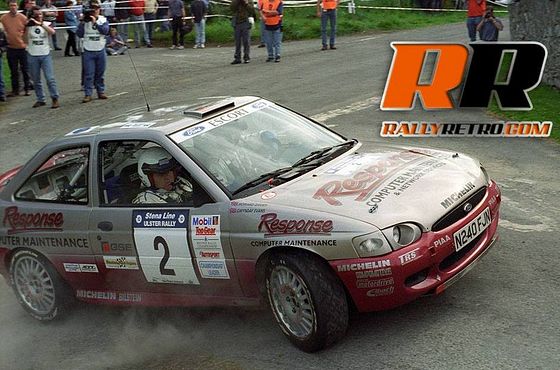
To build this car I had to take a mk5 escort kit, take a resin cast, reshape in to mk6 form, cannibalise an interior and wheels from a mk6 Escort Cosworth and produce my own decals. I am glad this one is finished…….
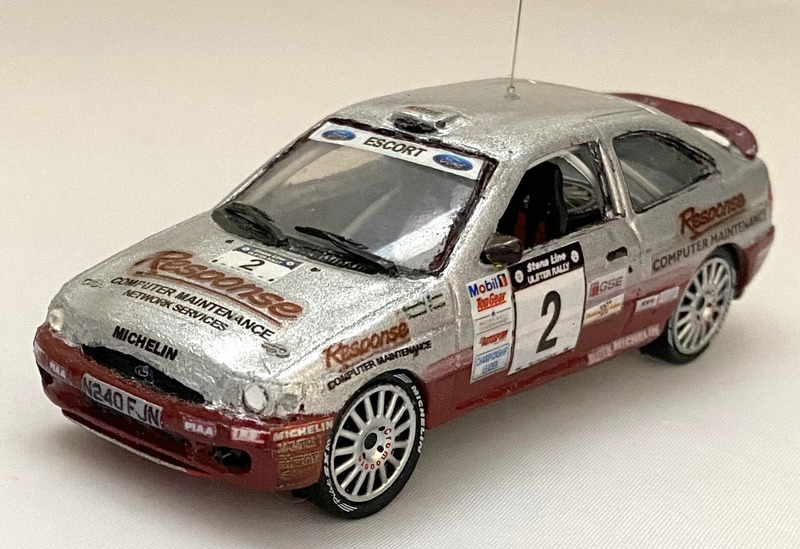
1997
The BRC these days was undoubtedly the premier national series in the world but still British drivers were supreme in 1997. The first of Manx rally legend, Mark Higgins 3 BRC wins.
The following is again taken from the excellent RS2000kitcar.com web site.
Gwyndaf Evans had dominated the championship the previous year, but 1997 brought many new challenges. The new generation of kit cars had arrived and the new Escort Super Rally Car was here; with wider wheel arches and a more powerful engine. The formidable challenge from Renault would continue; with Robbie Head and Manxman, Martin Rowe, joining the line up. Tapio Laukkanen remained with VW, now joined by 1995 champion, Alister McRae. Mark Higgins was still with Nissan, and the veteran, Stig Blomqvist, joined the Skoda team in the new Felicia kit car. With so many big names in the championship, it was going to be a big year.
Vauxhall Rally of Wales
The start of the season saw a return to the Welsh forests, and everyone was expecting a big battle between the top drivers. Evans said before the start “There’s no such thing as being tactical, it will just mean being flat out from the word go.”
He was right too; after the first three stages, it was closer than ever. Evans was in a dead heat for first place with Mark Higgins, it was that tight at the top! 1995 champion, Alister McRae was sitting in third place, but was suffering mechanical troubles, with an overheating engine. The tricky Welsh roads were to bite Evans, though. On stage four, Penmachno, a right front puncture saw him limp out of the stage with the front wing hanging off the car. Then, the second run through Penmachno saw Evans clip a rock with a rear wheel, wrecking the rear beam. Time was lost, with Howard Davies even having to bodge the rear brakes back together to get the car to the service area, where the GSE crew could get to work and fix the damage. With the car repaired, the Welsh pair could get back to the race and were still in third by the end of the day, albeit some way behind the new leader, Alister McRae.
Leg 2 saw Evans and Davies on the pace, but unable to make up the time they had lost the previous day. Elsewhere, Swede Andreas Eriksson was going well, starting the day in 10th place in his Escort. Unfortunately for the other runners at the front, McRae’s overheating issues had been left behind, and he was battling with Higgins for the rally lead until stage 13, which saw Higgins go off and drop down the order. Evans, who had been happy to hold station and take some championship points, had now been promoted to second place, better than they had expected, and where they would stay. McRae was well and truly in control, and would prove impossible to beat in Wales. Eriksson went on to finish seventh, a good result for the Swede, with Philip Young just outside the top ten in 11th place.
Pirelli International Rally
April meant the second round of the championship; the fearsome Pirelli International Rally of Cumbria. Taking on a new format for 1997, the event was to be split over the two days, with points available for both, as well as the overall honour of an outright win. The event started well for Evans again, running in third place after the first three stages, however he was forced down to fourth after stage four, behind the flying Robbie Head in his Megane Maxi. McRae was going well again, but a spin in the Falstone stage saw him drop some ten minutes and plummet down the leader board. Evans lost some time, almost collecting McRae’s front bumper whilst passing the stricken Golf, which Mark Higgins was all too happy to capitalise on, storming into the lead, leaving Evans in second after Head had dropped a little time, now in third position. Higgins held the rally lead, but a slight off lost him time, and by the end of the day, the pair had scored another dead heat, proving just how close the competition was. Evans took maximum points for day one, after setting fastest time on stage one, keeping him in touch of the title battle.
The second day started with fog, with McRae keen to score maximum points to make up for his off on Leg 1. As well as fog, the first stage saw the drivers face the longest stage of the event; Pundershaw. Evans proved the new Escort kit car had the goods, beating McRae to the fastest time; a lead he would keep for most of the day. Irishman Philip Young wasn’t so lucky however; a roll saw him lose a minute and drop down to 14th place. Stephanie Simmonite was having another good run in her Escort, taking her second Ladies Cup win of the year, and 18th overall, eighth of the F2 runners. Julian Reynolds was also running well in his new Escort, finishing fourth in Formula 2, giving Ford another good result for the Escort. With one stage to go, Evans was left with a 14 second lead over his rivals, and in prime position to take another good haul of points, as well as the first win for the new Escort kit car. McRae was on the pace, keen to overhaul Evans, meaning the battle would go right to the line. It certainly did that, but not quite as the lead crews had hoped! The final stage was filled with drama. McRae was pushing to the limit, hoping to catch Evans, but a heavy spin meant he was off the road and out of the event. Rovanpera also rolled out in the Ibiza Kit Car on the same stage. All looked good for Evans, until he slid slightly wide going through a fast, sweeping section, slipping into a ditch and rolling the Escort heavily. The car ended up on its roof, and Evans race was over. The dramatic end to the event saw Robbie Head take a surprise win, with Laukkanen second and Blomqvist third in the 1.6 litre Skoda, leaving the championship wide open!
RSAC Scottish Rally
The third round again marked the last outing in the forests, and the mid-point of the season. After the disappointment of the Pirelli, many of the top drivers had points to prove, and work to do to keep their title hopes alive. Evans had scored good points on day one of the Pirelli, but his day two exit had cost him dearly, leaving him second in the championship to Alister McRae by a point. A win on day two would have given him a comfortable lead, so there was a lot to play for in Scotland.
The Scottish roads seemed to suit the Golf however, with McRae and Laukkanen setting the early pace. Evans could only manage fourth spot, behind Mark Higgins, after the first stage, but the second stage saw him fastest overall, passing Higgins. Laukkanen and McRae were flying however, and Evans would be unable to catch them on day one, having to settle for third spot at the end of the first leg. It was all to play for on Leg 2 though, with only 12 seconds covering the top three runners.
Day two started in much the same way as the first, with the two Golfs trading times. Higgins suffered a puncture in the Nissan, meaning he dropped time to Evans’ Ford, giving the Welshman room to breathe and concentrate on trying to catch the two leaders. With only one stage remaining, there was now only nine seconds covering the top three, with just 19 miles left. When asked what his approach would be to that final stretch, Evans replied “What do you think? Maximum!”
Laukkanen was confident, boasting that the rally was his, but McRae wasn’t to be beaten in his home territory. He beat Laukkanen by some eight seconds, taking the victory, and consolidating his championship lead. Evans remained third, completing the final stage five seconds slower than Laukkanen. It was another good result for the Escort and for Ford, but they were no match for the VW duo on this occasion. With the forest rounds completed, McRae led the title race, with Evans second, eight points behind. Robbie Head was in third place, only three points behind Evans. The constructors race was equally close, with VW leading, Ford second, and Renault in third place. However, with the championship now moving onto Tarmac, would this favour the more powerful kit cars, and leave VW and Nissan struggling? Would the well-proven Megane sweep to victory? It was all to play for!
The Stena Line Ulster Rally
Ulster saw big changes for the Ford team, with another new car making its first British Rally Championship outing. Gwyndaf Evans would be piloting the new car, and was obviously excited for its first run; “We’re running the brand new Escort Kit Car, which looks absolutely stunning. I just hope it will go as well as it looks.”
The new car was certainly stunning to look at, with even wider wheel arches than the earlier kit car, giving it huge presence, much more like that of the Renault Maxi Megane. Indeed, the Escort was soon to share the Renaults “Maxi” tag. The changes weren’t just skin deep though, with the car now boasting a more powerful engine, as well as further revised suspension.
Evans was keen to show what the new car could do, and stormed into the Ulster lanes, giving best only to the Scot, Robbie Head, in the Megane. The new car was performing well but, like the Megane, wasn’t perfectly suited to some of the narrow roads of Northern Ireland. The wide track was making it difficult to navigate, with the car brushing the hedgerows at times. Evans noted after the first few stages “For the debut of the car, I think it’s showing a lot of promise. We have a bit more work to do on it, but it’s ok so far.”
By now, Head was having trouble, with an electrical fault losing him time on stage five. He had dropped down to eighth position, but was still setting fastest stage times for the remainder of the day. Mark Higgins was also going well, the Group A Nissan Sunny was well suited to the narrow roads, and he had moved in to the Formula 2 lead, over Evans; a lead which he would take into the overnight halt. McRae was in touch in third position, but the star of the show was undoubtedly Robbie Head. The Megane had been fastest on every single stage except where he’d had the electrical glitch.
Day two saw the top of the leader board remain the same. Higgins was in a comfortable lead, with Evans happy to settle for second place and take points again. The new car had performed well and clearly had potential to do very well in the future, but a good result and a strong points finish was essential to keep the championship within reach. Head managed to recover to third position, proving just how capable the Megane was on tarmac. The Simmonite sisters had another successful run, taking their fourth Ladies Cup victory of the year, and securing the title for the third year in a row. This meant, with one round to go, McRae still held the title lead, but only by two points over Evans, with Head six points further back. The final round on the Isle of Man wasn’t far off, with no less than five drivers able to win the championship, it was going to be a thrilling end to the year.
Manx International Rally
The Manx International Rally of 1997 would probably go down as one of the most eventful season climaxes ever seen. The top five drivers were all in with a chance of the title and, with two previous winners amongst them, as well as two Manx drivers in the mix. It was set to be a fantastic end to the season, but could Ford do the double and take the title for the second year running?
They certainly started well, with Evans’ Escort Maxi again battling with Robbie Head in the Renault Megane. The pair set joint fastest time on the first stage, proving how closely matched the cars were, but local boy Mark Higgins held the F2 lead after the first three stages. Suspension trouble saw him drop down to fourth however. The rally hadn’t started well for VW, with both McRae and Laukkanen suffering with handbrake and power steering problems, meaning McRae was unable to challenge for the lead in the early stages. By the end of the sixth stage, the weather had changed and it was raining hard. Evans and Head hadn’t let up however, sharing another two fastest times, and meaning a dead heat between the championship contenders. Julian Reynolds was also running well in his Group A Escort, pushing hard to break into the top ten. Towards the end of day one, Evans and Head scored another dead heat through Castletown, and a second fastest time on the final stage of the day saw Evans go into the overnight break with an 11 second lead. McRae was, by now, recovering, and had set the fastest time on the Cringle stage, showing it wasn’t over for the Scot just yet.
Leg 2 started well for Gwyndaf Evans, stretching his lead by four seconds in the now dry conditions, but it was all about to change, and there were to be big consequences for the title. Stage two saw the results turned upside down. McRae flipped his Golf at speed when the car was unsettled by the bumpy lanes, putting him out of the rally, and ending his hopes for a second British title. This should have been great news for Gwyndaf Evans, but sadly the second title was also to elude the Welshman in similar circumstances. A bumpy section unsettled the car; and a high speed spin resulted in a broken radiator and retirement. The car was undamaged otherwise, but with an overheating engine, there was nothing Evans could do, and the Escort wasn’t to get its second British title this year. With the top two championship runners out, the drama kept coming. Special Stage 17 saw Robbie Head also out of luck, as an early downshift killed his engine, leaving Mark Higgins to charge into the lead.
The final day saw the title race down to just two; Mark Higgins and Martin Rowe. Both drivers hail from the island, and both were keen to prove they had what it takes to wear the championship crown. It was a hard battle, with both drivers suffering problems. However, despite losing a wheel late on, Higgins was able to hold on and take the championship, though Rowe was to take the rally win, his first British Rally Championship victory.
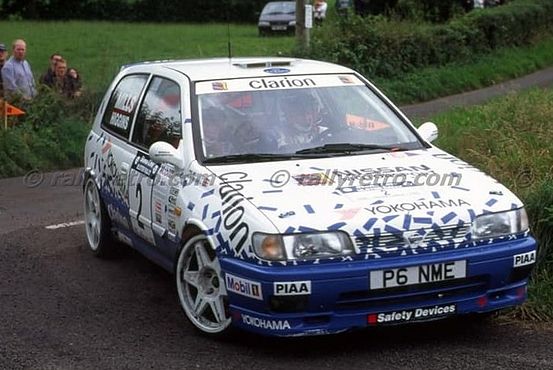
This is a Rosso & Fly model with home made decals to represent the Ulster Rally winning car from that year.
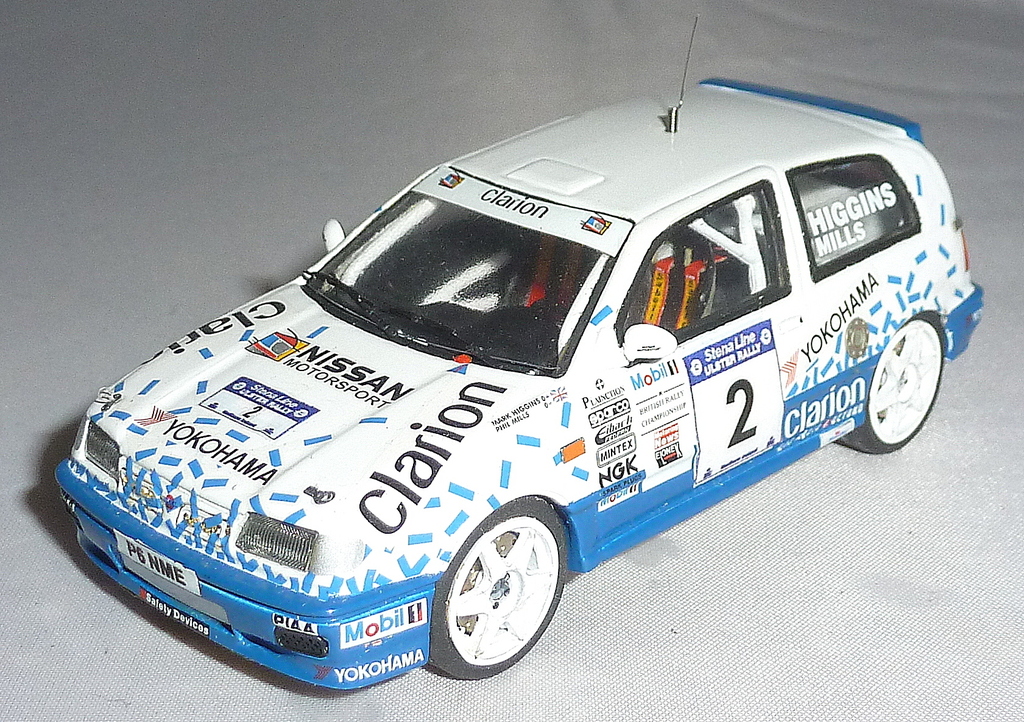
1998
In 1998 the championship was divided in the calendar between drivers and manufacturers and by now none of the events counted for a FIA championship, which opened up better chance of television coverage which otherwise would have been effectively forbidden. This attracted a number of foreign teams to participate. 1996 Champion Gwyndaf Evans moved from Ford to SEAT, Robbie Head was replaced at Renault by Tapio Laukkanen who had moved from Volkswagen. Head in turn joined SEAT and Vauxhall returned to the series with the Astra Kit Car with Jarmo Kytolehto at the wheel. Harri Rovanpera did not compete in The British Championship this season in order to concentrate on his WRC Commitments with SEAT
Martin Rowe won the opening event of the 1998 season (the Vauxhall Rally of Wales) outright in his Renault Megane Maxi. 2nd in F2 was Neil Wearden in his Honda Civic VTi and Gwyndaf Evans 3rd in his Seat Ibiza Kit Car Evo 2. Round 2 and Round 3 was the Pirelli. Round 2 was won by Rowe, Evans 2nd, Kytolehto 3rd. Evans won round 3, Alistair McRae in his Golf Mk III Kit Car 2nd, Laukkanen 3rd and Rowe in 4th. Rounds 4 and 5 were the Scottish. Evans won round 4, McRae 2nd, Rowe 3rd and for round 5 of a see-saw season, the finishing order was Rowe, Laukkanen, McRae, Evans. On to round 6, the Ulster, and this time the event was won outright by Evans, with Rowe 2nd and McRae 3rd. So we came to the season finale - the Manx, and realistically a title shoot out between Rowe and Evans. And much to Evans bitter disappointment, it didn't go to the wire as he failed to finish the event due to engine failure - his first DNF of the season. Rowe meanwhile took the 1998 BRC Champions title in style by winning the final event of the year, with Laukkanen 2nd and Kytolehto 3rd.
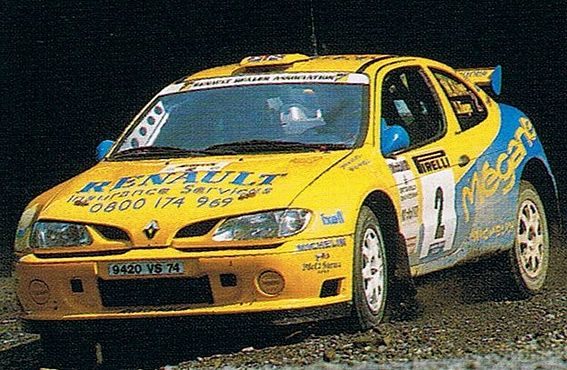
This is a Vitesse model with homemade decals to represent the Pirelli Leg 1 winning car (Martin also won the Welsh and Manx events in 1998).

1999
By the late ‘nineties the two-litre “Formula 2” scene was becoming the most interesting area in the sport, with cars offering power outputs in the high 200bhp mark and engine maximum revs towards the five figure mark. These cars were becoming so special that “F2” cars won two world championship rallies outright. In Britain there was now a second-level “F2” movement, for cars with engines up to 1.6 litres producing 200bhp. As the decade came to a close it was Renault’s Megane Maxi cars which were now largely unbeatable. Still the series kept attracting new manufacturers. SEAT with the Ibiza kit cars sponsored the Jim Clark Rally. It was an exciting time for the BRC!
Martin Rowe kicked off his title defense in style by winning the opening round (Vauxhall Rally of Wales) in his Megane Maxi. His team mate, and the driver who would prove to be his strongest competitor, Tapio Laukkanen was 2nd, with Mark Higgins in a Golf MkIV Kit Car 3rd. The Pirelli was Round 2, and it was a disappointing round for Rowe as he went out of the event with gearbox issues. Laukkanen backed up his early season promise by taking victory. Toni Gardemeister in his Ibiza Kit Car Evo 2 was 2nd, Higgins took back to back 3rd places. Round 3 was the Scottish and Laukkanen showed his growing strength by winning by 2 clear minutes from Rowe, with Gardemeister 3rd. Round 4 was the Jim Clark sponsored SEAT round, and they will have been a little disappointed that Laukkanen and Rowe repeated the previous round results (winning margin down to 90 seconds this time), with SEAT and Evans taking 3rd place in the Ibiza Kit Car Evo 2. Round 5 was the Ulster and it saw a commanding win for Neil Wearden in the Vauxhall Astra Kit Car. Evans was 2nd, Higgins 3rd, and unfortunately Rowe couldn't take advantage of Laukkanen's lowly 10th place finish as he was out of the event on SS2 after leaving the road. Laukkanen's lead in the championship was unassailable after 3 back to back victories earlier in the season, but he would have prefered not to have failed to finish round 6, the Manx, due to steering issues. Rowe finished the season on a high despite not being able to defend his title by winning the Manx. Raimund Baumschlager was 2nd in his Golf MkIV Kit Car and Evans 3rd. So Laukkanen was the new champion by 22 points, Evans 2nd overall and Rowe 2 points further back.
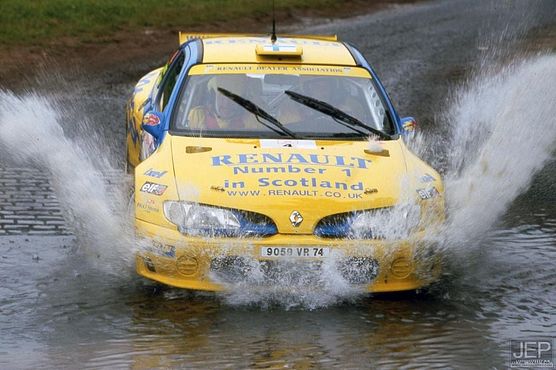
This is a Vitesse model with homemade decals to represent the Jim Clark winning car - Tapio also won the Pirelli and Scottish in 1999.

The "nineties" brought with it new and younger drivers many of them British, and midway through the decade a major change of direction so far as the cars were concerned. The message however was clear from the start of the season. The opening round was the Cartel, and as we saw the previous year, it should be won by a 4 wheel drive car, and an experienced driver. Except it wasn't. The winner of the opening round was Colin McRae, son of the man who already still holds a record of five titles. At the age of 21, Colin’s victory on the gravel Cartel Rally in Yorkshire was his first international win, gained at the wheel of a rear-drive Ford Sierra Cosworth, taking advantage of a turocharger failure on the final stage for Llewellin. Irrespective of the unfortune befalling Llewellin, Colin was 3 mins quicker over the event that the very experienced Malcolm Wilson notionally in an identical but newer car, and would have surely caused a number of experienced rally followers to sit up and take notice. Colin became the closest challenger to Llewellin through the year which was not straightforward as he had to fund his programme privately, but that problem was to end the following year with the arrival in the BRC of Subaru. But we are getting ahead of ourselves, so on to round 2, the Circuit of Ireland. Llewellin did a fantastic job and won the event with a handsome margin over the 2nd placed BRC entrant, Malcolm Wilson, with Colin 3rd. The Welsh was up next, and Llewellin won again, with Wilson 2nd and Evans 3rd. McRae failed to finish after rolling his car, a sign of things to come perhaps...... Round 4 was the Scottish and Llewellin won again, McRae taking 2nd and Russell Brookes in the Ford Sierra XR4x4 taking 3rd. A hop over the pond to the Ulster next, and yep, you've guessed it, another win for Llewellin and in taking 4 straight wins after his 2nd place in the opening round, Llewellin scored his second BRC title before the end of July. BMW M3 E30's of Bertie Fisher and Graham Middleton filled the rest of the podium. Having won the title, Llewellin sat out the next 2 rounds, but for the record the results of the dead rubbers were a victory for Brookes on the Manx in his new Sierra Cosworth 4x4, with Fisher and McRae in 2nd and 3rd, and a Brookes, McRae, Middleton (all now in Sierra Cosworth 4x4's) 1, 2, 3 in round 7, the season ending Audi Sport Rally.
1990 Circuit of Ireland

Both models have been built on Altaya base’s, the 1989 Cartel winner with homemade decals (David also won the Welsh, Scottish and Audit Sport this year) , the 1990 Circuit of Ireland winning car with a combination of bought and homemade decals (David also won the Welsh, Scottish and Ulster events in 1990).

1991
The Legacy 4WD Turbo had been introduced into world championship rallying in 1990 and for 1991 Rothmans supported an entry in the BRC for the Prodrive team with Colin McRae as the driver. Colin’s closet rival was Russell Brookes, now a veteran of 46 years of age at the wheel of Ford’s new Sierra Cosworth 4×4, and for who this would be his final full season. In 1991 there was a growing interest elsewhere in the BRC when Ford offered up to ten Group N Sierra Cosworth 4×4 cars to selected young drivers. The message of the McRae clan was becoming clear. Three members of the family finished in the top ten on the Scottish Rally in 1991! Another important driver entered the BRC scene in 1991, Richard Burns won his class on the Scottish and ended the season winning the one-make Peugeot GTI rally challenge. The 1991 season saw Colin Steele McRae, MBE (5 August 1968 – 15 September 2007) earn McRae his nickname of ‘McCrash’ as he frequently redesigned the car on events. No matter how many times he put his car off the road he could drag it out of the ditches or trees and still go on to win the rally anyway - he won, the Talkland, COI, Scottish and Manx events in 1991, with Brookes winning the Welsh in his RED prepared Sierra Cosworth 4X4 after McRae crashed out, and Bertie Fisher winning the Ulster in his Toughmac sponsored Sierra Cosworth 4x4 after McRae retired. Towards the end of 1991 another new car arrived when David Llewellin entered in a Nissan Pulsar/Sunny GTI-R and led the Audi Sport Rally from start to finish only to be dropped from the team immediately afterwards! (McRae finished 3rd in the final event of the season behind Llewellin and Brookes).
1992
Ford again offered up to ten Group N Sierra Cosworth 4×4 cars to selected young drivers with help from Shell which led to Colin’s younger brother Alister winning the championship’s Group N title. The 1992 season saw Colin win every stage bar two on every rally in the British championship in his Rothmans backed Legacy securing his second British Championship title (Vauxhall Sport, Pirelli, Scottish, Ulster, Manx and Elonex), with Trevor Smith, Alistair McRae and Louise Aitken-Walker distant 2nd, 3rd and 4th overall in the championship in the Sierra RS Cosworth 4x4's.


The 1991 Manx model is from IXO, the 1992 Scottish Rally car was produced using a Vanguards base plus assistance from a member of the Diecastrallymodels.com forum.

1993
For 1993 Colin McRae was promoted into the WRC with a selected programme of events in the Legacy, waiting for the moment the new Impreza model became available. The BRC was restyled into a five round series, one round in each nation and the second, end-of-season round in Wales being dropped. The two all-asphalt events (Ulster and Manx) would carry the benefit of extra points. Prodrive ran a two-car Subaru team with Richard Alexander Burns (17 January 1971 – 25 November 2005) and Alister McRae, Alister having a frustrating season but Burns had his first major success when he won the opening BRC round, the Vauxhall Rally of Wales. He backed up the opening round wins with victories in round 2, the Pirelli, and round 3, the Perth Scottish. Malcolm Wilson won round 4, the Ulster, in his Escort RS Cosworth with Burns scoring no points after exiting the event through an accident. Burns bounched back and took the championship though by winning the bonus points final round in the Isle of Man, with Wilson this time suffering the heartbreak of exit through an accident. Burns ended the season, at the age of 22, the youngest ever BRC champion. This came one month after Colin had scored his first world championship rally win, in New Zealand, the first WRC win also for Subaru. Burns went on to greater success with runner up positions in the WRC in 1999 and 2000 before winning the WRC championsip in 2001. Burns was very sadly lost to the rallying community in 2005 after a battle against a brain tumour. RIP.

This model by StartUp Models is of his 1993 Manx Rally winning car and Richard also won 3 of the other 4 1993 events - Welsh, Pirelli and Scottish).

1994
1994 was to be a memorable season, the final time that the BRC was open to full Group A cars, a season with excellent free-to view television coverage and also the first real success for Malcolm Wilson’s Michein sponsored team of Ford Escort RS Cosworths.
Hot in the footsteps of the recent McRae family dominations came another family. The 1994 Junior champion was Mark Higgins in a Honda Civic Vti while his brother David drove a Peugeot importers 106XSi. From now on the BRC was also going to cater for what was commonly called “Formula 2” cars.
Malcolm Irving Wilson, OBE (born 17 February 1956) won two British national titles in the late 1970s and achieved a long-held ambition by winning the British Rally Championship in 1994. Wilson's season started poorly with a fuel pump failure on the opening round (the Vauxhall Rally of Wales), victory on that round going to Wilson’s teammate Stephen Finlay. But Wison showed his class in the next 3 rounds (Pirelli, Perth Scottish and Ulster) by taking victory ahead of Finlay and also won the season ending Manx rally ahead of Kenny McKinstry's Legacy with Finlay down in 6th. So Wilson was crowned overall champion in 1994, and the winner of the Formula 2 ("F2") category was David Llewellin, now driving a Vauxhall Astra Gsi for their importers team.
Wilson's driving career included over 20 years experience of rallying at world championship level, much of it with Ford. He drove for three factory teams in the world championship, including MG, in whose Group B Metro 6R4, he shared driving duties with fellow Briton, Tony Pond. He spent several years as Ford's chief test driver, developing new rally cars, including the short lived RS1700T and RS200 models. Wilson is current owner of team and constructor M-Sport which has had phenomenol WRC level success, including multiple constructor championships and a drivers championship, when you consider it is essentially a privateer outfit, without the budget of the full factory teams.

This is the IXO model of his 1994 Manx Rally winning Escort Cosworth - Malcolm also won he Pirelli, Scottish and Ulster, leaving only the Welsh to be won by someone else)

1995
A new twenty year era for the BRC started in 1995 with the Vauxhall Rally of Wales. Although four-wheel-drive, turbocharged cars were allowed to compete on the events, albeit without scoring points, the championship was now solely for the F2 cars. Despite the way that the championship cars were secondary competitors on events, the new formula attracted importer interest from seven manufacturers, more than the world championship, and continental drivers were participating in the series again.B elgian driver Gregoire de Mevius had moved from Mazda to drive as teammate for Alister McRae, Alain Oreille for Renault, both former FIA champions. The overall winner of the opening round was the Nissan Sunny GTi of Alister McRae. Significantly however the remaining four events were won by bigger cars not eligible for the championship, including Ari Vatanen who made a guest appearance in round 2 on the Pirelli Rally in an Escort RS Cosworth. Round 2 (Pirelli) F2 honours went to Gregoire de Mevius in a Sunny GTi with McRae just behind him. Jarmo Kytolehto took F2 honours in round 3 (Scottish) in his Astra GSI 16v, de Mevius 2nd and with Alain Orielle's Clio Williams in 3rd place. McRae was out this time with an electrical issue. Alister bounced back in round 4 (the extra points Ulster round) with Gwyndaf Evans 2nd in his Escort RS2000 MkV and Orielle 3rd. 2nd place for McRae in the season ending Manx rally behind Evans was enough for McRae to become the inaugural title holder under the new rules, with Evans 2nd overall, de Mevius 3rd and Orielle 4th. Alister became the 3rd member of the Mcrae family to win the BRC.

This is a Realcarmodels model of the Nissan Sunny Gti which Alistair drove to championship (although not outright) victory in the 1995 Ulster rally - Alister also won the Welsh outright.

1996
Ford meanwhile, had been developing their Mark V Escort RS2000 car particularly for Gwyndaf Evans who ended up winning the title, Volkswagen’s latest Golf arrived and Skoda came to the championship as well with their Felicia for 1996. The BRC further encouraged the participation of one make championships within their championship, for Peugeot and Subaru cars. I can’t write a better summary of the 1996 BRC season than can be found on this web site: http://www.rs2000kitcar.com/Rally/1996.html
After the disappointment of 1995 where the car had run well but had missed out on the title, finishing 2nd in their first full season, the Ford team must have had high hopes for the new season. Indeed, a new assault was to be launched on the British championship. Again, Gwyndaf Evans and Howard Davies were to lead the charge, now in the face lifted Escort. Their new team mate was the Finn, Jarmo Kytolehto, who had previously driven a Vauxhall Astra. There was also Neil Simpson, driving Evans’ 1995 car, and Stephanie Simmonite driving an Escort prepared by Chris Birkbeck, now looking for her second Ladies Cup title.
There were plenty of fresh challenges from the opposition too. Mark Higgins had now moved up to a Group A Nissan Sunny. There was also another Finnish ace, Tapio Laukkanen, in a Volkswagen Golf. Renault were still present in the series, but were now using the Megane Maxi, with Robbie Head and French tarmac specialist, Serge Jordan at the wheel. The Megane was the first of the new generation of F2 kit cars to be used in Britain and, although not eligible for points in 1996, was to show the future of Formula 2 rallying.
Vauxhall Rally of Wales
Wales was the first opportunity to see what the new season had to offer. The Welsh weather also threw up another challenge, in the form of thick fog. Local boy, Gwyndaf Evans, settled in quickly, going well in the early stages. The second stage actually saw him set fastest overall time, quicker than that of Alister McRae and Arri Mokkonen in their non-championship Group A Escort RS Cosworths. Evans was flying; “The conditions have been really difficult, the fog has been really nasty...I hate it!”
Kytolehto had not been so lucky however. After an off on only the second stage, this was followed by a roll on the third, which saw him lose over four minutes, and plummet down the order. Neil Simpson was also struggling, and retired early on with a broken driveshaft. The championship rivals were also going well; Laukkanen was keeping in touch, and Higgins was quickly adapting to his new Nissan. Things weren’t going so well for Renault, with Head retiring after head gasket failure.
The final two stages of day one were held on the promenade at New Brighton. Evans went into these stages with the F2 lead, again bettering McRae and Mokkonen on the first loop. By the end of day one, Evans was still the leading F2 runner, with Higgins and Laukkanen in hot pursuit.
Day two saw the fog lifting slightly, but with rain to replace it. Evans started as he’d begun, pushing hard to retain his Formula 2 lead. Mark Higgins was also getting more comfortable in the Sunny, but dropped to third briefly, behind Tapio Laukkanen. Sadly for the Finnish driver though, his engine failed, and he fell out of the race.
Jarmo Kytolehto was also pushing, trying to make up for the drama of day one. He’d put in an excellent performance and managed to recover to sixth overall, third of the F2 runners. However, he couldn’t match the stunning performance of Gwyndaf Evans; fastest on every stage of the second day, he won the F2 section by four seconds over Mark Higgins, with Kytolehto in third.
Speaking at the finish, Evans said “It’s been a tough rally and very difficult conditions. It’s gone perfectly, Gordon Spooner Engineering have put a fine car together here.”
This early victory put Evans into early control of the championship, with Ford the top of the constructor’s leader board early on. It had been a great start to the season.
Pirelli International Rally
The Pirelli International Rally offered another challenge to the drivers; pace notes were banned, with the crews having to navigate solely off maps, meaning a careful balance of speed and commitment, as well as care, and trust in their co-drivers.
Steve Wedgebury flipped his Skoda on a bridge, blocking the stage, but Jarmo Kytolehto started much better however. Despite not having second gear, he held a 13 second lead over Evans after the first four stages. Sadly, it didn’t last. On the very next stage, the normally reliable Xtrac gearbox failed altogether, leaving Evans to take over the Formula 2 lead, and Nissan’s Mark Higgins to move up to second place. Neil Simpson was having better luck than in Wales, running well.
By the end of Leg One, the drama for Renault continued, with both the Meganes out; Head in Special Stage 1, Jordan following later in the day. Jouko Puhakka’s Golf was laying third in F2, with Higgins second, and Evans comfortably in the F2 lead, with only the two Escort Cosworths of Arri Mokonen and Alister McRae ahead of them.
The beginning of day two saw the longest stage of the event; Pundershaw. Evans was still going well, but Higgins wasn’t so lucky. A huge roll meant air lifting to hospital and a fractured vertebra. Simpson said he’d had a steady run through Pundershaw, but was ready to push on and challenge those in front of him.
For Evans though, it was another great drive. Mokkonen’s retirement meant second overall and another storming F2 victory for the Welshman; excitedly saying “Delighted for the team, Ford, and Howard and everyone else. Very Happy!”
Victory in Cumbria meant Evans stretched his title lead to 22 points over Puhakka. Ford now had a 12 point lead over Nissan in the constructor’s title battle, with VW only a single point behind them.
Perth Scottish Rally
Round three, a trip north of the border to Perthshire for The Scottish Rally, and another raft of points up for grabs. Conditions were very wet, and this seemed to suit the Finnish contenders. Jarmo Kytolehto shot into an early lead in his Escort, with Tapio Laukkanen in the Golf chasing hard. Evans had a steady start compared to previous events, but was still in contention, and looking to consolidate his championship lead. Neil Simpson was struggling again with gearbox troubles, this time stuck in third gear. It wasn’t all plain sailing for Evans either; the car was struggling to start and not cranking correctly, meaning frantic work in service halts to try and track down the problem.
Going into the final stages of the day at the Knockhill circuit, it was all to play for. Sadly for Laukkanen, he’d had two gearbox failures, so was forced into retirement. This left Kytolehto in the F2 lead at the end of day one, with Evans in second, and Higgins in third.
Leg Two saw a battle for the top spot that ran to the wire. Stephanie Simmonite was running well, but giving best to Louise Aitken-Walker, previous ladies champion, out of retirement for this one event. Evans was still having a few issues, and required a gearbox change late in the rally. Time was an issue, but the GSE crew managed to change it within the allotted service time, without incurring any road penalties. The Welshman was pushing hard, taking chunks of time out of Kytolehto, but was unable to make up the ground totally, giving the Finn his first F2 win of the year. Evans had to settle for second place, gaining more points, pulling further ahead of Puhakka in the championship table. This also left Ford with a comfortable lead in the constructors chase.
The Stena Line Ulster Rally
The Ulster Rally made up round four of the season, and another trip to Northern Ireland for the first tarmac round of the year. The stakes were high here for Ford. A good result could win them the British Championship, so a strong performance was essential. They were given a dream start too. Their main rival, Mark Higgins retired on the first stage of the event with a blown engine. Bad news for Higgins, but great news for Ford and Gwyndaf Evans; he only had to finish the event to take the title! Alister McRae also made a return to the championship, in a VW Golf. It was to be short-lived for both McRae and Laukkanen however, with both Golfs suffering gearbox failure and early retirement.
The tarmac did finally give Renault a chance to prove the performance of the Megane, with Robbie Head leading the FWD cars and 1995 Renault driver, Alain Oreille, making a guest appearance in the second Renault and running well. Evans didn’t let the gift of Higgins retirement slow him down however. He took an early lead of the championship runners, but behind both the Meganes. Kytolehto had to give up his seat to another Finn, Harri Rovanpera, who was going well in the other Escort. Kenny McKinstry was also out in his own RS2000, running well in F2, indeed, by the end of Leg One, the top three F2 cars were all Fords, with Evans leading the championship fight over McKinstry and Rovanpera respectively.
Day two saw the Renaults continue their charge, but Oreille wasn’t to make it to the end of the event, after a big off into one of the Ulster hedgerows. Neil Simpson in Evans’ old Escort was pushing, but struggling with clutch and brake issues throughout the day. Once again, the Simmonite sisters were leading the ladies contest, and eventually finished 12th overall and fifth of the British championship contenders. Robbie Head was the star of the front wheel driver runners, second only to the Subaru of Irish legend, Bertie Fisher. He was showing the future of Formula 2 rallying, and just how dominant the kit cars could be in the right hands.
However, it was Evans that was to take the glory. Another shining performance meant his third F2 win of the year, maximum points, and the British Rally Championship crown outright. When interviewed at the end of the final stage, Evans said “A credit to the whole Gordon Spooner Engineering team, Michelin tyres, Response, Ford, and everybody that worked so hard during the season to achieve this result...Absolutely great.”
Of the Formula 2 runners, Head had run away with it, but was not eligible for championship contention. Evans had dominated the points-scoring runners, backed up by Kenny McKinstry in second, Neil Simpson in third and Stephanie Simmonite fifth of the British Championship runners. Fords had dominated the Ulster Rally and Evans had taken the ultimate prize; recognition at last of the potential of the RS2000.
Once the dust had settled, Evans had an unassailable 49 point lead over second-place Justin Dale, with Neil Simpson fourth, and Stephanie Simmonite sixth.
Manx International Rally
As always, the British championship enjoyed its final round in the stunning scenery of the Isle of Man. The Manx is always dramatic, and 1996 was to be no different. As Gwyndaf Evans had already clinched the British title, it was to be something of a different event for him and co-driver, Howard Davies. The Escort they were using was a very different machine compared to the one they’d used in Ulster. The decision had been made, with both championships sealed, to sacrifice points and use the rally as an extended testing exercise. The car was hugely modified from Ulster spec, with clearly wider front wings, and a howling engine under the bonnet. The regular Group A unit had been replaced with a development kit car engine, giving the Escort a huge power increase. When asked what he was expecting of the rally, Evans replied “Just come here to enjoy ourselves really and obviously learn a bit on the car for next year.”
The development car was clearly working well, with Evans running third overall, behind Bertie Fisher and Armin Schwartz, both in Group A, four wheel drive, cars. The Escort was even beating the Renault Megane Maxi of Serge Jordan in the early stages, showing the Escort was definitely going in the right direction for 1997. Rovanpera was back in the second RS2000, running in third place the F2, but sadly crashed out on stage six. By the end of day one, Jordan had pushed ahead of Evans, with Mark Higgins the leading F2 runner, and Neil Simpson chasing hard.
Day two saw Jordan out early with transmission trouble, leaving Evans to take back the front wheel drive lead. Simpson was still pushing hard, trying to catch Mark Higgins’ Nissan, and with good reason; “I’d love to be second in the British Championship and give Ford a one-two, that would be excellent, but Mark’s really flying here; it’s his home territory so I’m struggling to catch him.”
Evans too was pushing. With Fisher forced out with mechanical problems, it was a straight fight between Evans’ Escort and Schwartz’ WRC Celica. On the fourth stage, Evans actually equalled the time set by the Toyota. When talking in service, Evans said “We are learning with the car, it’s a development. It’s an interim stage of the car for next year” going on to say excitedly; “We’ll hopefully have a bit more power again next year, so look out is it!”
A worrying prospect for Ford’s competitors indeed, as on Special Stage 14, Evans beat Schwartz to set the fastest overall time; an impressive effort for a front wheel drive F2 car! However, the fun soon ended. As they reached the stage end, the car sounded very unhealthy = the development engine had given up the fight. Gwyndaf Evans: “It was a good development trip and we’ve learnt. So we’ll go back and try and put things right.” Even Howard Davies could feel it from the passenger seat, noting “There was a lot more power in the car.”
Simpson had still been trying hard to catch local-boy Mark Higgins; a little too hard in places, going off into a river, and having to follow co-driver, Steve Martin, through the water to find a way out! Simpson’s Escort had been upgraded with the previous engine from Evan’s car and was showing good pace, but sadly the engine didn’t last, and Simpson was forced to retire, leaving Stephanie Simmonite as the only factory RS2000, sitting just outside the top ten.
The final day saw Armin Schwartz go on to take the rally win, with F2 being dominated by Manx drivers, Mark Higgins and Martin Rowe.
1996 saw the championship finish with Gwyndaf Evans a comfortable first, Stephanie Simmonite in fourth, and Neil Simpson sixth. Ford also took the manufacturer crown by six points, meaning 1996 would be the most successful year for the RS2000.
Network Q RAC Rally
After two consecutive RAC F2 victories and the British title, Gwyndaf Evans must have been confident for the 1996 RAC Rally. It was certainly going to be a difficult event, with snow and ice to challenge the drivers. Sadly it wasn’t to be three out of three for the British Rally Champion. Going into the Chatsworth House stage, the roads were extremely slippery, and the front wheel drive Formula 2 cars were struggling to get traction. Evans was to find out just how difficult the conditions were, to his cost. He slid wide on a right hander and clipped a huge tree stump hard, flipping the Escort, with a heavy landing on the roof. They managed to get out of the stage, but the roll cage was badly damaged, and the champions were out. They weren’t the only crew to fall victim to the conditions, and Robbie Head was to clip the very same tree stump and roll his Megane heavily. Evans was left to look forward to the 1997 British Championship and the new Escort kit car.

To build this car I had to take a mk5 escort kit, take a resin cast, reshape in to mk6 form, cannibalise an interior and wheels from a mk6 Escort Cosworth and produce my own decals. I am glad this one is finished…….

1997
The BRC these days was undoubtedly the premier national series in the world but still British drivers were supreme in 1997. The first of Manx rally legend, Mark Higgins 3 BRC wins.
The following is again taken from the excellent RS2000kitcar.com web site.
Gwyndaf Evans had dominated the championship the previous year, but 1997 brought many new challenges. The new generation of kit cars had arrived and the new Escort Super Rally Car was here; with wider wheel arches and a more powerful engine. The formidable challenge from Renault would continue; with Robbie Head and Manxman, Martin Rowe, joining the line up. Tapio Laukkanen remained with VW, now joined by 1995 champion, Alister McRae. Mark Higgins was still with Nissan, and the veteran, Stig Blomqvist, joined the Skoda team in the new Felicia kit car. With so many big names in the championship, it was going to be a big year.
Vauxhall Rally of Wales
The start of the season saw a return to the Welsh forests, and everyone was expecting a big battle between the top drivers. Evans said before the start “There’s no such thing as being tactical, it will just mean being flat out from the word go.”
He was right too; after the first three stages, it was closer than ever. Evans was in a dead heat for first place with Mark Higgins, it was that tight at the top! 1995 champion, Alister McRae was sitting in third place, but was suffering mechanical troubles, with an overheating engine. The tricky Welsh roads were to bite Evans, though. On stage four, Penmachno, a right front puncture saw him limp out of the stage with the front wing hanging off the car. Then, the second run through Penmachno saw Evans clip a rock with a rear wheel, wrecking the rear beam. Time was lost, with Howard Davies even having to bodge the rear brakes back together to get the car to the service area, where the GSE crew could get to work and fix the damage. With the car repaired, the Welsh pair could get back to the race and were still in third by the end of the day, albeit some way behind the new leader, Alister McRae.
Leg 2 saw Evans and Davies on the pace, but unable to make up the time they had lost the previous day. Elsewhere, Swede Andreas Eriksson was going well, starting the day in 10th place in his Escort. Unfortunately for the other runners at the front, McRae’s overheating issues had been left behind, and he was battling with Higgins for the rally lead until stage 13, which saw Higgins go off and drop down the order. Evans, who had been happy to hold station and take some championship points, had now been promoted to second place, better than they had expected, and where they would stay. McRae was well and truly in control, and would prove impossible to beat in Wales. Eriksson went on to finish seventh, a good result for the Swede, with Philip Young just outside the top ten in 11th place.
Pirelli International Rally
April meant the second round of the championship; the fearsome Pirelli International Rally of Cumbria. Taking on a new format for 1997, the event was to be split over the two days, with points available for both, as well as the overall honour of an outright win. The event started well for Evans again, running in third place after the first three stages, however he was forced down to fourth after stage four, behind the flying Robbie Head in his Megane Maxi. McRae was going well again, but a spin in the Falstone stage saw him drop some ten minutes and plummet down the leader board. Evans lost some time, almost collecting McRae’s front bumper whilst passing the stricken Golf, which Mark Higgins was all too happy to capitalise on, storming into the lead, leaving Evans in second after Head had dropped a little time, now in third position. Higgins held the rally lead, but a slight off lost him time, and by the end of the day, the pair had scored another dead heat, proving just how close the competition was. Evans took maximum points for day one, after setting fastest time on stage one, keeping him in touch of the title battle.
The second day started with fog, with McRae keen to score maximum points to make up for his off on Leg 1. As well as fog, the first stage saw the drivers face the longest stage of the event; Pundershaw. Evans proved the new Escort kit car had the goods, beating McRae to the fastest time; a lead he would keep for most of the day. Irishman Philip Young wasn’t so lucky however; a roll saw him lose a minute and drop down to 14th place. Stephanie Simmonite was having another good run in her Escort, taking her second Ladies Cup win of the year, and 18th overall, eighth of the F2 runners. Julian Reynolds was also running well in his new Escort, finishing fourth in Formula 2, giving Ford another good result for the Escort. With one stage to go, Evans was left with a 14 second lead over his rivals, and in prime position to take another good haul of points, as well as the first win for the new Escort kit car. McRae was on the pace, keen to overhaul Evans, meaning the battle would go right to the line. It certainly did that, but not quite as the lead crews had hoped! The final stage was filled with drama. McRae was pushing to the limit, hoping to catch Evans, but a heavy spin meant he was off the road and out of the event. Rovanpera also rolled out in the Ibiza Kit Car on the same stage. All looked good for Evans, until he slid slightly wide going through a fast, sweeping section, slipping into a ditch and rolling the Escort heavily. The car ended up on its roof, and Evans race was over. The dramatic end to the event saw Robbie Head take a surprise win, with Laukkanen second and Blomqvist third in the 1.6 litre Skoda, leaving the championship wide open!
RSAC Scottish Rally
The third round again marked the last outing in the forests, and the mid-point of the season. After the disappointment of the Pirelli, many of the top drivers had points to prove, and work to do to keep their title hopes alive. Evans had scored good points on day one of the Pirelli, but his day two exit had cost him dearly, leaving him second in the championship to Alister McRae by a point. A win on day two would have given him a comfortable lead, so there was a lot to play for in Scotland.
The Scottish roads seemed to suit the Golf however, with McRae and Laukkanen setting the early pace. Evans could only manage fourth spot, behind Mark Higgins, after the first stage, but the second stage saw him fastest overall, passing Higgins. Laukkanen and McRae were flying however, and Evans would be unable to catch them on day one, having to settle for third spot at the end of the first leg. It was all to play for on Leg 2 though, with only 12 seconds covering the top three runners.
Day two started in much the same way as the first, with the two Golfs trading times. Higgins suffered a puncture in the Nissan, meaning he dropped time to Evans’ Ford, giving the Welshman room to breathe and concentrate on trying to catch the two leaders. With only one stage remaining, there was now only nine seconds covering the top three, with just 19 miles left. When asked what his approach would be to that final stretch, Evans replied “What do you think? Maximum!”
Laukkanen was confident, boasting that the rally was his, but McRae wasn’t to be beaten in his home territory. He beat Laukkanen by some eight seconds, taking the victory, and consolidating his championship lead. Evans remained third, completing the final stage five seconds slower than Laukkanen. It was another good result for the Escort and for Ford, but they were no match for the VW duo on this occasion. With the forest rounds completed, McRae led the title race, with Evans second, eight points behind. Robbie Head was in third place, only three points behind Evans. The constructors race was equally close, with VW leading, Ford second, and Renault in third place. However, with the championship now moving onto Tarmac, would this favour the more powerful kit cars, and leave VW and Nissan struggling? Would the well-proven Megane sweep to victory? It was all to play for!
The Stena Line Ulster Rally
Ulster saw big changes for the Ford team, with another new car making its first British Rally Championship outing. Gwyndaf Evans would be piloting the new car, and was obviously excited for its first run; “We’re running the brand new Escort Kit Car, which looks absolutely stunning. I just hope it will go as well as it looks.”
The new car was certainly stunning to look at, with even wider wheel arches than the earlier kit car, giving it huge presence, much more like that of the Renault Maxi Megane. Indeed, the Escort was soon to share the Renaults “Maxi” tag. The changes weren’t just skin deep though, with the car now boasting a more powerful engine, as well as further revised suspension.
Evans was keen to show what the new car could do, and stormed into the Ulster lanes, giving best only to the Scot, Robbie Head, in the Megane. The new car was performing well but, like the Megane, wasn’t perfectly suited to some of the narrow roads of Northern Ireland. The wide track was making it difficult to navigate, with the car brushing the hedgerows at times. Evans noted after the first few stages “For the debut of the car, I think it’s showing a lot of promise. We have a bit more work to do on it, but it’s ok so far.”
By now, Head was having trouble, with an electrical fault losing him time on stage five. He had dropped down to eighth position, but was still setting fastest stage times for the remainder of the day. Mark Higgins was also going well, the Group A Nissan Sunny was well suited to the narrow roads, and he had moved in to the Formula 2 lead, over Evans; a lead which he would take into the overnight halt. McRae was in touch in third position, but the star of the show was undoubtedly Robbie Head. The Megane had been fastest on every single stage except where he’d had the electrical glitch.
Day two saw the top of the leader board remain the same. Higgins was in a comfortable lead, with Evans happy to settle for second place and take points again. The new car had performed well and clearly had potential to do very well in the future, but a good result and a strong points finish was essential to keep the championship within reach. Head managed to recover to third position, proving just how capable the Megane was on tarmac. The Simmonite sisters had another successful run, taking their fourth Ladies Cup victory of the year, and securing the title for the third year in a row. This meant, with one round to go, McRae still held the title lead, but only by two points over Evans, with Head six points further back. The final round on the Isle of Man wasn’t far off, with no less than five drivers able to win the championship, it was going to be a thrilling end to the year.
Manx International Rally
The Manx International Rally of 1997 would probably go down as one of the most eventful season climaxes ever seen. The top five drivers were all in with a chance of the title and, with two previous winners amongst them, as well as two Manx drivers in the mix. It was set to be a fantastic end to the season, but could Ford do the double and take the title for the second year running?
They certainly started well, with Evans’ Escort Maxi again battling with Robbie Head in the Renault Megane. The pair set joint fastest time on the first stage, proving how closely matched the cars were, but local boy Mark Higgins held the F2 lead after the first three stages. Suspension trouble saw him drop down to fourth however. The rally hadn’t started well for VW, with both McRae and Laukkanen suffering with handbrake and power steering problems, meaning McRae was unable to challenge for the lead in the early stages. By the end of the sixth stage, the weather had changed and it was raining hard. Evans and Head hadn’t let up however, sharing another two fastest times, and meaning a dead heat between the championship contenders. Julian Reynolds was also running well in his Group A Escort, pushing hard to break into the top ten. Towards the end of day one, Evans and Head scored another dead heat through Castletown, and a second fastest time on the final stage of the day saw Evans go into the overnight break with an 11 second lead. McRae was, by now, recovering, and had set the fastest time on the Cringle stage, showing it wasn’t over for the Scot just yet.
Leg 2 started well for Gwyndaf Evans, stretching his lead by four seconds in the now dry conditions, but it was all about to change, and there were to be big consequences for the title. Stage two saw the results turned upside down. McRae flipped his Golf at speed when the car was unsettled by the bumpy lanes, putting him out of the rally, and ending his hopes for a second British title. This should have been great news for Gwyndaf Evans, but sadly the second title was also to elude the Welshman in similar circumstances. A bumpy section unsettled the car; and a high speed spin resulted in a broken radiator and retirement. The car was undamaged otherwise, but with an overheating engine, there was nothing Evans could do, and the Escort wasn’t to get its second British title this year. With the top two championship runners out, the drama kept coming. Special Stage 17 saw Robbie Head also out of luck, as an early downshift killed his engine, leaving Mark Higgins to charge into the lead.
The final day saw the title race down to just two; Mark Higgins and Martin Rowe. Both drivers hail from the island, and both were keen to prove they had what it takes to wear the championship crown. It was a hard battle, with both drivers suffering problems. However, despite losing a wheel late on, Higgins was able to hold on and take the championship, though Rowe was to take the rally win, his first British Rally Championship victory.

This is a Rosso & Fly model with home made decals to represent the Ulster Rally winning car from that year.

1998
In 1998 the championship was divided in the calendar between drivers and manufacturers and by now none of the events counted for a FIA championship, which opened up better chance of television coverage which otherwise would have been effectively forbidden. This attracted a number of foreign teams to participate. 1996 Champion Gwyndaf Evans moved from Ford to SEAT, Robbie Head was replaced at Renault by Tapio Laukkanen who had moved from Volkswagen. Head in turn joined SEAT and Vauxhall returned to the series with the Astra Kit Car with Jarmo Kytolehto at the wheel. Harri Rovanpera did not compete in The British Championship this season in order to concentrate on his WRC Commitments with SEAT
Martin Rowe won the opening event of the 1998 season (the Vauxhall Rally of Wales) outright in his Renault Megane Maxi. 2nd in F2 was Neil Wearden in his Honda Civic VTi and Gwyndaf Evans 3rd in his Seat Ibiza Kit Car Evo 2. Round 2 and Round 3 was the Pirelli. Round 2 was won by Rowe, Evans 2nd, Kytolehto 3rd. Evans won round 3, Alistair McRae in his Golf Mk III Kit Car 2nd, Laukkanen 3rd and Rowe in 4th. Rounds 4 and 5 were the Scottish. Evans won round 4, McRae 2nd, Rowe 3rd and for round 5 of a see-saw season, the finishing order was Rowe, Laukkanen, McRae, Evans. On to round 6, the Ulster, and this time the event was won outright by Evans, with Rowe 2nd and McRae 3rd. So we came to the season finale - the Manx, and realistically a title shoot out between Rowe and Evans. And much to Evans bitter disappointment, it didn't go to the wire as he failed to finish the event due to engine failure - his first DNF of the season. Rowe meanwhile took the 1998 BRC Champions title in style by winning the final event of the year, with Laukkanen 2nd and Kytolehto 3rd.

This is a Vitesse model with homemade decals to represent the Pirelli Leg 1 winning car (Martin also won the Welsh and Manx events in 1998).

1999
By the late ‘nineties the two-litre “Formula 2” scene was becoming the most interesting area in the sport, with cars offering power outputs in the high 200bhp mark and engine maximum revs towards the five figure mark. These cars were becoming so special that “F2” cars won two world championship rallies outright. In Britain there was now a second-level “F2” movement, for cars with engines up to 1.6 litres producing 200bhp. As the decade came to a close it was Renault’s Megane Maxi cars which were now largely unbeatable. Still the series kept attracting new manufacturers. SEAT with the Ibiza kit cars sponsored the Jim Clark Rally. It was an exciting time for the BRC!
Martin Rowe kicked off his title defense in style by winning the opening round (Vauxhall Rally of Wales) in his Megane Maxi. His team mate, and the driver who would prove to be his strongest competitor, Tapio Laukkanen was 2nd, with Mark Higgins in a Golf MkIV Kit Car 3rd. The Pirelli was Round 2, and it was a disappointing round for Rowe as he went out of the event with gearbox issues. Laukkanen backed up his early season promise by taking victory. Toni Gardemeister in his Ibiza Kit Car Evo 2 was 2nd, Higgins took back to back 3rd places. Round 3 was the Scottish and Laukkanen showed his growing strength by winning by 2 clear minutes from Rowe, with Gardemeister 3rd. Round 4 was the Jim Clark sponsored SEAT round, and they will have been a little disappointed that Laukkanen and Rowe repeated the previous round results (winning margin down to 90 seconds this time), with SEAT and Evans taking 3rd place in the Ibiza Kit Car Evo 2. Round 5 was the Ulster and it saw a commanding win for Neil Wearden in the Vauxhall Astra Kit Car. Evans was 2nd, Higgins 3rd, and unfortunately Rowe couldn't take advantage of Laukkanen's lowly 10th place finish as he was out of the event on SS2 after leaving the road. Laukkanen's lead in the championship was unassailable after 3 back to back victories earlier in the season, but he would have prefered not to have failed to finish round 6, the Manx, due to steering issues. Rowe finished the season on a high despite not being able to defend his title by winning the Manx. Raimund Baumschlager was 2nd in his Golf MkIV Kit Car and Evans 3rd. So Laukkanen was the new champion by 22 points, Evans 2nd overall and Rowe 2 points further back.

This is a Vitesse model with homemade decals to represent the Jim Clark winning car - Tapio also won the Pirelli and Scottish in 1999.

Last edited by reeft1 on Sun Mar 07, 2021 9:41 pm; edited 12 times in total

reeft1- Posts : 3405
Join date : 2012-02-14
Age : 54
Location : Essex
 Re: British Rally Championship Champions Collection
Re: British Rally Championship Champions Collection
The 2000’s
2000
The Millennium began with surely the most amazing season in the BRC. The agreement was that this would be the sixth and final year in which “Formula 2” cars would be the basis of the championship. The main contenders were the dealer supported Vauxhall and Volkswagen teams supported initially by a team of ex-works Hyundai Coupes (with Vauxhall refugee Jarmo Kytolehto and Australian Andrew Pinker driving for the team) after SEAT, Ford and Renault withdrew from the series. Pre-season saw another round of "driver merry-go-round" - Mark Higgins moved from Volkswagen to Vauxhall, Gwyndaf Evans left the series to concentrate on testing and development work for SEAT WRC team, David Higgins moved from a production Subaru to the works Peugeot team, and reigning champion Tapio Laukkanen moved to Volkswagen as their solo driver. Martin Rowe only made a one off appearance for Ford in the new Puma rally car after Renault's withdrawal.
It all started gently, without much support from foreign teams. Any privateer foreign driver was given encouragement to compete, and one driver who gratefully accepted the offers was a little known Mitsubishi Lancer Evo VI Group N4 Finnish driver, Marko Ipatti. He finished third and best non-Vauxhall on the opening round, the Vauxhall Rally of Wales, behind Mark Higgins and Neil Wearden in the Vauxhall Astra Kit Cars. Ipatti stepped on the gas for round 2 (the Pirelli), winning outright from Jarmo Kytolehto in the Hyundai Coupe Kit Car and Mats Andersson in the Proton Satria Kit Car. Gradually Ipatti was to become less welcome, becoming a threat to the establishment. Round 3 was the Kumho Tyres Scottish Rally which was won by Tapio Laukkanen in his Golf MkIV Kit Car, with Ipatti 2nd just 3 seconds back and Neil Wearden 3rd. Round 4 was the Jim Clark and the event was won by Mark Higgins in his Vauxhall Astra Kit Car. Laukkanen split the 2 Vauxhall drivers by finishing 2nd, with Wearden 3rd. Ipatti finished 8th. As the season progressed there were two top runners for the title, the Vauxhall driver Neil Wearden – and Ipatti. That was not the scenario the professionals had planned! Wearden won the next round (the MSA Rally), but Ipatti was back on the pace and finished 2nd ahead of Laukkanen. And so to the final round (6), the Manx. Ipatti became champion when Wearden’s engine failed on the opening stage of the rally and Ipatti immediately withdrew from the event unchallenged for the title. Folklore tells that the professional teams planned their final attack, calling on the organisers to scrutineer Ipattis’ car to find some technical illegality. Ipatti reacted and had his car dismantled with various components being sold second hand to other competitors around the service park, out of harms way. He privately boasted he defeated the system not once but twice, because the BRC was not run the next year. An unbelievable end to a scene that could never happen again, for various reasons. “Formula 2” had run its course and another more specific formula was being devised by the FIA, which was called Super 1600.
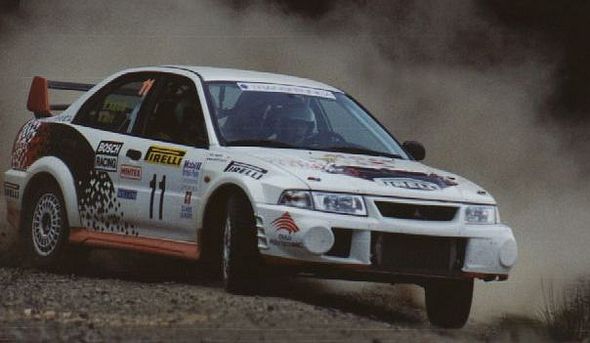
This is a Realcarmodels model of his Pirelli Rally winning car (the only event Marko won in 2000) – the decals on this car were way beyond my capability! -
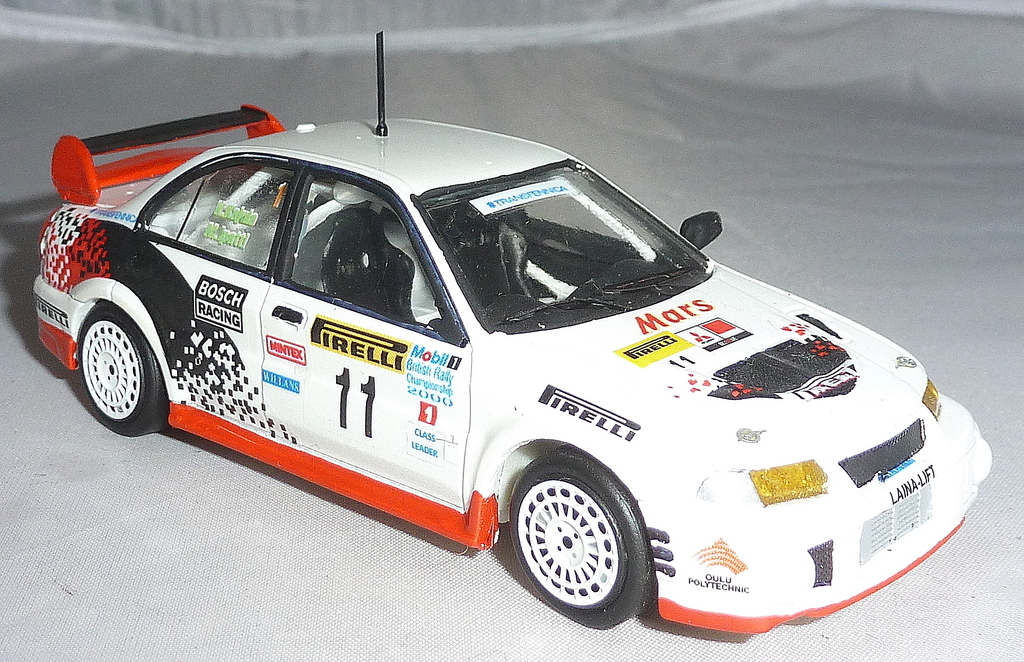
2001
There was another outbreak of foot and mouth disease in the country and all unnecessary events in the countryside were curtailed. The debate about future vehicle rules for the BRC continued into the new year while the sport in the country was at a standstill, and preparing for the eventual revival of the sport was a new idea called “Formula Rally” centred around the Super 1600 rules. Qualifying events would be run in areas where the disease was less prevalent, and embraced the idea of holding events closer to areas of increased population. As an ad-hoc promotion it was special, albeit ending in contention about when the competing cars had to be homologated and an argument whether the Ford driver Martin Rowe or the Peugeot driver Justin Dale would eventually take the title.

2002
2002 brought a return to familiarity, a traditional eight round BRC calendar, the manufacturers title was only for S1600 cars (going to the only serious team, Peugeot), the drivers’ title for older version WRC or Group N cars.
The season opener was again the Pirelli, and Mark Higgins got off to a cracking start in his Focus RS WRC 01. Jonny Milner was 2nd in his Toyota Corolla WRC and Tapio Laukkanen 3rd in his Subaru Impreza STi N8. Gwyndaf Evans gets an honourable mention by also scoring top points as the class leading S1600 car down in 12th place in his MG ZR S1600. Milner won round 2 (International Rally of Wales), Another Higgins (David this time) was 2nd in his Subaru Impreza WRX and Laukkanen took his second 3rd place result in a row. Leading S1600 driver this time was Justin Dale in his Peugeot 206 S1600 down in 13th. Round 3 was the Scottish which Milner won for his 2nd event in a row, Marcus Dodd 3rd in a Subaru Impreza S7 WRC 01 and David Higgins 3rd. Dale retired and Evans didn't enter the Scottish round so Kris Meeke was highest placed S1600 in his Ford Puma S1600 in a very creditable 5th place against a range of WRC machinery. Round 4 was the Jim Clark Memorial rally and was won by Andrew Nesbitt in his Subaru Impreza S6 WRC 00 with this forums very own James O'Brien in the co-drivers seat . Milner was 2nd and Eamon Boland in an Impreza S7 WRC 01 in 3rd. Dale was leading S1600 driver down in 8th. Mark Higgins was back on form for round 5, the Manx, this time in a Toyota Corolla WRC. Nesbitt was 2nd, Milner 3rd, and Dale the leading S1600 driver in 6th place. The Nesbitt/O'Brien partnership won Ulster round 3 (and would eventually finish 4th in the championship), Milner finished 2nd, and Evans in his rapid MG ZR S1600 was a fantastic 3rd home of the BRC championship drivers (5th overall). The next round was the Yorkshire Trackrod rally. Milner took a comfortable (nearly 2 mins lead) win in his Corolla, Steve Petch was 3rd home in his Hyundai Accent WRC and 2nd in the BRC, and going one better than the previous round by finishing 4th overall, and 3rd home of the BRC drivers was Evans. Round 8 only counted for the manufacturers title so I won't go in to detail here, but just for the record it was won by Phil Morgan in an Impreza S5 WRC 98. So where did that leave us? Milner took the BRC drivers championship with 48 points, and then the 2 S1600 drivers (Dale and Evans) took 2nd and 3rd place in the drivers championship on 39 and 30 points respectively.
2003
2003 began uncertainly with the first round cancelled for lack of entries (the organiser were already in a financially critical position after the event’s cancellation the year before) with the same events counting for the drivers and manufacturers titles.
The Pirelli opening round was won by Tapio Laukkanen in his Impreza S5 WRC 99, Milner was second in his Corolla WRC and Mark Higgins (now in a Clio S1600) was a fine 3rd overall. Round 2 was the Scottish and Milner went won better than the opening round by winning this and with Laukkanen in 2nd place it was a reverse of round 1. Jari-Matti Latvala was 3rd in his Ford Focus RS WRC 02. Whilst Nesbitt/O'Brien were winners of round 3 (the Jim Clark), they weren't participating in the BRC this year, so Milner's 2nd was effectively 1st, Austin MacHale's 6th place in his Subaru Impreza S7 WRC 01 was 2nd, and James Thompson 8th in his Mitsubishi Lancer Evo 6.5 was 3rd. Over to the Isle of Man for round 4, which Milner dominated finishing 5 mins ahead of everyone and nearly 8 mins ahead of the next best BRC driver which was MacHale in 4th. Garry Jennings in his Peugeot 206 S1600 was the 3rd placed BRC driver in 7th place. Another hop across the sea to the Ulster rally next. Laukkanen won this round having upgraded to an Impreza S7 WRC 01 for the previous round, Milner 3rd (2nd) and Latvala 4th (3rd). Rpund 6 was the Trackrod and the finishing BRC order was identical to the previous round, but this time with no non-BRC competitors getting inbetween them. Having sown up the title by the previous round, Milner gave the South of England Tempest rally (the season finale) a miss. Latvala won the final event, Ryan Champion was 2nd in his Impreza 555 and Julian Reynolds 3rd in a Corolla WRC. So Jonny Milner won back to back British Rally Championships in his Team Dynamics sponsored Corolla WRC.
Both these models are Skid models with a combination of bought and home made decals.
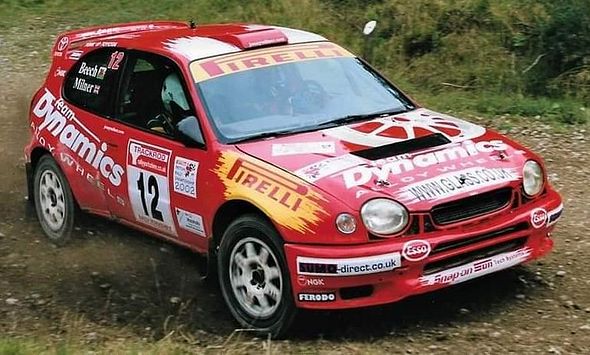
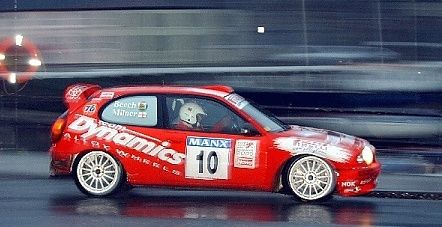
2002 is the Trackrod winning car (Jonny also won the Welsh, and Scottish), 2003 the Manx rally winner (Jonny also won the Scottish).
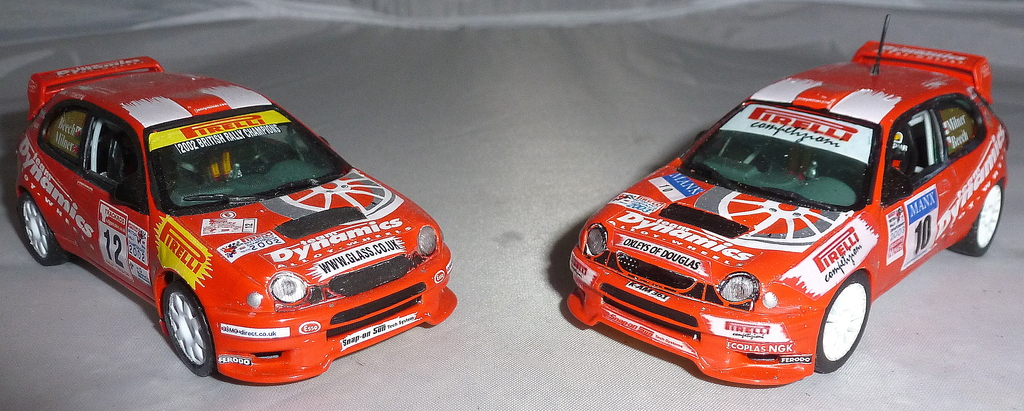
2004
For 2004 newer WRC cars were permitted and more overseas drivers decided to participate. Entry numbers seemed low but in reality events were progressively becoming split up in the entries and categories, and the Jim Clark attracted a total of around 150 competitors.
Once again, the Pirelli was the season opener and it was won in commanding fashion by David Higgins (brother of Mark) in his Hyundai Accent WRC3. Paul Bird and Steve Perez, both in Ford Focus RS WRC 02's were 2nd and 3rd. The champion from the previous 2 years, Jonny Milner, had switched to a Subaru Impreza S8 WRC 02 and retired from the event, but bounced back by winning the next round, the International Rally of Wales. Austin MacHale in his Focus RS WRC 03 was 2nd and Higgins 3rd. It was north of the border for round 3, the Scottish rally. Milner continued his good form with a back to back win, Higgins was 2nd and Barry Johnson 3rd in his Subaru Impreza S9 WRC 03. Unfortunately for Milner, his good form took a decided turn for the worse in the next round, the Jim Clark when his car caught fire. Higgins took full advantage by winning the event, MacHale 2nd, and Dougi Hall 3rd in his Ford Focus RS WRC 01. The pendulum swung back the other way for round 5, the Manx, with Milner taking the win, Machale 2nd, and Matthew Wilson 3rd in his Ford Focus RS WRC 02. David Higgins sat out this round. Ulster was round 6, MacHale showing good form again by winning the event, Wilson 2nd and Guy Wilks an excellent 3rd in his little Suzuki Ignis S1600. Although Milner as OTL, Higgins couldn't take much advantage, finishing a disappointing 9th. Milner won round 9, the Trackrod, Wilson 2nd, and Steve Perez now in an upgraded Ford Focus RS WRC 03 taking 3rd. Higgins retirement on the round meant he went in to the season finale, the South of England Tempest Rally on 89 points, level with MacHale, and only 9 points ahead of Milner and Wilson. With 20 points for a win, the title race was well and truly open. Milner didn't enter the final round and the win for Higgins by just 9 seconds from MacHale (with Wilson 3rd) was enough to pip MacHale to the title by 2 points. This was the only BRC championship win for David Higgins.
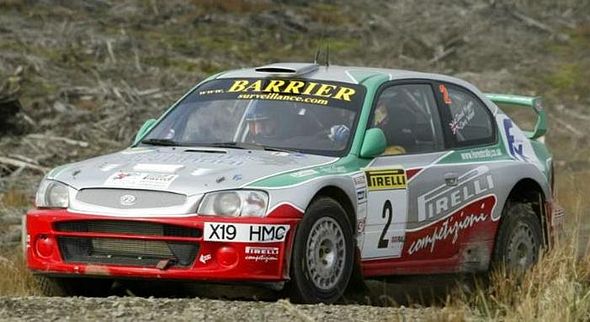
This is a Realcarmodels model of the Pirelli Rally winning car from that year (his brother Mark won 3 events compared to David's one but David still took the title).

2005
Clearly not someone to take such an insult lying down, Mark “retaliated” to his brothers BRC win in 2004 with back to back championship wins in 2005 and 2006. But whilst the 2005 season was going to be an extremely busy one for Mark, with a BRC championship to participate in, interspersed with a number of WRC level rallies all around the globle, the season did not get off to a great start. By 2005 the World Rally Car entry list in the BRC was diminishing, and the season started with only three serious WRC level drivers, Mark Higgins, Matthew Wilson and Austin MacHale, which reduced to two when Wilson badly injured his feet on the opening round in a curious coincidence of injuries suffered by his father in a crash in Scotland 27 years earlier. 2005 would be the final season that WRC cars were eligible for the BRC. For Higgins the season could not have started much more poorly, retiring on SS5 of round 1, the International Rally of Wales with gearbox trouble on his Ford Focus RS WRC 01. Austin MacHale took the opening round victory in his Ford Focus RS WRC 03, Sebastian Ling second in his Hyundai Accent WRC 3 and Jon Ingram third in his Ford Focus RS WRC 02. Keen to put round 1 behind him, Mark drove superbly to win round 2, the Pirelli International in his Eddie Stobart/Vodka Kick sponsored car, team mate Paul Bird was second in his Ford Focus RS WRC 02 and MacHale third. Round 3 was the Scottish, and Mark continued his good run of form from the previous event by winning by over 2 mins, MacHale took second and Ling third. North of the border for the Jim Clark rally next, and Mark kept his toe in and won this event outright and by a scarcely comprehendable 9mins 25 seconds from the 6th placed finisher (and 2nd from a BRC perspective) which was Rory Galligan in his group N Mitsubishi Evo VIII. 3rd place went to brother David Higgins (17th overall) in his Evo VIII, which was another 12 mins down the road. MacHale was out with mechanical problems. It would be home advantage for Mark in round 5, the Manx, and the 10 mins gap to the 2nd place BRC driver (team mate Paul Bird in 5th) and MacHale taking 3rd (6th overall), showed his dominance. Round 7 was the Trackrod/Yorkshire rally, and Matthew Wilson was back in an upgraded Ford Focus RS WRC 04, which enabled him to take a 40 seconds win over Mark. Steve Perez in his Ford Focus RS WRC 03 took 3rd. MacHale didn't enter this event. With the title confirmed as his, Mark sat out the final round, the South of England Tempest rally, as did MacHale. For the record, the results of the "dead rubber" was an outright victory for Will Nicholls in his Subaru Impreza S5 WRC 98 and first BRC driver home was 2nd placed Galligan in his Evo.
2006
For 2006 there was a new sponsor, Tesco 99 Octane fuel, a calendar of six events including the Wales Rally GB WRC event. WRC cars were no longer eligible for the series, and so a raft of new cars appeared at the top of the leader board on the stages.
First round of 2006 was the Pirelli, and it was won by the driver who would prove to be the stiffest competition for Mark that season, Ryan Champion in his Mitsubishi Evo IX. Mark finished 2nd in his Eddie Stobart/Vodka Kick sponsored Subaru Impreza STi N12, with Gwyndaf Evans 3rd in another Evo IX. Jim Clark rally for the next round, and whilst the 3 top drivers were all in WRC cars, they couldn't score points in the BRC. So maximum BRC points went to the 4th place finisher which was Higgins, Rory Galligan in a Mitsubishi Evo IX with Ryan Champion 3rd. A trip back home saw Higgins take a back to back win on round 3 (the Manx). In a repeat of the previous round, the top 3 slots went to non-point scorers in their WRC machines, with Higgins the first of the non WRC machinery home in 4th. Guy Wilks showed fantastic speed to take 2nd in the BRC in his little Suzuki Ignis S1600 and Jonny Milner popped up in 3rd place in the BRC in another Evo IX. Round 4 was the Ulster and this time 4 WRC cars took top honours at the event, but this time the top BRC car was Evans, then Higgins and then Galligan. The Trackrod Rally Yorkshire formed round 5 and at the end the result saw 34 seconds covering the top 3 cars, with final finishing places of Champion, Higgins and then Milner. The impact of this result meant that by the time of Wales Rally GB, Mark Higgins had already be crowned as the 2006 BRC champion and so he elected instead to drive in a World Rally Car in the Wales Rally GB. Unfortunately Mark had to retire his Ford Focus RS WRC 04 due to mechanical issues, but the result of the dead rubber from a BRC perspective was Champion (16th overall), Stuart Jones (17th) and David Higgins (18th), all in Evo IX's.
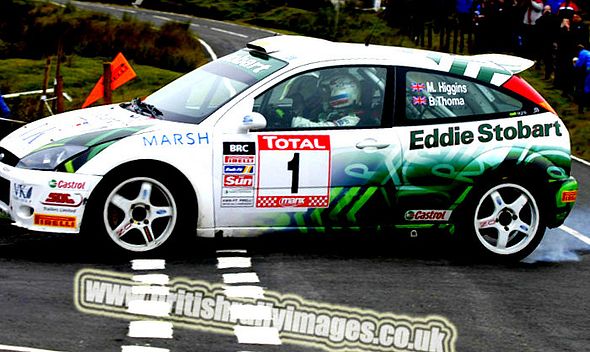
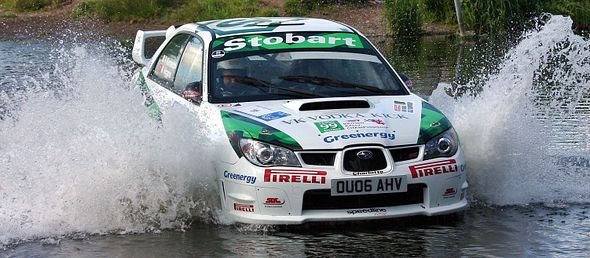
The 2005 Manx winning Focus WRC is a Corgi base with homemade decals (Mark won the Pirelli, Scottish and Jim Clark as well) , the 2006 Jim Clark winning Impreza is by StartUp Models.

2007
News for 2007 was that Pirelli would act as the single tyre supplier, bringing with it their own Star Driver rewards systems. Once again the Wales Rally GB was the final event, and this year there was a curious system in which two BRC drivers, Guy Wilks and Gwydaf Evans were given “guest” Production Car championship status, with competitive advantages which many felt were unfair on the other championship competitors. The promoter also ventured into new ground when they noted the new international Group R class system, although they paid more homage than observance, since the cars simply used these names as a title for their own class structure. This year the WRGB created more difficulties, following the decision that the event would in fact count as two championship rounds, and with competitors on the event running under two separate sets of rules. Super 2000 cars were admitted into the series for the first time but this facility was poorly supported.
As had become something of a tradition, the Pirelli kicked off the season, but the person setting the early season pace was Guy Wilks, fresh from his strong showings in S1600 cars in the UK and across the globe over the previous 5 seasons. Guy won the opening round in his Mitsubishi Evo IX by over a minute from the 2 strongest performers the previous years, Higgins and Champion, who continued in their Subaru Impreza STi 12 and Mitsubishi Evo IX's respectively. Higgins fought back on the next round, the Jim Clark, where he finished 4th behind 3 WRC spec cars. 2 places back, split by another WRC car was Mark's brother David in a Toyota Corolla S2000 and a further 2 spots back was Philip Morrow in his Evo IX. Wilks finished a disappointing 10th in this round. It would have taken a brave man to bet that Mark Higgins wouldn't be somewhere near the top of the leaderboard on his home rally of the Isle of Man in round 3, however both he and his brother encountered issues and were way down the leaderboard and outside of the points. Guy Wilks finished 3rd outright between 2 WRC cars, and Evans (6th overall) in another Evo IX and Wyn Humphreys (9th) in his Subaru Impreza STi N12. Round 4 was the Ulster, and Higgins was back at the top of the leaderboard, finishing 4th overall, with Wilks this time encountering all the problems and finishing completely out of the points (65th). Evans in 5th and Morrow in 7th finished out the BRC podium. Round 5 was Rally Yorkshire, and the pendulum swung back the other way with Wilks taking the win and the Higgins brothers (Mark and David) rounding out the podium. So as the competition headed for Wales Rally GB, Mark Higgins had a commanding lead in the championship (77 points to 61). But...... Rally GB was split into two events for the runners in the Tesco 99 Octane MSA British Rally Championship. Day 1 (SS1-SS6) counted as round 6, while days 2 and 3 (SS7-17) counted as round 7. So a max of 40 points were up for grabs but barring disaster, surely Higgins had his hands on yet another BRC title?
Overall times after SS6:
1. Guy Wilks Mitsubishi Lancer Evo IX 1hour 27mins 18.8secs N4*
2. Gwyndaf Evans Mitsubishi Lancer Evo IX 1hour 27mins 22.0secs N4*
3. Mark Higgins Mitsubishi Lancer Evo IX 1hour 28mins 17.9secs N4*
Overall times after SS7-SS17 - round 7 of the BRC:
1. Guy Wilks Mitsubishi Lancer Evo IX 2hours 17mins 14.9secs N4*
2. Mark Higgins Mitsubishi Lancer Evo IX 2hours 17mins 52.3secs N4*
3. David Higgins Subaru Impreza IX 2hours 21mins 56.7secs N4*
But how did that translate in to points? Well Wilks effectively won both events and took home the maximum possible 40 points. Higgins took 16 points for 3rd place in the "first event", but only picked up 2 points for the second event as his championship hopes were destroyed by a series of punctures and transmission problems and with that the title was gone and Wilks had won the title from Mark.
2008
2008 celebrated the fiftieth anniversary of the start of the BRC. This year all cars below WRC level were admitted. The Pirelli Star Driver system allowed one driver from each event to qualify in a Shoot Out which then led to a paid drive on the following year’s championship. Darren Gass won a place in the 2008 series, but without much luck. The Wales Rally GB again provided two separate rounds of the series but it was not included in the BRC calendar after that.
Guy had continued in the same car as the previous year, whilst Mark Higgins started the season in a Stobard sponsored MG S2000 Sport. That switch did not work well for Mark as he retired from the opening event, the Pirelli, and Wilks took full advantage by winning the event. Juho Hanninen was 2nd in his Evo IX and David Higgins 3rd in his Subaru Impreza STi N14. Round 2 was the Jim Clark, and this time Guy Wilks suffered the misfortune as his car caught fire. Mark took full advantage by finishing 3rd overall and taking top step for BRC drivers (but not Mark was in a Subaru Impreza STi N11 Spec C). Stuart Jones brough his MG S2000 Sport home in 2nd in the BRC and David Higgins took 3rd again. Back on home turf for the Manx in round 3, and Higgins was outstanding, even beating WRC machinery piloted by some highly regarded drivers. Wilks took a commendable 2nd (3rd overall) and yep, you've guessed it, David Higgins was 3rd once again. Across the sea to Ireland and the Ulster next. Mark didn't quite have the beating of all the WRC machinery this time, but still took an excellent 3rd place with Wilks keeping him honest, 1 place behind and Gwyndaf Evans in his Evo IX taking David Higgins rightful place in 3rd. The Yorkshire was up next for round 5 and Wilks wasn't going to give up the defense of his title in a hurry and won the event from Mark, with Keith Cronin, a name that would become very familiar to BRC fans in the not too distant future, taking 3rd spot in his Evo IX. And so to rounds 6 and 7 and with all to play for again, and it was repeat of the split Wales Rally GB process from the prior year. BRC Results after the initial 8 stages were as follows and shows that Higgins had had a horrific time and was 25mins behind Wilks.
Overall times after SS8:
1. Guy WilksMitsubishi Lancer Evo IX33mins 26.9secs R4 / P
2. Patrick FlodinSubaru Impreza WRX STi33mins 56.3secs R4 / P
3. David HigginsSubaru Impreza WRX STi34mins 23.8secs R4 / P
4. Gwyndaf EvansMitsubishi Lancer Evo IX37mins 29.1secs R4
5. Hugh EvansSubaru Impreza WRX STi+41mins 30.2secs R4
6. Jason PritchardCitroen C2R2+42mins 17.4secs R2
7. Gordon NicholSuzuki Swift+46mins 19.5secs R1
8. Eyvind BrynildsenMitsubishi Lancer Evo IX+46mins 25.5secs R4*
9. David HarrisonMG ZR 105+47mins 00.8secs R1##
10. Juho HanninenMitsubishi Lancer Evo 9+51mins 46.8secs R4*
11. Nathan O'ConnorCitroen C2R2+53mins 51.5secs R2
12. Brian O'MahonyRenault Clio S1600+57mins 04.1secs R3*
13. Mark HigginsSubaru Impreza WRX STi+58mins 26.2secs R4*
It didn't get any better for Higgins the next day/round and he crashed out on stage 9 which was the first stage of round 7 and with that the title was Wilks and Higgins quest to add to his BRC titles was over again as he finished bridesmaid once more. At the end of the event, Patrik Flodin had driven extremely well and taken his Subaru Impreza STi N14 in to top position in the BRC, but Wilks hung on for 2nd and Evans took 3rd.
1. Patrick FlodinSubaru Impreza WRX STi2hours 22mins 05.0secs R4 / P
2. Guy WilksMitsubishi Lancer Evo IX2hours 24mins 42.1secs R4 / P
3. Gwyndaf EvansMitsubishi Lancer Evo IX2hours 25mins 43.7secs R4
Having overcome reliability issues, crashes and even a car-destroying inferno to keep himself in the hunt right down to the final day, it was probably no more than Wilks deserved. Clearly, when you get a feel for the car or conditions, multiple championships are possible, as Guy Wilks found out by achieving back to back titles in Ralliart sponsored Mitsubishi Evo IX N4.
But it didn't quite end there. There had been a protest earlier in the year at the Yorkshire Rally when there had been a protest about Wilks' team modifying the homologated steering column on his car, alledgedly for safety reasons and to accomodate his height. The protest had been overturned, but it now resurfaced with the MSA saying that they would take a second look at it. So it wasn't until later in the year, some time after the final event that the MSA eventually ruled that the protest remained overturned and Wilk's 2nd title stood. Not the ideal outcome as i'm sure it took some of the excitement away from the win for Wilks, but justice did appear to have been served.
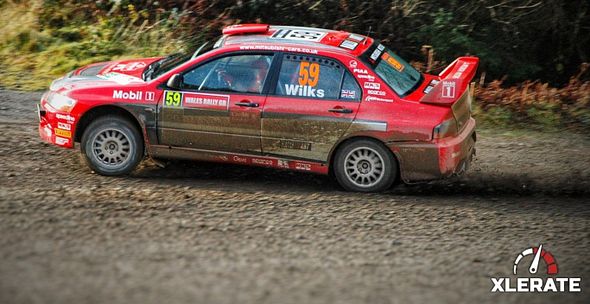
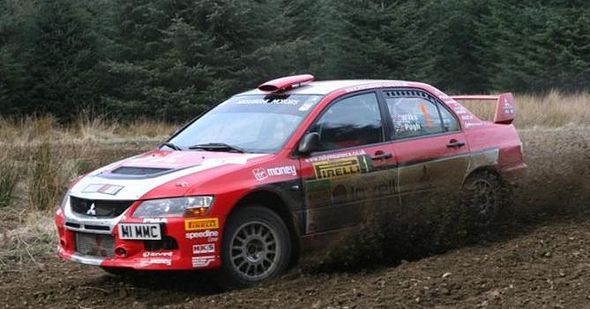
The 2007 RAC car (the RAC was a 2 part BRC qualifying event in 2007 and Guy won both parts) is a Vitesse model (Guy also won the Pirelli and Rally Yorkshire). The 2008 Pirelli rally winning car is a redecaled version of that car (Guy also won Rally Yorkshire and part 1 of the 2 part Rally GB event).
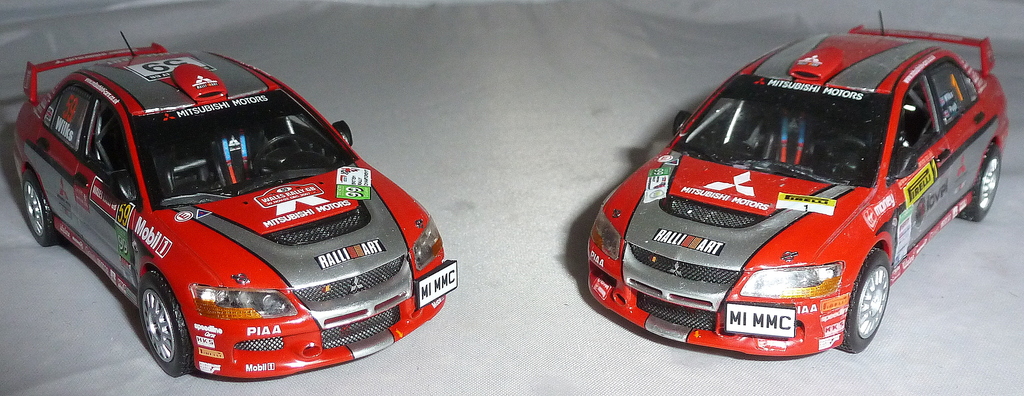
2009
Time for Wilks to step down and for someone else to pick up the double bubble crown.
2009 saw a resurgence of overseas drivers domination of the BRC. For the first time since the era of Mr Ipatti the title would be heading abroad....... This time to Keith Cronin, the eldest of ten children, who had been picked out as a potential star of the future on a children’s rally track in nearby Killarney, Ireland when he was just ten years old. They start them going sideways early in the Emerald Isles…..
The opening round of the 2009 season was the Bulldog Rally of North Wales and Cronin demonstrated that the promise he had shown last year was no flash in the pan by winning the opening event in his Evo IX. Mark Higgins was second in his Impreza STi N11 Spec C and must have been already praying that he wouldn't be runner up for 3 years in a row come the end of the year. Stuart Jones in another Evo IX was 3rd. The Pirelli was round 2 and Cronin again won the event from Higgins, with Scotsman David Bogie 3rd in his Mitsubishi Lancer Evo X. Next up with the Jim Clark International which was won by Irishman Eugene Donnelly in a Skoda Fabia WRC that wasn't elible for BRC points, so top points scorer in the BRC was Mark Higgins who was the fastest non WRC spec car driver down in 6th place, with Cronin just 12 seconds behind in 7th and Adam Gould 8th in his Subaru Impreza STi N14. Mark had his "safe place", the Isle of Man Manx rally to look forward to next, and sure enough it delivered maximum points for him. Cronin was 2nd and Alastair Fisher 3rd in his Evo IX. Round 5 was the Ulster and it looked like a turning point in the season for Cronin as he want off road on SS6. Higgins took full advantage, Gwyndaf Evans was 2nd in his Evo X and Alastair Fisher 3rd. Mark must have been keeping his fingers crossed for the final event, Round 6, the Yorkshire, but it was not successful as he retired on SS9 and Cronin took full advantage by winning this round, with Stuart Jones 2nd in his Evo X and Jonny Greer 3rd in an Evo IX. As a result of a quirk in the scoring system where points were awarded based on finishing positon in the rally, regardless of the fact that non eligible point scorers finished ahead of you, although Higgins and Cronin had both effectively won 3 events and come 2nd twice, with Higgins retirement in the final round, Cronin won the BRC by 106 points to Higgins 96, and Higgins was runner up for a 3rd year in a row. He must have been thinking by now that he had stepped on a crack in a pavement, walked under a ladder and had a black cat cross his path all on the final day of each season. So Keith Cronin followed the legend of fellow Irish driver Billy Coleman, and it was a third successive title for Mitsubishi despite the official importer’s team withdrawal leaving the only top level championship team as the TEG team of Subarus, who ran Mark Higgins and Adam Gould, the season’s Star Driver from the year before. The successful proliferation of categories on events continued and provided competition for a wide variety of competitors. The season ended with new names coming along, notably Molly Taylor from Australia, who won the Ladies prize.
2009 Trackrod
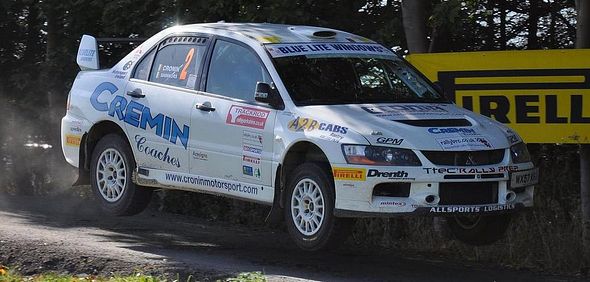
The Trackrod Rally winning Evo 9 R4 was produced by JFE models, (Keith also won the Bulldog and Pirelli in 2009) whereas the Impreza N15 reflecting the Manx winning 2010 car was produced by Realcarmodels (Keith also won the Bulldog in 2010).

2000
The Millennium began with surely the most amazing season in the BRC. The agreement was that this would be the sixth and final year in which “Formula 2” cars would be the basis of the championship. The main contenders were the dealer supported Vauxhall and Volkswagen teams supported initially by a team of ex-works Hyundai Coupes (with Vauxhall refugee Jarmo Kytolehto and Australian Andrew Pinker driving for the team) after SEAT, Ford and Renault withdrew from the series. Pre-season saw another round of "driver merry-go-round" - Mark Higgins moved from Volkswagen to Vauxhall, Gwyndaf Evans left the series to concentrate on testing and development work for SEAT WRC team, David Higgins moved from a production Subaru to the works Peugeot team, and reigning champion Tapio Laukkanen moved to Volkswagen as their solo driver. Martin Rowe only made a one off appearance for Ford in the new Puma rally car after Renault's withdrawal.
It all started gently, without much support from foreign teams. Any privateer foreign driver was given encouragement to compete, and one driver who gratefully accepted the offers was a little known Mitsubishi Lancer Evo VI Group N4 Finnish driver, Marko Ipatti. He finished third and best non-Vauxhall on the opening round, the Vauxhall Rally of Wales, behind Mark Higgins and Neil Wearden in the Vauxhall Astra Kit Cars. Ipatti stepped on the gas for round 2 (the Pirelli), winning outright from Jarmo Kytolehto in the Hyundai Coupe Kit Car and Mats Andersson in the Proton Satria Kit Car. Gradually Ipatti was to become less welcome, becoming a threat to the establishment. Round 3 was the Kumho Tyres Scottish Rally which was won by Tapio Laukkanen in his Golf MkIV Kit Car, with Ipatti 2nd just 3 seconds back and Neil Wearden 3rd. Round 4 was the Jim Clark and the event was won by Mark Higgins in his Vauxhall Astra Kit Car. Laukkanen split the 2 Vauxhall drivers by finishing 2nd, with Wearden 3rd. Ipatti finished 8th. As the season progressed there were two top runners for the title, the Vauxhall driver Neil Wearden – and Ipatti. That was not the scenario the professionals had planned! Wearden won the next round (the MSA Rally), but Ipatti was back on the pace and finished 2nd ahead of Laukkanen. And so to the final round (6), the Manx. Ipatti became champion when Wearden’s engine failed on the opening stage of the rally and Ipatti immediately withdrew from the event unchallenged for the title. Folklore tells that the professional teams planned their final attack, calling on the organisers to scrutineer Ipattis’ car to find some technical illegality. Ipatti reacted and had his car dismantled with various components being sold second hand to other competitors around the service park, out of harms way. He privately boasted he defeated the system not once but twice, because the BRC was not run the next year. An unbelievable end to a scene that could never happen again, for various reasons. “Formula 2” had run its course and another more specific formula was being devised by the FIA, which was called Super 1600.

This is a Realcarmodels model of his Pirelli Rally winning car (the only event Marko won in 2000) – the decals on this car were way beyond my capability! -

2001
There was another outbreak of foot and mouth disease in the country and all unnecessary events in the countryside were curtailed. The debate about future vehicle rules for the BRC continued into the new year while the sport in the country was at a standstill, and preparing for the eventual revival of the sport was a new idea called “Formula Rally” centred around the Super 1600 rules. Qualifying events would be run in areas where the disease was less prevalent, and embraced the idea of holding events closer to areas of increased population. As an ad-hoc promotion it was special, albeit ending in contention about when the competing cars had to be homologated and an argument whether the Ford driver Martin Rowe or the Peugeot driver Justin Dale would eventually take the title.

2002
2002 brought a return to familiarity, a traditional eight round BRC calendar, the manufacturers title was only for S1600 cars (going to the only serious team, Peugeot), the drivers’ title for older version WRC or Group N cars.
The season opener was again the Pirelli, and Mark Higgins got off to a cracking start in his Focus RS WRC 01. Jonny Milner was 2nd in his Toyota Corolla WRC and Tapio Laukkanen 3rd in his Subaru Impreza STi N8. Gwyndaf Evans gets an honourable mention by also scoring top points as the class leading S1600 car down in 12th place in his MG ZR S1600. Milner won round 2 (International Rally of Wales), Another Higgins (David this time) was 2nd in his Subaru Impreza WRX and Laukkanen took his second 3rd place result in a row. Leading S1600 driver this time was Justin Dale in his Peugeot 206 S1600 down in 13th. Round 3 was the Scottish which Milner won for his 2nd event in a row, Marcus Dodd 3rd in a Subaru Impreza S7 WRC 01 and David Higgins 3rd. Dale retired and Evans didn't enter the Scottish round so Kris Meeke was highest placed S1600 in his Ford Puma S1600 in a very creditable 5th place against a range of WRC machinery. Round 4 was the Jim Clark Memorial rally and was won by Andrew Nesbitt in his Subaru Impreza S6 WRC 00 with this forums very own James O'Brien in the co-drivers seat . Milner was 2nd and Eamon Boland in an Impreza S7 WRC 01 in 3rd. Dale was leading S1600 driver down in 8th. Mark Higgins was back on form for round 5, the Manx, this time in a Toyota Corolla WRC. Nesbitt was 2nd, Milner 3rd, and Dale the leading S1600 driver in 6th place. The Nesbitt/O'Brien partnership won Ulster round 3 (and would eventually finish 4th in the championship), Milner finished 2nd, and Evans in his rapid MG ZR S1600 was a fantastic 3rd home of the BRC championship drivers (5th overall). The next round was the Yorkshire Trackrod rally. Milner took a comfortable (nearly 2 mins lead) win in his Corolla, Steve Petch was 3rd home in his Hyundai Accent WRC and 2nd in the BRC, and going one better than the previous round by finishing 4th overall, and 3rd home of the BRC drivers was Evans. Round 8 only counted for the manufacturers title so I won't go in to detail here, but just for the record it was won by Phil Morgan in an Impreza S5 WRC 98. So where did that leave us? Milner took the BRC drivers championship with 48 points, and then the 2 S1600 drivers (Dale and Evans) took 2nd and 3rd place in the drivers championship on 39 and 30 points respectively.
2003
2003 began uncertainly with the first round cancelled for lack of entries (the organiser were already in a financially critical position after the event’s cancellation the year before) with the same events counting for the drivers and manufacturers titles.
The Pirelli opening round was won by Tapio Laukkanen in his Impreza S5 WRC 99, Milner was second in his Corolla WRC and Mark Higgins (now in a Clio S1600) was a fine 3rd overall. Round 2 was the Scottish and Milner went won better than the opening round by winning this and with Laukkanen in 2nd place it was a reverse of round 1. Jari-Matti Latvala was 3rd in his Ford Focus RS WRC 02. Whilst Nesbitt/O'Brien were winners of round 3 (the Jim Clark), they weren't participating in the BRC this year, so Milner's 2nd was effectively 1st, Austin MacHale's 6th place in his Subaru Impreza S7 WRC 01 was 2nd, and James Thompson 8th in his Mitsubishi Lancer Evo 6.5 was 3rd. Over to the Isle of Man for round 4, which Milner dominated finishing 5 mins ahead of everyone and nearly 8 mins ahead of the next best BRC driver which was MacHale in 4th. Garry Jennings in his Peugeot 206 S1600 was the 3rd placed BRC driver in 7th place. Another hop across the sea to the Ulster rally next. Laukkanen won this round having upgraded to an Impreza S7 WRC 01 for the previous round, Milner 3rd (2nd) and Latvala 4th (3rd). Rpund 6 was the Trackrod and the finishing BRC order was identical to the previous round, but this time with no non-BRC competitors getting inbetween them. Having sown up the title by the previous round, Milner gave the South of England Tempest rally (the season finale) a miss. Latvala won the final event, Ryan Champion was 2nd in his Impreza 555 and Julian Reynolds 3rd in a Corolla WRC. So Jonny Milner won back to back British Rally Championships in his Team Dynamics sponsored Corolla WRC.
Both these models are Skid models with a combination of bought and home made decals.


2002 is the Trackrod winning car (Jonny also won the Welsh, and Scottish), 2003 the Manx rally winner (Jonny also won the Scottish).

2004
For 2004 newer WRC cars were permitted and more overseas drivers decided to participate. Entry numbers seemed low but in reality events were progressively becoming split up in the entries and categories, and the Jim Clark attracted a total of around 150 competitors.
Once again, the Pirelli was the season opener and it was won in commanding fashion by David Higgins (brother of Mark) in his Hyundai Accent WRC3. Paul Bird and Steve Perez, both in Ford Focus RS WRC 02's were 2nd and 3rd. The champion from the previous 2 years, Jonny Milner, had switched to a Subaru Impreza S8 WRC 02 and retired from the event, but bounced back by winning the next round, the International Rally of Wales. Austin MacHale in his Focus RS WRC 03 was 2nd and Higgins 3rd. It was north of the border for round 3, the Scottish rally. Milner continued his good form with a back to back win, Higgins was 2nd and Barry Johnson 3rd in his Subaru Impreza S9 WRC 03. Unfortunately for Milner, his good form took a decided turn for the worse in the next round, the Jim Clark when his car caught fire. Higgins took full advantage by winning the event, MacHale 2nd, and Dougi Hall 3rd in his Ford Focus RS WRC 01. The pendulum swung back the other way for round 5, the Manx, with Milner taking the win, Machale 2nd, and Matthew Wilson 3rd in his Ford Focus RS WRC 02. David Higgins sat out this round. Ulster was round 6, MacHale showing good form again by winning the event, Wilson 2nd and Guy Wilks an excellent 3rd in his little Suzuki Ignis S1600. Although Milner as OTL, Higgins couldn't take much advantage, finishing a disappointing 9th. Milner won round 9, the Trackrod, Wilson 2nd, and Steve Perez now in an upgraded Ford Focus RS WRC 03 taking 3rd. Higgins retirement on the round meant he went in to the season finale, the South of England Tempest Rally on 89 points, level with MacHale, and only 9 points ahead of Milner and Wilson. With 20 points for a win, the title race was well and truly open. Milner didn't enter the final round and the win for Higgins by just 9 seconds from MacHale (with Wilson 3rd) was enough to pip MacHale to the title by 2 points. This was the only BRC championship win for David Higgins.

This is a Realcarmodels model of the Pirelli Rally winning car from that year (his brother Mark won 3 events compared to David's one but David still took the title).

2005
Clearly not someone to take such an insult lying down, Mark “retaliated” to his brothers BRC win in 2004 with back to back championship wins in 2005 and 2006. But whilst the 2005 season was going to be an extremely busy one for Mark, with a BRC championship to participate in, interspersed with a number of WRC level rallies all around the globle, the season did not get off to a great start. By 2005 the World Rally Car entry list in the BRC was diminishing, and the season started with only three serious WRC level drivers, Mark Higgins, Matthew Wilson and Austin MacHale, which reduced to two when Wilson badly injured his feet on the opening round in a curious coincidence of injuries suffered by his father in a crash in Scotland 27 years earlier. 2005 would be the final season that WRC cars were eligible for the BRC. For Higgins the season could not have started much more poorly, retiring on SS5 of round 1, the International Rally of Wales with gearbox trouble on his Ford Focus RS WRC 01. Austin MacHale took the opening round victory in his Ford Focus RS WRC 03, Sebastian Ling second in his Hyundai Accent WRC 3 and Jon Ingram third in his Ford Focus RS WRC 02. Keen to put round 1 behind him, Mark drove superbly to win round 2, the Pirelli International in his Eddie Stobart/Vodka Kick sponsored car, team mate Paul Bird was second in his Ford Focus RS WRC 02 and MacHale third. Round 3 was the Scottish, and Mark continued his good run of form from the previous event by winning by over 2 mins, MacHale took second and Ling third. North of the border for the Jim Clark rally next, and Mark kept his toe in and won this event outright and by a scarcely comprehendable 9mins 25 seconds from the 6th placed finisher (and 2nd from a BRC perspective) which was Rory Galligan in his group N Mitsubishi Evo VIII. 3rd place went to brother David Higgins (17th overall) in his Evo VIII, which was another 12 mins down the road. MacHale was out with mechanical problems. It would be home advantage for Mark in round 5, the Manx, and the 10 mins gap to the 2nd place BRC driver (team mate Paul Bird in 5th) and MacHale taking 3rd (6th overall), showed his dominance. Round 7 was the Trackrod/Yorkshire rally, and Matthew Wilson was back in an upgraded Ford Focus RS WRC 04, which enabled him to take a 40 seconds win over Mark. Steve Perez in his Ford Focus RS WRC 03 took 3rd. MacHale didn't enter this event. With the title confirmed as his, Mark sat out the final round, the South of England Tempest rally, as did MacHale. For the record, the results of the "dead rubber" was an outright victory for Will Nicholls in his Subaru Impreza S5 WRC 98 and first BRC driver home was 2nd placed Galligan in his Evo.
2006
For 2006 there was a new sponsor, Tesco 99 Octane fuel, a calendar of six events including the Wales Rally GB WRC event. WRC cars were no longer eligible for the series, and so a raft of new cars appeared at the top of the leader board on the stages.
First round of 2006 was the Pirelli, and it was won by the driver who would prove to be the stiffest competition for Mark that season, Ryan Champion in his Mitsubishi Evo IX. Mark finished 2nd in his Eddie Stobart/Vodka Kick sponsored Subaru Impreza STi N12, with Gwyndaf Evans 3rd in another Evo IX. Jim Clark rally for the next round, and whilst the 3 top drivers were all in WRC cars, they couldn't score points in the BRC. So maximum BRC points went to the 4th place finisher which was Higgins, Rory Galligan in a Mitsubishi Evo IX with Ryan Champion 3rd. A trip back home saw Higgins take a back to back win on round 3 (the Manx). In a repeat of the previous round, the top 3 slots went to non-point scorers in their WRC machines, with Higgins the first of the non WRC machinery home in 4th. Guy Wilks showed fantastic speed to take 2nd in the BRC in his little Suzuki Ignis S1600 and Jonny Milner popped up in 3rd place in the BRC in another Evo IX. Round 4 was the Ulster and this time 4 WRC cars took top honours at the event, but this time the top BRC car was Evans, then Higgins and then Galligan. The Trackrod Rally Yorkshire formed round 5 and at the end the result saw 34 seconds covering the top 3 cars, with final finishing places of Champion, Higgins and then Milner. The impact of this result meant that by the time of Wales Rally GB, Mark Higgins had already be crowned as the 2006 BRC champion and so he elected instead to drive in a World Rally Car in the Wales Rally GB. Unfortunately Mark had to retire his Ford Focus RS WRC 04 due to mechanical issues, but the result of the dead rubber from a BRC perspective was Champion (16th overall), Stuart Jones (17th) and David Higgins (18th), all in Evo IX's.


The 2005 Manx winning Focus WRC is a Corgi base with homemade decals (Mark won the Pirelli, Scottish and Jim Clark as well) , the 2006 Jim Clark winning Impreza is by StartUp Models.

2007
News for 2007 was that Pirelli would act as the single tyre supplier, bringing with it their own Star Driver rewards systems. Once again the Wales Rally GB was the final event, and this year there was a curious system in which two BRC drivers, Guy Wilks and Gwydaf Evans were given “guest” Production Car championship status, with competitive advantages which many felt were unfair on the other championship competitors. The promoter also ventured into new ground when they noted the new international Group R class system, although they paid more homage than observance, since the cars simply used these names as a title for their own class structure. This year the WRGB created more difficulties, following the decision that the event would in fact count as two championship rounds, and with competitors on the event running under two separate sets of rules. Super 2000 cars were admitted into the series for the first time but this facility was poorly supported.
As had become something of a tradition, the Pirelli kicked off the season, but the person setting the early season pace was Guy Wilks, fresh from his strong showings in S1600 cars in the UK and across the globe over the previous 5 seasons. Guy won the opening round in his Mitsubishi Evo IX by over a minute from the 2 strongest performers the previous years, Higgins and Champion, who continued in their Subaru Impreza STi 12 and Mitsubishi Evo IX's respectively. Higgins fought back on the next round, the Jim Clark, where he finished 4th behind 3 WRC spec cars. 2 places back, split by another WRC car was Mark's brother David in a Toyota Corolla S2000 and a further 2 spots back was Philip Morrow in his Evo IX. Wilks finished a disappointing 10th in this round. It would have taken a brave man to bet that Mark Higgins wouldn't be somewhere near the top of the leaderboard on his home rally of the Isle of Man in round 3, however both he and his brother encountered issues and were way down the leaderboard and outside of the points. Guy Wilks finished 3rd outright between 2 WRC cars, and Evans (6th overall) in another Evo IX and Wyn Humphreys (9th) in his Subaru Impreza STi N12. Round 4 was the Ulster, and Higgins was back at the top of the leaderboard, finishing 4th overall, with Wilks this time encountering all the problems and finishing completely out of the points (65th). Evans in 5th and Morrow in 7th finished out the BRC podium. Round 5 was Rally Yorkshire, and the pendulum swung back the other way with Wilks taking the win and the Higgins brothers (Mark and David) rounding out the podium. So as the competition headed for Wales Rally GB, Mark Higgins had a commanding lead in the championship (77 points to 61). But...... Rally GB was split into two events for the runners in the Tesco 99 Octane MSA British Rally Championship. Day 1 (SS1-SS6) counted as round 6, while days 2 and 3 (SS7-17) counted as round 7. So a max of 40 points were up for grabs but barring disaster, surely Higgins had his hands on yet another BRC title?
Overall times after SS6:
1. Guy Wilks Mitsubishi Lancer Evo IX 1hour 27mins 18.8secs N4*
2. Gwyndaf Evans Mitsubishi Lancer Evo IX 1hour 27mins 22.0secs N4*
3. Mark Higgins Mitsubishi Lancer Evo IX 1hour 28mins 17.9secs N4*
Overall times after SS7-SS17 - round 7 of the BRC:
1. Guy Wilks Mitsubishi Lancer Evo IX 2hours 17mins 14.9secs N4*
2. Mark Higgins Mitsubishi Lancer Evo IX 2hours 17mins 52.3secs N4*
3. David Higgins Subaru Impreza IX 2hours 21mins 56.7secs N4*
But how did that translate in to points? Well Wilks effectively won both events and took home the maximum possible 40 points. Higgins took 16 points for 3rd place in the "first event", but only picked up 2 points for the second event as his championship hopes were destroyed by a series of punctures and transmission problems and with that the title was gone and Wilks had won the title from Mark.
2008
2008 celebrated the fiftieth anniversary of the start of the BRC. This year all cars below WRC level were admitted. The Pirelli Star Driver system allowed one driver from each event to qualify in a Shoot Out which then led to a paid drive on the following year’s championship. Darren Gass won a place in the 2008 series, but without much luck. The Wales Rally GB again provided two separate rounds of the series but it was not included in the BRC calendar after that.
Guy had continued in the same car as the previous year, whilst Mark Higgins started the season in a Stobard sponsored MG S2000 Sport. That switch did not work well for Mark as he retired from the opening event, the Pirelli, and Wilks took full advantage by winning the event. Juho Hanninen was 2nd in his Evo IX and David Higgins 3rd in his Subaru Impreza STi N14. Round 2 was the Jim Clark, and this time Guy Wilks suffered the misfortune as his car caught fire. Mark took full advantage by finishing 3rd overall and taking top step for BRC drivers (but not Mark was in a Subaru Impreza STi N11 Spec C). Stuart Jones brough his MG S2000 Sport home in 2nd in the BRC and David Higgins took 3rd again. Back on home turf for the Manx in round 3, and Higgins was outstanding, even beating WRC machinery piloted by some highly regarded drivers. Wilks took a commendable 2nd (3rd overall) and yep, you've guessed it, David Higgins was 3rd once again. Across the sea to Ireland and the Ulster next. Mark didn't quite have the beating of all the WRC machinery this time, but still took an excellent 3rd place with Wilks keeping him honest, 1 place behind and Gwyndaf Evans in his Evo IX taking David Higgins rightful place in 3rd. The Yorkshire was up next for round 5 and Wilks wasn't going to give up the defense of his title in a hurry and won the event from Mark, with Keith Cronin, a name that would become very familiar to BRC fans in the not too distant future, taking 3rd spot in his Evo IX. And so to rounds 6 and 7 and with all to play for again, and it was repeat of the split Wales Rally GB process from the prior year. BRC Results after the initial 8 stages were as follows and shows that Higgins had had a horrific time and was 25mins behind Wilks.
Overall times after SS8:
1. Guy WilksMitsubishi Lancer Evo IX33mins 26.9secs R4 / P
2. Patrick FlodinSubaru Impreza WRX STi33mins 56.3secs R4 / P
3. David HigginsSubaru Impreza WRX STi34mins 23.8secs R4 / P
4. Gwyndaf EvansMitsubishi Lancer Evo IX37mins 29.1secs R4
5. Hugh EvansSubaru Impreza WRX STi+41mins 30.2secs R4
6. Jason PritchardCitroen C2R2+42mins 17.4secs R2
7. Gordon NicholSuzuki Swift+46mins 19.5secs R1
8. Eyvind BrynildsenMitsubishi Lancer Evo IX+46mins 25.5secs R4*
9. David HarrisonMG ZR 105+47mins 00.8secs R1##
10. Juho HanninenMitsubishi Lancer Evo 9+51mins 46.8secs R4*
11. Nathan O'ConnorCitroen C2R2+53mins 51.5secs R2
12. Brian O'MahonyRenault Clio S1600+57mins 04.1secs R3*
13. Mark HigginsSubaru Impreza WRX STi+58mins 26.2secs R4*
It didn't get any better for Higgins the next day/round and he crashed out on stage 9 which was the first stage of round 7 and with that the title was Wilks and Higgins quest to add to his BRC titles was over again as he finished bridesmaid once more. At the end of the event, Patrik Flodin had driven extremely well and taken his Subaru Impreza STi N14 in to top position in the BRC, but Wilks hung on for 2nd and Evans took 3rd.
1. Patrick FlodinSubaru Impreza WRX STi2hours 22mins 05.0secs R4 / P
2. Guy WilksMitsubishi Lancer Evo IX2hours 24mins 42.1secs R4 / P
3. Gwyndaf EvansMitsubishi Lancer Evo IX2hours 25mins 43.7secs R4
Having overcome reliability issues, crashes and even a car-destroying inferno to keep himself in the hunt right down to the final day, it was probably no more than Wilks deserved. Clearly, when you get a feel for the car or conditions, multiple championships are possible, as Guy Wilks found out by achieving back to back titles in Ralliart sponsored Mitsubishi Evo IX N4.
But it didn't quite end there. There had been a protest earlier in the year at the Yorkshire Rally when there had been a protest about Wilks' team modifying the homologated steering column on his car, alledgedly for safety reasons and to accomodate his height. The protest had been overturned, but it now resurfaced with the MSA saying that they would take a second look at it. So it wasn't until later in the year, some time after the final event that the MSA eventually ruled that the protest remained overturned and Wilk's 2nd title stood. Not the ideal outcome as i'm sure it took some of the excitement away from the win for Wilks, but justice did appear to have been served.


The 2007 RAC car (the RAC was a 2 part BRC qualifying event in 2007 and Guy won both parts) is a Vitesse model (Guy also won the Pirelli and Rally Yorkshire). The 2008 Pirelli rally winning car is a redecaled version of that car (Guy also won Rally Yorkshire and part 1 of the 2 part Rally GB event).

2009
Time for Wilks to step down and for someone else to pick up the double bubble crown.
2009 saw a resurgence of overseas drivers domination of the BRC. For the first time since the era of Mr Ipatti the title would be heading abroad....... This time to Keith Cronin, the eldest of ten children, who had been picked out as a potential star of the future on a children’s rally track in nearby Killarney, Ireland when he was just ten years old. They start them going sideways early in the Emerald Isles…..
The opening round of the 2009 season was the Bulldog Rally of North Wales and Cronin demonstrated that the promise he had shown last year was no flash in the pan by winning the opening event in his Evo IX. Mark Higgins was second in his Impreza STi N11 Spec C and must have been already praying that he wouldn't be runner up for 3 years in a row come the end of the year. Stuart Jones in another Evo IX was 3rd. The Pirelli was round 2 and Cronin again won the event from Higgins, with Scotsman David Bogie 3rd in his Mitsubishi Lancer Evo X. Next up with the Jim Clark International which was won by Irishman Eugene Donnelly in a Skoda Fabia WRC that wasn't elible for BRC points, so top points scorer in the BRC was Mark Higgins who was the fastest non WRC spec car driver down in 6th place, with Cronin just 12 seconds behind in 7th and Adam Gould 8th in his Subaru Impreza STi N14. Mark had his "safe place", the Isle of Man Manx rally to look forward to next, and sure enough it delivered maximum points for him. Cronin was 2nd and Alastair Fisher 3rd in his Evo IX. Round 5 was the Ulster and it looked like a turning point in the season for Cronin as he want off road on SS6. Higgins took full advantage, Gwyndaf Evans was 2nd in his Evo X and Alastair Fisher 3rd. Mark must have been keeping his fingers crossed for the final event, Round 6, the Yorkshire, but it was not successful as he retired on SS9 and Cronin took full advantage by winning this round, with Stuart Jones 2nd in his Evo X and Jonny Greer 3rd in an Evo IX. As a result of a quirk in the scoring system where points were awarded based on finishing positon in the rally, regardless of the fact that non eligible point scorers finished ahead of you, although Higgins and Cronin had both effectively won 3 events and come 2nd twice, with Higgins retirement in the final round, Cronin won the BRC by 106 points to Higgins 96, and Higgins was runner up for a 3rd year in a row. He must have been thinking by now that he had stepped on a crack in a pavement, walked under a ladder and had a black cat cross his path all on the final day of each season. So Keith Cronin followed the legend of fellow Irish driver Billy Coleman, and it was a third successive title for Mitsubishi despite the official importer’s team withdrawal leaving the only top level championship team as the TEG team of Subarus, who ran Mark Higgins and Adam Gould, the season’s Star Driver from the year before. The successful proliferation of categories on events continued and provided competition for a wide variety of competitors. The season ended with new names coming along, notably Molly Taylor from Australia, who won the Ladies prize.
2009 Trackrod

The Trackrod Rally winning Evo 9 R4 was produced by JFE models, (Keith also won the Bulldog and Pirelli in 2009) whereas the Impreza N15 reflecting the Manx winning 2010 car was produced by Realcarmodels (Keith also won the Bulldog in 2010).

Last edited by reeft1 on Mon Mar 08, 2021 8:30 am; edited 19 times in total

reeft1- Posts : 3405
Join date : 2012-02-14
Age : 54
Location : Essex
 Re: British Rally Championship Champions Collection
Re: British Rally Championship Champions Collection
The 10’s
2010
One change, and more new cars were coming along in 2010. The next decade started with a success story for the Pirelli Star Driver project when Keith Cronin was rewarded with a drive in the BRC in 2010 and won the series, this time in a Subaru. For 2010 World Rally Cars were not admitted and a decision was made that the 2012 series would be limited to two-wheel-drive cars given the increasing degree of development of these cars. The 2010 series was sponsored by Dulux Trade, an important move as this was not a direct support from the motor industry itself. One make support championships flourished, notably with Mitsubishi and the Fiesta ST models. At this time the French manufacturer competition departments were active in the BRC. Bryan Bouffier entered the Ulster Rally in 2010 with a DS3 R3 turbocharged car making its global competition debut and finished fifth BRC finisher, best two-wheel-drive. In terms of performance and also availability these cars were magic, and would prove to be nearly unbeatable in future years. Mark Higgins was now largely plying his trade in China (he'd probably had enough of the BRC after the previous 3 seasons) and so the question was, who could challenge Cronin and would the change of car hamper him?
Round 1 was the Bulldog International Rally of Wales, and the immediate answer was that nobody was going to find it easy to challenge Cronin and he had adapted very quickly to his new Subaru Impreza STi N15 as he won round 1 comfortably (by over 2 mins) from Dave jr. Weston in his Impreza STi N16 and Adam Gould in his Impreza STi N11 Spec C. The driver some felt likely to prove a challenge to Cronin, Gwyndaf Evans, retired due to gearbox issues. Cronin retired on the next round, the Pirelli, and Gwyndaf Evans took the win in his Evo X, with Jonny Greer 2nd in his Evo IX and a young charger by the name of Craig Breen an excellent 3rd in his Ford Fiesta S2000. A growing suggestion that Cronin might not have it all his own way came by the end of Round 3, the Jim Clark. Evans won his 2nd event in a row, Alastair Fisher was 2nd in his Evo IX and Cronin could only manage 3rd. So having dealt with Higgins in the prior year, it looked like another experienced driver in Evans was going to be the one for Cronin to watch out for in 2010. Round 4 was the Manx and with no Mark Higgins to worry about, Cronin took the top step, Evans took 2nd, and Jason Pritchard 3rd in his Impreza STi N16. Across the sea again to Ulster for round 5, and Evans was again the subject of a DNF, this time due to engine issues. Craig Breen took a fabulous win, Cronin though took 2nd and Fisher 3rd. The final event was the Yorkshire and Cronin was sitting comfortably on a 16 point lead, but with 30 points for a win, Cronin needed to finish safely and near the top to secure his back to back titles. And this he duly did, finishing 3rd behind a game Evans who had fought to the last, and Fisher who took another 2nd place. The result meant Cronin was champion by 10 points from Evans.
2010 Manx
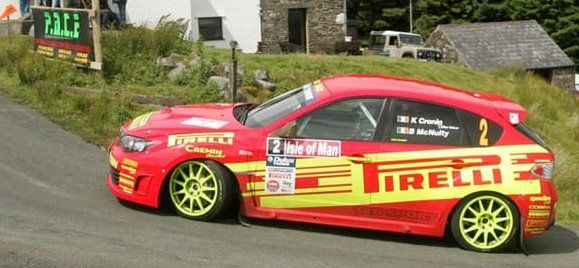
The Impreza N15 reflecting the Manx winning 2010 car was produced by Realcarmodels (Keith also won the Bulldog in 2010).

2011
The 2011 Dulux Trade MSA British Rally Championship was the 53rd season of the British Rally Championship and the 2nd year of a 2 year deal Dulux had signed. The addition of the Rally Sunseeker International to the calendar (a much needed and appreciated event in southern half of England) was due to bring the number of events to seven however the Isle of Man event was cancelled later in the year, reducing the season to 6 events again. The season began on 26 February in Bournemouth and ended on 24 September in Yorkshire. The Evo IX R4 was again going to prove stiff competition in the BRC, however Keith Cronin was unable to rally in 2011 (finanical reasons?) and so would not be defending his crown. So we would have a new champion come the end of the year.
Round 1 was the Sunseeker and I will forever regret not getting to see a Sunseeker BRC event before the championship organisers cruely cancelled one a few years later and it has not returned since. David Bogie took the honours in the first round in his Evo IX, with Tom Cave 2nd in his evo X and Elfyn Evans (who, like many before, demonstrated the BRC can be a great feeder ground for the WRC) 3rd in his Subaru Impreza STi N15. Round 2 was the Bulldog and Evans won his home event ahead of Bogie and Adam Gould his his Impreza STi N15. It was the Pirelli next and Bogies took his 2nd win of the season, ahead of Robert Barrable and Jonny Greer in their Skoda Fabia S2000's. Evans could only manage 4th. Up to Scotland for round 4 (the Jim Clark) and Bogies took his 3rd win in 4 events to put himself in a commanding position. Jonny Greer was 2nd, Adam Gould 3rd and Evans 4th for a 2nd event in a row. Across the sea to Northern Ireland next for the Ulster, and with a host of WRC machinery and other local drivers it was perhaps not that surprising that the highest BRC finisher was down in 6th place. What was surprising for many was the fact that it was one of the new wave of R3 cars, which would play a significant role from 2012 onwards, Marty McCormack in his Citroen DS3 R3T. 2nd (8th overall) was Tommy Boyle in his Renault Clio R3 and Bogie was 9th/3rd. Greer and Evans took 4th and 5th in the BRC competitors. The final event of the season was the Yorkshire and Bogie had a commanding 14 point lead over Evans. Taking a cautious approach and finishing safely in 3rd place, 2 mins behind the event winner which was Evans, with Greer 2nd, meant that David Brogie piloted his car to his first and only BRC Championship. This is a Realcarmodels model of his Sunseeker Rally car – an event I am fond of but which is sadly no more as a result of last years MSA decision to suspend the championship for 2015. David also won the Pirelli and Jim Clark in 2011.
2011 Sunseeker
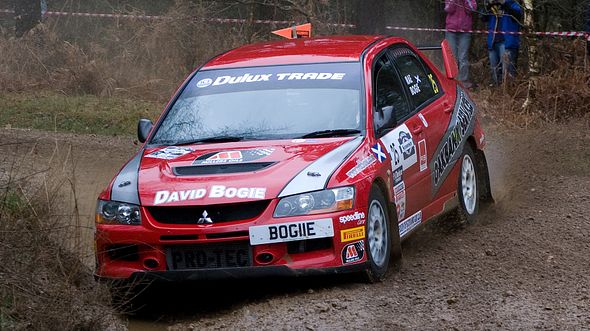

2012
In an effort to reduce costs and to increase competition, the eligibility rules changed again for 2012, and small front wheel drive hatchbacks became the order of the day. You can understand the intent, as the international class systems were now fully in force and this opened up rivalry further down the results for cars complying with the R2 rules. It also renewed interest in the BRC from manufacturers notably from France with Renault using BRC events for testing new evolution versions of their cars. But the change wasn’t to prove entirely successful.
This time it was Bogie who announced he would not be defending his BRC title, choosing instead to focus on the Scottish Rally Championship. But Cronin would be back again, and would need to change ride again to comply with the new regulations. The Sunseeker kicked off the 6 round year again, and Cronin appeared in the diminutive Renault Twingo RS R1 (model in progress) but retired on stage 10 with driveshaft issues. Instead, victory went to Mark Donnelly in his Renault Clio R3, 2nd was Desi Henry in his Citroen DS3 R3T and 3rd with Elfyn Evans in his Ford Fiesta R2. The Bulldog was round 2 and the top 3 were all in Citroen DS3 R3T's, including now, Keith Cronin. The top 3 in round 2 were Tom Cave, Cronin and Jarkko Nikara. Round 3 was the Pirelli, and Cronin was now getting in to his stride and took top honours, with Nikara 2nd and Donnelly 3rd. The Jim Clark was round 4 and Cronin took his first back to back win of the season, ahead of Cave and Jonny Greer's DS3 R3T. It was 3 on the spin for Cronin as he headed back over the sea for the Ulster, Evans was an excellent 2nd in his R2 and Osian Pryce rocked up in 3rd in his DS3 R3T. A measured drive in the season finale, the International Rally Yorkshire would see Cronin crowned champion for a 3rd time in 3 attempts, and so it proved. Cronin was 3rd behind Tom Cave and Osian Pryce but headed the championship leaderboard when it came to giving out awards by finishing 8 points ahead of Tom Cave, with Pryce 3rd and Evans 4th.
2012 Sunseeker
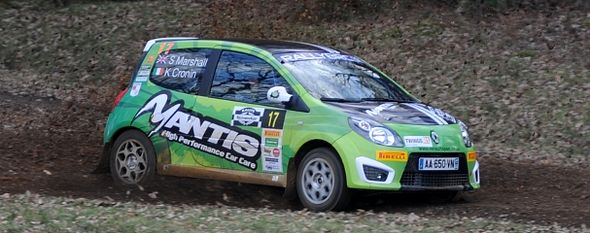
2012 Todds Leap Ulster
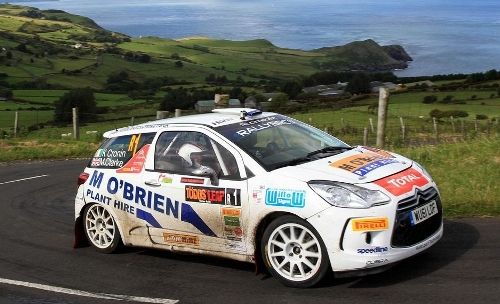
This is an IXO base with homemade decals decals representing the Todds Leap winning car from 2012 (Keith also won the Pirelli and Jim Clark events).
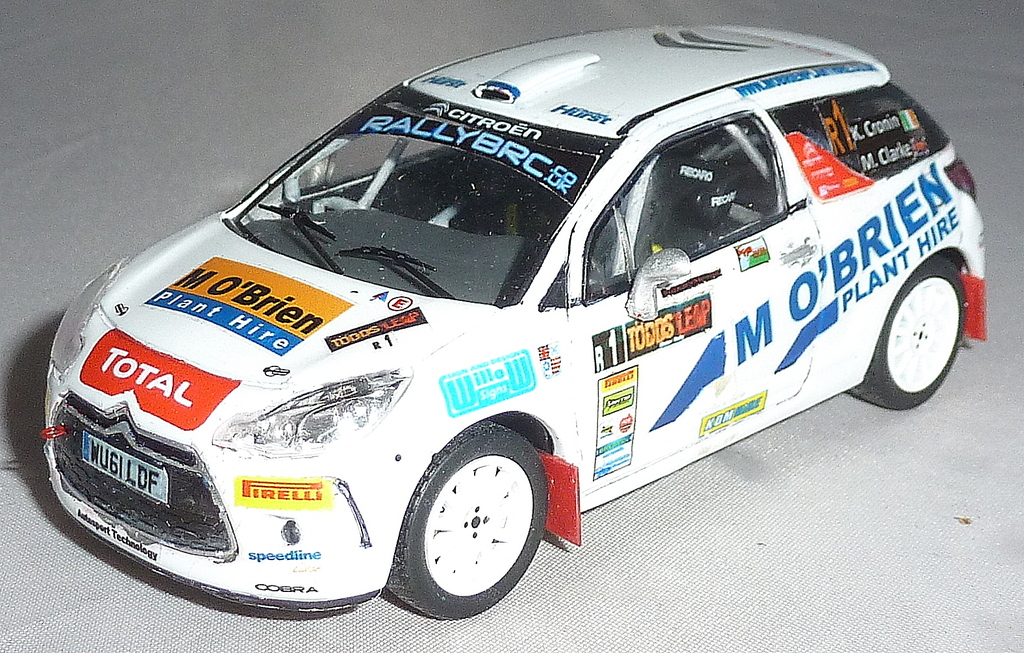
2013
Having proved beyond doubt that he could hold his own in the BRC, Keith moved on to a fresh challenge for 2012, so a new champion would be crowned. Evans also moved on to take part in the JWRC and promptly won it in his Fiesta R2, proving his class.
7 events would make up the championship, but the order had been shuffled and the Sunseeker would now be the season finale. The opening event, the Rally of North Wales was unfortunately cancelled due to icy conditions, so it would be back to 6 events again. So the Pirelli (now the Pirelli Richard Burns Foundation International Rally) was won by Jukka Korhonen is his Citroen DS3 R3T. Alastair Fisher was 2nd and Tom Cave 3rd in identical cars. The next round was the Jim Clark and Korhonen won his 2nd on the bounce, Tom Cave improved to 2nd and Osian Pryce 3rd in his DS3 R3T. Alastair Fisher won the Scottish round next, with Korhonen and Cave close behind. Pryce, Korhonen and Donnelly took the podium at the Todds Leap Ulster and Pryce Korhonen and Fisher took the podium at the Yorkshire. Korhonen had a health lead going in to the season finale the Sunseeker, and it proved enough, as he took 3rd place behind Pryce and Cave and beat them both by 100 points to 92 in the title race. A well deserved victory for Korhonen but with the podium in all 3 rounds being filled with Citroen DS3 R3T drivers, the absence of the spectable of a varied entry field made this year somewhat bland to many observers.
2013 Jim Clark
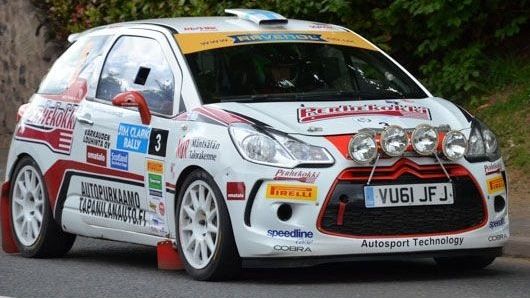
This is an IXO base with homemade decals representing the Jim Clark winning car from 2013 although Jukka also won the season opening Pirelli.

2014
Sourced from thecheckeredflag.co.uk
In the MSA British Rally Championship’s distinguished 56 year history, it’s hard to recall a year that’s been as tough, dramatic and unfortunately as sad as 2014, a year in which the championship made the national news headlines for all the wrong reasons.
That coverage came on a dark day at the Jim Clark Rally in May, the second event of an already turbulent season for the UK’s premier rally series, when two incidents on the same day claimed the lives of three spectators and injured six others.
The most serious incident saw a front-running DS3 leave the road and fatally strike a group of spectators. Naturally the event, the only closed-road rally in the mainland UK, was cancelled with immediate effect, with the incidents later leading to a review of motorsport safety in Scotland.
With the championship reeling from those events, there was further tragedy three months later on the Ulster Rally when rising young talent Timothy Cathcart passed away following an incident on the Northern Irish event, leaving the sport in mourning.
It proved to be a difficult year throughout for the championship, with a lack of entries plaguing the series. It was particularly a problem in the headline R3 class where only two drivers competed in all five events, leading to the British motorsport’s governing body the MSA to make some radical decisions on the BRC’s future.
They elected to run the BRC in-house from 2016 after being unhappy with the tender process to find a new promoter, ending UK Rally’s nine year run in charge of the championship, and with it made the decision for the series to take a one-year sabbatical in 2015 to allow consultation on its future.
That decision, made in June, led to the cancellation of the season-ending Rallye Dorset (re-branded from Rallye Sunseeker), with the event organisers citing financial implications caused by an uncertain future for the championship and therefore their event.
That was the second event of the year not to run after the original season opener, Rally North Wales, was forced to be postponed for the second year running, this time due to a lack of entries across the event.
While there were sadly plenty of unfortunate stories surrounding the championship this year, there was still the small matter of adding a new name to the prestigious roll call of BRC champions that includes Colin McRae, Richard Burns, Malcolm Wilson and Ari Vatanen.
Daniel McKenna and Osian Pryce headed into the season hotly tipped for success after taking the RallyTwo class title and overall vice-champion’s honours in 2013 respectively, and they certainly rose to their billing as they played out a fierce championship duel.
Pryce got off a perfect start with victory on the Pirelli Carlisle RB Foundation Rally, his fourth consecutive BRC win after his superb end to the previous campaign, before McKenna hit back on the Jim Clark with his maiden BRC success.
McKenna followed that up with a victory on the RSAC Scottish Rally that proved decisive after Pryce retired with gearbox problems. A third consecutive win on the Ulster, with Pryce in close pursuit, meant the Irishman’s advantage sat at 22 points heading into the double header Isle of Man finale.
It looked like the Pirelli Star Driver might have thrown away his chances of success with a dramatic roll towards the end of the opening points-scoring round, but a great turnaround by the DGM Sport team saw him back out for the final action.
That meant that when Pryce, who took maximum points in the penultimate event, suffered a bent suspension on the final day McKenna and co-driver Arthur Kierans secured the title by eleven points, with Pryce and Dale Furniss left to settle for second.
The sparse entry for the headline R3 class meant that despite missing half the year, Callum Black was the next best R3 competitor. Another to compete in a DS3, Black secured third on the Jim Clark and a career-best BRC finish of second in Scotland before departing from the action.
Finishing an impressive third overall in the championship as the R2 class champion was Calvin Beattie, after he enjoyed a close battle with fellow Irishman Dean Raftery throughout the campaign in their respective Ford Fiesta R2’s.
The class title was initially awarded to Raftery, though with points awarded erroneously to him an amended classification gave Beattie the crown. It was a retirement in the penultimate round that ultimately cost Raftery, who had taken four class wins to Beattie’s two.
Splitting them in the final standings was Gus Greensmith. Campaigning a Ford Fiesta R1, Greensmith overcame early competition from Chris Wheeler and Harry Threlfall to secure the British Junior Rally Championship with five class wins in the six rounds.
At the front, Citroen’s monopoly of the R3 class led to a comprehensive, almost unopposed victory in the BRC Constructors Championship over Ford (M-Sport). There was some input from other marques, with appearances for Renault, Peugeot and Abarth.
Garry Pearson competed in a new Peugeot 208 R2 in the first half of the year, Renault trialled their new Clio R3 model in Scotland with 2013 BRC champion Jukka Korhonen and Abarth made an appearance on the Jim Clark with 500’s for former BRC champion Jonny Milner and Georgia Shiels.
For McKenna, Pryce, Raftery and Greensmith meanwhile, their successes earnt them a free entry onto the World Rally Championship season finale Wales Rally GB as part of the championship’s ‘Road to Wales’ campaign.
McKenna saw mechanical problems hamper his event and lead to a retirement, Pryce starred in a Ford Fiesta R5 taking 18th overall, and Raftery and Greensmith finished secured second and third respectively in class RC4 in Fiesta R2’s.
2014 Manx
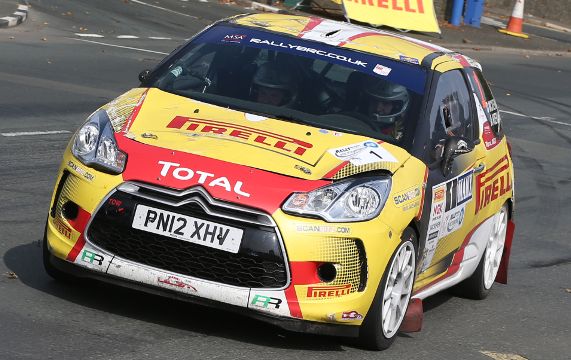
This is an IXO base with homemade decals representing the Manx winning car. Daniel also won he Jim Clark and Scotland events.

2015
No British Rally Championship for 2015, the first time in its history dating all the way back to 1958 that it has not taken place for reasons within its own control. Everyone was keeping their fingers crossed that the people at the MSA came up with a format that would bring this Championship back to its former glory and justify its suspension this year and the loss of the Sunseeker.
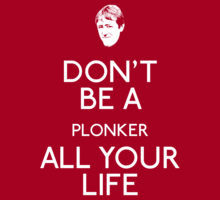
2016
sourced from britishrallychampionship.co.uk
After a year’s sabbatical, the MSA British Rally Championship provided high-octane action across the seven-round series. There was an electric atmosphere before the curtain-raiser, the Mid Wales Stages. Over 40 crews in pristine new overalls converged for a ‘Class of 2016’ photoshoot. Scanning the four rows, it was evident that Britain’s premier rallying series was back, healthier and stronger than ever with a quality array of drivers and co-drivers all eager to get stuck into the new championship formula – and to start, the opening stages of the new season would be held in fever-pitch darkness. The season included the twist of a joker card which participants could nominate ahead of a rally and score extra points from. Something for the purests to frown at but in theory it gave the chance for someone to steal the title from left field. Leading the crews away were WRC stars Elfyn Evans/Craig Parry, driving a Ford Fiesta R5 for the DMACK BRC Team. Behind the Welsh duo were another 22 R5/S2000-specification machines all jostling for supremacy on the snow-lined gravel stages. On home soil, Evans and Parry showed their class on the first stage, immediately pulling out a lead of 18.2 seconds. Many expected Elfyn to pull away and romp home by a comfortable margin. They were wrong. Up stepped Swedish star Fredrik Ahlin in a Pirelli-shod CA1 Sport Fiesta R5. The Swede went into the second day sure that he could win the opening round with Morton Erik Abrahamsen calling the notes. A pumped-up Ahlin showed the homegrown hero the way to go on the opening two stages of the second day and by stage four had grasped the lead. Evans retaliated, demonstrated his world-class pedigree to overhaul his adversary and win the opening round of the series by just 17.1 seconds. Tom Cave in his Spencer Sport Michelin Fiesta R5 made it three different tyre manufacturers side the top three. With the experienced James Morgan alongside, the young Welshman gained in confidence with every stage to put himself in a comfortable third. Rounding out the top five were 2011 BRC Champion David Bogie/Kevin Rae in their newly-acquired Skoda Fabia R5 and fellow Scottish stars Euan Thorburn/Paul Beaton, who showed the promise of the Peugeot 208 T16 R5.
Heading across the Irish Sea, the BRC crews next faced the iconic Circuit of Ireland. The first Tarmac event of the year would see Evans fly out-of-the-blocks, leading the event outright after the opening two stages. Disaster struck the championship leader on stage three, however, when the auxiliary belt cried enough. Desi Henry/Liam Moynihan looked set to inherit the BRC lead on the Belfast-based event but they too had to retire on the same stage. Stepping into the breach were Marty McCormack/David Moynihan in their Skoda Fabia S2000 and Ahlin in his Fiesta, who entered a ding-dong battle throughout the first day. Ahlin was primed to lead the event going into the overnight halt, but a slippery hairpin on the Newtownards street stage caught the Swede out as he clouted the left-rear of the Fiesta into a curb, limping the car to the finish. Fredrik made roadside repairs to get the car back to service, only losing 23 seconds in the process. A subsequent pacenote error saw Ahlin crash out of the event and the lead of the rally. Leading the field away on the second day, McCormack knew his S2000-spec Skoda would be challenged by the newer R5 cars, especially in the drying conditions with Josh Moffett/John Rowan pressing on in their Ford Fiesta R5. Moffett gained time on the opening two stages before leader McCormack came to a grinding halt with a faulty fuel pump. As the final loop began, Moffett established a comfortable gap ahead of Jonathan Greer/Kirsty Riddick, who had enjoyed an uneventful rally, steering clear of trouble to take their first podium of the season, while Bogie was rewarded with third after an incident-filled weekend. Tom Cave had a troubled run on the Irish Tarmac but made the best of the bad situation to just miss a podium in fourth, while on their first Tarmac rally, Jamie Anderson/Ross Whittock (Ford Fiesta R5) took an incredible fifth in front of young chargers Rhys Yates/Tom Woodburn in a similar Fiesta R5.
Kielder Forest provided the backdrop for round three, the Pirelli Carlisle Rally. Returning to take on the BRC regulars was former BRC round winner Matthew Wilson in an M-Sport Fiesta. Evans was once again the man to beat, but a puncture on stage three shuffled the Welshman down the order. Ahlin had shown his gravel prowess in mid Wales and seized the opportunity to take his first BRC win on the Pirelli, making him the third different driver in as many events to claim the top spot and the first Swedish driver since 1995 to win a round. In his one off appearance, Wilson took a fine second as Evans climbed up the results sheet to round out the podium. Crucially, Ahlin left Cumbria with the championship lead heading to Scotland. Cave notched up another fourth place, while McCormack took his first finish of the year, hustling his Kumho-supported S2000 Skoda into fifth.
Fired-up after missing the Pirelli Carlisle win, Evans showed why he is worthy of a WRC factory seat by leading from start-to-finish on the Scottish Rally. It was to be a drama-fuelled affair behind the DMACK ace, with four drivers vying for the remaining rostrum positions. Ahlin was amongst them until a driveshaft let go on stage three, sidelining the Swedish sensation. Cave had been chalking up several solid results and – now feeling comfortable in his Fiesta – started to show he was the best-of-the-rest behind the on-form Evans. The Spencer Sport star ended the one-day fast-and-furious sprint in a comfortable second. Bogie had held the spot and was due to take his best finish of the season until he stopped on the road section heading to the finish with a damaged radiator. With Scottish hopes extinguished, Desi Henry took his first podium of the year.
The Nicky Grist Stages provided an exciting challenge for teams, with the first day on gravel and the second on the famous Tarmac Epynt roads. Cave led the early charge, capturing the first stage win ahead of Bogie and Ahlin. A spin on the opening test for Evans saw him languish in fourth momentarily, before a fightback on the second and a stunning time on the third elevated him into the rally lead, with Cave hanging onto his coat tails throughout the event. Making an early charge was Jamie Anderson, who ran as high as third on the opening day in his Fiesta R5 – enjoying a scrap with Henry and Greer along the way. Matt Edwards had shown some giant-killing exploits in BRC2 on the opening four rounds, and on the Nicky Grist Stages, all the Mitsubishi Evo 9 driver had to do was finish to be crowned champion – a feat he achieved alongside navigator Will Rogers. At the front of the field on the second day, Evans and Cave were comfortable out front with Henry in third as the trio replicated the Scottish Rally podium at the finish in Builth Wells. Drama was to unfold behind, however, as Anderson dropped from a fine fourth to an eventual eighth, allowing Bogie, Moffett, Greer and Yates to move ahead of him on the timesheets.
The penultimate round was to see a champions’ drive from Evans and Parry on the lanes around Derry/Londonderry. To claim the title on the Ulster Rally, the Welsh pair had to win the event, an achievement they completed in fine style as they led from start-to-finish, but it wasn’t to be plain sailing for the WRC2 crew as they were pushed hard by triple BRC Champion Keith Cronin and co-driver Mikie Galvin in their Citroen DS3 R5. The Irish pair had not been seen in the BRC since their early exit on the Circuit of Ireland and they were out to make amends. Nestling into third was Cronin’s DGM stablemate Greer, who used his Irish Tarmac knowledge to build a cushion ahead of Bogie. Eventual BRC Champion Evans and eventual Irish Champion Cronin were separated by a mere 4.5 seconds at the end of the first day, but problems struck the latter at the lunchtime service on day two. Gearbox and differential gremlins had worked their way into the DS3 R5, meaning Cronin had to leave service late with a stack of penalties. Fighting his way back, the Irishman recovered to fourth on his return to the series while Greer and Bogie rounded out the rostrum – both claiming their second podium of the campaign.
The first season of the new-look BRC had its curtain call on the picturesque Isle of Man, with three days of titanic Tarmac action that captivated the island. Along with the regular BRC crews, the season finale saw two top-notch interlopers –Citroen WRC star Craig Breen and triple BRC Champion Mark Higgins. Breen unfortunately retired early on, but Higgins took the fight to Evans on the asphalt event. Elfyn set the initial pace, but driveshaft woes on the second night set up a tantalising showdown to the final day of the season with Higgins holding the upper hand. Evans had to work hard for his fifth win of the year, edging Manxman Higgins by just 5.9 seconds at the finish outside the famous TT Grandstand. With the title already decided, there was a five-way fight for the runner-up spot in the championship. Cave was the class of the group as he traded times with the top two throughout to put himself second on the BRC rostrum and second in the 2016 series. Enjoying a scrap with Cave throughout, Henry took his third podium of the season and his first on Tarmac. After sealing the BRC2 title, Matt Edwards graduated to an R5 Fiesta for the final two events. Following a solid run on the Ulster, Edwards looked at home in his new machine on the Manx lanes, climbing the order throughout the long event to take fourth in the BRC section ahead of Greer, Bogie and Alex Laffey and Andrew Roughead, who took their best finish of the season in eighth in their Fiesta R5.
The return of the BRC after the years sabattical and to be fair, my expectations were exceeded with lots of cars entering and lots of fabulous machinery, including the return of 4 wheel drive in the form of R5 machines.
Elfyn Evans (after losing his WRC seat) was the runaway winner, winning the Mid Wales, Scottish, Nicky Grist, Ulster and IOM events in his Dmack sponsored car.
2016 Ulster
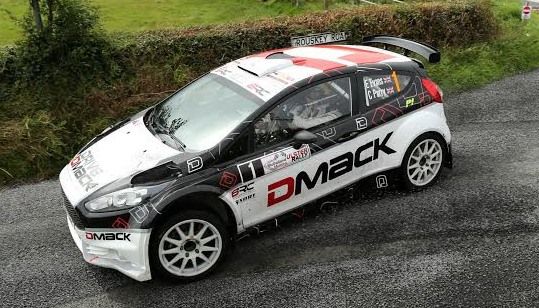
This is a redecaled IXO model of Evans Fiesta R5 Evo from the Ulster rally, using Rally Decals Shop and home made decals.
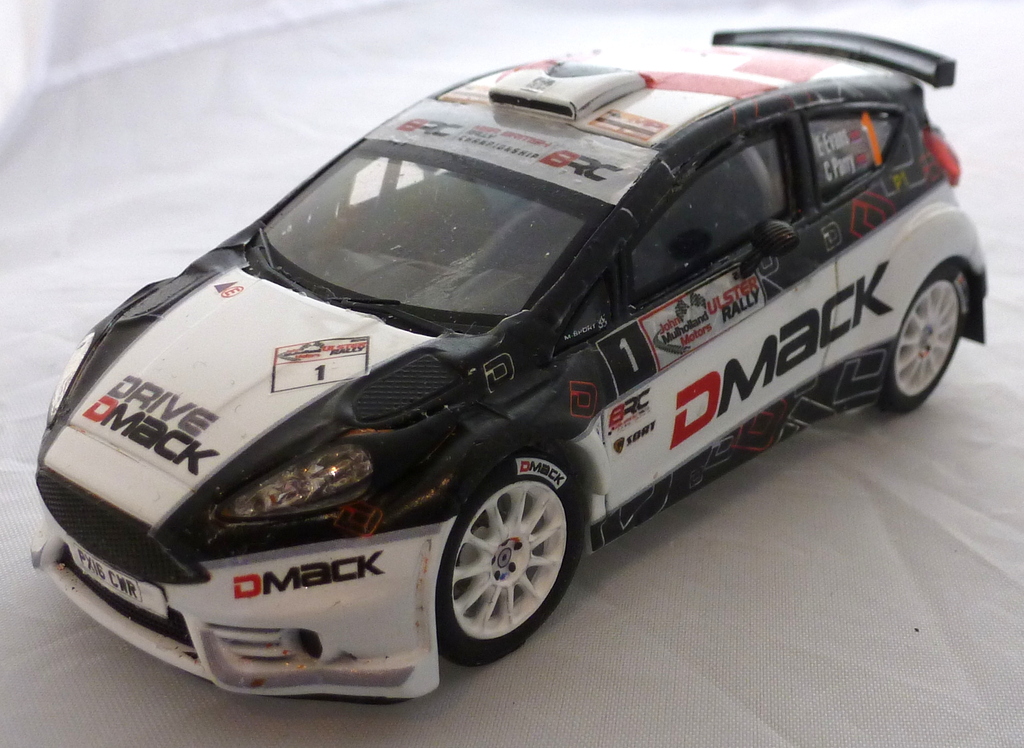
2017
Sourced from thecheckeredflag.co.uk
After Elfyn Evans made the move into the World Rally Championship for 2017, the Prestone MSA British Rally Championship saw both new and returning faces to the series with past champions, newcomers and returning drivers entering in 2017.
And it was just one point that separated the top two drivers in Britain’s premier rallying championship after seven events in six territories, with the series going down to the very last stage of the season. But after the many twists and turns throughout 2017, it was Keith Cronin who produced one of the most memorable championship comebacks in recent history to claim a fourth British Rally Championship in his first season after returning to the series.
After focusing on the Irish Tarmac championship in 2016 back in his homeland, Irishman Cronin announced his intensions for a tilt at the title by signing with one of the biggest teams in World rallying, M-Sport, to drive a latest-spec Ford Fiesta R5 in a full season campaign this year and despite a shaky start, the deal proved to be one that benefited him dearly.
Cronin’s main rival, Swede Fredrik Ahlin returned in 2017 after a debut season the previous year again driving for CA1 Sport but this year instead driving a Skoda Fabia R5 after completing 2016 in a Fiesta R5.
With Cronin and Ahlin two of the championship favourites before the first round, the Border Counties Rally, the BRC1 class also saw various returning drivers from 2016, with Matt Edwards, Tom Cave, Rhys Yates, former champion David Bogie and Martin McCormack just some of the drivers to re-enter ahead of 2017’s curtain raiser.
The Border Counties Rally was new to the series in 2017 after the cancellation of the Mid-Wales Stages and stepped in to host the opening round and didn’t disappoint. Ahlin took the victory in dominating fashion in the first gravel event of the year on round one and instantly showed his intentions for the rest of the season with Tom Cave and Osian Pryce rounding out the top three and to-be champion Cronin claiming fourth on his BRC debut for M-Sport in his Fiesta R5 Evo (which was upgraded to Evo 2 spec later in the season).
Round two took the crews into Cumbria and the traditional BRC event the Pirelli International Rally. Another gravel event suited Ahlin, but unlike on round one was made to work for his win after a close battle with 2016 Drive D-MACK Champion Osian Pryce. Pryce in a Spencer Sport-ran Fiesta would go on to claim second on this event, but this was only the start for the Welshman who would put in some fine performances across 2017.
Behind Pryce and Ahlin was Martin McCormack who was able to benefit from Cronin’s first retirement of the season after rolling out of the event. Another man to suffer bad luck in Kielder was Tom Cave who had switched to a Hyundai i20 R5 only for the new car to suffer suspension problems at the beginning of day two as well as David Bogie in a sister-CA1 car to Ahlin; the Scot did however manage to salvage fourth overall after brake issues on day one.
A return to Scotland and the RSCA Scottish Rally was round three in 2017, with championship leader Ahlin aiming to make it a hat trick of wins in the first three events of the season, but hometown here Bogie had other ideas.
The man who comes from town where the rally was based, Dumfries in the Scottish Borders, had a ding-dong battle with his teammate throughout the whole of the event with the pair separated by just 0.1 of a second with one stage remaining on Saturday afternoon and it was Bogie who would go on to claim the victory.
On the last stage, the Ahlin hit a rock that managed to get wedged into the radiator of his Fabia subsequently bursting it and putting him out of the rally and earning him no points. Osian Pryce therefore took the runners up spot ahead of McCormack with Cronin again finishing fourth for the second time in three events.
June saw the BRC head oversees for the first time in its history and be part of the Ypres Rally in Belgium and was the beginning of Cronin’s championship push. The former champion was on his favoured tarmac surface for the first time this season and made sure to take full advantage.
As Cronin dominated at the front, both Ahlin and Bogie who were at the sharp end of the championship standings would suffer big accidents. Bogie in particular would suffer deeply and would not return to the BRC for the remainder of 2017 after substantial damage to the Fabia R5, while Ahlin’s title push suffered a hit for the second round in succession. The Swede was however able to recover to finish sixth in the BRC1 class and earn crucial championship points.
With Ahlin in trouble and Bogie out, Matt Edwards, who was constantly improving throughout 2017 and Pryce were the drivers who were able to take advantage and claim the remaining podium places in Belgium.
After the trip abroad and ahead of the next round of the championship, the Nicky Grist Stages, a battle between Ahlin and Pryce seemed to be forming, with Cronin still behind in the standings.
Pryce was seemingly on the verge of winning his home event when heartbreak struck the Welsh driver as the fuel pump failed on the Fiesta, forcing him to retire and earn no points in his battle for the championship.
As Pryce’s dream win fell by the wayside, Ahlin could take full advantage and claim another victory, his third of the season, on the only mixed surface event of the year. Behind him finished Edwards, on the podium for the second event in succession and Rhys Yates who earned his first appearance in the top three in Wales. Cronin again suffered problems on a gravel event, and went off the road and would score no points.
After visiting Scotland, England, Wales and Belgium, the BRC then made the trip to Ireland for the Ulster Rally where the champion to be Cronin was in unstoppable form. His home event saw him dominate amongst the BRC runners during a weekend with extra competition from the Ireland Tarmac Championship and drivers including Sam and Josh Moffett.
Cronin made the most of his previous experience on Irish tarmac and claimed the win ahead of rival Ahlin with Marty McCormack the man taking third. Pryce in the Spencer Sport Fiesta suffered yet another fuel pump issue and again retired leaving him all but mathematically out of the title race.
The Welshman announced days later he was not to take part in the BRC finale on the Isle of Man in a bid to save budget ahead of him coming back for another title challenge in 2018.
With the double header on the Isle of Man the final stop in the record breaking 2017 BRC season, the title race was down to three drivers; championship leader Ahlin, the comeback king Cronin and the ever-consistent Edwards.
With Pryce not competing in the final event, M-Sport in a bid to earn championship points in the teams championship, asked Edwards to be their nominated driver alongside Cronin and Alex Laffey and the move would pay dividends as they went on to claim the title by 24 points over rival squad CA1 Sport.
The Isle of Man event used a double header format, meaning it was all to play for the three drivers still in with a chance of claiming the top prize.
Cronin who had to win both events, started in perfect fashion, claiming the leg one victory at the end of day two ahead of Edwards, who had needed to win to stay in the championship hunt and Ahlin who took third.
So with one leg left, it was between championship leader Ahlin and Cronin who was on a mission to complete the ultimate series comeback and by the end of leg two, the Irish driver had done just that by claiming the victory in the final round of the season.
Cronin showed his strength on tarmac and won the championship by a sole point ahead of Ahlin in turn thanks to Edwards who had again snatched crucial points away from the Swede after finishing second on leg two on the Isle of Man, incredibly finishing just 0.1 seconds behind Cronin.
The Prestone Motorsport News BRC Junior class had a similar ding-dong battle throughout 2017, with Callum Devine going toe-to-toe with William Creighton throughout the entire season.
The pair battled at the front of the timesheets across all seven rounds, with Devine ultimately taking the title as the championship as like in BRC1 went down to the wire.
Over the course of the seven rounds, five different winners were on the top step of the podium, with Devine proving his ability on the way to winning the £30,000 cash prize by taking three victories along with Creighton, Oscar Solberg who took the first win of the season, Cameron Davies and Marty Gallagher also taking maximum scores at points throughout the year.
After beginning the season in a Ford Fiesta R2T, a change of car to an Opel Adam R2 before the Ypres Rally proved a masterstroke Devine and he went on to win both the Belgian event and the following Nicky Grist Stages as he went on to win three out of the final rounds of the year.
Consistency was key to runner up Creighton as he was always within the top four across the year in his Peugeot 208 R2, but the Irishman could not cope with the pace from Devine as he claimed the title. Third at the end of the season went to Solberg with Creighton taking fourth.
The BRC Cadet class, open to older specification R2 cars saw Josh Cornwell dominate all season with a near-perfect record. The youngster wrapped up the title with a round to spare ahead of Tom Williams and Alex Waterman, with Cornwell only dropping points on the Nicky Grist Stages, while the BRC4 class saw two season entries with David White in a Ford Fiesta R2 beating BMX world champion Gee Atherton by 50 points; Atherton having to miss several events during the season due to a large biking accident
2017 Border Counties
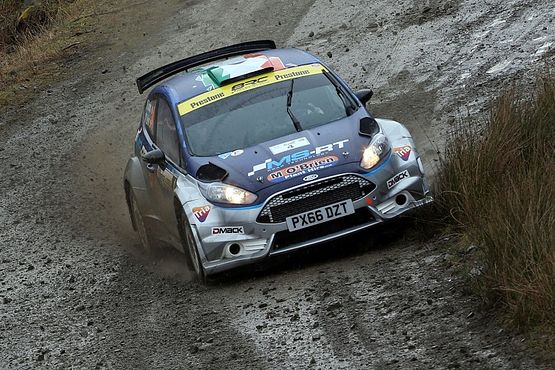
2017 Ypres
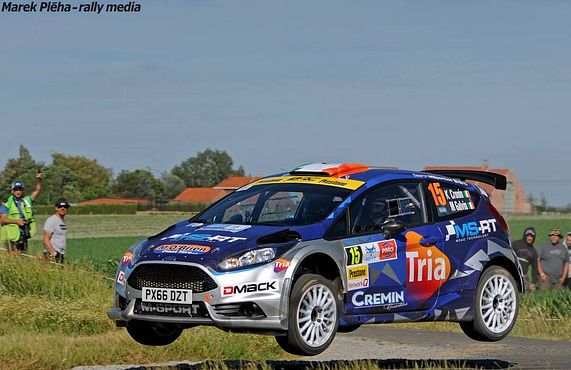
These 2 models by Piotr at Modele Sklep represent the Evo car from the Border Counties and the Evo 2 Ypres winner.

2018
sourced from britishrallychampionship.co.uk
The Prestone MSA British Rally Championship celebrated its Diamond Jubilee in 2018 and despite a challenging season with two rounds being cancelled, Britain’s premier rallying series still managed to produce exciting edge-of-the-seat action once again in its 60th anniversary season.
With the Border Counties Rally called off due to the extreme weather provided by the ‘Beast from the East’, the championship curtain raiser was be held on the fast and furious stages of the Kielder Forest complex for the Pirelli International Rally. Defending champion’s Keith Cronin and Mikie Galvin harnessed the latest Hyundai i20 R5 and picked up where they left off from 2017 by punching in the fastest time on the event – getting up to speed in the Michelin-supported machine straight away. Young-gun Rhys Yates and Elliott Edmondson also had a brand new weapon at their disposal with a Skoda Fabia R5 their championship mount for the new season as they slipped in just behind Cronin with fellow Fabia crew Marty McCormack and David Moynihan also showing early promising. Tipped for success was David Bogie and John Rowan in their Skoda Fabia R5, but a uncharacteristic roll from the Scottish driver left him on the side lines very early on. Matt Edwards and Darren Garrod came close to their first win on the 2017 championship finale and were eager to break their victory duck on the Cumbrian gravel. Leading the M-Sport line-up for 2018, the Pirelli-backed pair stepped-up to the plate and on stage three pushed their way to the front of the order and didn’t look back. Edwards kept pulling away, and after the one-day opening round shoot-out, the Swift-supported driver took his first International rally win by 20.5 seconds. Cronin was set to take a strong second place before heading to a triple header of Tarmac rounds but the Irish driver was piped to the post on the final stage by an on form Rhys Yates who sealed his best ever BRC result with second. Marty McCormack was in the podium hunt until gearbox gremlins prevented further progress but a solid fourth in the Kumho Skoda got his challenge underway, while Jonathan Greer and Kirsty Riddick were trying out a Ford Fiesta R5 and were pleased with fifth as he gained important mileage under the belt. Edwards’ teammates Alex Laffey and Patrick Walsh were sixth ahead of BRC debutant Lawrence Whyte and co-driver Stuart Loudon, BRC wildcard Thomas Preston and Max Freeman. Sacha Kakad and James Aldridge also made their BRC bow and picked up their first points in their maiden R5 drive together.
With the dust settling from the Pirelli – the BRC went into Europe for the legendary Ypres Rally. Mixing it with some of the best drivers in the world including Thierry Neuville, the plucky BRC crews entered the Flanders region in the search of vital championship points on the first tarmac event of the year. As predicted by many, last year’s BRC Ypres winner Keith Cronin dominated the early proceedings. Leading going into the second day, the Irishman just had to tick off the stages, but a lapse in concentration on stage 10 dropped Cronin into the clutches of his rivals and an off into a field made the Hyundai driver’s heart beat that little bit faster.
Championship leader Edwards was having a nightmare in Ypres. Gremlins had worked their way into the Fiesta R5’s electronics, thus not allowing Edwards to extract the maximum from the M-Sport machine. Along with power-steering failure, the Welsh driver had it all to do on the final day. With his never-say-die approach, Edwards kept fighting and clawed his way up to second, just behind Cronin with a handful of stages left. Ypres crowd favourite Marty McCormack was having his strongest showing of the year in second but a puncture followed by an off put paid to his weekend on the second day, denying the likeable Northern Irishman what would have been his best BRC result. With the rally entering its final stages, disaster struck for Cronin as a last stage puncture dropped the leader down to third allowing Edwards to pounce and seal his first win on Tarmac. David Bogie was out to finish after his opening round disappointment and was pleased to pick up a strong second to get his championship tilt underway. Rhys Yates was the man everybody was watching in Belgium with locals tipping the Englishman for greatness in the ditch-cutting lanes. After winning Rally van Wervik – a useful Ypres warm-up event, Yates put himself into the BRC mix. Trying too hard on the opening day saw the Skoda driver visit a field before retiring early on the second day with co-driver Elliott Edmondson not well enough to continue. Alex Laffey recorded his best ever BRC finish in fourth while James Williams rounded out the top five and with it the Junior BRC win and first front-wheel-drive car home on the event.
From the sun-kissed Belgian roads to the bumpy, demanding, wet Ulster lanes. The trip across the Irish Sea is always a favourite amongst the competitors with its unique roads and weather conditions proving an important leg in the championship race. With 2017 winner Keith Cronin absent from the billing this year, a new name would take to the top step in Northern Ireland. Rhys Yates drew first blood as he hoped to make up for a disappointing weekend in Ypres. Following him on the timesheets was local star Jonny Greer who put his Fiesta into second. Unfortunately for Greer, a rare off put him out of the event, denying the fans a home winner. Another local star Marty McCormack also knocked on the door of a podium but McCormack called time on the final morning after several excursions in his Skoda Fabia R5. With the local challenge halted, this left a three way fight for supremacy with Matt Edwards and David Bogie eyeing the top spot, held by Rhys Yates. Yates was a man on a mission – chasing his first BRC win. A late wrong tyre choice, puncture and a few hairy moments saw him haemorrhage time but still manage to cling onto the final rostrum position. David Bogie had been waiting and watching as he honed the set-up on his Skoda Fabia R5. Growing in confidence with every stage mile, the Scot punched in some fastest stage times to take back-to-back second places to move into second in the series. The man of the moment shone again. Matt Edwards wrestled the lead off Rhys Yates on stage seven and didn’t look back as he completed a clean sweep of BRC victories – giving him a strong grip on the championship heading to his home event.
With Rally Isle of Man deciding to cancel the event at the last minute, the focus quickly switched to Wales Rally GB for two tough and demanding rounds, with the BRC sharing the iconic forestry stages with the globetrotting FIA World Rally Championship. The opening round of the weekend was the opening special stage at Tir Prince on the Thursday evening before a flat-out day in the forests on Friday. Yates was king of the ring on the opening night before the Flying Scotsman, David Bogie lit up the forests with his pace – putting many in WRC2 behind him. No other BRC driver had an answer for Bogie as he dominated the opposition in his DMACK-supported Fabia on his way to his first BRC win of the season. Yates, try as he may, couldn’t live with Bogie on the opening leg and settled for second. Despite Bogie winning the battle, it was to be Edwards’ war as the Welshman took it cautiously through the opening round in the Pirelli-backed Fiesta and finished third to secure his first BRC title in front of his family and home fans. Alex Laffey had another quiet affair as he built his speed. Another fourth place was a strong result and with consistency, this kept him in with mathematical chance of a top three in the series standings.
Onto the final round of the series and the gloves were off. With the title decided it was going to be a three-way fight. Edwards wanted a win to round out the year, Bogie wanted the Wales double and Yates was searching for his first win. Yates was the first to fall foul of the demanding Welsh stages as the English driver retired early on, leaving the door opening to a two-horse race. Bogie and Edwards, meanwhile, went hammer and tongs across the mid Wales stages on Saturday with Champion elect Edwards trailing by 34 seconds. On the final day, Bogie tried that little but too hard as the Dumfries driver searched for an overall top 12 result on the WRC event as well as the BRC win. Bogie went off on stage 20, thus handing the lead and win to Edwards. The Welsh driver as sealed his championship in style by powering his Fiesta through the Llandudno street stage and Gwydir forest in fine fashion. Alex Laffey took his first gravel stage win on Wales Rally GB and his best ever result as he notched up second on the rally to Matt Edwards and second in the standings – making it a dream season for M-Sport. Norwegian Steve Rokland rounded out the main BRC podium with a fine drive in his Peugeot 208 R2 on his way to the Junior BRC title.
2018 Ulster
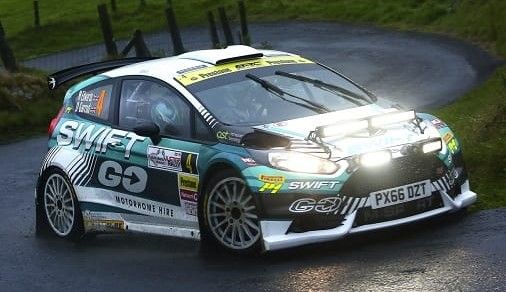
This is a Realcarmodels from Hungary model of the Ulster event winning car.
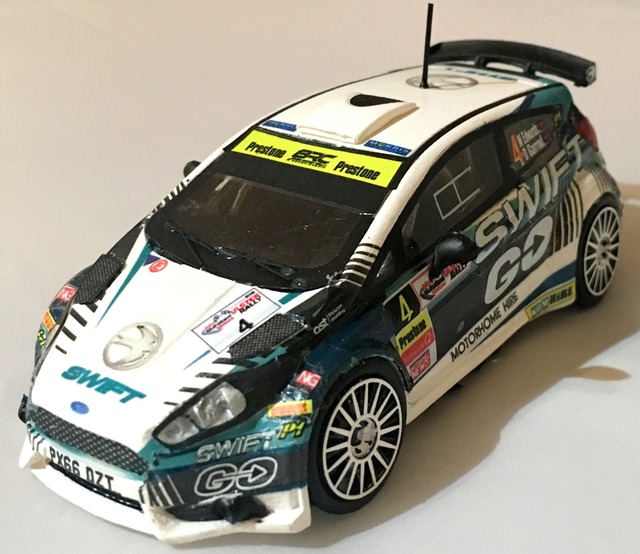
2019
The 2019 6 round season started off in great fashion for defending champion, Matt Edwards. Victory on the Cambrian rally in his Ford Fiesta R5 Evo 2, ahead of David Bogie and Marty McCormack in their Fabia R5's was just what he had wanted. Round 2 was to a new location in West Cork. Craig Breen headed Alastair Fisher in their Fiesta R5 Evo 2's, however as neither were involved in the series, top BRC points went to Tom Cave in his Hyundai i20 R5. Edwards was 4th, and Josh Moffett in 7th picked up the final BRC podium spot. The Pirelli was round 3, and Tom Cave won it for his 2nd win in a row. Rhys Yates in his Skoda R5 took 2nd, and David Bogie in 4th took the 3rd podium step in the BRC. Disaster struck for Matt Edwards, as on stage three the M-Sport driver suffered two punctures on the rough, demanding stages. Struggling on, the duo attempted to nurse the car on the road section back to service, but in the process they were in breach of the regulations and thus were struck from the overall results. It was across the channel next for the Ypres round. The 4 of the top 5 spots were taken by VW Polo GTI R5 drivers, headed by Craig Green, and split by the Skoda R5 of Freddy Loix in 4th. First BRC car home was Edwards in 6th, then Cave in 7th and Alex Laffey in his Fiesta R5 in 9th. Round 5 was also outside of mainland UK, and it was the Ulster. Craig Breen continued to demonstrate why he had had chances in the WRC by winning the event, but only by 20 seconds from Edwards. Josh McErlean in his Peugeot 208 R2 took a surprising 2nd place after finishing 12th, and James Williams in his Fiesta R2T19 down in 14th spot picked up 3rd place. Tom Cave and most of the other likely challengers for the overall title either crashed out or had car issues. With 3 wins and a second place to Caves 2 wins and second place, Edwards was in a strong position come the final round, even more so as he hadn't played his Joker. But then neither had Cave - who would win out? Tom Cave did everything his possibly could do by winning the final round which was the Galloway Hills 75 miles rally (how far have distances shrunk since the 50s/60s when events were 300-400 miles long!) and taking maximum points plus joker bonus totalling 30. But Edwards knew a measured drive would take him home safely to a defence of his title and so it proved when he finished 3rd behind Jonny Greers Fiesta R5. Whilst maybe not the fastest on the stages at every event, Matt definitely benefited from the old adage, to finish first, first you have to finish.
2019 Ypres
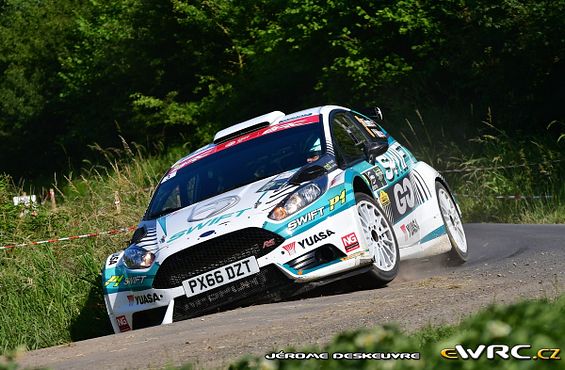
This is an IXO base model with Rally Decal Shop decals and represents the car Matt drove to finish first of the BRC contenders and take maximum BRC points as a result at Rally Ypres (6th overall behind notable drivers such as Breen, Abring and Loix).

2010
One change, and more new cars were coming along in 2010. The next decade started with a success story for the Pirelli Star Driver project when Keith Cronin was rewarded with a drive in the BRC in 2010 and won the series, this time in a Subaru. For 2010 World Rally Cars were not admitted and a decision was made that the 2012 series would be limited to two-wheel-drive cars given the increasing degree of development of these cars. The 2010 series was sponsored by Dulux Trade, an important move as this was not a direct support from the motor industry itself. One make support championships flourished, notably with Mitsubishi and the Fiesta ST models. At this time the French manufacturer competition departments were active in the BRC. Bryan Bouffier entered the Ulster Rally in 2010 with a DS3 R3 turbocharged car making its global competition debut and finished fifth BRC finisher, best two-wheel-drive. In terms of performance and also availability these cars were magic, and would prove to be nearly unbeatable in future years. Mark Higgins was now largely plying his trade in China (he'd probably had enough of the BRC after the previous 3 seasons) and so the question was, who could challenge Cronin and would the change of car hamper him?
Round 1 was the Bulldog International Rally of Wales, and the immediate answer was that nobody was going to find it easy to challenge Cronin and he had adapted very quickly to his new Subaru Impreza STi N15 as he won round 1 comfortably (by over 2 mins) from Dave jr. Weston in his Impreza STi N16 and Adam Gould in his Impreza STi N11 Spec C. The driver some felt likely to prove a challenge to Cronin, Gwyndaf Evans, retired due to gearbox issues. Cronin retired on the next round, the Pirelli, and Gwyndaf Evans took the win in his Evo X, with Jonny Greer 2nd in his Evo IX and a young charger by the name of Craig Breen an excellent 3rd in his Ford Fiesta S2000. A growing suggestion that Cronin might not have it all his own way came by the end of Round 3, the Jim Clark. Evans won his 2nd event in a row, Alastair Fisher was 2nd in his Evo IX and Cronin could only manage 3rd. So having dealt with Higgins in the prior year, it looked like another experienced driver in Evans was going to be the one for Cronin to watch out for in 2010. Round 4 was the Manx and with no Mark Higgins to worry about, Cronin took the top step, Evans took 2nd, and Jason Pritchard 3rd in his Impreza STi N16. Across the sea again to Ulster for round 5, and Evans was again the subject of a DNF, this time due to engine issues. Craig Breen took a fabulous win, Cronin though took 2nd and Fisher 3rd. The final event was the Yorkshire and Cronin was sitting comfortably on a 16 point lead, but with 30 points for a win, Cronin needed to finish safely and near the top to secure his back to back titles. And this he duly did, finishing 3rd behind a game Evans who had fought to the last, and Fisher who took another 2nd place. The result meant Cronin was champion by 10 points from Evans.
2010 Manx

The Impreza N15 reflecting the Manx winning 2010 car was produced by Realcarmodels (Keith also won the Bulldog in 2010).

2011
The 2011 Dulux Trade MSA British Rally Championship was the 53rd season of the British Rally Championship and the 2nd year of a 2 year deal Dulux had signed. The addition of the Rally Sunseeker International to the calendar (a much needed and appreciated event in southern half of England) was due to bring the number of events to seven however the Isle of Man event was cancelled later in the year, reducing the season to 6 events again. The season began on 26 February in Bournemouth and ended on 24 September in Yorkshire. The Evo IX R4 was again going to prove stiff competition in the BRC, however Keith Cronin was unable to rally in 2011 (finanical reasons?) and so would not be defending his crown. So we would have a new champion come the end of the year.
Round 1 was the Sunseeker and I will forever regret not getting to see a Sunseeker BRC event before the championship organisers cruely cancelled one a few years later and it has not returned since. David Bogie took the honours in the first round in his Evo IX, with Tom Cave 2nd in his evo X and Elfyn Evans (who, like many before, demonstrated the BRC can be a great feeder ground for the WRC) 3rd in his Subaru Impreza STi N15. Round 2 was the Bulldog and Evans won his home event ahead of Bogie and Adam Gould his his Impreza STi N15. It was the Pirelli next and Bogies took his 2nd win of the season, ahead of Robert Barrable and Jonny Greer in their Skoda Fabia S2000's. Evans could only manage 4th. Up to Scotland for round 4 (the Jim Clark) and Bogies took his 3rd win in 4 events to put himself in a commanding position. Jonny Greer was 2nd, Adam Gould 3rd and Evans 4th for a 2nd event in a row. Across the sea to Northern Ireland next for the Ulster, and with a host of WRC machinery and other local drivers it was perhaps not that surprising that the highest BRC finisher was down in 6th place. What was surprising for many was the fact that it was one of the new wave of R3 cars, which would play a significant role from 2012 onwards, Marty McCormack in his Citroen DS3 R3T. 2nd (8th overall) was Tommy Boyle in his Renault Clio R3 and Bogie was 9th/3rd. Greer and Evans took 4th and 5th in the BRC competitors. The final event of the season was the Yorkshire and Bogie had a commanding 14 point lead over Evans. Taking a cautious approach and finishing safely in 3rd place, 2 mins behind the event winner which was Evans, with Greer 2nd, meant that David Brogie piloted his car to his first and only BRC Championship. This is a Realcarmodels model of his Sunseeker Rally car – an event I am fond of but which is sadly no more as a result of last years MSA decision to suspend the championship for 2015. David also won the Pirelli and Jim Clark in 2011.
2011 Sunseeker


2012
In an effort to reduce costs and to increase competition, the eligibility rules changed again for 2012, and small front wheel drive hatchbacks became the order of the day. You can understand the intent, as the international class systems were now fully in force and this opened up rivalry further down the results for cars complying with the R2 rules. It also renewed interest in the BRC from manufacturers notably from France with Renault using BRC events for testing new evolution versions of their cars. But the change wasn’t to prove entirely successful.
This time it was Bogie who announced he would not be defending his BRC title, choosing instead to focus on the Scottish Rally Championship. But Cronin would be back again, and would need to change ride again to comply with the new regulations. The Sunseeker kicked off the 6 round year again, and Cronin appeared in the diminutive Renault Twingo RS R1 (model in progress) but retired on stage 10 with driveshaft issues. Instead, victory went to Mark Donnelly in his Renault Clio R3, 2nd was Desi Henry in his Citroen DS3 R3T and 3rd with Elfyn Evans in his Ford Fiesta R2. The Bulldog was round 2 and the top 3 were all in Citroen DS3 R3T's, including now, Keith Cronin. The top 3 in round 2 were Tom Cave, Cronin and Jarkko Nikara. Round 3 was the Pirelli, and Cronin was now getting in to his stride and took top honours, with Nikara 2nd and Donnelly 3rd. The Jim Clark was round 4 and Cronin took his first back to back win of the season, ahead of Cave and Jonny Greer's DS3 R3T. It was 3 on the spin for Cronin as he headed back over the sea for the Ulster, Evans was an excellent 2nd in his R2 and Osian Pryce rocked up in 3rd in his DS3 R3T. A measured drive in the season finale, the International Rally Yorkshire would see Cronin crowned champion for a 3rd time in 3 attempts, and so it proved. Cronin was 3rd behind Tom Cave and Osian Pryce but headed the championship leaderboard when it came to giving out awards by finishing 8 points ahead of Tom Cave, with Pryce 3rd and Evans 4th.
2012 Sunseeker

2012 Todds Leap Ulster

This is an IXO base with homemade decals decals representing the Todds Leap winning car from 2012 (Keith also won the Pirelli and Jim Clark events).

2013
Having proved beyond doubt that he could hold his own in the BRC, Keith moved on to a fresh challenge for 2012, so a new champion would be crowned. Evans also moved on to take part in the JWRC and promptly won it in his Fiesta R2, proving his class.
7 events would make up the championship, but the order had been shuffled and the Sunseeker would now be the season finale. The opening event, the Rally of North Wales was unfortunately cancelled due to icy conditions, so it would be back to 6 events again. So the Pirelli (now the Pirelli Richard Burns Foundation International Rally) was won by Jukka Korhonen is his Citroen DS3 R3T. Alastair Fisher was 2nd and Tom Cave 3rd in identical cars. The next round was the Jim Clark and Korhonen won his 2nd on the bounce, Tom Cave improved to 2nd and Osian Pryce 3rd in his DS3 R3T. Alastair Fisher won the Scottish round next, with Korhonen and Cave close behind. Pryce, Korhonen and Donnelly took the podium at the Todds Leap Ulster and Pryce Korhonen and Fisher took the podium at the Yorkshire. Korhonen had a health lead going in to the season finale the Sunseeker, and it proved enough, as he took 3rd place behind Pryce and Cave and beat them both by 100 points to 92 in the title race. A well deserved victory for Korhonen but with the podium in all 3 rounds being filled with Citroen DS3 R3T drivers, the absence of the spectable of a varied entry field made this year somewhat bland to many observers.
2013 Jim Clark

This is an IXO base with homemade decals representing the Jim Clark winning car from 2013 although Jukka also won the season opening Pirelli.

2014
Sourced from thecheckeredflag.co.uk
In the MSA British Rally Championship’s distinguished 56 year history, it’s hard to recall a year that’s been as tough, dramatic and unfortunately as sad as 2014, a year in which the championship made the national news headlines for all the wrong reasons.
That coverage came on a dark day at the Jim Clark Rally in May, the second event of an already turbulent season for the UK’s premier rally series, when two incidents on the same day claimed the lives of three spectators and injured six others.
The most serious incident saw a front-running DS3 leave the road and fatally strike a group of spectators. Naturally the event, the only closed-road rally in the mainland UK, was cancelled with immediate effect, with the incidents later leading to a review of motorsport safety in Scotland.
With the championship reeling from those events, there was further tragedy three months later on the Ulster Rally when rising young talent Timothy Cathcart passed away following an incident on the Northern Irish event, leaving the sport in mourning.
It proved to be a difficult year throughout for the championship, with a lack of entries plaguing the series. It was particularly a problem in the headline R3 class where only two drivers competed in all five events, leading to the British motorsport’s governing body the MSA to make some radical decisions on the BRC’s future.
They elected to run the BRC in-house from 2016 after being unhappy with the tender process to find a new promoter, ending UK Rally’s nine year run in charge of the championship, and with it made the decision for the series to take a one-year sabbatical in 2015 to allow consultation on its future.
That decision, made in June, led to the cancellation of the season-ending Rallye Dorset (re-branded from Rallye Sunseeker), with the event organisers citing financial implications caused by an uncertain future for the championship and therefore their event.
That was the second event of the year not to run after the original season opener, Rally North Wales, was forced to be postponed for the second year running, this time due to a lack of entries across the event.
While there were sadly plenty of unfortunate stories surrounding the championship this year, there was still the small matter of adding a new name to the prestigious roll call of BRC champions that includes Colin McRae, Richard Burns, Malcolm Wilson and Ari Vatanen.
Daniel McKenna and Osian Pryce headed into the season hotly tipped for success after taking the RallyTwo class title and overall vice-champion’s honours in 2013 respectively, and they certainly rose to their billing as they played out a fierce championship duel.
Pryce got off a perfect start with victory on the Pirelli Carlisle RB Foundation Rally, his fourth consecutive BRC win after his superb end to the previous campaign, before McKenna hit back on the Jim Clark with his maiden BRC success.
McKenna followed that up with a victory on the RSAC Scottish Rally that proved decisive after Pryce retired with gearbox problems. A third consecutive win on the Ulster, with Pryce in close pursuit, meant the Irishman’s advantage sat at 22 points heading into the double header Isle of Man finale.
It looked like the Pirelli Star Driver might have thrown away his chances of success with a dramatic roll towards the end of the opening points-scoring round, but a great turnaround by the DGM Sport team saw him back out for the final action.
That meant that when Pryce, who took maximum points in the penultimate event, suffered a bent suspension on the final day McKenna and co-driver Arthur Kierans secured the title by eleven points, with Pryce and Dale Furniss left to settle for second.
The sparse entry for the headline R3 class meant that despite missing half the year, Callum Black was the next best R3 competitor. Another to compete in a DS3, Black secured third on the Jim Clark and a career-best BRC finish of second in Scotland before departing from the action.
Finishing an impressive third overall in the championship as the R2 class champion was Calvin Beattie, after he enjoyed a close battle with fellow Irishman Dean Raftery throughout the campaign in their respective Ford Fiesta R2’s.
The class title was initially awarded to Raftery, though with points awarded erroneously to him an amended classification gave Beattie the crown. It was a retirement in the penultimate round that ultimately cost Raftery, who had taken four class wins to Beattie’s two.
Splitting them in the final standings was Gus Greensmith. Campaigning a Ford Fiesta R1, Greensmith overcame early competition from Chris Wheeler and Harry Threlfall to secure the British Junior Rally Championship with five class wins in the six rounds.
At the front, Citroen’s monopoly of the R3 class led to a comprehensive, almost unopposed victory in the BRC Constructors Championship over Ford (M-Sport). There was some input from other marques, with appearances for Renault, Peugeot and Abarth.
Garry Pearson competed in a new Peugeot 208 R2 in the first half of the year, Renault trialled their new Clio R3 model in Scotland with 2013 BRC champion Jukka Korhonen and Abarth made an appearance on the Jim Clark with 500’s for former BRC champion Jonny Milner and Georgia Shiels.
For McKenna, Pryce, Raftery and Greensmith meanwhile, their successes earnt them a free entry onto the World Rally Championship season finale Wales Rally GB as part of the championship’s ‘Road to Wales’ campaign.
McKenna saw mechanical problems hamper his event and lead to a retirement, Pryce starred in a Ford Fiesta R5 taking 18th overall, and Raftery and Greensmith finished secured second and third respectively in class RC4 in Fiesta R2’s.
2014 Manx

This is an IXO base with homemade decals representing the Manx winning car. Daniel also won he Jim Clark and Scotland events.

2015
No British Rally Championship for 2015, the first time in its history dating all the way back to 1958 that it has not taken place for reasons within its own control. Everyone was keeping their fingers crossed that the people at the MSA came up with a format that would bring this Championship back to its former glory and justify its suspension this year and the loss of the Sunseeker.

2016
sourced from britishrallychampionship.co.uk
After a year’s sabbatical, the MSA British Rally Championship provided high-octane action across the seven-round series. There was an electric atmosphere before the curtain-raiser, the Mid Wales Stages. Over 40 crews in pristine new overalls converged for a ‘Class of 2016’ photoshoot. Scanning the four rows, it was evident that Britain’s premier rallying series was back, healthier and stronger than ever with a quality array of drivers and co-drivers all eager to get stuck into the new championship formula – and to start, the opening stages of the new season would be held in fever-pitch darkness. The season included the twist of a joker card which participants could nominate ahead of a rally and score extra points from. Something for the purests to frown at but in theory it gave the chance for someone to steal the title from left field. Leading the crews away were WRC stars Elfyn Evans/Craig Parry, driving a Ford Fiesta R5 for the DMACK BRC Team. Behind the Welsh duo were another 22 R5/S2000-specification machines all jostling for supremacy on the snow-lined gravel stages. On home soil, Evans and Parry showed their class on the first stage, immediately pulling out a lead of 18.2 seconds. Many expected Elfyn to pull away and romp home by a comfortable margin. They were wrong. Up stepped Swedish star Fredrik Ahlin in a Pirelli-shod CA1 Sport Fiesta R5. The Swede went into the second day sure that he could win the opening round with Morton Erik Abrahamsen calling the notes. A pumped-up Ahlin showed the homegrown hero the way to go on the opening two stages of the second day and by stage four had grasped the lead. Evans retaliated, demonstrated his world-class pedigree to overhaul his adversary and win the opening round of the series by just 17.1 seconds. Tom Cave in his Spencer Sport Michelin Fiesta R5 made it three different tyre manufacturers side the top three. With the experienced James Morgan alongside, the young Welshman gained in confidence with every stage to put himself in a comfortable third. Rounding out the top five were 2011 BRC Champion David Bogie/Kevin Rae in their newly-acquired Skoda Fabia R5 and fellow Scottish stars Euan Thorburn/Paul Beaton, who showed the promise of the Peugeot 208 T16 R5.
Heading across the Irish Sea, the BRC crews next faced the iconic Circuit of Ireland. The first Tarmac event of the year would see Evans fly out-of-the-blocks, leading the event outright after the opening two stages. Disaster struck the championship leader on stage three, however, when the auxiliary belt cried enough. Desi Henry/Liam Moynihan looked set to inherit the BRC lead on the Belfast-based event but they too had to retire on the same stage. Stepping into the breach were Marty McCormack/David Moynihan in their Skoda Fabia S2000 and Ahlin in his Fiesta, who entered a ding-dong battle throughout the first day. Ahlin was primed to lead the event going into the overnight halt, but a slippery hairpin on the Newtownards street stage caught the Swede out as he clouted the left-rear of the Fiesta into a curb, limping the car to the finish. Fredrik made roadside repairs to get the car back to service, only losing 23 seconds in the process. A subsequent pacenote error saw Ahlin crash out of the event and the lead of the rally. Leading the field away on the second day, McCormack knew his S2000-spec Skoda would be challenged by the newer R5 cars, especially in the drying conditions with Josh Moffett/John Rowan pressing on in their Ford Fiesta R5. Moffett gained time on the opening two stages before leader McCormack came to a grinding halt with a faulty fuel pump. As the final loop began, Moffett established a comfortable gap ahead of Jonathan Greer/Kirsty Riddick, who had enjoyed an uneventful rally, steering clear of trouble to take their first podium of the season, while Bogie was rewarded with third after an incident-filled weekend. Tom Cave had a troubled run on the Irish Tarmac but made the best of the bad situation to just miss a podium in fourth, while on their first Tarmac rally, Jamie Anderson/Ross Whittock (Ford Fiesta R5) took an incredible fifth in front of young chargers Rhys Yates/Tom Woodburn in a similar Fiesta R5.
Kielder Forest provided the backdrop for round three, the Pirelli Carlisle Rally. Returning to take on the BRC regulars was former BRC round winner Matthew Wilson in an M-Sport Fiesta. Evans was once again the man to beat, but a puncture on stage three shuffled the Welshman down the order. Ahlin had shown his gravel prowess in mid Wales and seized the opportunity to take his first BRC win on the Pirelli, making him the third different driver in as many events to claim the top spot and the first Swedish driver since 1995 to win a round. In his one off appearance, Wilson took a fine second as Evans climbed up the results sheet to round out the podium. Crucially, Ahlin left Cumbria with the championship lead heading to Scotland. Cave notched up another fourth place, while McCormack took his first finish of the year, hustling his Kumho-supported S2000 Skoda into fifth.
Fired-up after missing the Pirelli Carlisle win, Evans showed why he is worthy of a WRC factory seat by leading from start-to-finish on the Scottish Rally. It was to be a drama-fuelled affair behind the DMACK ace, with four drivers vying for the remaining rostrum positions. Ahlin was amongst them until a driveshaft let go on stage three, sidelining the Swedish sensation. Cave had been chalking up several solid results and – now feeling comfortable in his Fiesta – started to show he was the best-of-the-rest behind the on-form Evans. The Spencer Sport star ended the one-day fast-and-furious sprint in a comfortable second. Bogie had held the spot and was due to take his best finish of the season until he stopped on the road section heading to the finish with a damaged radiator. With Scottish hopes extinguished, Desi Henry took his first podium of the year.
The Nicky Grist Stages provided an exciting challenge for teams, with the first day on gravel and the second on the famous Tarmac Epynt roads. Cave led the early charge, capturing the first stage win ahead of Bogie and Ahlin. A spin on the opening test for Evans saw him languish in fourth momentarily, before a fightback on the second and a stunning time on the third elevated him into the rally lead, with Cave hanging onto his coat tails throughout the event. Making an early charge was Jamie Anderson, who ran as high as third on the opening day in his Fiesta R5 – enjoying a scrap with Henry and Greer along the way. Matt Edwards had shown some giant-killing exploits in BRC2 on the opening four rounds, and on the Nicky Grist Stages, all the Mitsubishi Evo 9 driver had to do was finish to be crowned champion – a feat he achieved alongside navigator Will Rogers. At the front of the field on the second day, Evans and Cave were comfortable out front with Henry in third as the trio replicated the Scottish Rally podium at the finish in Builth Wells. Drama was to unfold behind, however, as Anderson dropped from a fine fourth to an eventual eighth, allowing Bogie, Moffett, Greer and Yates to move ahead of him on the timesheets.
The penultimate round was to see a champions’ drive from Evans and Parry on the lanes around Derry/Londonderry. To claim the title on the Ulster Rally, the Welsh pair had to win the event, an achievement they completed in fine style as they led from start-to-finish, but it wasn’t to be plain sailing for the WRC2 crew as they were pushed hard by triple BRC Champion Keith Cronin and co-driver Mikie Galvin in their Citroen DS3 R5. The Irish pair had not been seen in the BRC since their early exit on the Circuit of Ireland and they were out to make amends. Nestling into third was Cronin’s DGM stablemate Greer, who used his Irish Tarmac knowledge to build a cushion ahead of Bogie. Eventual BRC Champion Evans and eventual Irish Champion Cronin were separated by a mere 4.5 seconds at the end of the first day, but problems struck the latter at the lunchtime service on day two. Gearbox and differential gremlins had worked their way into the DS3 R5, meaning Cronin had to leave service late with a stack of penalties. Fighting his way back, the Irishman recovered to fourth on his return to the series while Greer and Bogie rounded out the rostrum – both claiming their second podium of the campaign.
The first season of the new-look BRC had its curtain call on the picturesque Isle of Man, with three days of titanic Tarmac action that captivated the island. Along with the regular BRC crews, the season finale saw two top-notch interlopers –Citroen WRC star Craig Breen and triple BRC Champion Mark Higgins. Breen unfortunately retired early on, but Higgins took the fight to Evans on the asphalt event. Elfyn set the initial pace, but driveshaft woes on the second night set up a tantalising showdown to the final day of the season with Higgins holding the upper hand. Evans had to work hard for his fifth win of the year, edging Manxman Higgins by just 5.9 seconds at the finish outside the famous TT Grandstand. With the title already decided, there was a five-way fight for the runner-up spot in the championship. Cave was the class of the group as he traded times with the top two throughout to put himself second on the BRC rostrum and second in the 2016 series. Enjoying a scrap with Cave throughout, Henry took his third podium of the season and his first on Tarmac. After sealing the BRC2 title, Matt Edwards graduated to an R5 Fiesta for the final two events. Following a solid run on the Ulster, Edwards looked at home in his new machine on the Manx lanes, climbing the order throughout the long event to take fourth in the BRC section ahead of Greer, Bogie and Alex Laffey and Andrew Roughead, who took their best finish of the season in eighth in their Fiesta R5.
The return of the BRC after the years sabattical and to be fair, my expectations were exceeded with lots of cars entering and lots of fabulous machinery, including the return of 4 wheel drive in the form of R5 machines.
Elfyn Evans (after losing his WRC seat) was the runaway winner, winning the Mid Wales, Scottish, Nicky Grist, Ulster and IOM events in his Dmack sponsored car.
2016 Ulster

This is a redecaled IXO model of Evans Fiesta R5 Evo from the Ulster rally, using Rally Decals Shop and home made decals.

2017
Sourced from thecheckeredflag.co.uk
After Elfyn Evans made the move into the World Rally Championship for 2017, the Prestone MSA British Rally Championship saw both new and returning faces to the series with past champions, newcomers and returning drivers entering in 2017.
And it was just one point that separated the top two drivers in Britain’s premier rallying championship after seven events in six territories, with the series going down to the very last stage of the season. But after the many twists and turns throughout 2017, it was Keith Cronin who produced one of the most memorable championship comebacks in recent history to claim a fourth British Rally Championship in his first season after returning to the series.
After focusing on the Irish Tarmac championship in 2016 back in his homeland, Irishman Cronin announced his intensions for a tilt at the title by signing with one of the biggest teams in World rallying, M-Sport, to drive a latest-spec Ford Fiesta R5 in a full season campaign this year and despite a shaky start, the deal proved to be one that benefited him dearly.
Cronin’s main rival, Swede Fredrik Ahlin returned in 2017 after a debut season the previous year again driving for CA1 Sport but this year instead driving a Skoda Fabia R5 after completing 2016 in a Fiesta R5.
With Cronin and Ahlin two of the championship favourites before the first round, the Border Counties Rally, the BRC1 class also saw various returning drivers from 2016, with Matt Edwards, Tom Cave, Rhys Yates, former champion David Bogie and Martin McCormack just some of the drivers to re-enter ahead of 2017’s curtain raiser.
The Border Counties Rally was new to the series in 2017 after the cancellation of the Mid-Wales Stages and stepped in to host the opening round and didn’t disappoint. Ahlin took the victory in dominating fashion in the first gravel event of the year on round one and instantly showed his intentions for the rest of the season with Tom Cave and Osian Pryce rounding out the top three and to-be champion Cronin claiming fourth on his BRC debut for M-Sport in his Fiesta R5 Evo (which was upgraded to Evo 2 spec later in the season).
Round two took the crews into Cumbria and the traditional BRC event the Pirelli International Rally. Another gravel event suited Ahlin, but unlike on round one was made to work for his win after a close battle with 2016 Drive D-MACK Champion Osian Pryce. Pryce in a Spencer Sport-ran Fiesta would go on to claim second on this event, but this was only the start for the Welshman who would put in some fine performances across 2017.
Behind Pryce and Ahlin was Martin McCormack who was able to benefit from Cronin’s first retirement of the season after rolling out of the event. Another man to suffer bad luck in Kielder was Tom Cave who had switched to a Hyundai i20 R5 only for the new car to suffer suspension problems at the beginning of day two as well as David Bogie in a sister-CA1 car to Ahlin; the Scot did however manage to salvage fourth overall after brake issues on day one.
A return to Scotland and the RSCA Scottish Rally was round three in 2017, with championship leader Ahlin aiming to make it a hat trick of wins in the first three events of the season, but hometown here Bogie had other ideas.
The man who comes from town where the rally was based, Dumfries in the Scottish Borders, had a ding-dong battle with his teammate throughout the whole of the event with the pair separated by just 0.1 of a second with one stage remaining on Saturday afternoon and it was Bogie who would go on to claim the victory.
On the last stage, the Ahlin hit a rock that managed to get wedged into the radiator of his Fabia subsequently bursting it and putting him out of the rally and earning him no points. Osian Pryce therefore took the runners up spot ahead of McCormack with Cronin again finishing fourth for the second time in three events.
June saw the BRC head oversees for the first time in its history and be part of the Ypres Rally in Belgium and was the beginning of Cronin’s championship push. The former champion was on his favoured tarmac surface for the first time this season and made sure to take full advantage.
As Cronin dominated at the front, both Ahlin and Bogie who were at the sharp end of the championship standings would suffer big accidents. Bogie in particular would suffer deeply and would not return to the BRC for the remainder of 2017 after substantial damage to the Fabia R5, while Ahlin’s title push suffered a hit for the second round in succession. The Swede was however able to recover to finish sixth in the BRC1 class and earn crucial championship points.
With Ahlin in trouble and Bogie out, Matt Edwards, who was constantly improving throughout 2017 and Pryce were the drivers who were able to take advantage and claim the remaining podium places in Belgium.
After the trip abroad and ahead of the next round of the championship, the Nicky Grist Stages, a battle between Ahlin and Pryce seemed to be forming, with Cronin still behind in the standings.
Pryce was seemingly on the verge of winning his home event when heartbreak struck the Welsh driver as the fuel pump failed on the Fiesta, forcing him to retire and earn no points in his battle for the championship.
As Pryce’s dream win fell by the wayside, Ahlin could take full advantage and claim another victory, his third of the season, on the only mixed surface event of the year. Behind him finished Edwards, on the podium for the second event in succession and Rhys Yates who earned his first appearance in the top three in Wales. Cronin again suffered problems on a gravel event, and went off the road and would score no points.
After visiting Scotland, England, Wales and Belgium, the BRC then made the trip to Ireland for the Ulster Rally where the champion to be Cronin was in unstoppable form. His home event saw him dominate amongst the BRC runners during a weekend with extra competition from the Ireland Tarmac Championship and drivers including Sam and Josh Moffett.
Cronin made the most of his previous experience on Irish tarmac and claimed the win ahead of rival Ahlin with Marty McCormack the man taking third. Pryce in the Spencer Sport Fiesta suffered yet another fuel pump issue and again retired leaving him all but mathematically out of the title race.
The Welshman announced days later he was not to take part in the BRC finale on the Isle of Man in a bid to save budget ahead of him coming back for another title challenge in 2018.
With the double header on the Isle of Man the final stop in the record breaking 2017 BRC season, the title race was down to three drivers; championship leader Ahlin, the comeback king Cronin and the ever-consistent Edwards.
With Pryce not competing in the final event, M-Sport in a bid to earn championship points in the teams championship, asked Edwards to be their nominated driver alongside Cronin and Alex Laffey and the move would pay dividends as they went on to claim the title by 24 points over rival squad CA1 Sport.
The Isle of Man event used a double header format, meaning it was all to play for the three drivers still in with a chance of claiming the top prize.
Cronin who had to win both events, started in perfect fashion, claiming the leg one victory at the end of day two ahead of Edwards, who had needed to win to stay in the championship hunt and Ahlin who took third.
So with one leg left, it was between championship leader Ahlin and Cronin who was on a mission to complete the ultimate series comeback and by the end of leg two, the Irish driver had done just that by claiming the victory in the final round of the season.
Cronin showed his strength on tarmac and won the championship by a sole point ahead of Ahlin in turn thanks to Edwards who had again snatched crucial points away from the Swede after finishing second on leg two on the Isle of Man, incredibly finishing just 0.1 seconds behind Cronin.
The Prestone Motorsport News BRC Junior class had a similar ding-dong battle throughout 2017, with Callum Devine going toe-to-toe with William Creighton throughout the entire season.
The pair battled at the front of the timesheets across all seven rounds, with Devine ultimately taking the title as the championship as like in BRC1 went down to the wire.
Over the course of the seven rounds, five different winners were on the top step of the podium, with Devine proving his ability on the way to winning the £30,000 cash prize by taking three victories along with Creighton, Oscar Solberg who took the first win of the season, Cameron Davies and Marty Gallagher also taking maximum scores at points throughout the year.
After beginning the season in a Ford Fiesta R2T, a change of car to an Opel Adam R2 before the Ypres Rally proved a masterstroke Devine and he went on to win both the Belgian event and the following Nicky Grist Stages as he went on to win three out of the final rounds of the year.
Consistency was key to runner up Creighton as he was always within the top four across the year in his Peugeot 208 R2, but the Irishman could not cope with the pace from Devine as he claimed the title. Third at the end of the season went to Solberg with Creighton taking fourth.
The BRC Cadet class, open to older specification R2 cars saw Josh Cornwell dominate all season with a near-perfect record. The youngster wrapped up the title with a round to spare ahead of Tom Williams and Alex Waterman, with Cornwell only dropping points on the Nicky Grist Stages, while the BRC4 class saw two season entries with David White in a Ford Fiesta R2 beating BMX world champion Gee Atherton by 50 points; Atherton having to miss several events during the season due to a large biking accident
2017 Border Counties

2017 Ypres

These 2 models by Piotr at Modele Sklep represent the Evo car from the Border Counties and the Evo 2 Ypres winner.

2018
sourced from britishrallychampionship.co.uk
The Prestone MSA British Rally Championship celebrated its Diamond Jubilee in 2018 and despite a challenging season with two rounds being cancelled, Britain’s premier rallying series still managed to produce exciting edge-of-the-seat action once again in its 60th anniversary season.
With the Border Counties Rally called off due to the extreme weather provided by the ‘Beast from the East’, the championship curtain raiser was be held on the fast and furious stages of the Kielder Forest complex for the Pirelli International Rally. Defending champion’s Keith Cronin and Mikie Galvin harnessed the latest Hyundai i20 R5 and picked up where they left off from 2017 by punching in the fastest time on the event – getting up to speed in the Michelin-supported machine straight away. Young-gun Rhys Yates and Elliott Edmondson also had a brand new weapon at their disposal with a Skoda Fabia R5 their championship mount for the new season as they slipped in just behind Cronin with fellow Fabia crew Marty McCormack and David Moynihan also showing early promising. Tipped for success was David Bogie and John Rowan in their Skoda Fabia R5, but a uncharacteristic roll from the Scottish driver left him on the side lines very early on. Matt Edwards and Darren Garrod came close to their first win on the 2017 championship finale and were eager to break their victory duck on the Cumbrian gravel. Leading the M-Sport line-up for 2018, the Pirelli-backed pair stepped-up to the plate and on stage three pushed their way to the front of the order and didn’t look back. Edwards kept pulling away, and after the one-day opening round shoot-out, the Swift-supported driver took his first International rally win by 20.5 seconds. Cronin was set to take a strong second place before heading to a triple header of Tarmac rounds but the Irish driver was piped to the post on the final stage by an on form Rhys Yates who sealed his best ever BRC result with second. Marty McCormack was in the podium hunt until gearbox gremlins prevented further progress but a solid fourth in the Kumho Skoda got his challenge underway, while Jonathan Greer and Kirsty Riddick were trying out a Ford Fiesta R5 and were pleased with fifth as he gained important mileage under the belt. Edwards’ teammates Alex Laffey and Patrick Walsh were sixth ahead of BRC debutant Lawrence Whyte and co-driver Stuart Loudon, BRC wildcard Thomas Preston and Max Freeman. Sacha Kakad and James Aldridge also made their BRC bow and picked up their first points in their maiden R5 drive together.
With the dust settling from the Pirelli – the BRC went into Europe for the legendary Ypres Rally. Mixing it with some of the best drivers in the world including Thierry Neuville, the plucky BRC crews entered the Flanders region in the search of vital championship points on the first tarmac event of the year. As predicted by many, last year’s BRC Ypres winner Keith Cronin dominated the early proceedings. Leading going into the second day, the Irishman just had to tick off the stages, but a lapse in concentration on stage 10 dropped Cronin into the clutches of his rivals and an off into a field made the Hyundai driver’s heart beat that little bit faster.
Championship leader Edwards was having a nightmare in Ypres. Gremlins had worked their way into the Fiesta R5’s electronics, thus not allowing Edwards to extract the maximum from the M-Sport machine. Along with power-steering failure, the Welsh driver had it all to do on the final day. With his never-say-die approach, Edwards kept fighting and clawed his way up to second, just behind Cronin with a handful of stages left. Ypres crowd favourite Marty McCormack was having his strongest showing of the year in second but a puncture followed by an off put paid to his weekend on the second day, denying the likeable Northern Irishman what would have been his best BRC result. With the rally entering its final stages, disaster struck for Cronin as a last stage puncture dropped the leader down to third allowing Edwards to pounce and seal his first win on Tarmac. David Bogie was out to finish after his opening round disappointment and was pleased to pick up a strong second to get his championship tilt underway. Rhys Yates was the man everybody was watching in Belgium with locals tipping the Englishman for greatness in the ditch-cutting lanes. After winning Rally van Wervik – a useful Ypres warm-up event, Yates put himself into the BRC mix. Trying too hard on the opening day saw the Skoda driver visit a field before retiring early on the second day with co-driver Elliott Edmondson not well enough to continue. Alex Laffey recorded his best ever BRC finish in fourth while James Williams rounded out the top five and with it the Junior BRC win and first front-wheel-drive car home on the event.
From the sun-kissed Belgian roads to the bumpy, demanding, wet Ulster lanes. The trip across the Irish Sea is always a favourite amongst the competitors with its unique roads and weather conditions proving an important leg in the championship race. With 2017 winner Keith Cronin absent from the billing this year, a new name would take to the top step in Northern Ireland. Rhys Yates drew first blood as he hoped to make up for a disappointing weekend in Ypres. Following him on the timesheets was local star Jonny Greer who put his Fiesta into second. Unfortunately for Greer, a rare off put him out of the event, denying the fans a home winner. Another local star Marty McCormack also knocked on the door of a podium but McCormack called time on the final morning after several excursions in his Skoda Fabia R5. With the local challenge halted, this left a three way fight for supremacy with Matt Edwards and David Bogie eyeing the top spot, held by Rhys Yates. Yates was a man on a mission – chasing his first BRC win. A late wrong tyre choice, puncture and a few hairy moments saw him haemorrhage time but still manage to cling onto the final rostrum position. David Bogie had been waiting and watching as he honed the set-up on his Skoda Fabia R5. Growing in confidence with every stage mile, the Scot punched in some fastest stage times to take back-to-back second places to move into second in the series. The man of the moment shone again. Matt Edwards wrestled the lead off Rhys Yates on stage seven and didn’t look back as he completed a clean sweep of BRC victories – giving him a strong grip on the championship heading to his home event.
With Rally Isle of Man deciding to cancel the event at the last minute, the focus quickly switched to Wales Rally GB for two tough and demanding rounds, with the BRC sharing the iconic forestry stages with the globetrotting FIA World Rally Championship. The opening round of the weekend was the opening special stage at Tir Prince on the Thursday evening before a flat-out day in the forests on Friday. Yates was king of the ring on the opening night before the Flying Scotsman, David Bogie lit up the forests with his pace – putting many in WRC2 behind him. No other BRC driver had an answer for Bogie as he dominated the opposition in his DMACK-supported Fabia on his way to his first BRC win of the season. Yates, try as he may, couldn’t live with Bogie on the opening leg and settled for second. Despite Bogie winning the battle, it was to be Edwards’ war as the Welshman took it cautiously through the opening round in the Pirelli-backed Fiesta and finished third to secure his first BRC title in front of his family and home fans. Alex Laffey had another quiet affair as he built his speed. Another fourth place was a strong result and with consistency, this kept him in with mathematical chance of a top three in the series standings.
Onto the final round of the series and the gloves were off. With the title decided it was going to be a three-way fight. Edwards wanted a win to round out the year, Bogie wanted the Wales double and Yates was searching for his first win. Yates was the first to fall foul of the demanding Welsh stages as the English driver retired early on, leaving the door opening to a two-horse race. Bogie and Edwards, meanwhile, went hammer and tongs across the mid Wales stages on Saturday with Champion elect Edwards trailing by 34 seconds. On the final day, Bogie tried that little but too hard as the Dumfries driver searched for an overall top 12 result on the WRC event as well as the BRC win. Bogie went off on stage 20, thus handing the lead and win to Edwards. The Welsh driver as sealed his championship in style by powering his Fiesta through the Llandudno street stage and Gwydir forest in fine fashion. Alex Laffey took his first gravel stage win on Wales Rally GB and his best ever result as he notched up second on the rally to Matt Edwards and second in the standings – making it a dream season for M-Sport. Norwegian Steve Rokland rounded out the main BRC podium with a fine drive in his Peugeot 208 R2 on his way to the Junior BRC title.
2018 Ulster

This is a Realcarmodels from Hungary model of the Ulster event winning car.

2019
The 2019 6 round season started off in great fashion for defending champion, Matt Edwards. Victory on the Cambrian rally in his Ford Fiesta R5 Evo 2, ahead of David Bogie and Marty McCormack in their Fabia R5's was just what he had wanted. Round 2 was to a new location in West Cork. Craig Breen headed Alastair Fisher in their Fiesta R5 Evo 2's, however as neither were involved in the series, top BRC points went to Tom Cave in his Hyundai i20 R5. Edwards was 4th, and Josh Moffett in 7th picked up the final BRC podium spot. The Pirelli was round 3, and Tom Cave won it for his 2nd win in a row. Rhys Yates in his Skoda R5 took 2nd, and David Bogie in 4th took the 3rd podium step in the BRC. Disaster struck for Matt Edwards, as on stage three the M-Sport driver suffered two punctures on the rough, demanding stages. Struggling on, the duo attempted to nurse the car on the road section back to service, but in the process they were in breach of the regulations and thus were struck from the overall results. It was across the channel next for the Ypres round. The 4 of the top 5 spots were taken by VW Polo GTI R5 drivers, headed by Craig Green, and split by the Skoda R5 of Freddy Loix in 4th. First BRC car home was Edwards in 6th, then Cave in 7th and Alex Laffey in his Fiesta R5 in 9th. Round 5 was also outside of mainland UK, and it was the Ulster. Craig Breen continued to demonstrate why he had had chances in the WRC by winning the event, but only by 20 seconds from Edwards. Josh McErlean in his Peugeot 208 R2 took a surprising 2nd place after finishing 12th, and James Williams in his Fiesta R2T19 down in 14th spot picked up 3rd place. Tom Cave and most of the other likely challengers for the overall title either crashed out or had car issues. With 3 wins and a second place to Caves 2 wins and second place, Edwards was in a strong position come the final round, even more so as he hadn't played his Joker. But then neither had Cave - who would win out? Tom Cave did everything his possibly could do by winning the final round which was the Galloway Hills 75 miles rally (how far have distances shrunk since the 50s/60s when events were 300-400 miles long!) and taking maximum points plus joker bonus totalling 30. But Edwards knew a measured drive would take him home safely to a defence of his title and so it proved when he finished 3rd behind Jonny Greers Fiesta R5. Whilst maybe not the fastest on the stages at every event, Matt definitely benefited from the old adage, to finish first, first you have to finish.
2019 Ypres

This is an IXO base model with Rally Decal Shop decals and represents the car Matt drove to finish first of the BRC contenders and take maximum BRC points as a result at Rally Ypres (6th overall behind notable drivers such as Breen, Abring and Loix).

Last edited by reeft1 on Mon Mar 08, 2021 9:01 am; edited 17 times in total

reeft1- Posts : 3405
Join date : 2012-02-14
Age : 54
Location : Essex
 Re: British Rally Championship Champions Collection
Re: British Rally Championship Champions Collection
Fantastic collection of models and some great reading. Credit to you Paul. Excellent work. My favourite thread.

newt5550- Posts : 6272
Join date : 2012-02-07
Age : 55
Location : Boston
 Re: British Rally Championship Champions Collection
Re: British Rally Championship Champions Collection
2016 now added.
Last edited by reeft1 on Tue Feb 23, 2021 9:26 am; edited 4 times in total

reeft1- Posts : 3405
Join date : 2012-02-14
Age : 54
Location : Essex
 Re: British Rally Championship Champions Collection
Re: British Rally Championship Champions Collection
John Sprinzel's 1959 Austin A35 from the Coupe des Alpes event - K&R Replicas added
Last edited by reeft1 on Mon Dec 28, 2020 10:19 pm; edited 1 time in total

reeft1- Posts : 3405
Join date : 2012-02-14
Age : 54
Location : Essex
 Re: British Rally Championship Champions Collection
Re: British Rally Championship Champions Collection
Paul
Blimey this has been a tour de force.
Lots on memories from when we followed the BRC in the 70s and 80s and the Manx for many more years
Incredible background information, well done that man!!
Chris
Blimey this has been a tour de force.
Lots on memories from when we followed the BRC in the 70s and 80s and the Manx for many more years
Incredible background information, well done that man!!
Chris
CDM- Posts : 1291
Join date : 2012-02-10
 Re: British Rally Championship Champions Collection
Re: British Rally Championship Champions Collection
Thanks Chris. The 2017 and 2018 cars are in-flight. I was a bit let down on one of the 2017 builds and have been waiting over a year for it to be completed- hopefully that will be sorted in the next couple of months.

reeft1- Posts : 3405
Join date : 2012-02-14
Age : 54
Location : Essex
 Re: British Rally Championship Champions Collection
Re: British Rally Championship Champions Collection
Found some hi-res reference pictures via RallyRetro of the 1969 Bloxham Fulvia on the Welsh Rally which enabled me to add some missing decals and also modify the car as on the event the Fulvia was carrying extended wheel arches.
And thanks to Dave "Zeus" I was able to add some much needed rally plates and door plates to the 1966 Fidler Triumph 2000.
And thanks to Dave "Zeus" I was able to add some much needed rally plates and door plates to the 1966 Fidler Triumph 2000.
Last edited by reeft1 on Mon Dec 28, 2020 10:20 pm; edited 1 time in total

reeft1- Posts : 3405
Join date : 2012-02-14
Age : 54
Location : Essex
 Re: British Rally Championship Champions Collection
Re: British Rally Championship Champions Collection
Well, it's been a very long time coming but i finally received today a much awaited model that i'd ordered nearly 18 months ago. Very happy with it now its arrived! 2017 updated.
Last edited by reeft1 on Tue Feb 23, 2021 9:28 am; edited 4 times in total

reeft1- Posts : 3405
Join date : 2012-02-14
Age : 54
Location : Essex
 Re: British Rally Championship Champions Collection
Re: British Rally Championship Champions Collection
2018 now added.
Last edited by reeft1 on Tue Feb 23, 2021 9:30 am; edited 3 times in total

reeft1- Posts : 3405
Join date : 2012-02-14
Age : 54
Location : Essex
 Re: British Rally Championship Champions Collection
Re: British Rally Championship Champions Collection
1985 - UPDATED - added a 2nd early season version of the HFH Manta
Last edited by reeft1 on Mon Dec 28, 2020 10:21 pm; edited 2 times in total

reeft1- Posts : 3405
Join date : 2012-02-14
Age : 54
Location : Essex
 Re: British Rally Championship Champions Collection
Re: British Rally Championship Champions Collection
Good stuff as always, I always enjoy your threads
David Napier- Posts : 682
Join date : 2012-02-07

reeft1- Posts : 3405
Join date : 2012-02-14
Age : 54
Location : Essex
 Re: British Rally Championship Champions Collection
Re: British Rally Championship Champions Collection
2019 now added
Last edited by reeft1 on Tue Feb 23, 2021 9:31 am; edited 5 times in total

reeft1- Posts : 3405
Join date : 2012-02-14
Age : 54
Location : Essex
 Re: British Rally Championship Champions Collection
Re: British Rally Championship Champions Collection
With grateful thanks from Dave (Zeus) who highlighted that that Mcrae started the 1987 season at the National Breakdown Rally in a near showroom standard Lancia Delta HF 4WD (finishing 11th), and provided some reference photos, i've built the car that Jimmy used on that event.
Last edited by reeft1 on Mon Dec 28, 2020 10:21 pm; edited 1 time in total

reeft1- Posts : 3405
Join date : 2012-02-14
Age : 54
Location : Essex
 Re: British Rally Championship Champions Collection
Re: British Rally Championship Champions Collection
With grateful assistance from Bill Swann and in particular Peter Allen of the Ulster Automobile Club, I have been able to complete the Roy Fidler car line up from 1966 by adding the Group 3 Triumph 2000 from Roy's 4th place finish in the 1966 Circuit of Ireland rally.
I also found confirmation that the Rally of the Vales was a qualifying event in 1967 for the Motoring News, BTRDA and BRC (RAC) championships, and with the finalisation of this home made decals/right hand drive converted Trofeu model, my British Rally Championship winning cars collection is once again complete!
I also found confirmation that the Rally of the Vales was a qualifying event in 1967 for the Motoring News, BTRDA and BRC (RAC) championships, and with the finalisation of this home made decals/right hand drive converted Trofeu model, my British Rally Championship winning cars collection is once again complete!
Last edited by reeft1 on Mon Dec 28, 2020 10:22 pm; edited 1 time in total

reeft1- Posts : 3405
Join date : 2012-02-14
Age : 54
Location : Essex
 Re: British Rally Championship Champions Collection
Re: British Rally Championship Champions Collection
Fantastic updates. Look forward to the full collection display shot
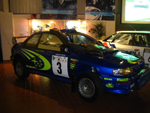
Dr Tumbo- Posts : 521
Join date : 2012-02-07
Age : 40
 Re: British Rally Championship Champions Collection
Re: British Rally Championship Champions Collection
paul that is class work m8, well done sir!

bmd- Posts : 7008
Join date : 2012-02-12
Age : 57
Location : here

reeft1- Posts : 3405
Join date : 2012-02-14
Age : 54
Location : Essex
 Re: British Rally Championship Champions Collection
Re: British Rally Championship Champions Collection
Afternoon Paul
Had a read through your posts from the start, excellent detail and history in there a complete credit to you. Great seeing how this collection builds as you continue to build and add further BRC models into it.
Mark
Had a read through your posts from the start, excellent detail and history in there a complete credit to you. Great seeing how this collection builds as you continue to build and add further BRC models into it.
Mark
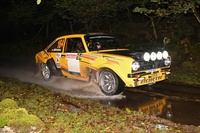
cowfeeder- Posts : 816
Join date : 2012-02-09
Page 1 of 3 • 1, 2, 3 
 Similar topics
Similar topics» 2018 British Rally Championship
» 2015 British Rally Championship
» British Rally Championship 2021
» 2014 British Rally Championship
» British Rallycross Championship 2016
» 2015 British Rally Championship
» British Rally Championship 2021
» 2014 British Rally Championship
» British Rallycross Championship 2016
Page 1 of 3
Permissions in this forum:
You cannot reply to topics in this forum|
|
|
